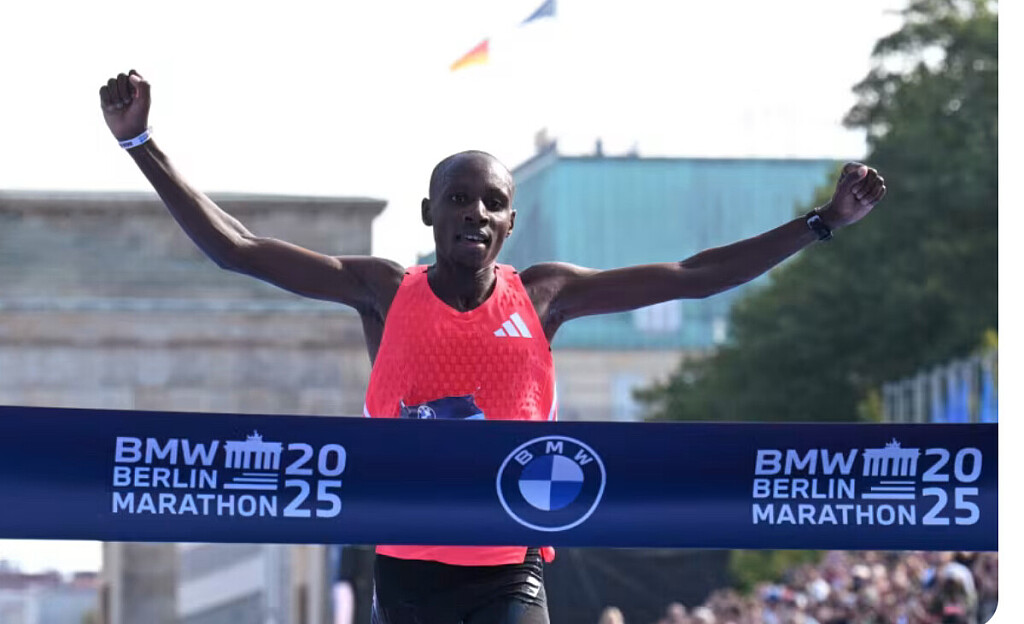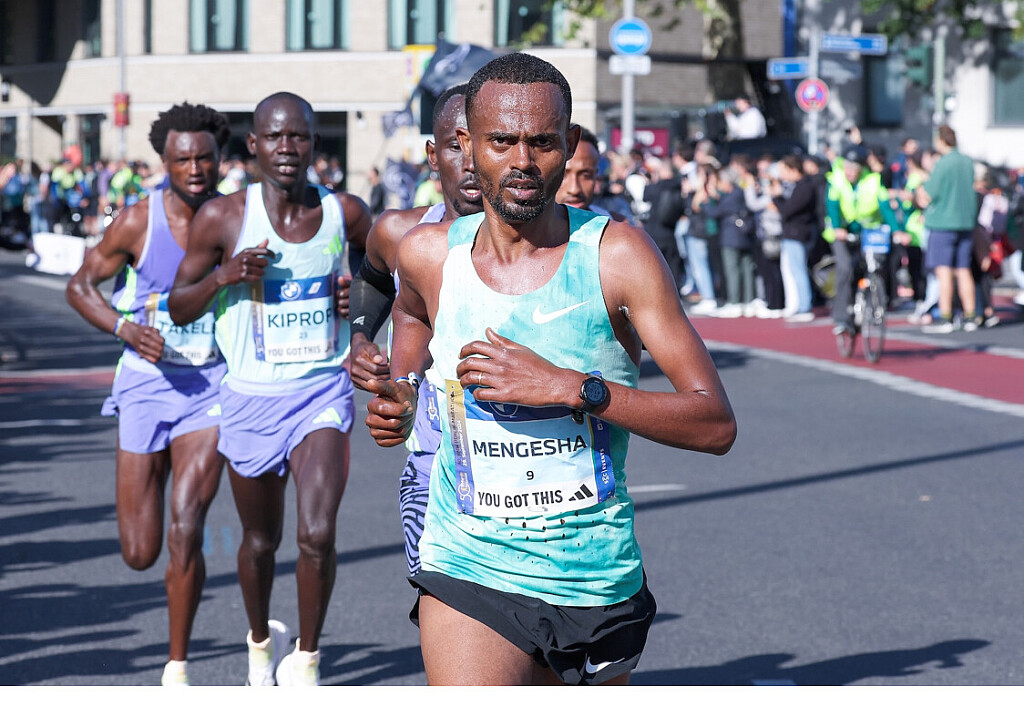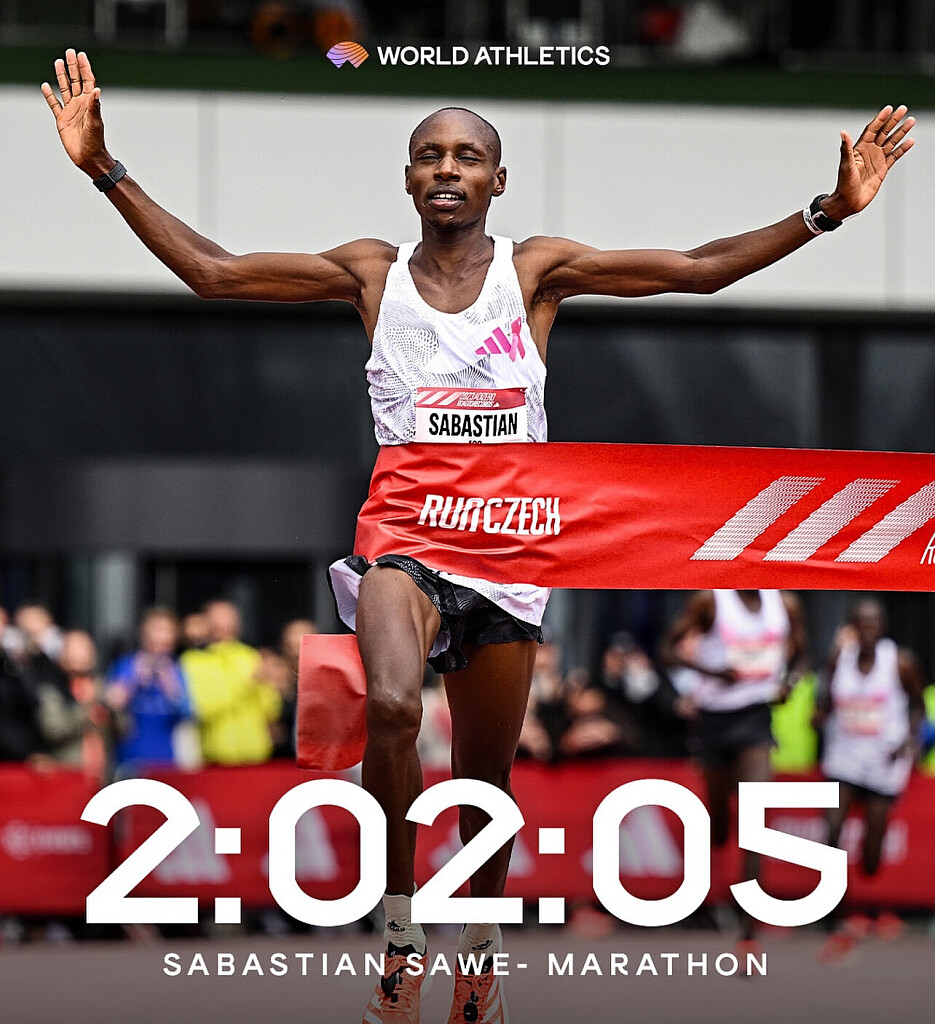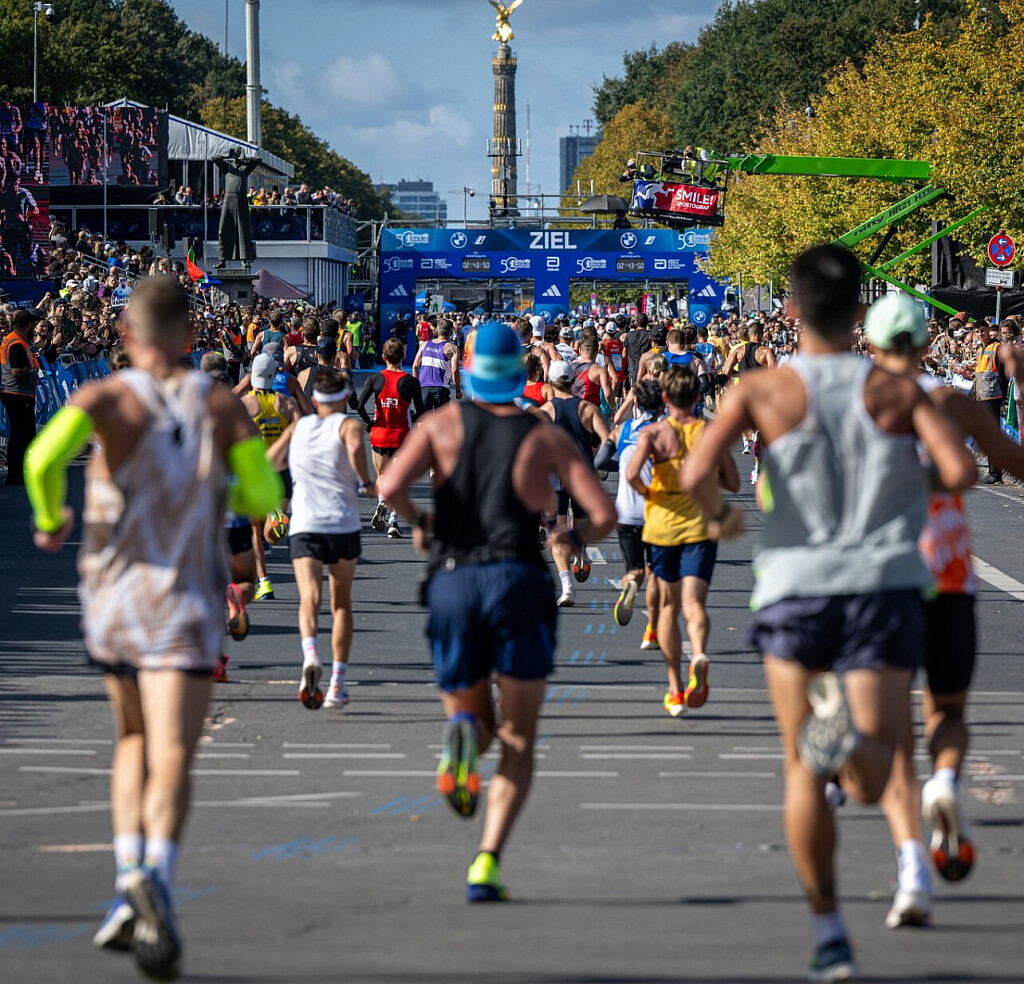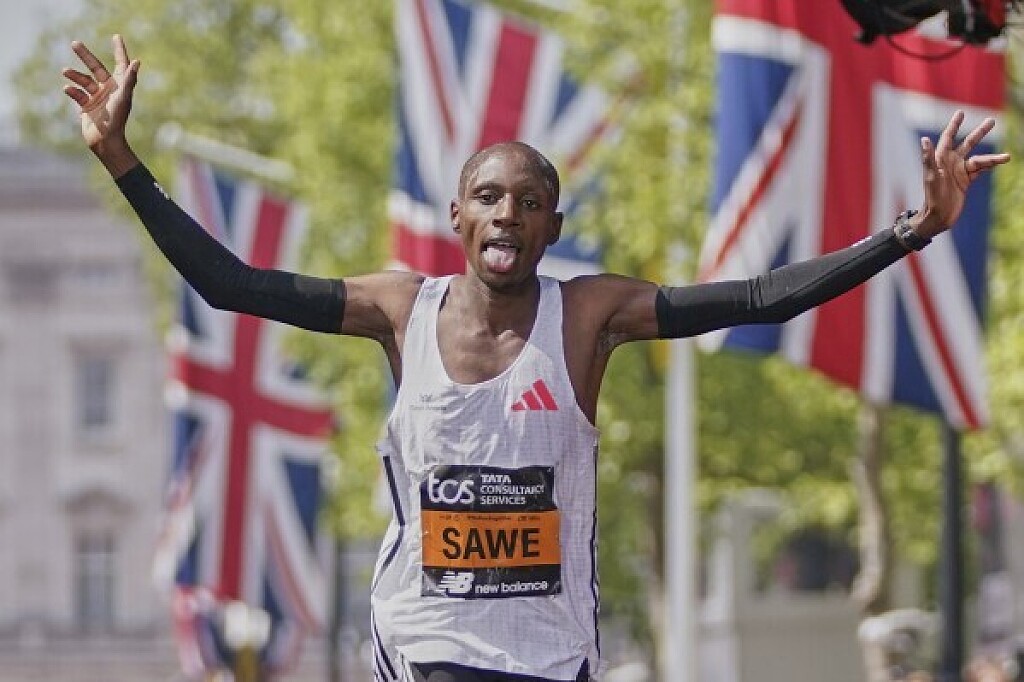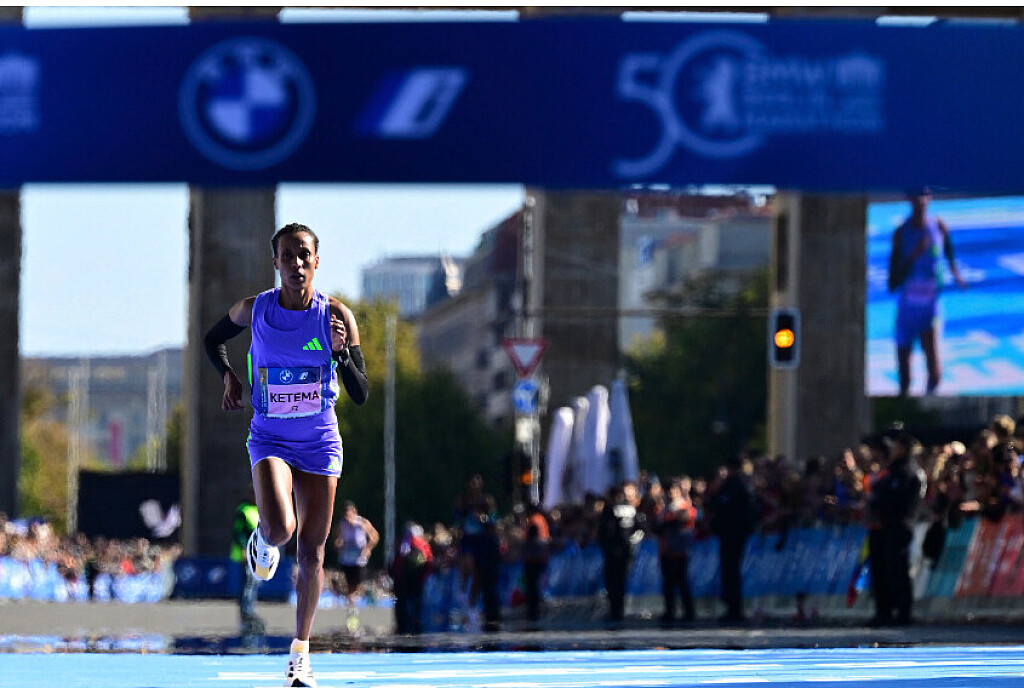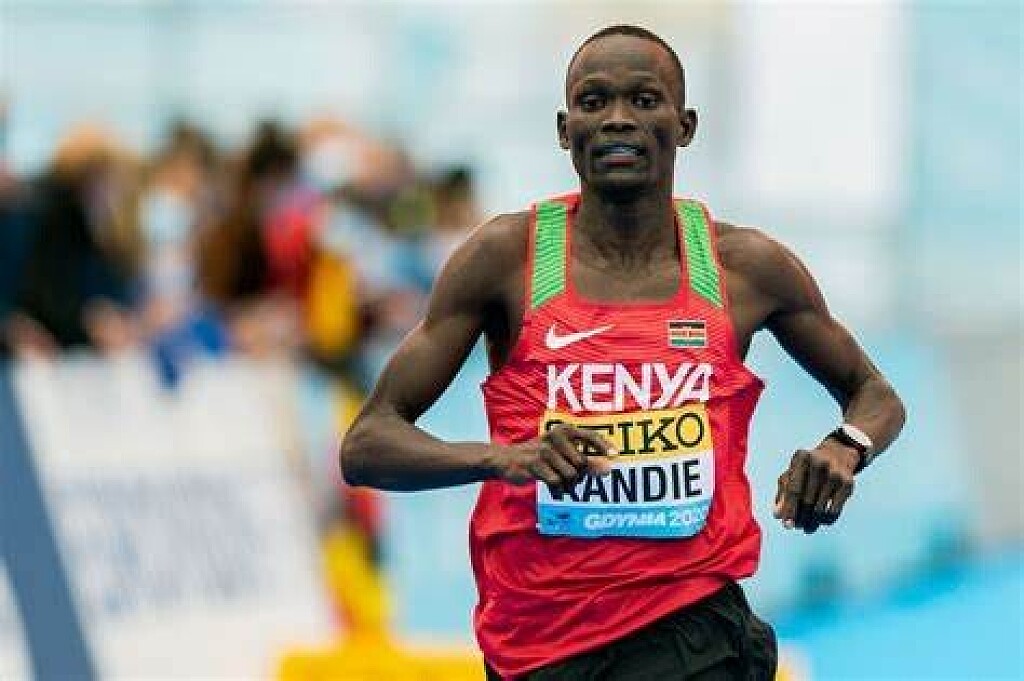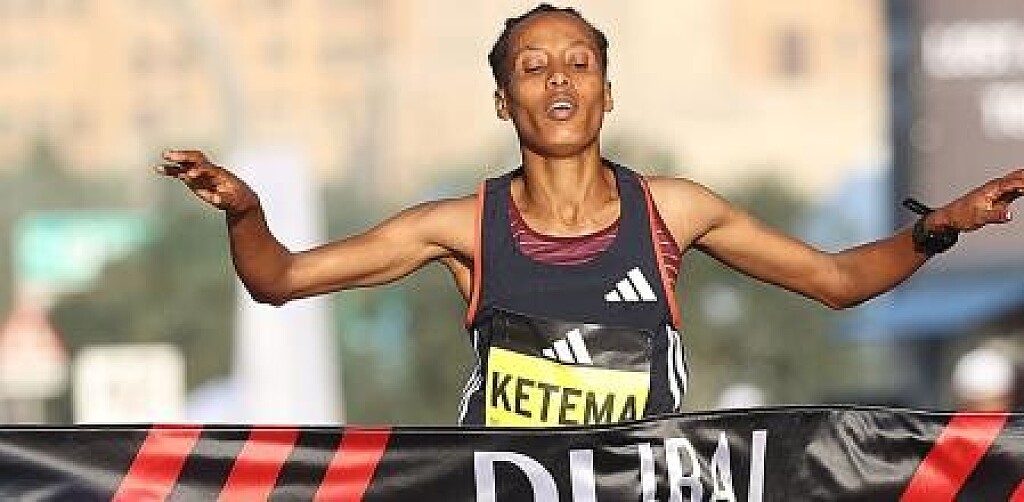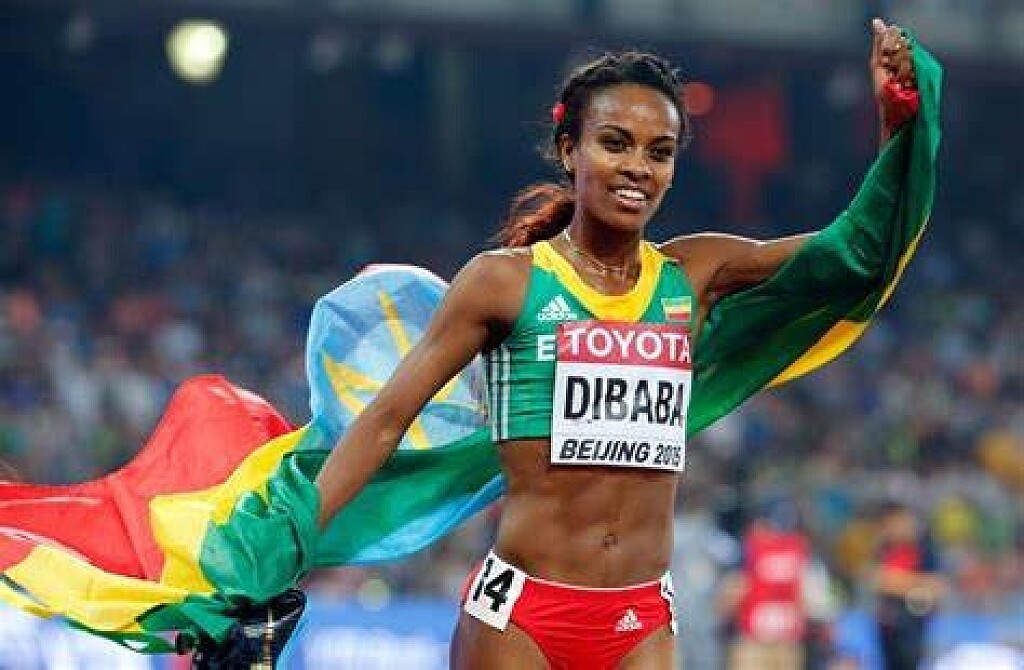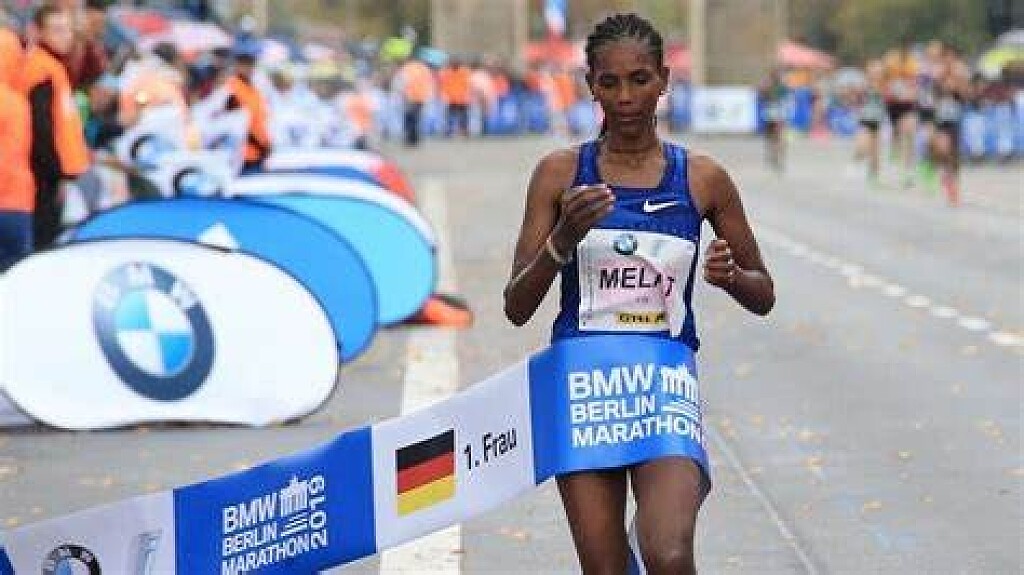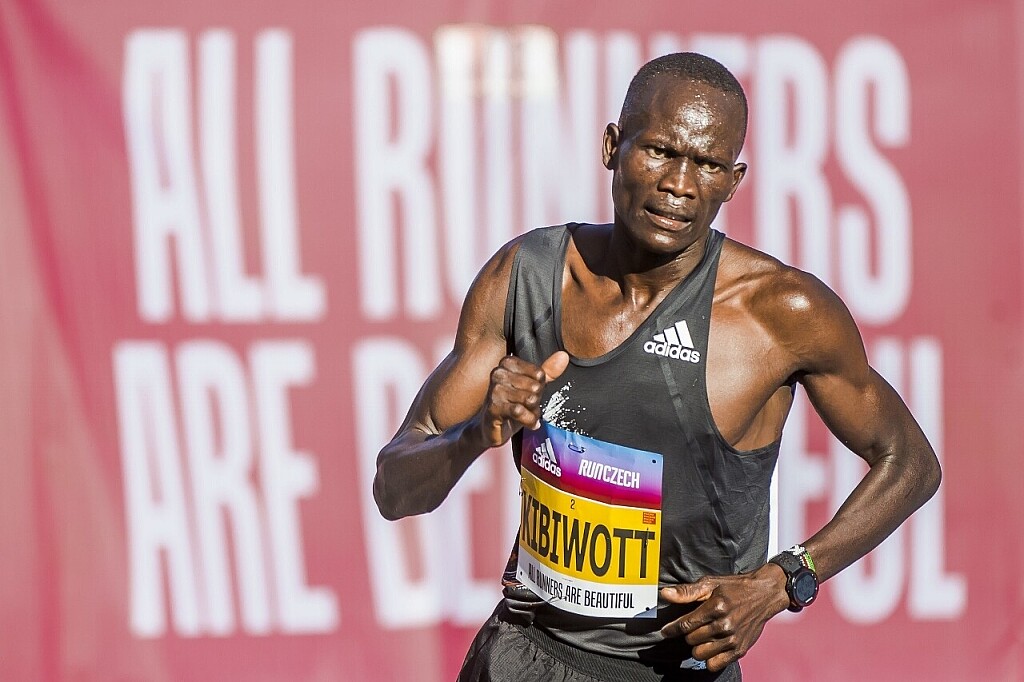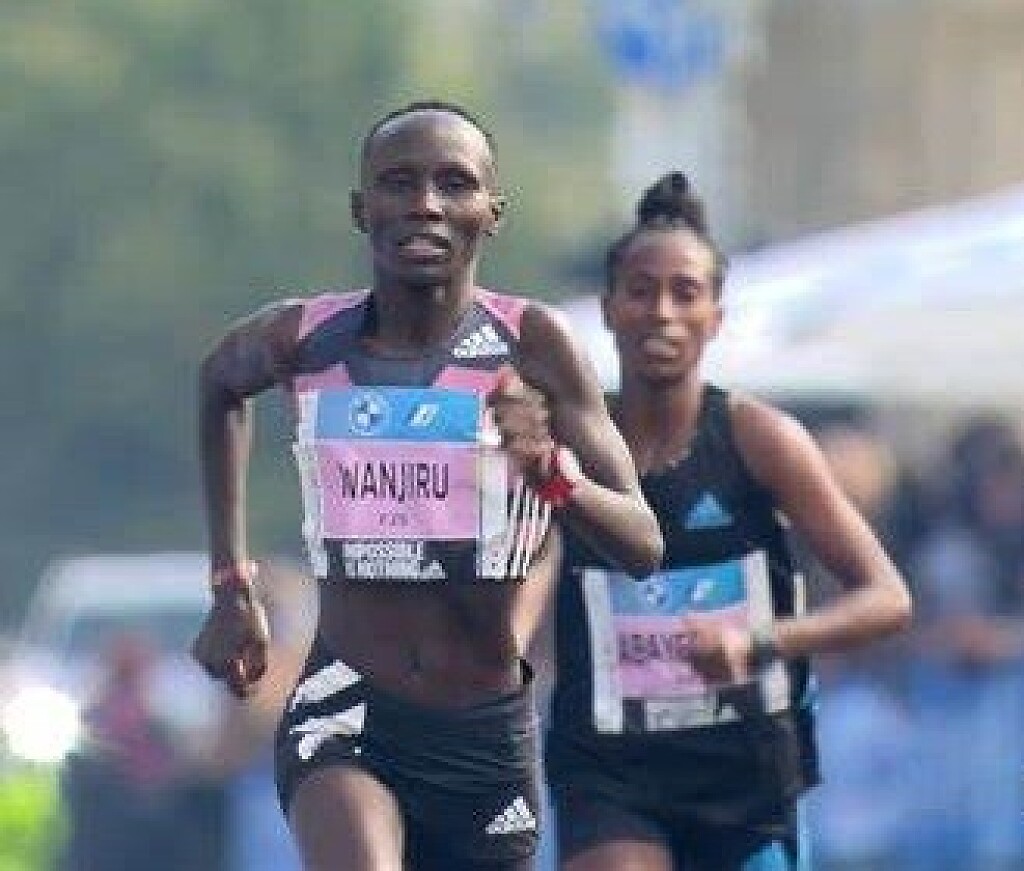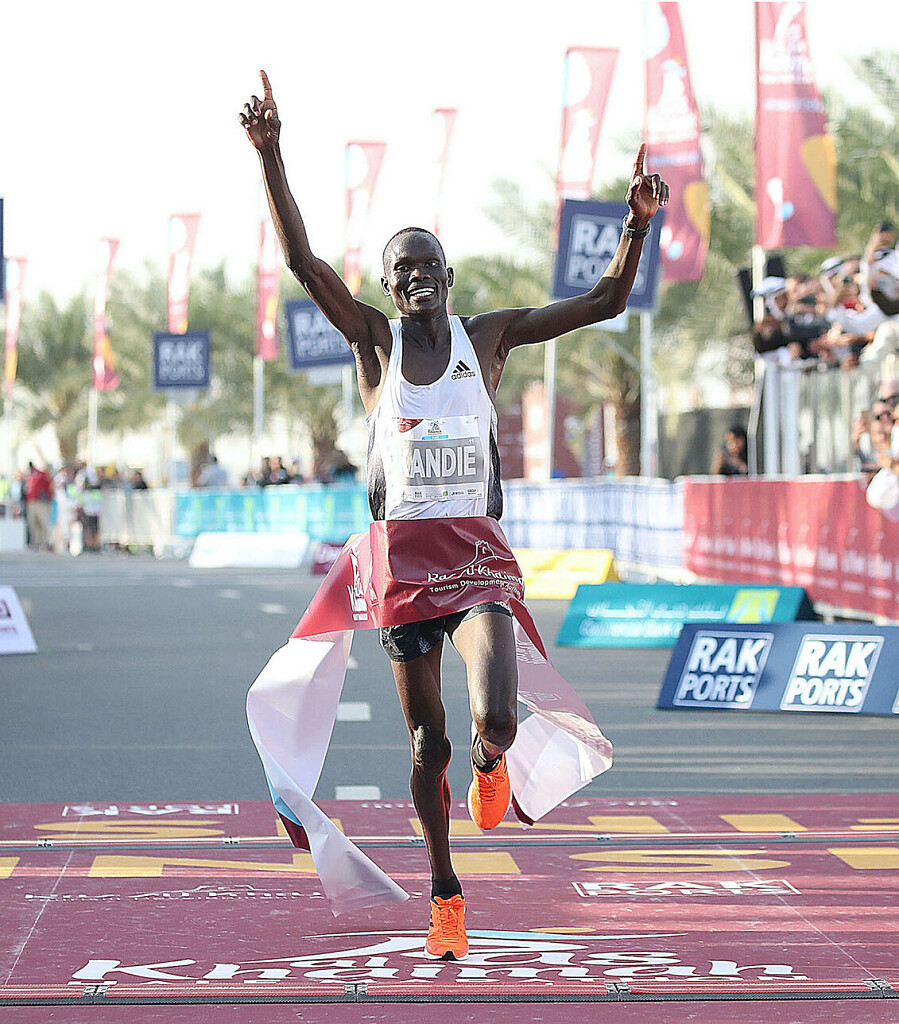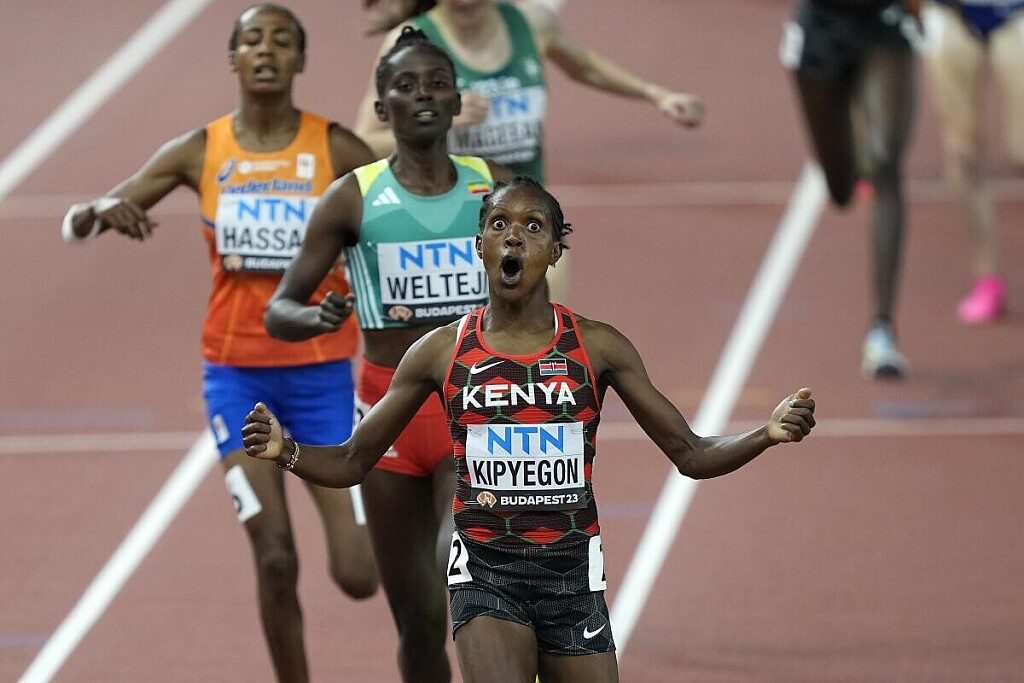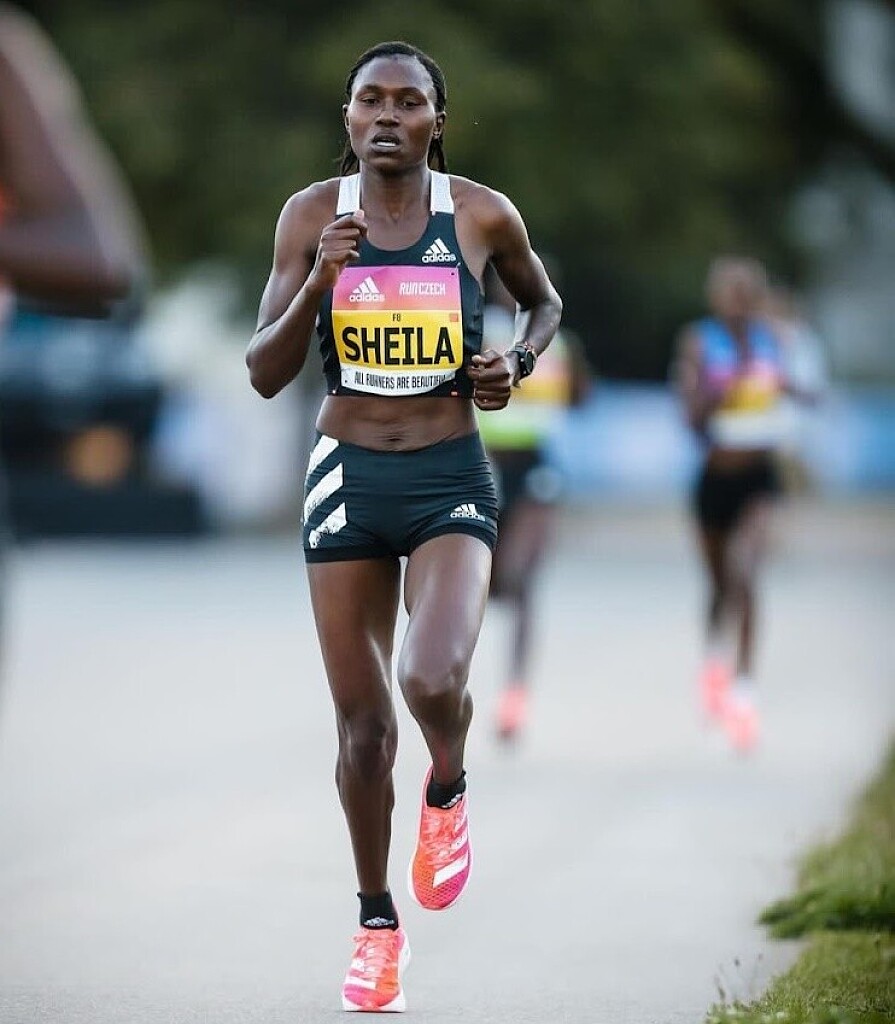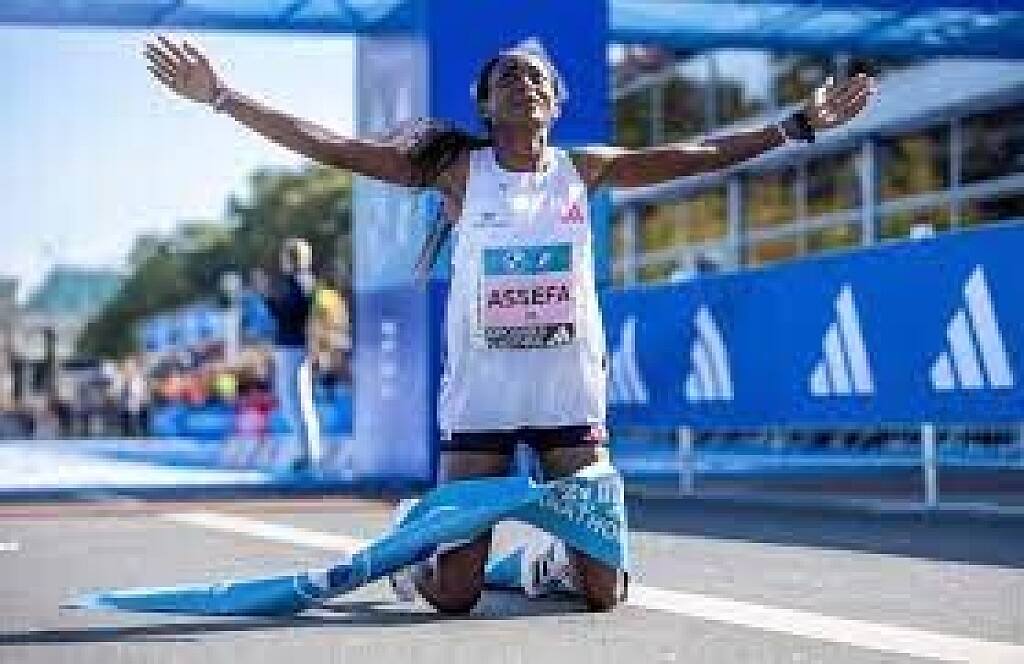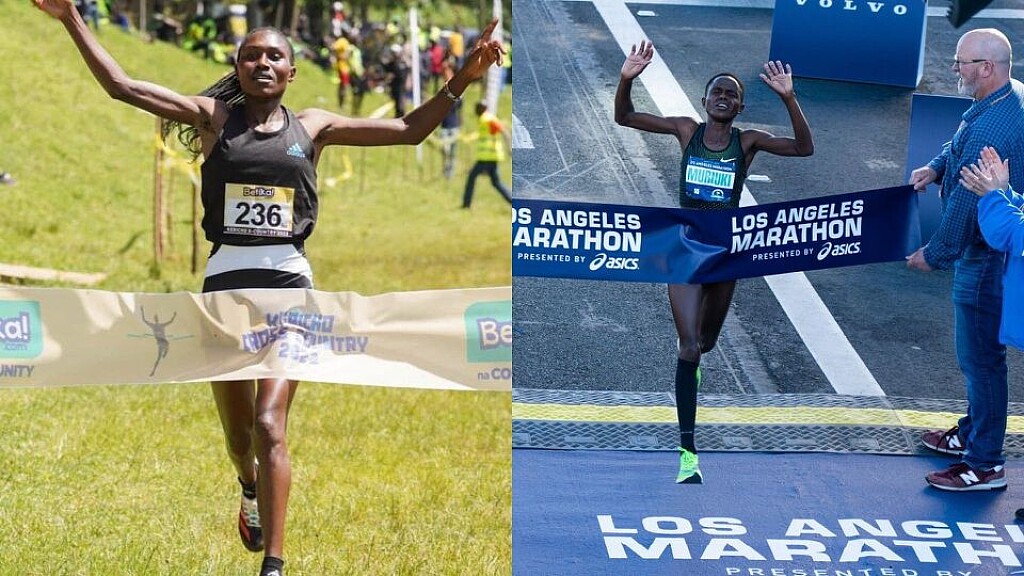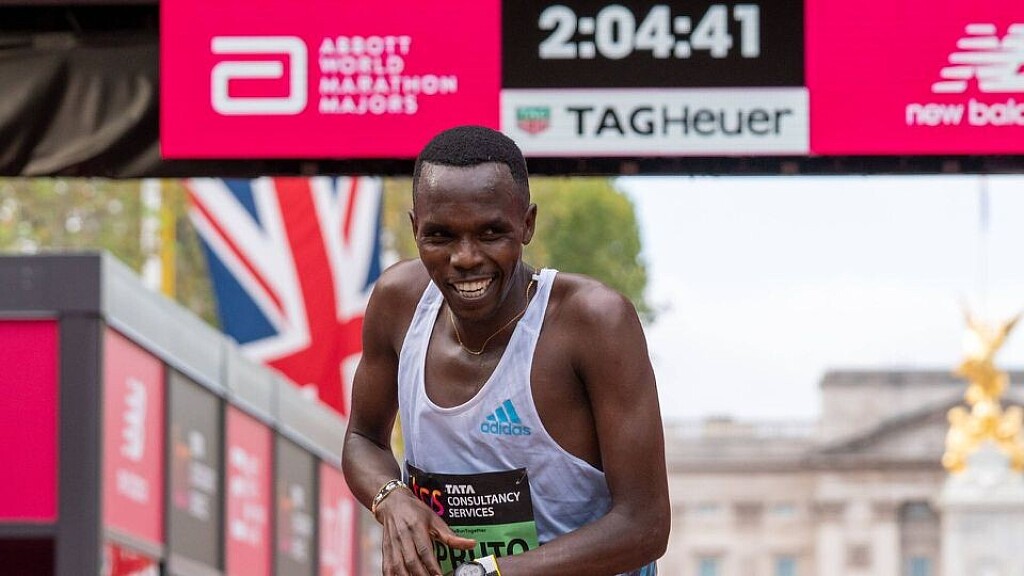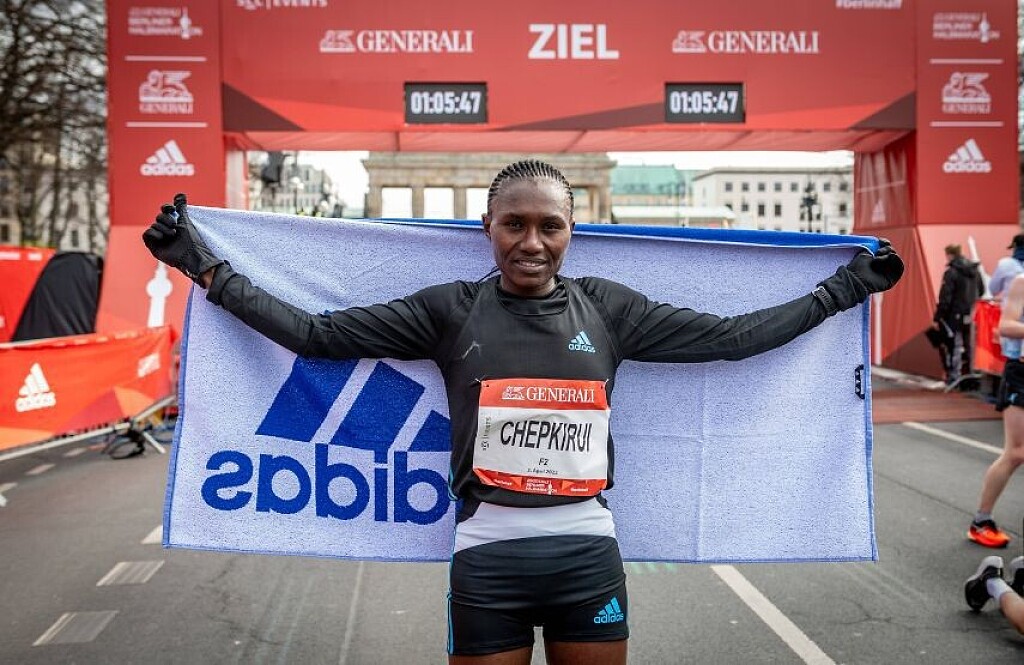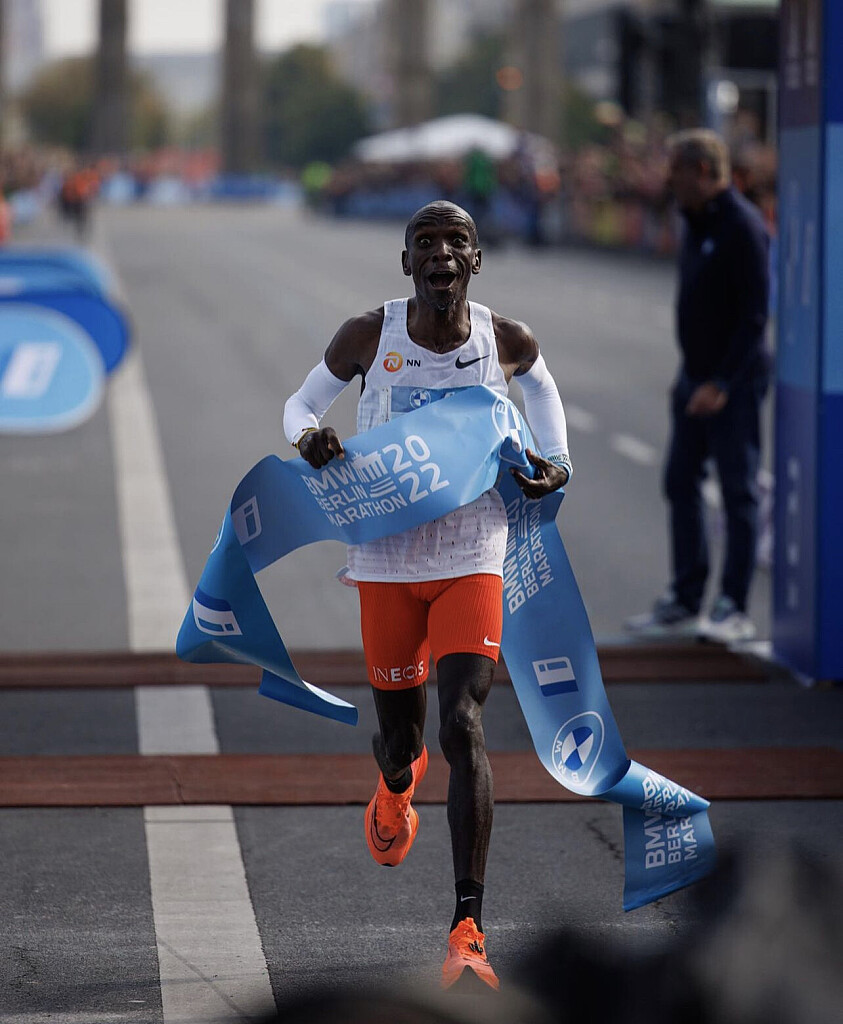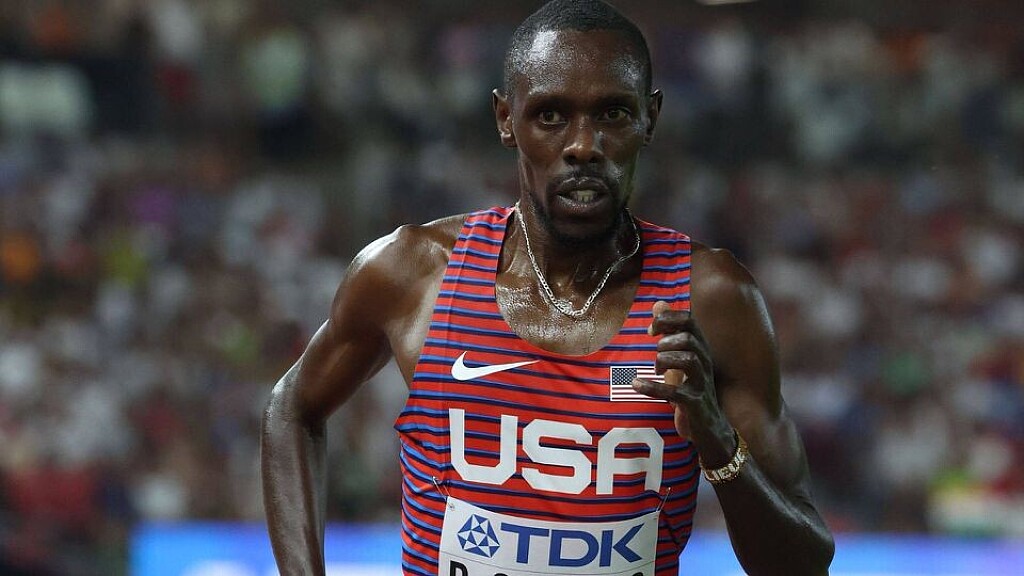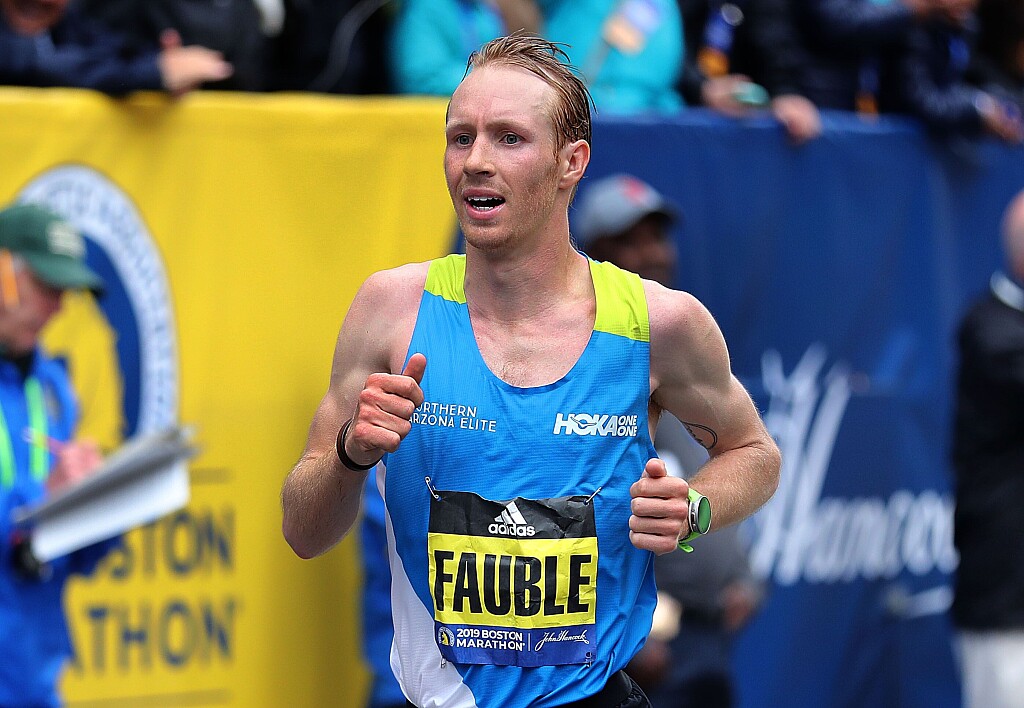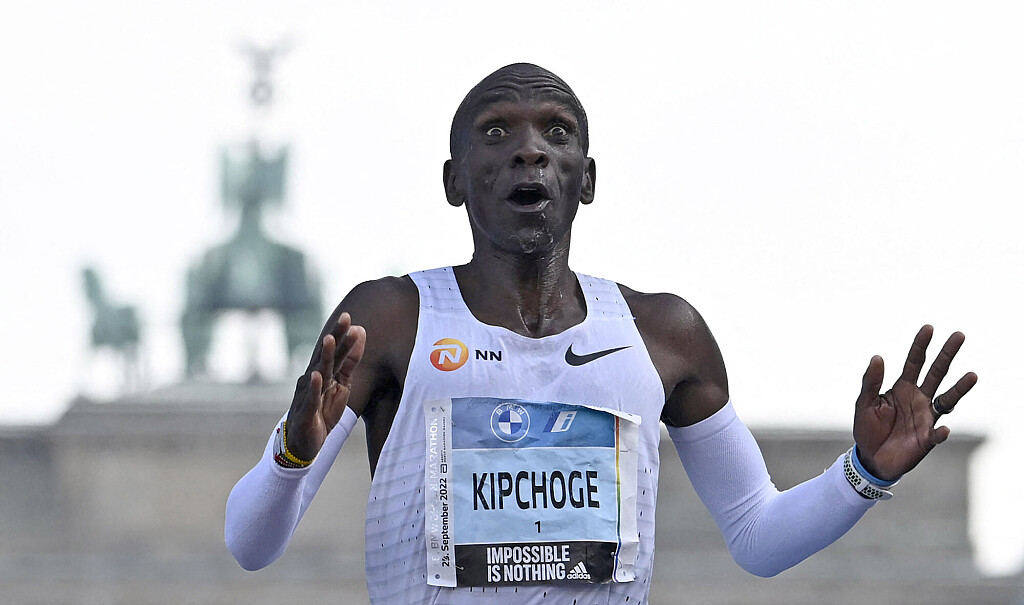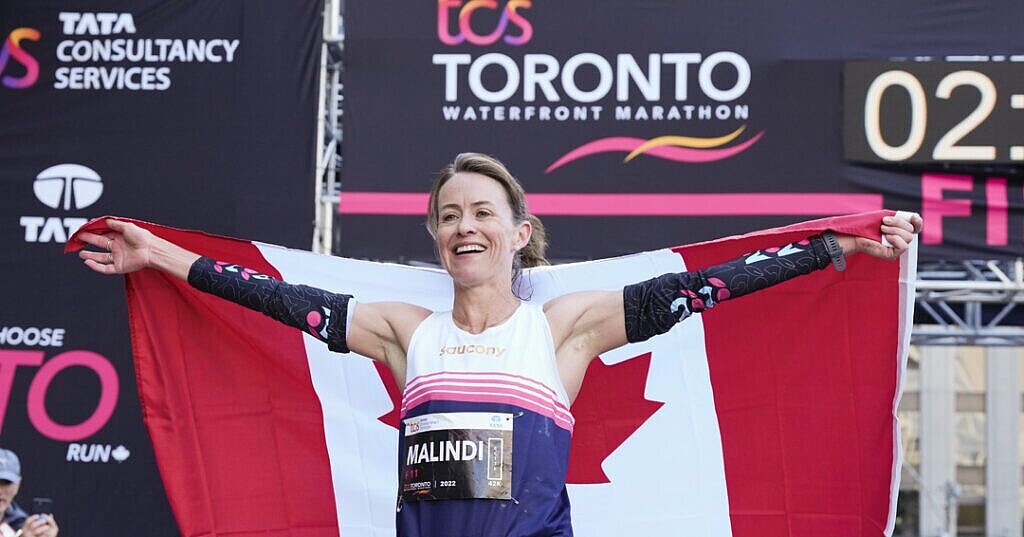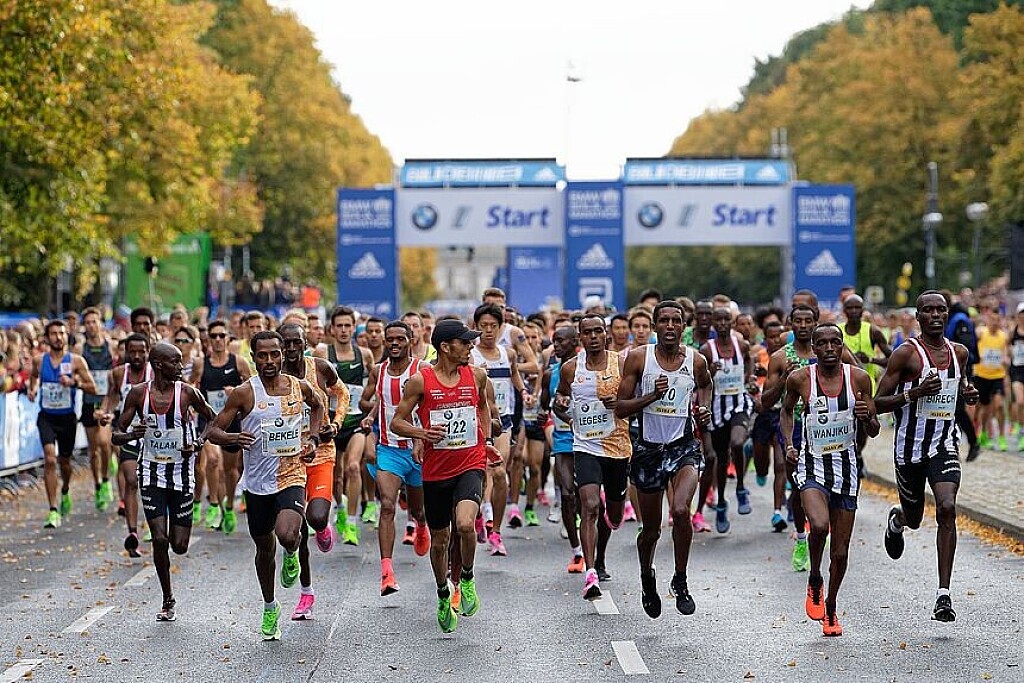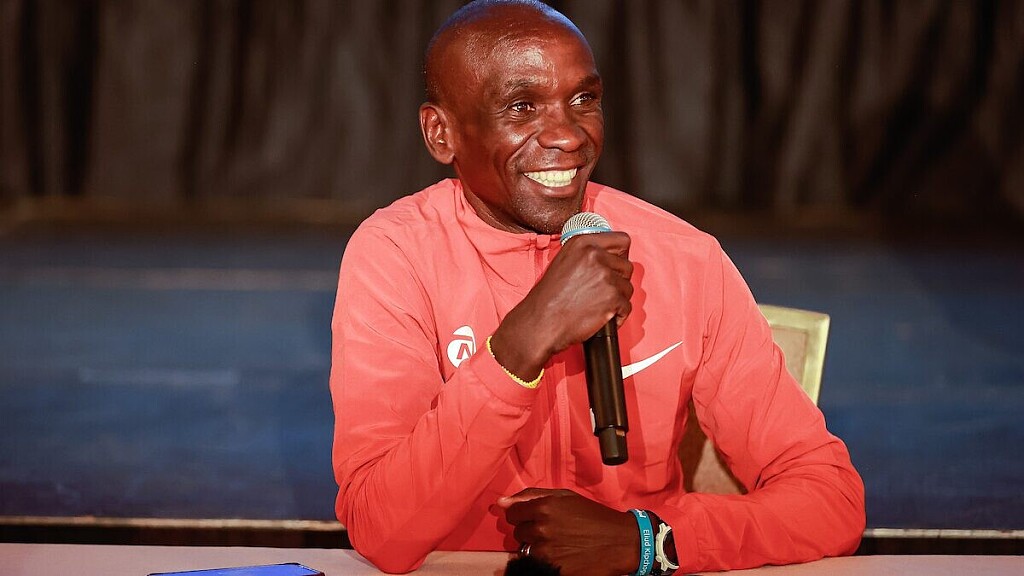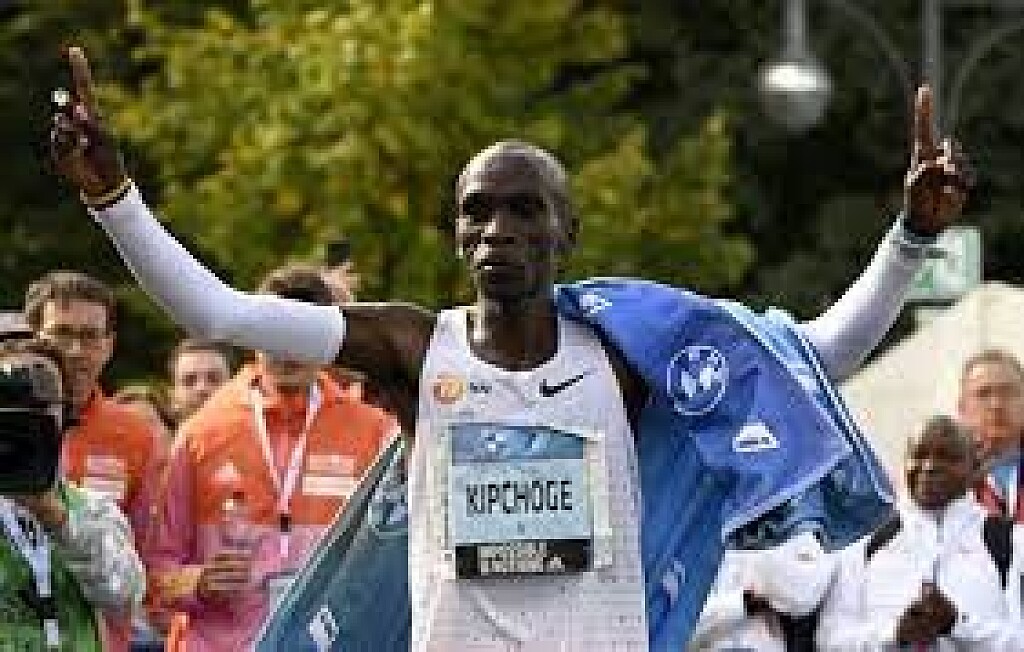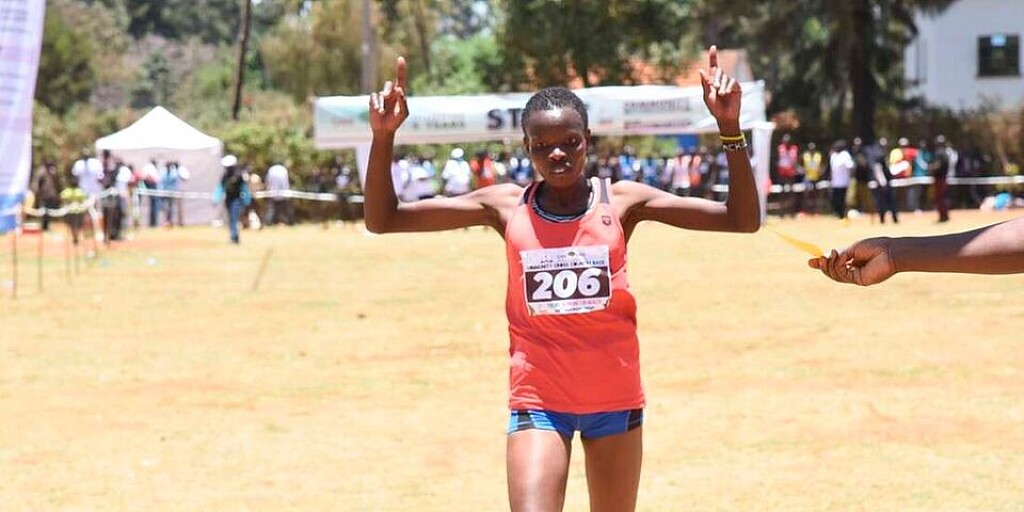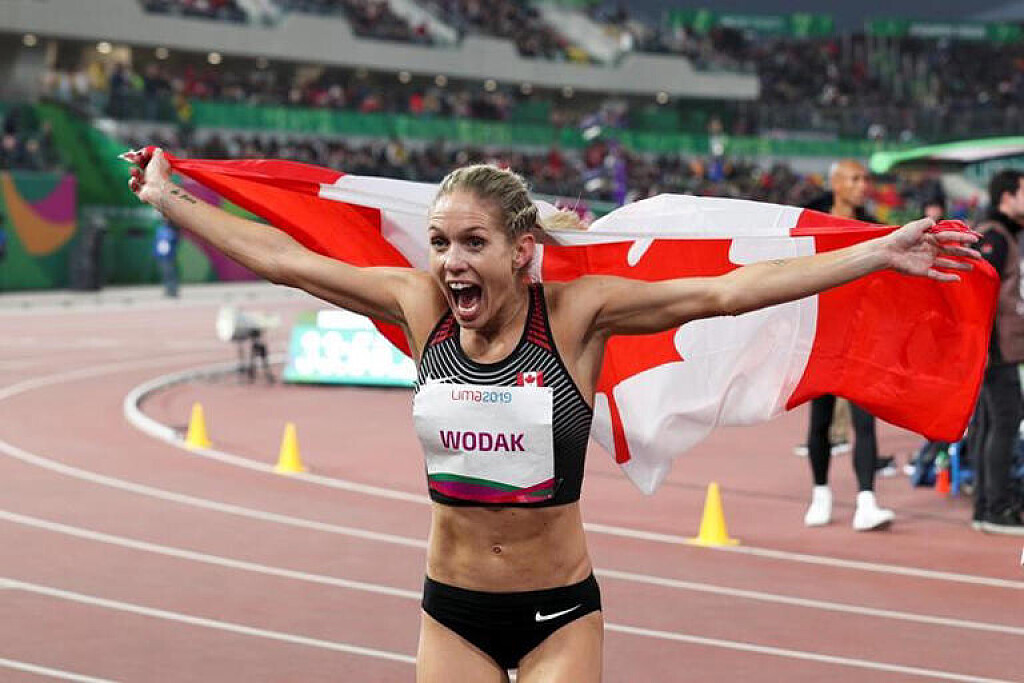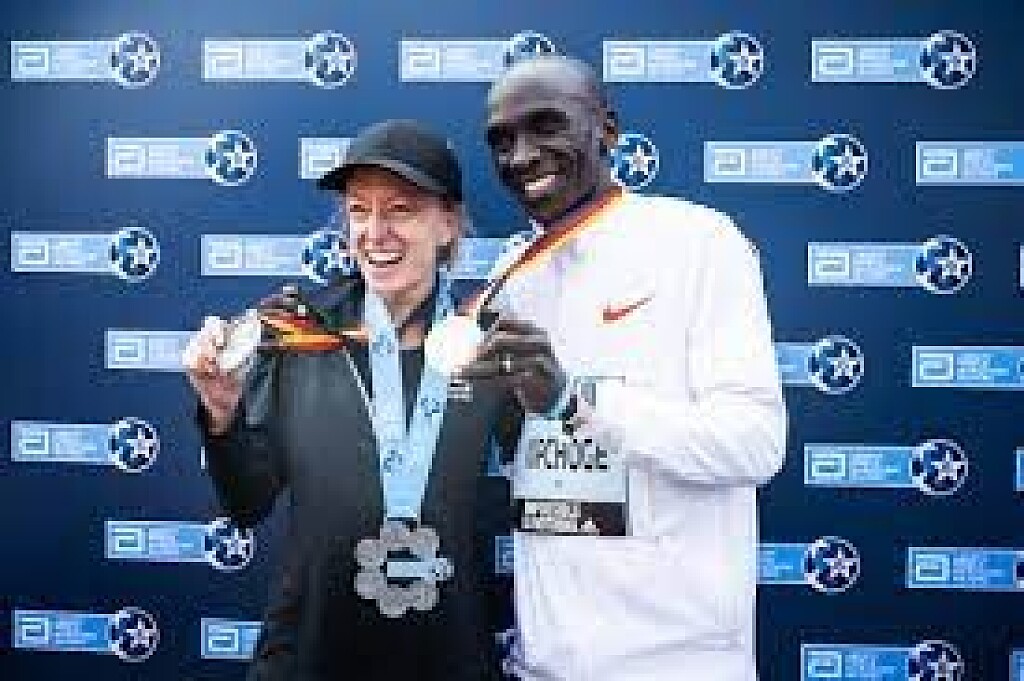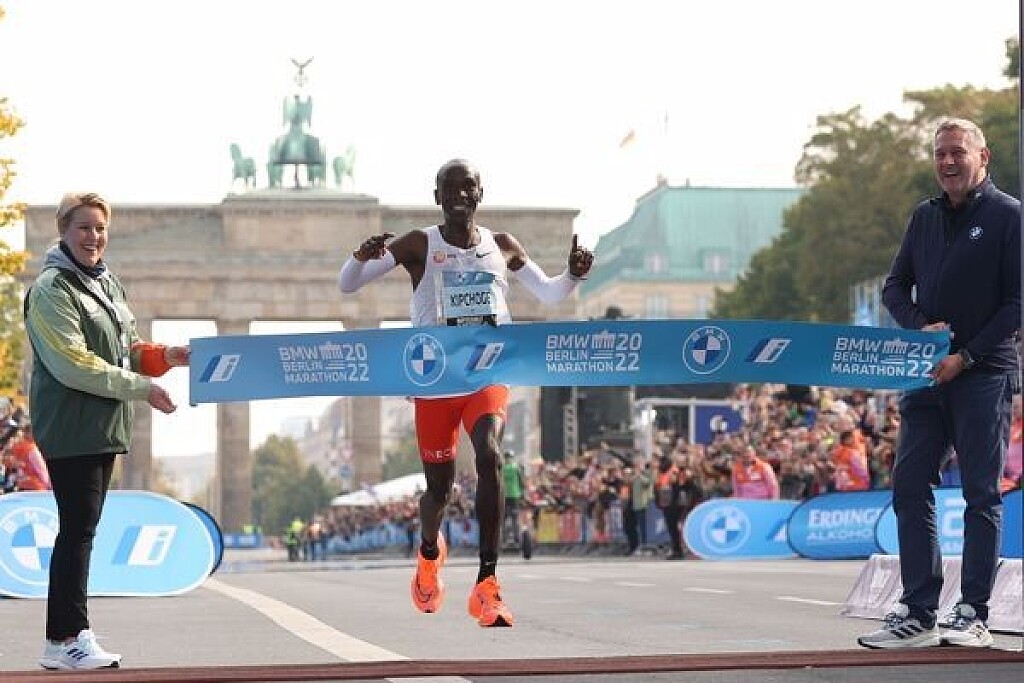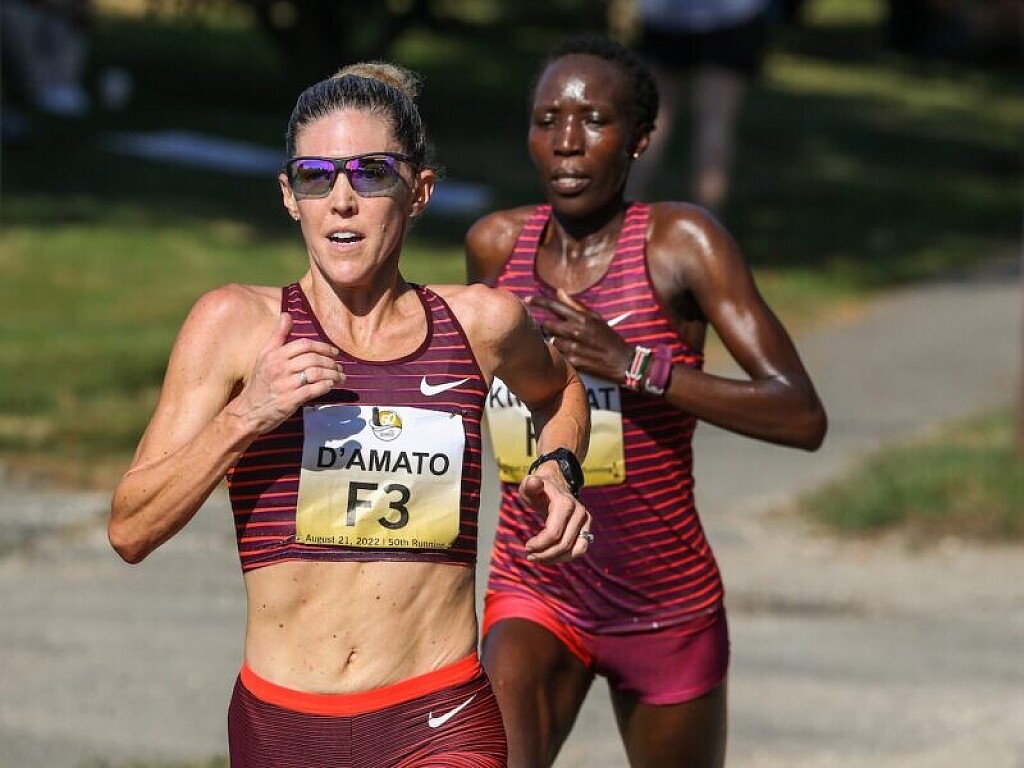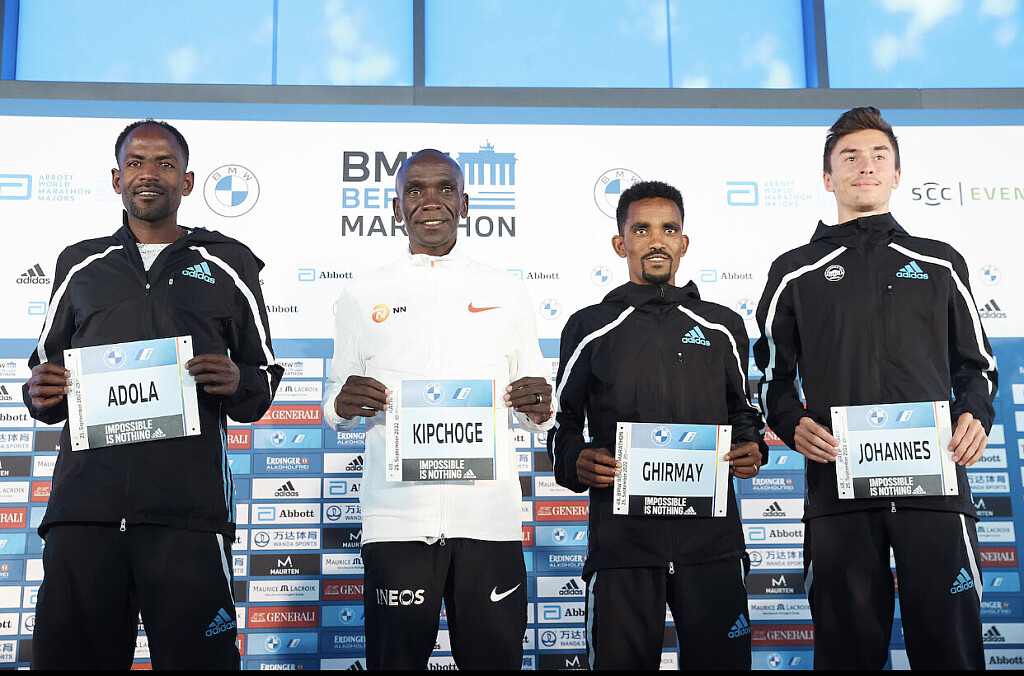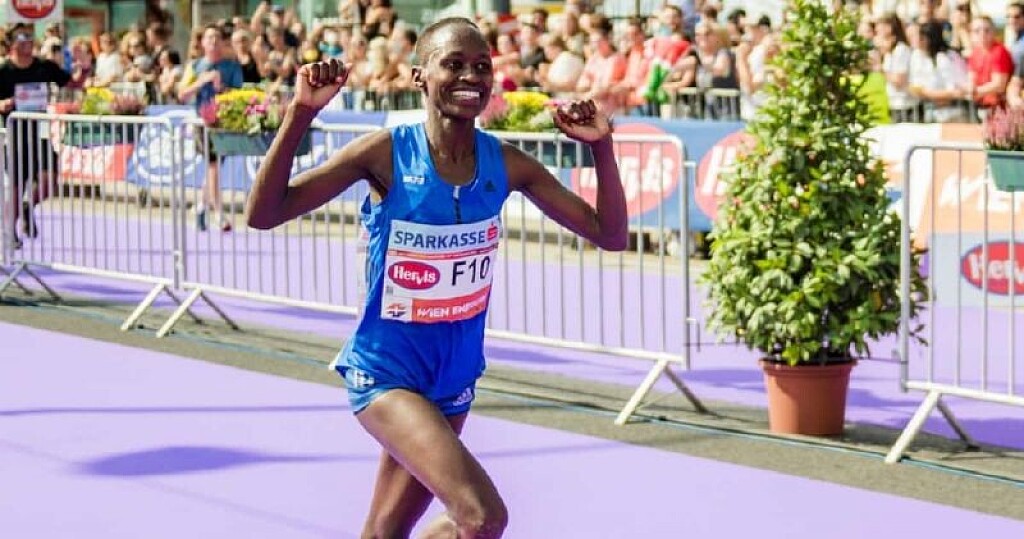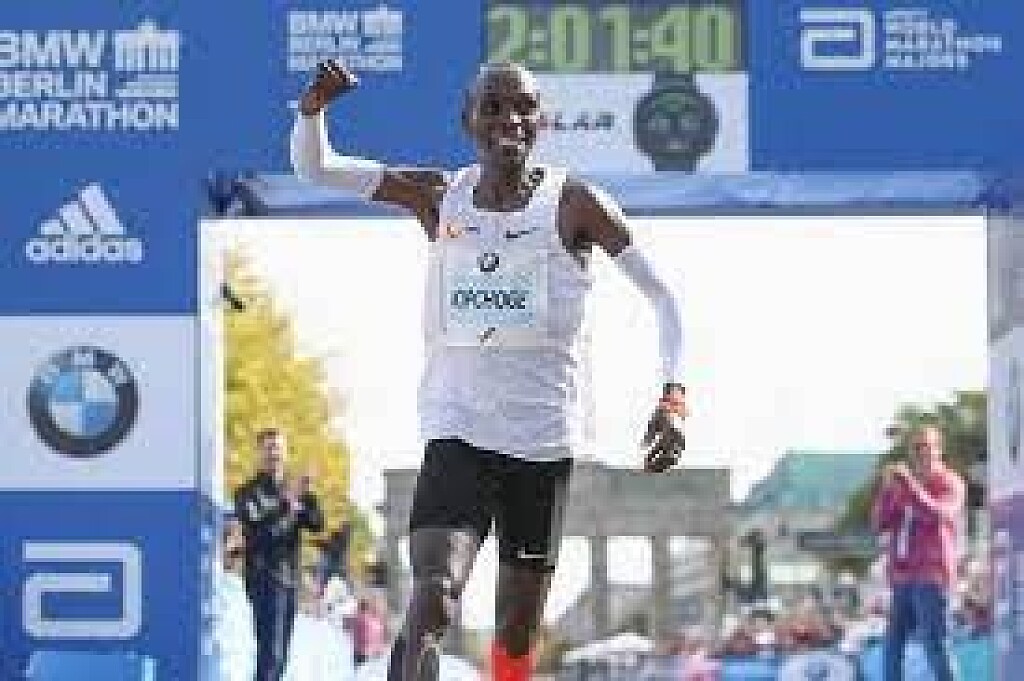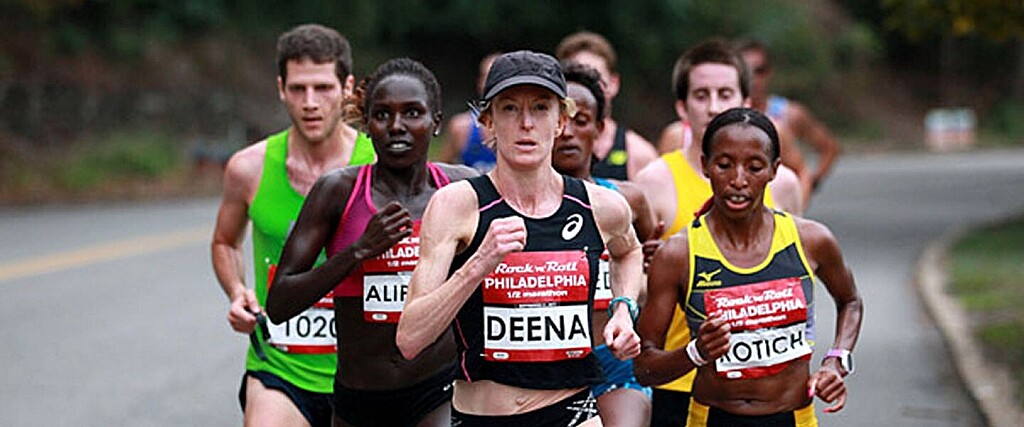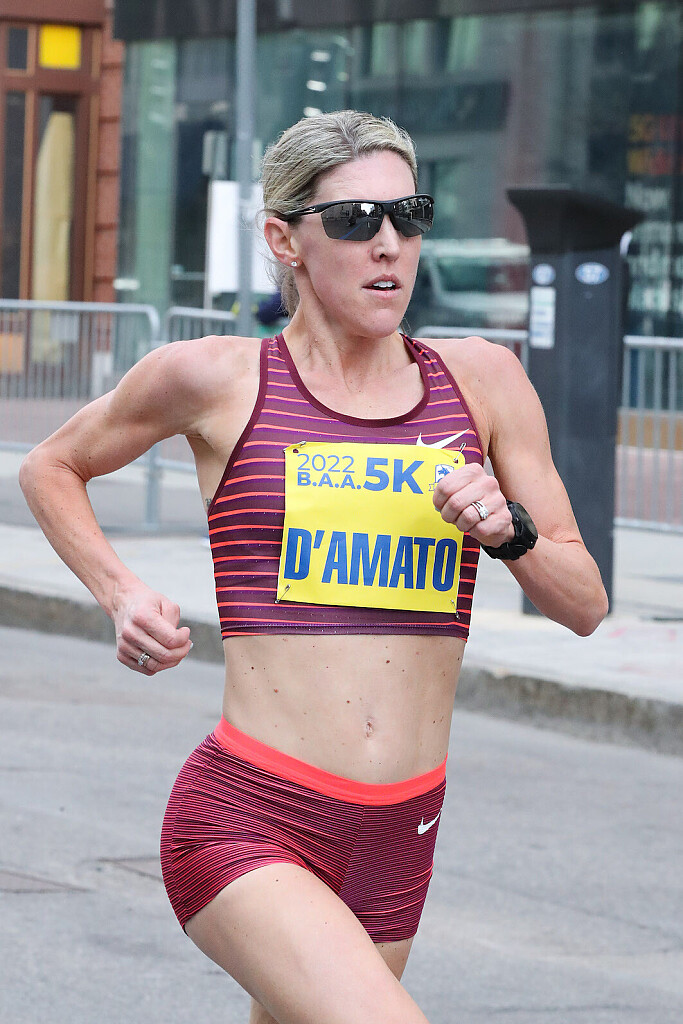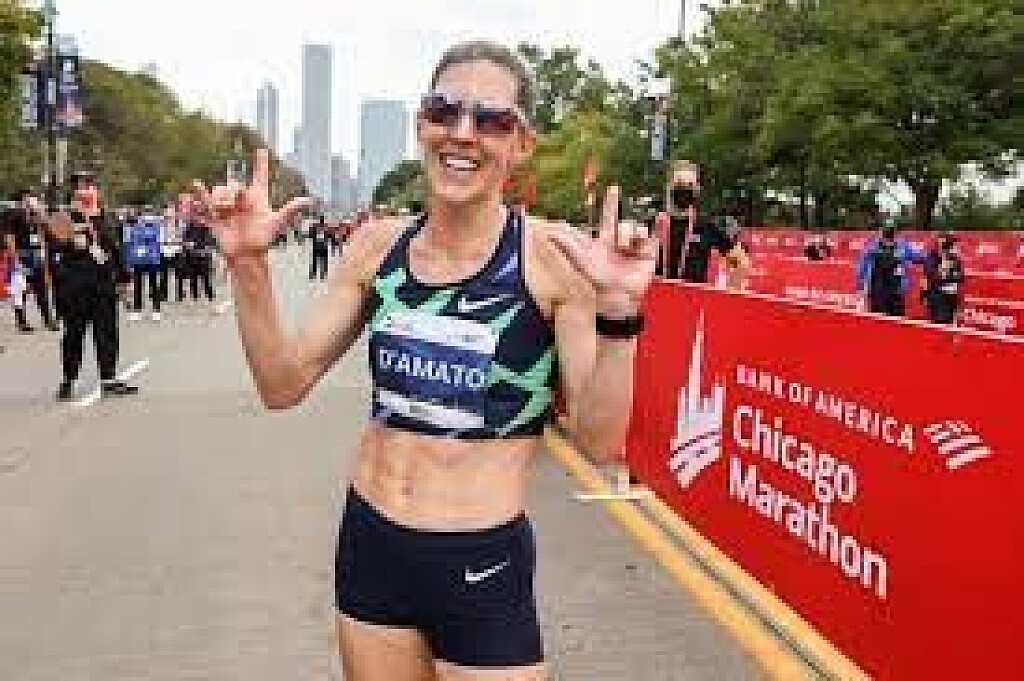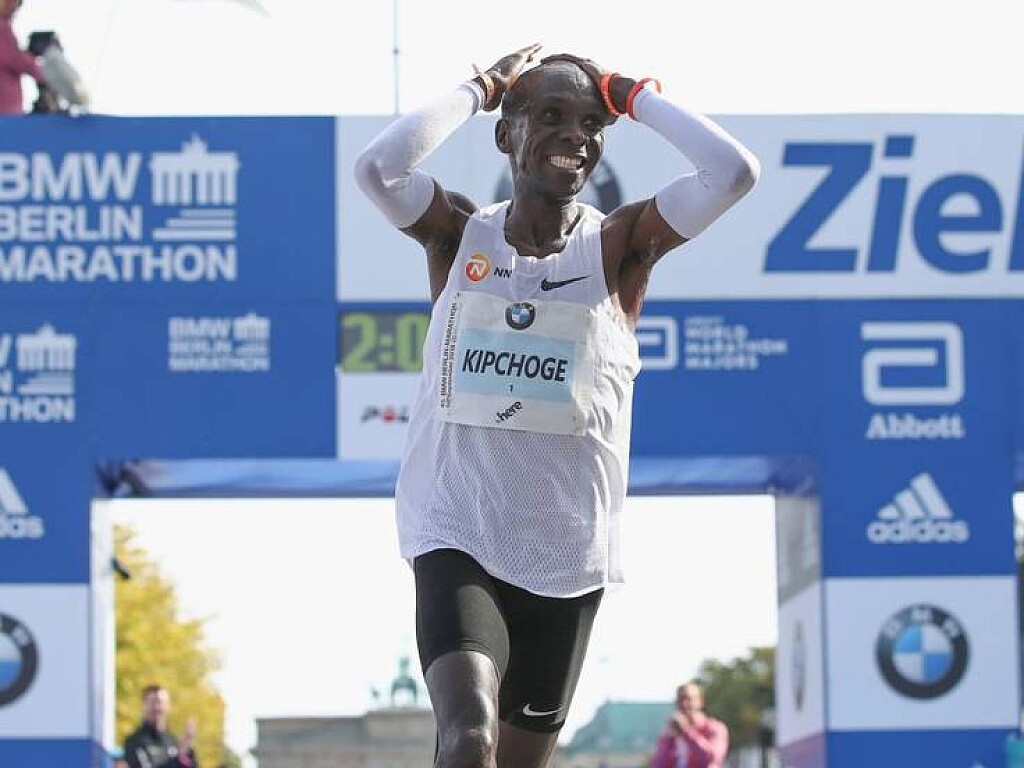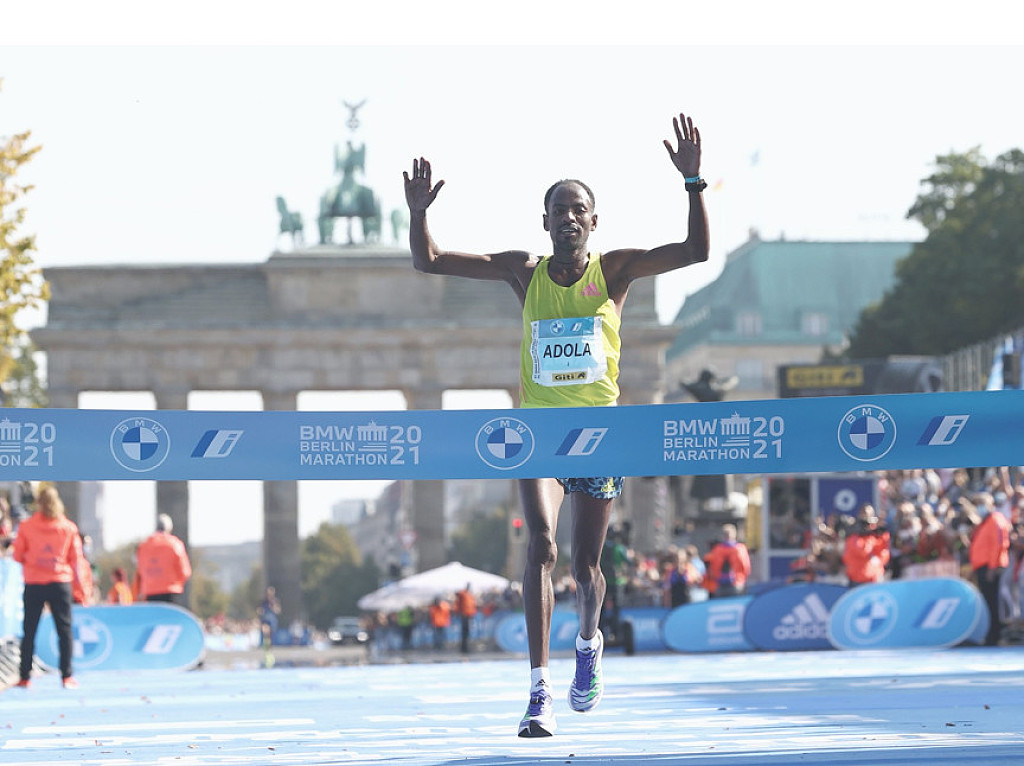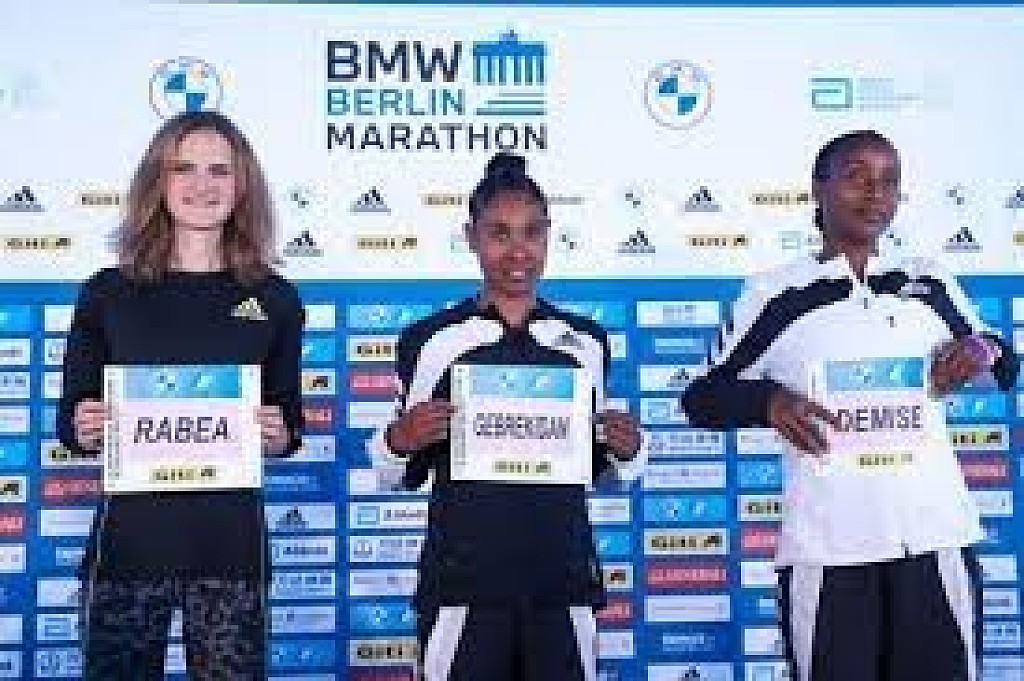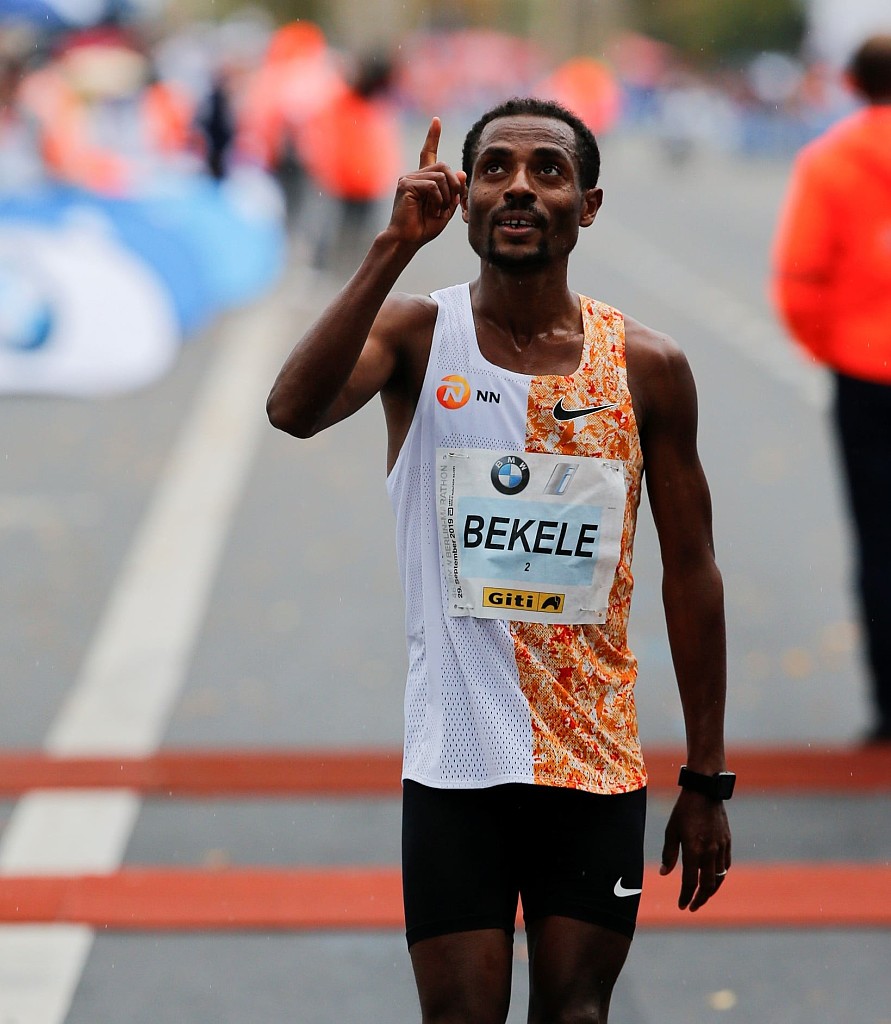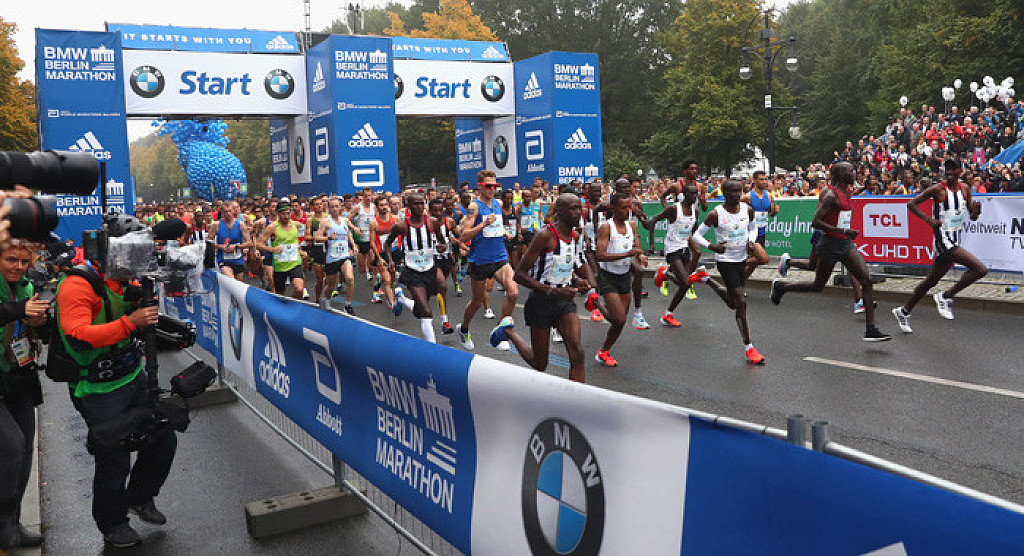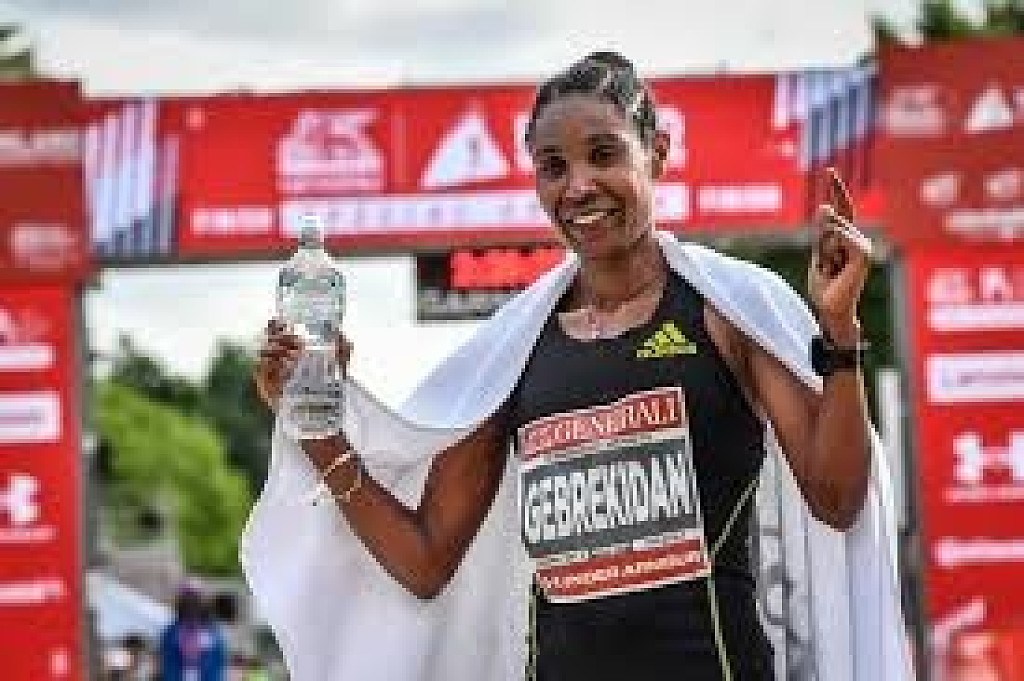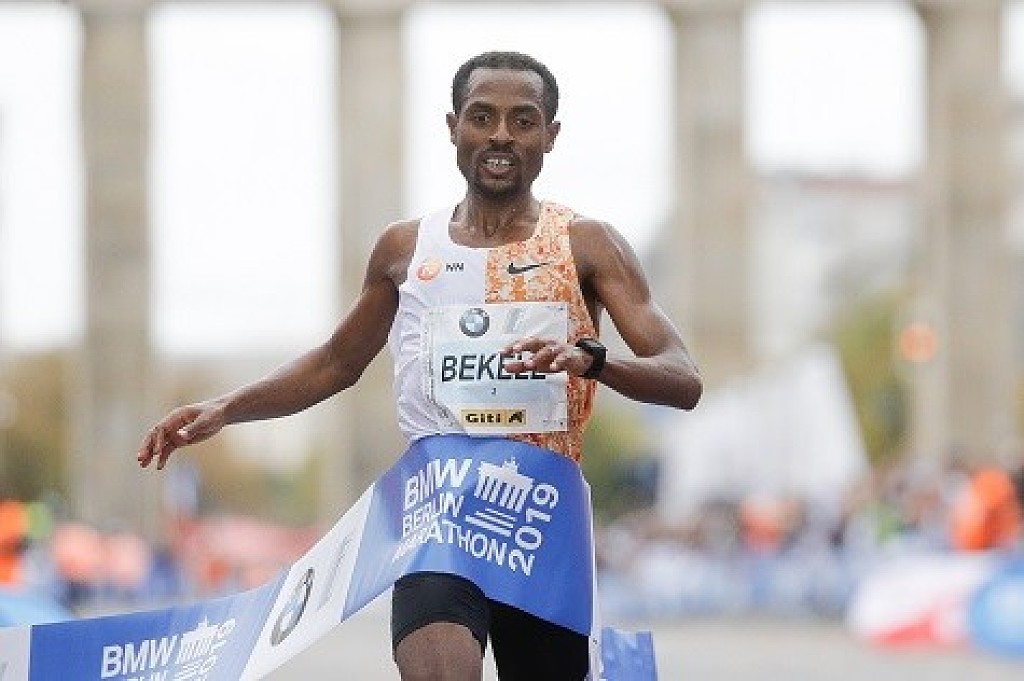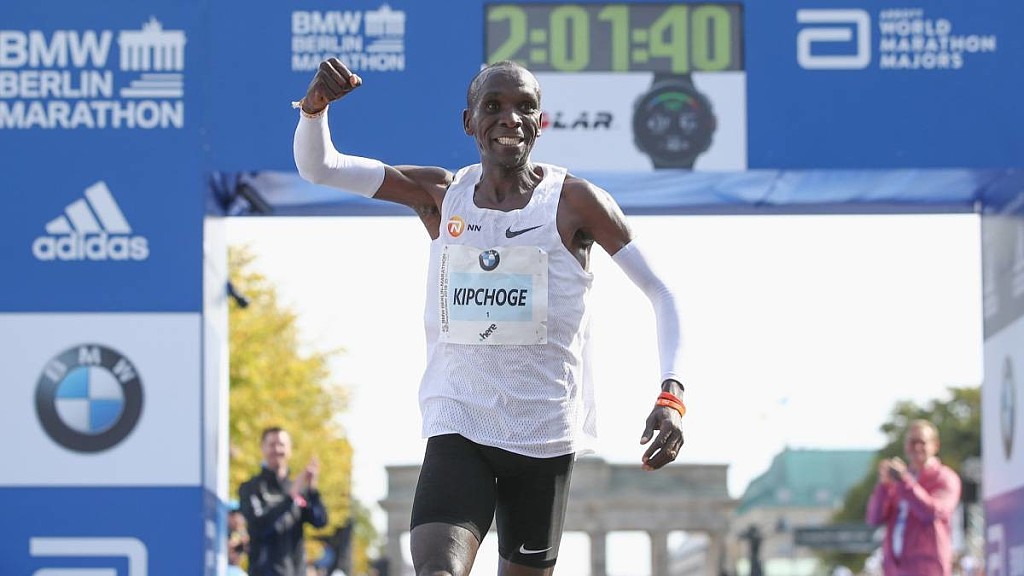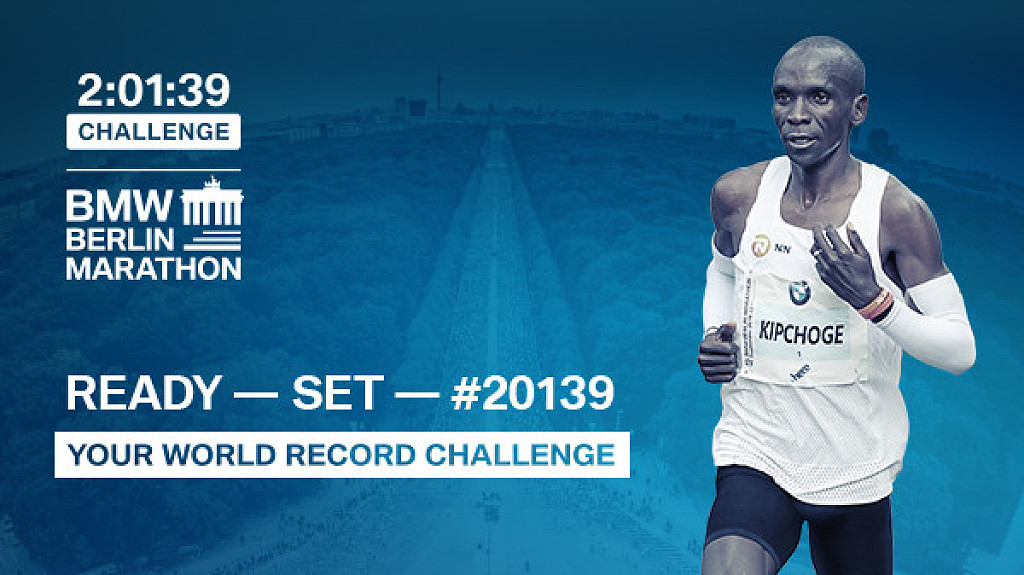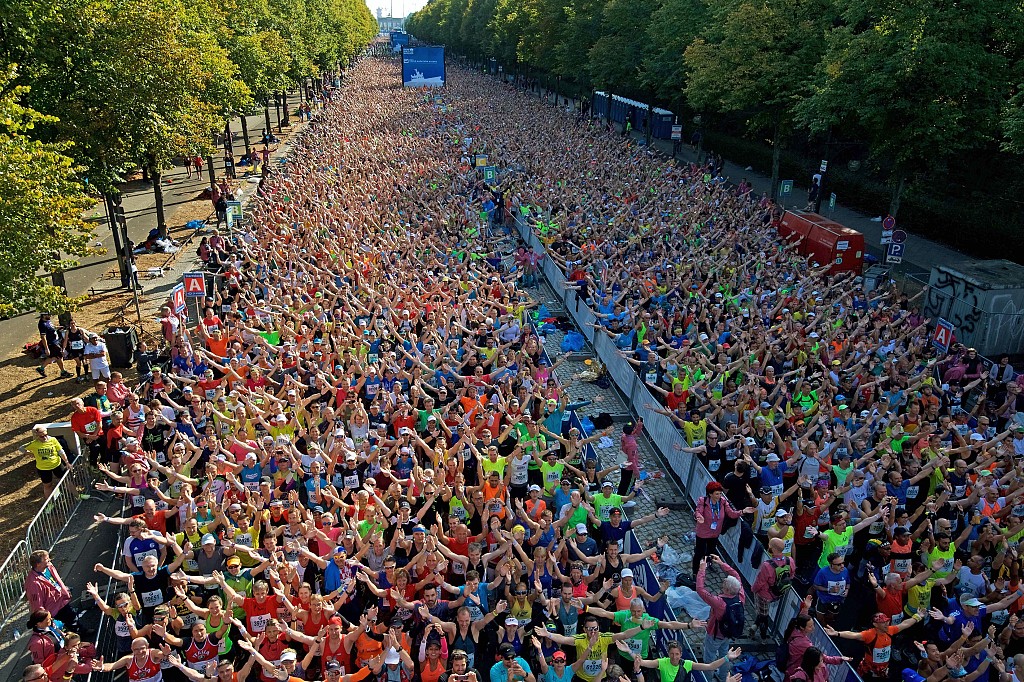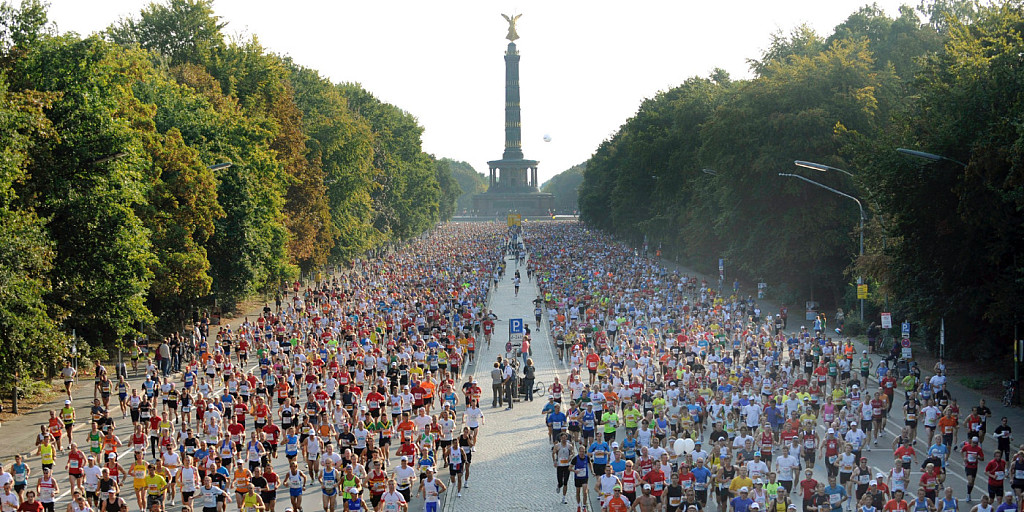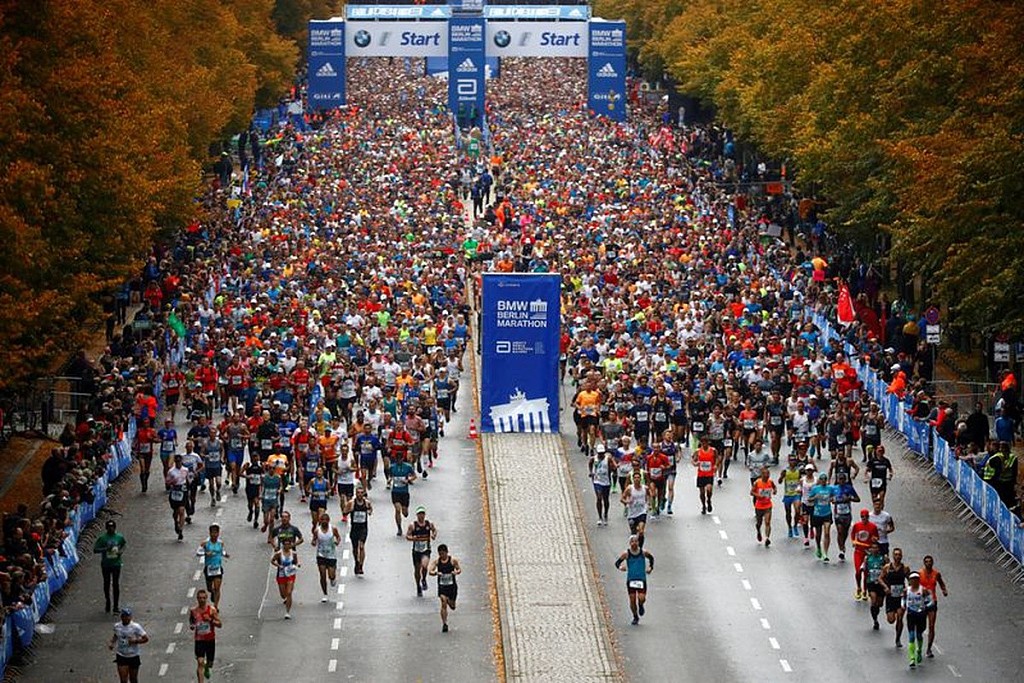Running News Daily
Running News Daily is edited by Bob Anderson. Send your news items to bob@mybestruns.com Advertising opportunities available. Train the Kenyan Way at KATA Kenya and Portugal owned and operated by Bob Anderson. Be sure to catch our movie A Long Run the movie KATA Running Camps and KATA Potato Farms - 31 now open in Kenya! https://kata.ke/
Index to Daily Posts · Sign Up For Updates · Run The World Feed
Sabastian Sawe Dominates in Berlin With 2:02:16 Victory
Berlin, September 21, 2025 — The Berlin Marathon once again lived up to its reputation as the world’s fastest stage for marathon running. Kenya’s Sabastian Sawe stormed to victory on Sunday, clocking 2:02:16, the fastest marathon time in the world this year and the fourth-fastest ever run on the streets of Berlin.
Sawe, already the reigning champion from Valencia (2024) and London (2025), extended his unbeaten record over the marathon distance. From the gun, he attacked with confidence, hitting 5km in 14:09and 10km in 28:26, well inside world-record pace. By halfway, his split of 60:16 electrified the Berlin crowds and suggested history might be on the cards.
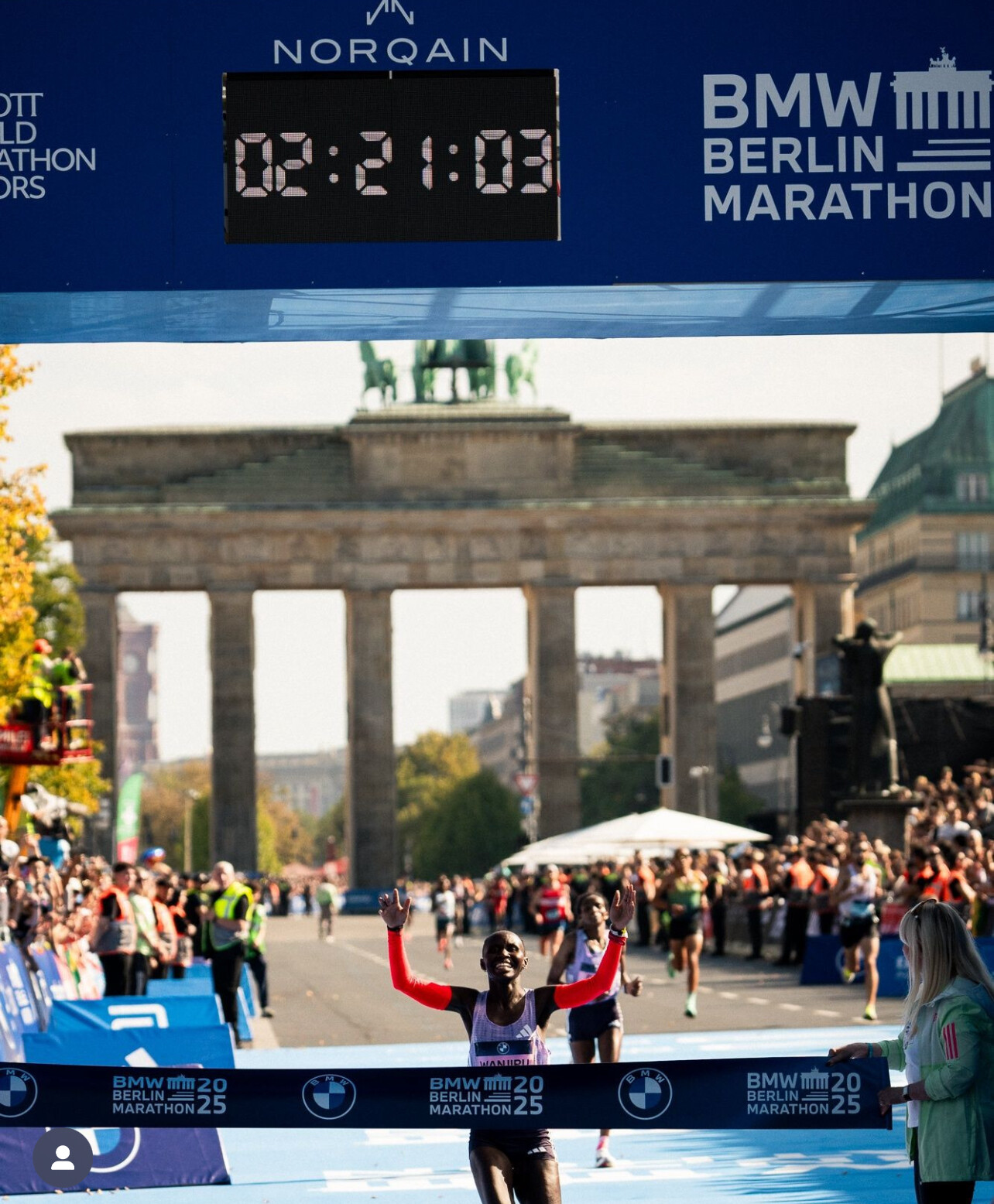
But conditions proved decisive. Unseasonably warm temperatures — climbing to 25°C (mid-70s°F) — and the loss of his pacemakers before the 23km mark forced Sawe to shoulder the workload alone. Though the second half slowed, he maintained control and powered down Unter den Linden to the Brandenburg Gate, finishing with a commanding lead.
Behind him, Akira Akasaki of Japan impressed with a breakthrough run, finishing second in 2:06:15, while Ethiopia’s Chimdessa Debele held on for third in 2:06:57.
Wanjiru Outkicks Dida in Women’s Duel
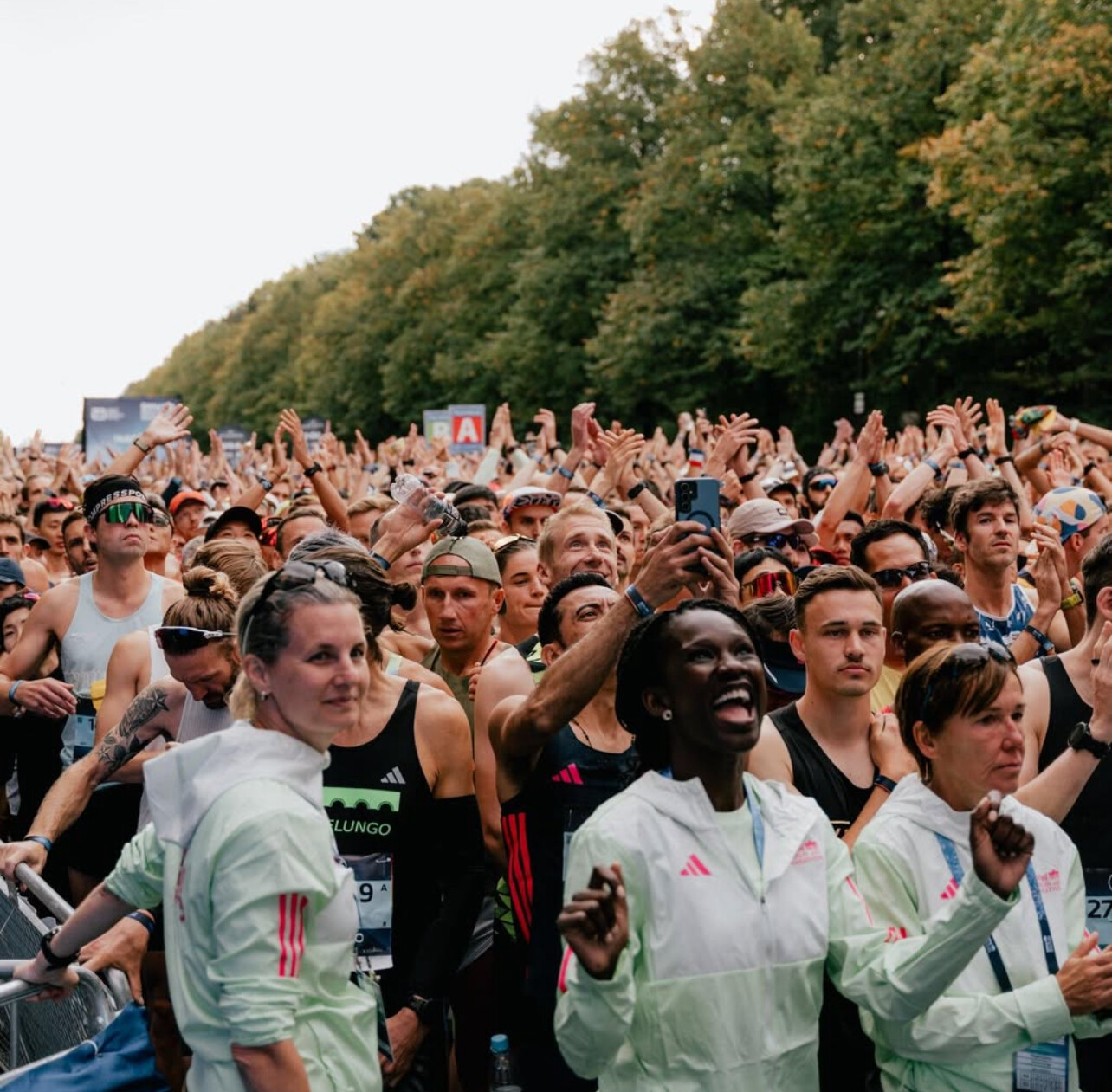
The women’s race produced its own drama, with Kenya’s Rosemary Wanjiru edging Ethiopia’s Dera Dida by just three seconds. Wanjiru clocked 2:21:05 after a decisive surge past the 25km mark. Dida followed in 2:21:08, while fellow Ethiopian Azmera Gebru completed the podium in 2:21:29.
“I knew it would come down to the final kilometers,” Wanjiru said afterward. “The crowd in Berlin gave me so much energy.”
Berlin’s Enduring Legacy
This year’s edition was the 51st running of the Berlin Marathon, and once again, the German capital showcased why it is considered the “world record course.” Since 2003, the men’s world record has been broken eight times in Berlin, most recently by Eliud Kipchoge’s 2:01:09 in 2022. On the women’s side, Tigst Assefa stunned the world here in 2023 with her record 2:11:53.
While Sawe fell short of rewriting those marks, his performance in the heat confirmed his status as the man to beat in global marathon running. With three straight victories in world-class fields, he has announced himself as the heir apparent to Kipchoge.
Results at a Glance
Men
1. Sabastian Sawe (Kenya) — 2:02:16
2. Akira Akasaki (Japan) — 2:06:15
3. Chimdessa Debele (Ethiopia) — 2:06:57
Women
1. Rosemary Wanjiru (Kenya) — 2:21:05
2. Dera Dida (Ethiopia) — 2:21:08
3. Azmera Gebru (Ethiopia) — 2:21:29
by Boris Baron
Login to leave a comment
BMW Berlin Marathon
The story of the BERLIN-MARATHON is a story of the development of road running. When the first BERLIN-MARATHON was started on 13th October 1974 on a minor road next to the stadium of the organisers‘ club SC Charlottenburg Berlin 286 athletes had entered. The first winners were runners from Berlin: Günter Hallas (2:44:53), who still runs the BERLIN-MARATHON today, and...
more...Sawe and Wanjiru Lead Record-Setting Fields at Berlin Marathon
A world-class lineup is set for the 51st edition of the BMW Berlin Marathon on September 21. Kenyans Sabastian Sawe and Rosemary Wanjiru headline the fields with personal bests of 2:02:05 and 2:16:14, respectively, making them clear favorites. Yet the men’s race also includes defending champion Milkesa Mengesha of Ethiopia, who clocked his 2:03:17 PB on this course last year.
The men’s start list features 10 athletes with personal bests under 2:05, while six women have already broken 2:19. By the numbers, it is the strongest PO Berlin lineup in history. The flat and fast course has been the stage for 13 world records over the past five decades, and another swift contest seems inevitable.
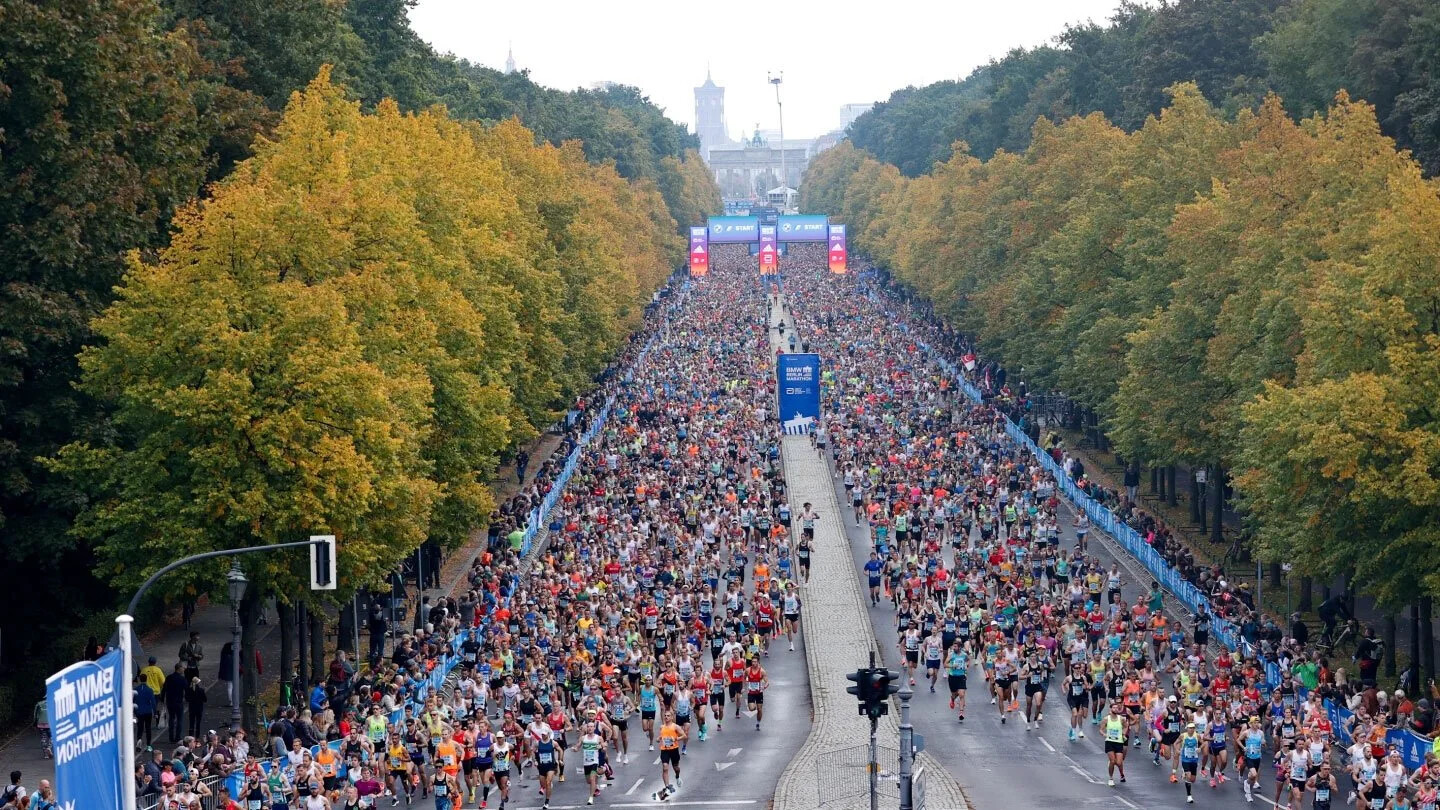
Organizers also achieved something remarkable: both Japanese marathon record holders will compete. Kengo Suzuki holds the men’s national record at 2:04:56, while Honami Maeda is the fastest Japanese woman of all time with her 2:18:59 mark. For the first time in at least 25 years, a city marathon outside Japan has managed to bring together both record holders, underscoring Berlin’s global prestige in long-distance running.
Selected Top Entries
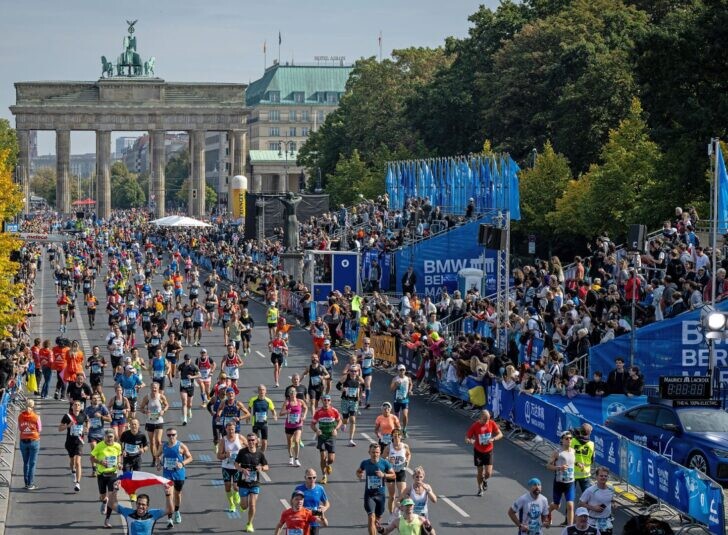
Men
• Sabastian Sawe (KEN) – 2:02:05, Valencia 2024
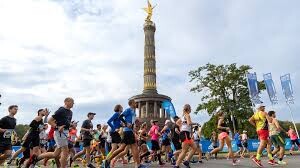
• Gabriel Geay (TAN) – 2:03:00, Valencia 2022
• Milkesa Mengesha (ETH) – 2:03:17, Berlin 2024
• Haymanot Alew (ETH) – 2:03:31, Berlin 2024
• Guye Adola (ETH) – 2:03:46, Berlin 2017
• Daniel Mateiko (KEN) – 2:04:24, Valencia 2024
• Kengo Suzuki (JPN) – 2:04:56, Otsu 2021
Women
• Rosemary Wanjiru (KEN) – 2:16:14, Tokyo 2024
• Degitu Azimeraw (ETH) – 2:17:58, London 2021
• Dera Dida (ETH) – 2:18:32, Dubai 2025
• Tigist Girma (ETH) – 2:18:52, Valencia 2022
• Honami Maeda (JPN) – 2:18:59, Osaka 2024
• Sharon Chelimo (KEN) – 2:19:33, Barcelona 2025
With such depth across both fields, the 2025 BMW Berlin Marathon is primed for fireworks—and perhaps even another historic performance on the sport’s fastest stage.
by Boris Baron
Login to leave a comment
BMW Berlin Marathon
The story of the BERLIN-MARATHON is a story of the development of road running. When the first BERLIN-MARATHON was started on 13th October 1974 on a minor road next to the stadium of the organisers‘ club SC Charlottenburg Berlin 286 athletes had entered. The first winners were runners from Berlin: Günter Hallas (2:44:53), who still runs the BERLIN-MARATHON today, and...
more...Men’s Elite Field Set for a Sizzling Showdown at the 2025 Berlin Marathon
Berlin, Germany – September 29, 2025 (Race Day)
With its flat, fast course and history of record-breaking performances, the BMW Berlin Marathon has become a magnet for the world’s best distance runners—and this year is no exception.
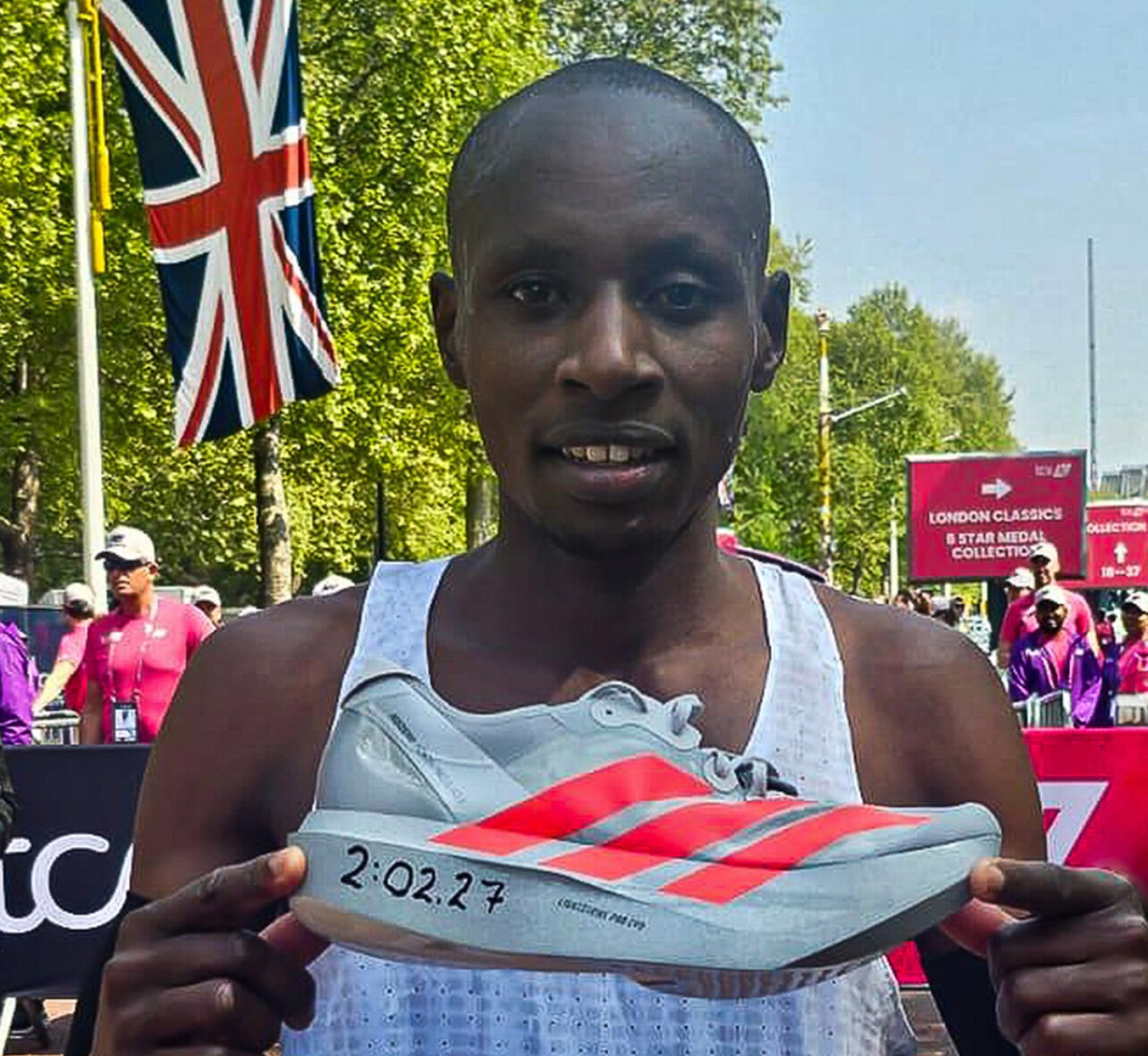
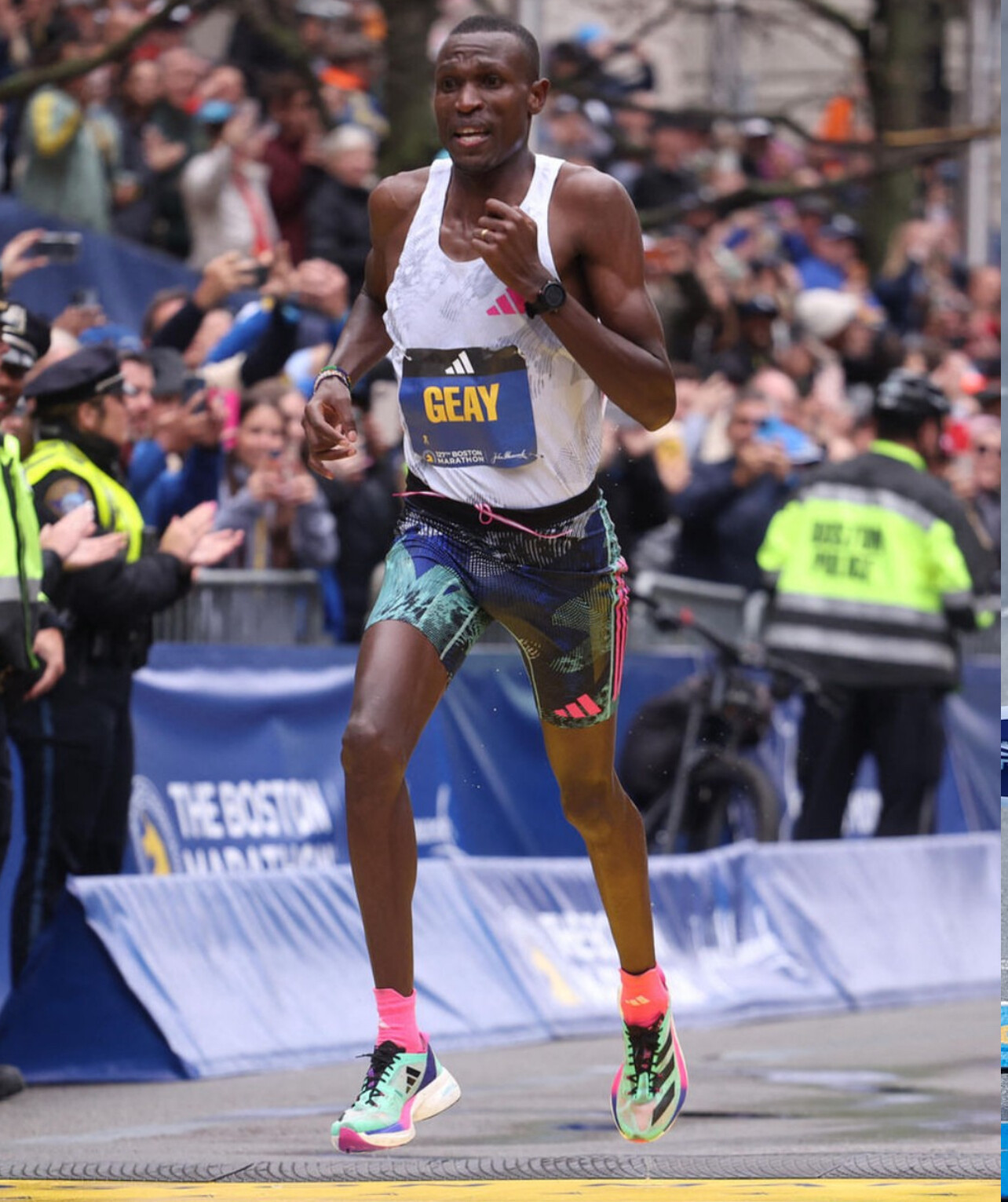
The 2025 men’s elite field is stacked with sub-2:05 talent from Kenya, Ethiopia, Tanzania, and Japan, including several proven champions and emerging stars. On September 29, all eyes will be on Berlin to see if the next marathon milestone can be broken.
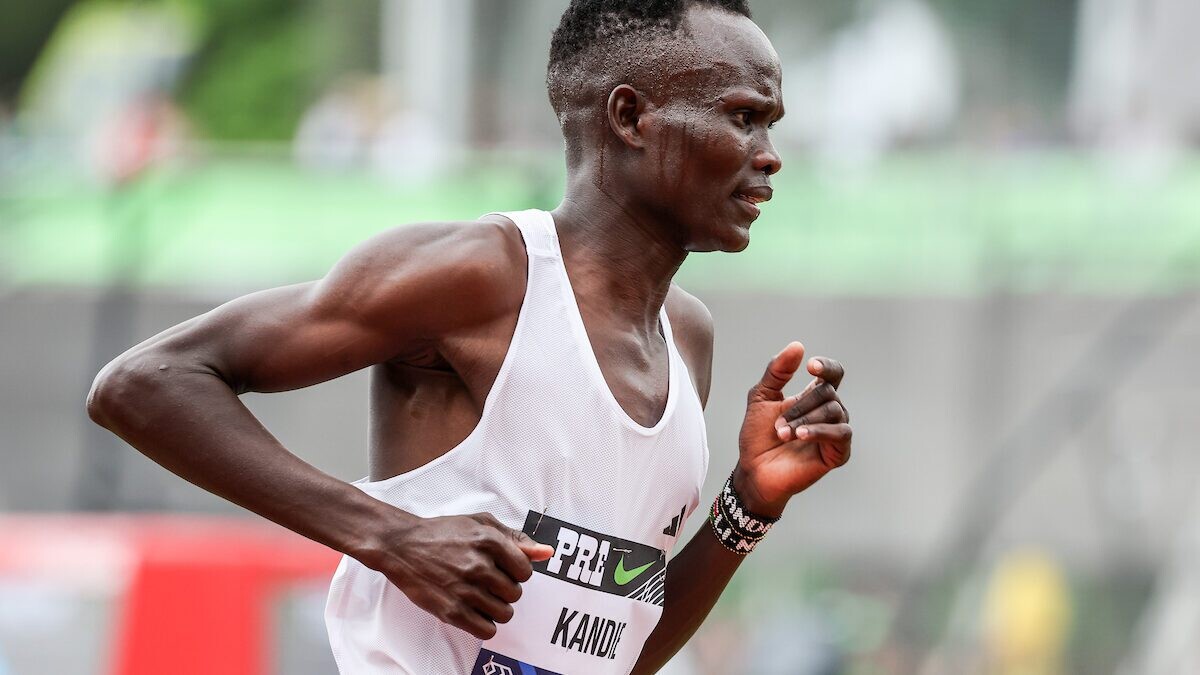
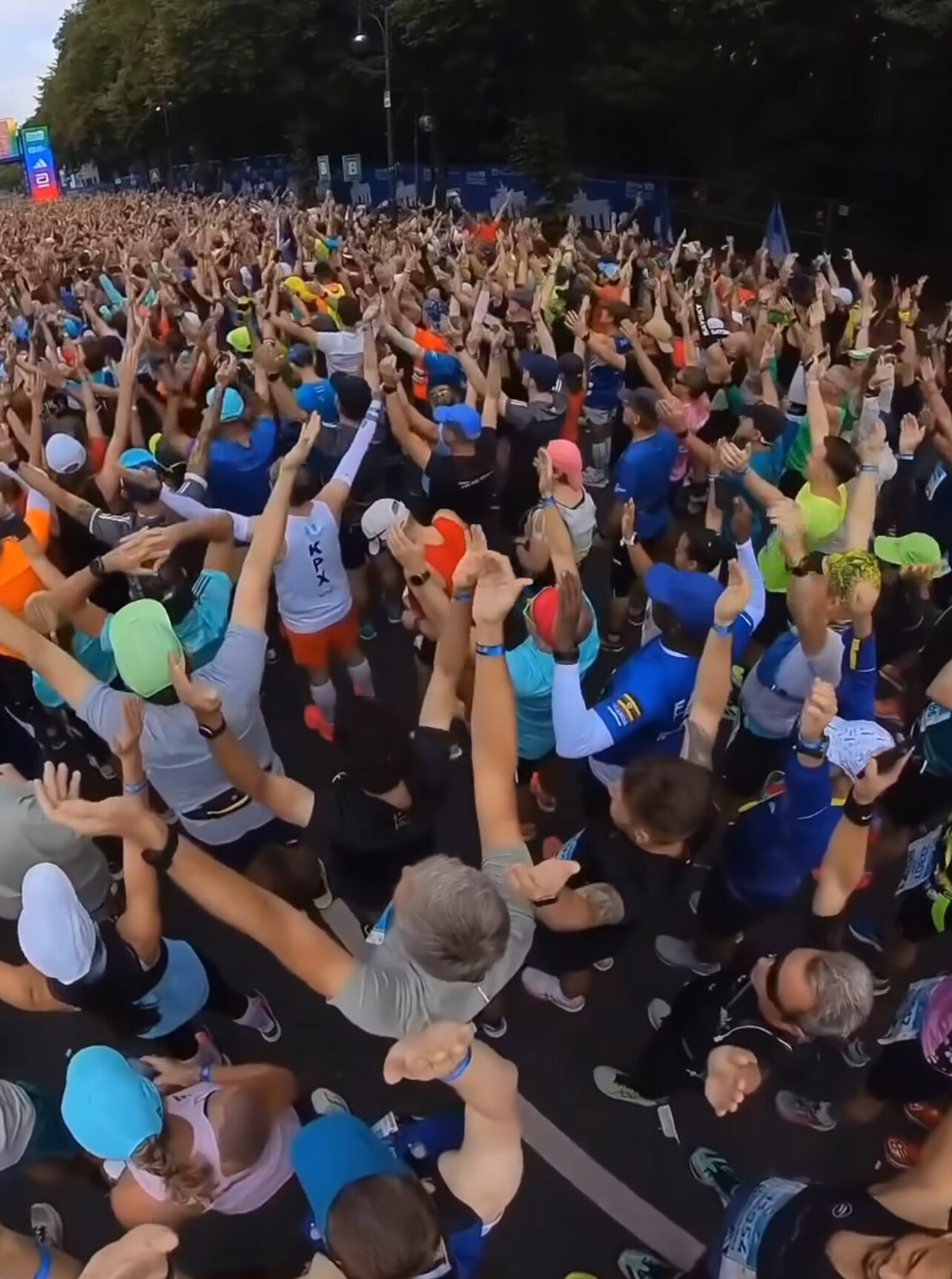
Top Contenders and Their Personal Bests
|
Name |
Country |
Personal Best |
|
Sabastian Sawe |
KEN |
2:02:05 |
|
Gabriel Gerald Geay |
TAN |
2:03:00 |
|
Milkesa Mengesha |
ETH |
2:03:17 |
|
Haymanot Alew |
ETH |
2:03:31 |
|
Guye Adola |
ETH |
2:03:46 |
|
Leul Gebresilase |
ETH |
2:04:02 |
|
Tesfaye Deriba |
ETH |
2:04:13 |
|
Daniel Mateiko |
KEN |
2:04:24 |
|
Haftu Teklu |
ETH |
2:04:42 |
|
Chimdessa Debele |
ETH |
2:04:44 |
|
Kengo Suzuki |
JPN |
2:04:56 |
|
Abel Kirui |
KEN |
2:05:04 |
|
Chala Regasa |
ETH |
2:05:06 |
|
Samwel Mailu |
KEN |
2:05:08 |
|
Yihunilign Adane |
ETH |
2:05:3 |
|
|
|
Kenya and Ethiopia Headline the Race
Kenya’s Sabastian Sawe, with a PB of 2:02:05, enters as the top seed. He’s followed closely by Tanzania’s Gabriel Geay, who made headlines in Boston and New York with aggressive front-running. Ethiopia is sending a deep and dangerous lineup—including Milkesa Mengesha, Haymanot Alew, and veteran Guye Adola (the 2021 Berlin champion).
Daniel Mateiko of Kenya, a former half marathon standout, will look to solidify his position as a full marathon threat, while Abel Kirui, the two-time world champion, continues to defy age with elite performances.
The Global Wildcard: Japan’s Kengo Suzuki
With a 2:04:56 personal best, Kengo Suzuki is the fastest Japanese marathoner ever and could be a serious factor if conditions align. His presence adds global depth to a field heavily dominated by East Africa.
Fast Times Almost Guaranteed
Berlin’s pancake-flat course, combined with cool fall weather and top-tier pacers, means fast times are almost inevitable. With six men holding PBs under 2:04 and over a dozen under 2:05, there’s a strong chance we could see a sub-2:03 winner, or even a new course record.
While the official world record still stands at 2:00:35 (set in 2023 by Eliud Kipchoge), several in this year’s field have the credentials—and ambition—to challenge history.
Race Day Outlook
• Date: Sunday, September 29, 2025
• Course: Flat and record-ready, through the streets of Berlin
• Weather Forecast: Typically cool (expected 11–13°C), ideal for fast times
• Live Coverage: Streaming and TV coverage expected worldwide
Stay tuned to My Best Runs for full coverage, live updates, and post-race analysis from Berlin!
by Boris Baron
Login to leave a comment
BMW Berlin Marathon
The story of the BERLIN-MARATHON is a story of the development of road running. When the first BERLIN-MARATHON was started on 13th October 1974 on a minor road next to the stadium of the organisers‘ club SC Charlottenburg Berlin 286 athletes had entered. The first winners were runners from Berlin: Günter Hallas (2:44:53), who still runs the BERLIN-MARATHON today, and...
more...Berlin Marathon Pumps Nearly $510 Million Into the Local Economy—Here’s How the Numbers Break Down
The BMW Berlin Marathon, set for Sunday, September 28, 2025, isn’t just a premier event for world-class athletes—it’s one of the biggest economic powerhouses in distance running.
A new independent study presented this week by Nielsen Sports found that the Berlin Marathon generated a total economic impact of €469.4 million, or approximately $509 million USD. That includes €142.7 million ($155 million USD) in direct spending by participants, visitors, and organizers, and €326.7 million ($354 million USD) in indirect economic activity such as hotels, restaurants, and retail.
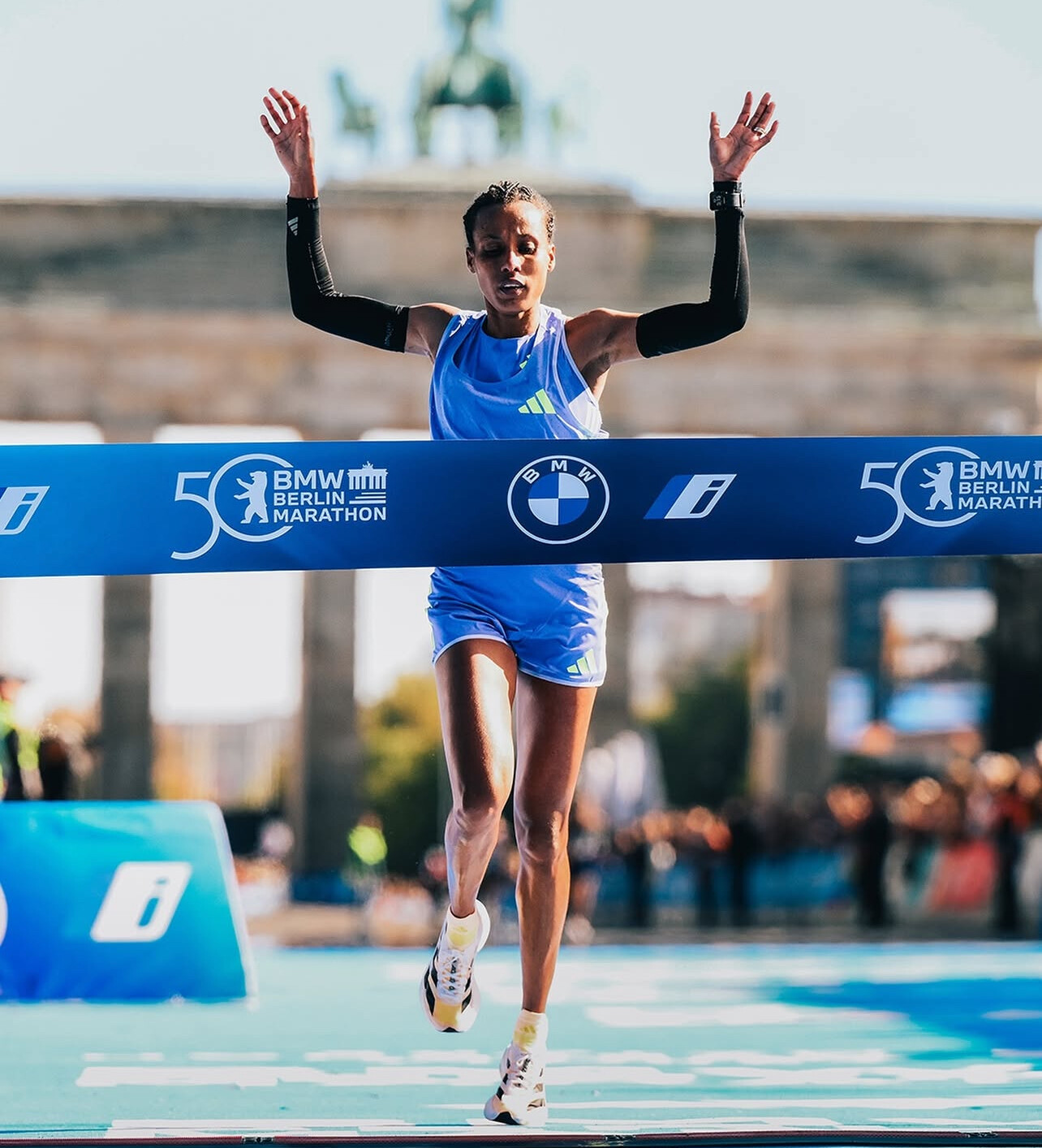
Where the Money Comes From
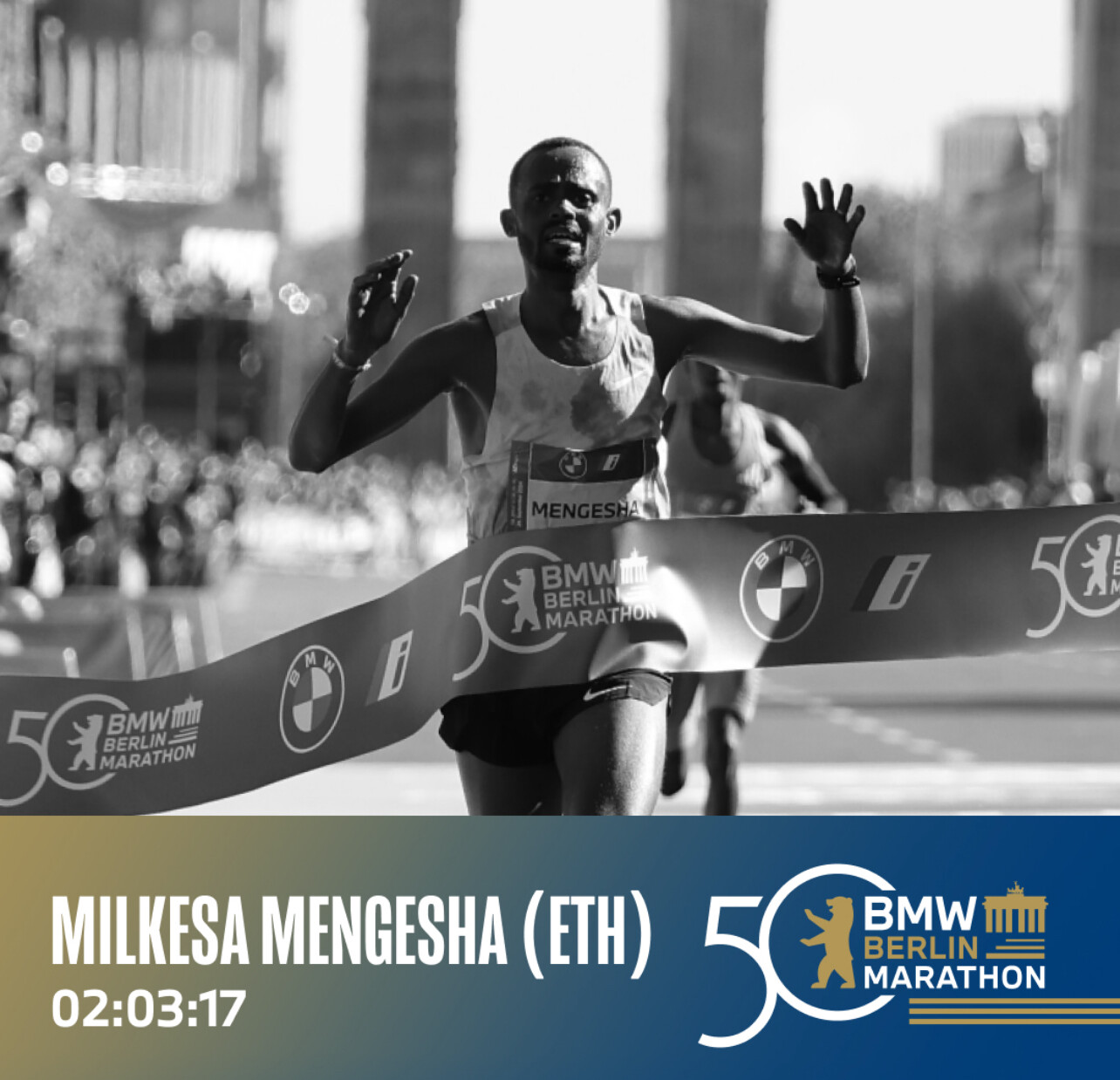
One key revenue stream is the entry fees paid by runners. With more than 47,000 participants, and an average fee of around €145 ($157 USD), that alone brings in an estimated €6.8 million ($7.4 million USD).
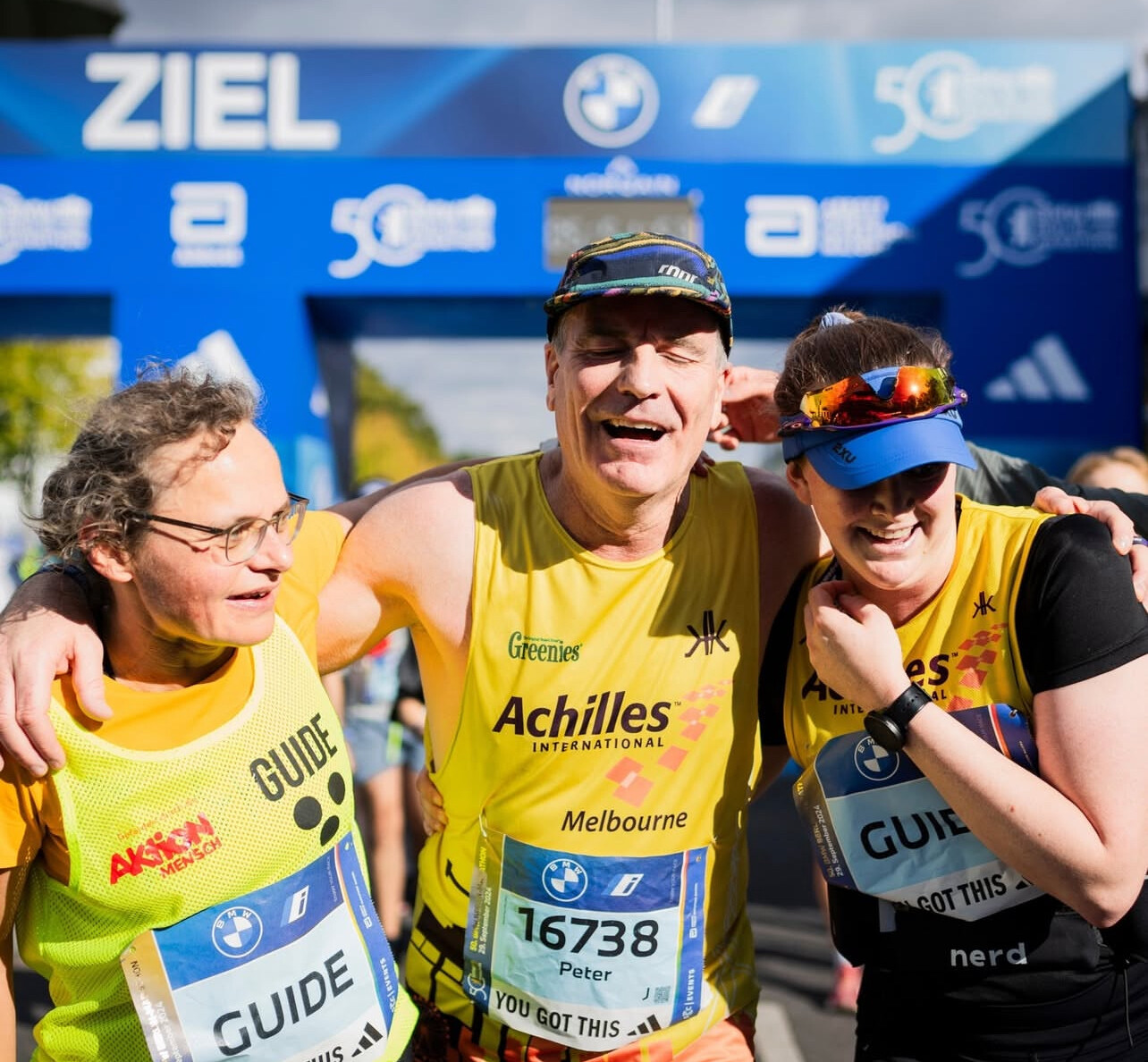
On the elite side, Berlin pays out competitive prize money, bonuses, and appearance fees. While exact figures aren’t published, estimates suggest:
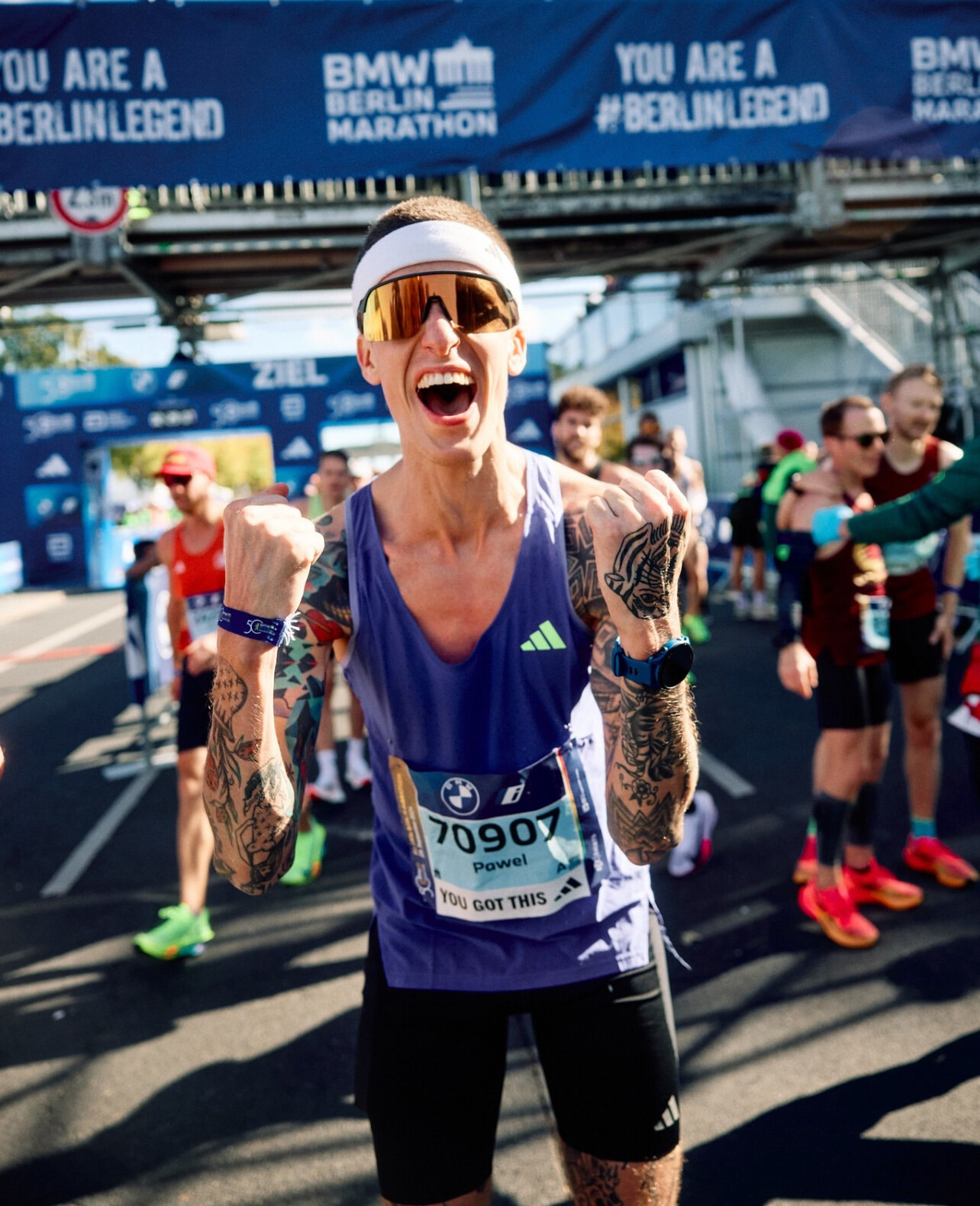
• Prize Money: Around $500,000 USD total, including winners and top-10 finishers.
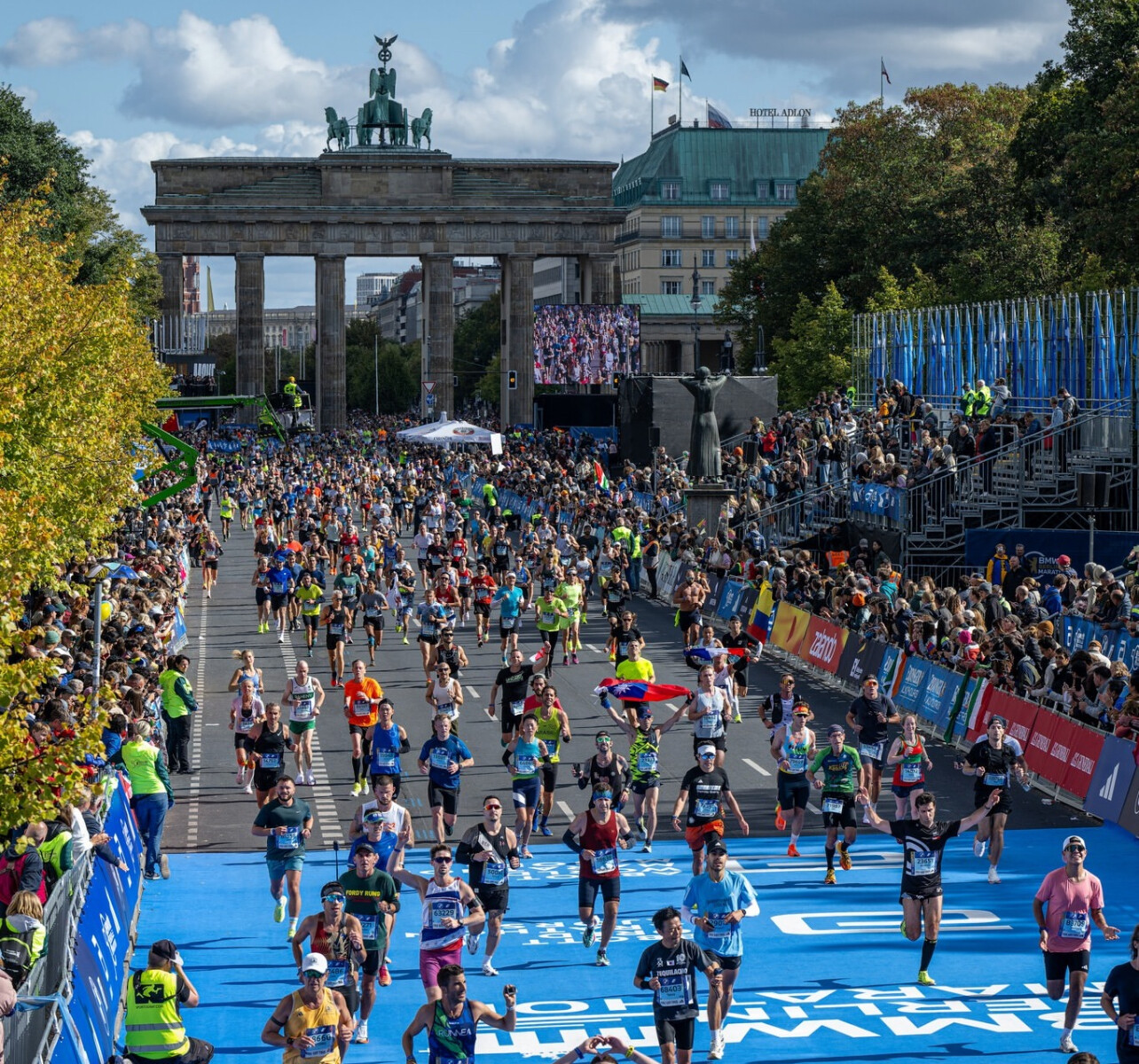
• Bonuses: Additional six-figure performance bonuses for times under certain marks (e.g. sub-2:03 or sub-2:20).
• Appearance Fees: Elite runners, especially past champions or potential record-breakers, can earn $50,000–$100,000 USD or more just to show up.
Berlin’s Fast Course Is Also a Fast Investment
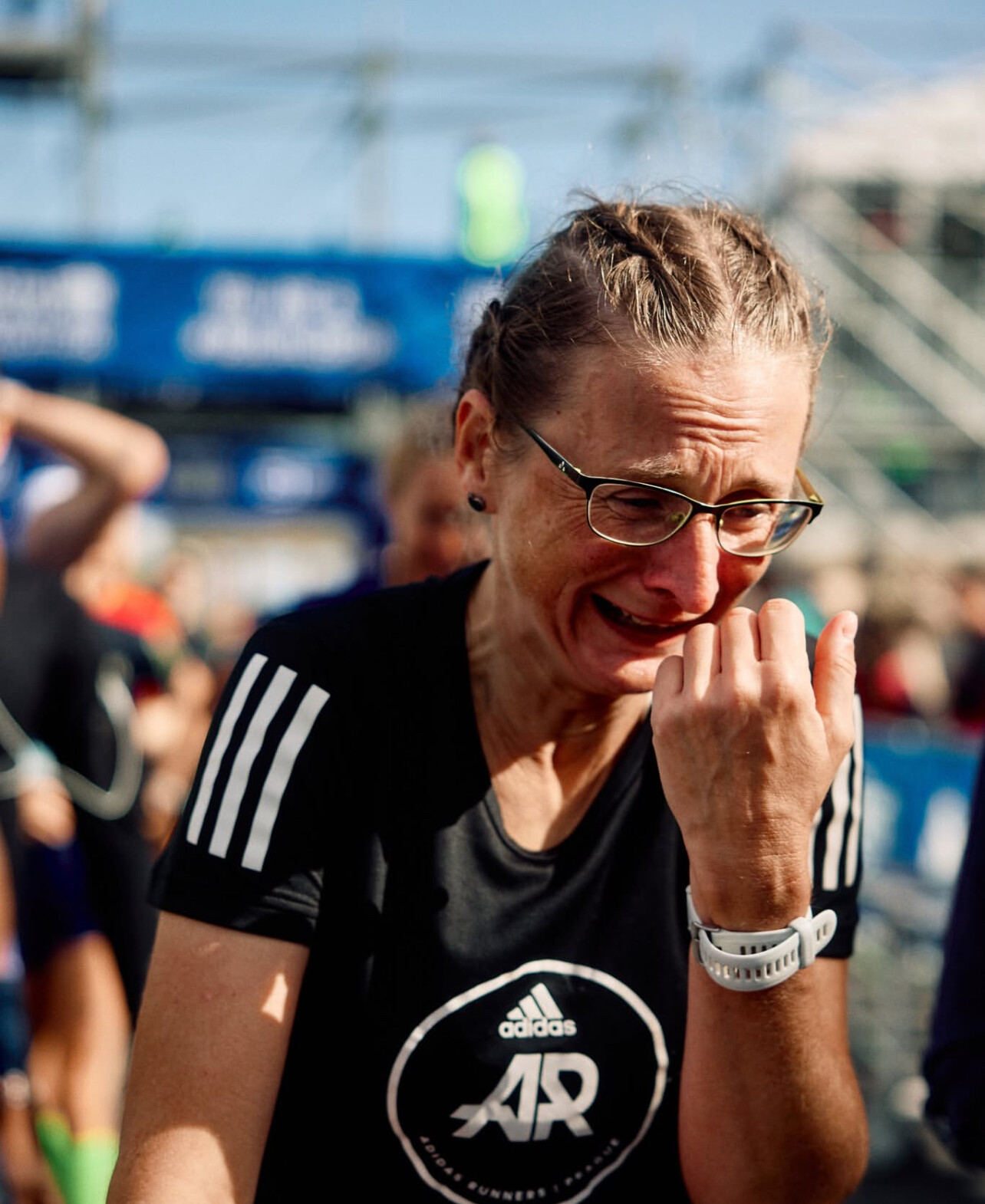
Berlin is known as the world record capital, having hosted 12 world records since 2003. That prestige, paired with a world-class event experience, keeps the race fully subscribed year after year.
Berlin’s mayor Kai Wegner and other city and sports officials were on hand this week to confirm what many already knew: the Berlin Marathon isn’t just a race—it’s a multi-million dollar economic catalystfor the city.
As race day approaches, the energy is building. Whether you’re chasing a PB or just soaking in the electric atmosphere, one thing is clear—Berlin delivers, on the roads and in the numbers.
by Boris Baron
Login to leave a comment
BMW Berlin Marathon
The story of the BERLIN-MARATHON is a story of the development of road running. When the first BERLIN-MARATHON was started on 13th October 1974 on a minor road next to the stadium of the organisers‘ club SC Charlottenburg Berlin 286 athletes had entered. The first winners were runners from Berlin: Günter Hallas (2:44:53), who still runs the BERLIN-MARATHON today, and...
more...Sebastian Sawe Chooses Berlin Over World Championships, Eyes Fast Time on Record-Breaking Course
Kenya’s marathon sensation Sebastian Sawe has confirmed he will compete in the 2025 Berlin Marathon this September, opting out of the World Athletics Championships in Tokyo.
The decision comes after a remarkable start to Sawe’s marathon career, where he has already posted two of the fastest times in history. He won his debut in Valencia in December 2024 with a world-leading 2:02:05, then followed it up with another dominant victory at the 2025 London Marathon, clocking 2:02:27.
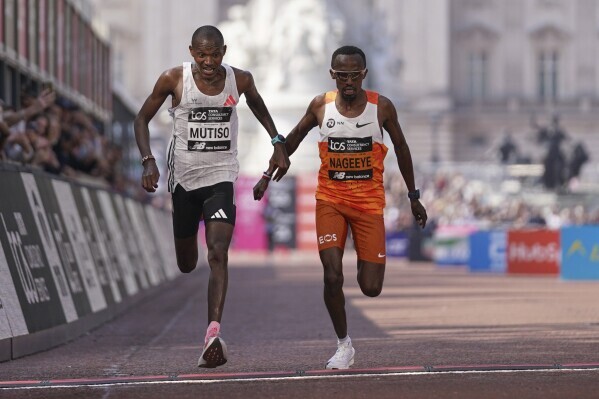
Many had expected Sawe to headline Kenya’s men’s team for the marathon at the World Championships in Tokyo on September 15. However, with the Berlin Marathon scheduled just six days later, the 30-year-old confirmed he is focusing solely on Berlin.
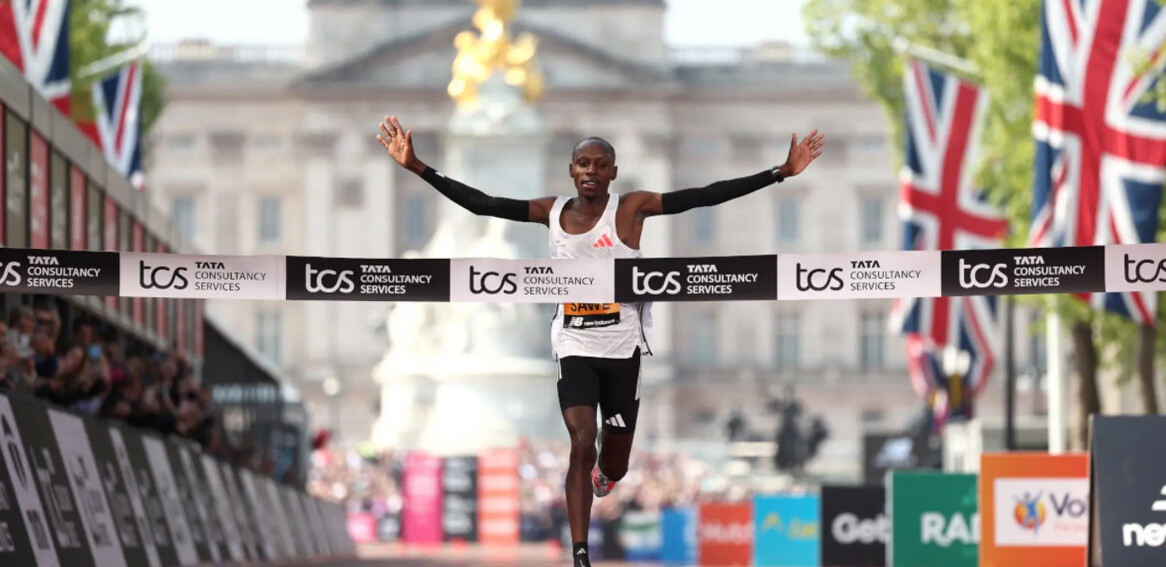
“I am preparing for Berlin,” Sawe stated, noting that while he aims to run a fast time, chasing a world record is not currently the goal. “It’s too early to talk about a world record. It takes time and clear planning to achieve it.”
The Berlin course is renowned as the fastest in the world, with 13 world records set on its streets. The current men’s marathon world record is 2:00:35, set by the late Kelvin Kiptum at the 2023 Chicago Marathon. Kiptum broke the previous record of 2:01:09 set by Eliud Kipchoge—who himself has won Berlin five times.
Like Kiptum, Sawe burst onto the marathon scene with a historic debut. Their similarities have drawn comparisons, especially with Sawe’s smooth transition from half marathon success to world-class marathon victories.
All eyes will now be on Berlin to see just how fast Sawe can go on a course that has repeatedly rewritten the marathon history books.
by Boris Baron
Login to leave a comment
BMW Berlin Marathon
The story of the BERLIN-MARATHON is a story of the development of road running. When the first BERLIN-MARATHON was started on 13th October 1974 on a minor road next to the stadium of the organisers‘ club SC Charlottenburg Berlin 286 athletes had entered. The first winners were runners from Berlin: Günter Hallas (2:44:53), who still runs the BERLIN-MARATHON today, and...
more...Mengesha and Ketema claim Berlin Marathon crowns
Milkesa Mengesha and Tigist Ketema achieved an Ethiopian double at the BMW Berlin Marathon, a World Athletics Platinum Label road race, on Sunday (29).
Racing at the 50th edition of the event, held on a sunny morning in Germany’s capital, Mengesha kicked away from Cybrian Kotut in the closing stages to win the men’s title in a PB of 2:03:17, while Ketema solo ran her way to a 2:16:42 triumph in the women’s race.
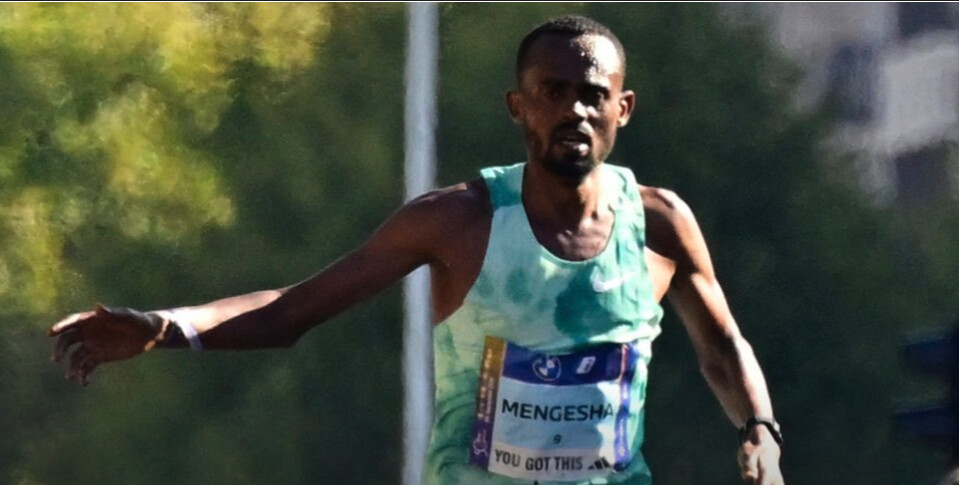
Kenya’s Kotut finished five seconds behind Mengesha, securing second place in 2:03:22, with Ethiopia’s Haymanot Alew third in 2:03:31. Ketema led an Ethiopian top four in the women’s race, winning by more than two minutes ahead of her compatriots Mestawut Fikir (2:18:48), Bosena Mulatie (2:19:00) and Aberu Ayana (2:20:20).
After a fast start Mengesha, who finished sixth in the World Championships marathon last year, was part of a lead group of 11 that followed the pacemakers through the halfway mark still on sub-2:02 pace, in 1:00:57.
Kenya’s former world half marathon record-holder Kibiwott Kandie was to the fore as the pacemakers stepped aside just after 25km. The group had reduced to eight and was bunched together by the time 30km was reached in 1:27:21, and seven were still in contention – including Ethiopia’s Tadese Takele, the fastest man in the field – as they passed the 35km mark in 1:42:14.
Kandie, Takele and Ethiopia’s Dejene Megersa couldn’t hold on and the race was down to Mengesha, Kotut, Kenya’s Stephen Kiprop and Alew with around 5km to go. They reached the 40km mark in 1:56:59 before Mengesha and Kotut strode ahead.
Mengesha dropped his rival with the Brandenburg Gate finish line in sight, crossing it to win in 2:03:17, the third fastest time in the world so far this year and a PB that improves the previous best he set in Valencia in 2022 by more than two minutes.
He dropped to his knees and was followed over the finish line by Kotut in 2:03:22, also a PB by more than a minute.
Ketema was a dominant winner of the women’s race. The 26-year-old, who ran 2:16:07 when making her marathon debut in Dubai in January, is a training partner of Tigist Assefa, who set a world record of 2:11:53 when winning in Berlin last year.
This time Ketema was in control and she was joined by her compatriot Azmera Gebru and a group of men’s race runners as 5km was reached in 16:06 and 10km in 32:14.
Ketema was 12 seconds ahead at halfway, which she hit in 1:07:53, and she only increased her advantage from there. She reached 30km in 1:36:59, by which point Gebru had been overtaken, with Ketema’s closest challengers being Mulatie, Fikir and Ayana who were running together 1 minute and 53 seconds back.
Ketema continued to forge ahead and she reached 40km in 2:09:24, with a gap of 2 minutes and 20 seconds. While Fikir closed slightly, Ketema was well clear and she won in 2:16:42, the third fastest time in the women’s race at the Berlin Marathon.
Fikir was second in 2:18:48, a PB by almost two minutes, while Mulatie was third in 2:19:00, taking almost eight minutes off her previous best set on her debut in Houston in January.
Login to leave a comment
BMW Berlin Marathon
The story of the BERLIN-MARATHON is a story of the development of road running. When the first BERLIN-MARATHON was started on 13th October 1974 on a minor road next to the stadium of the organisers‘ club SC Charlottenburg Berlin 286 athletes had entered. The first winners were runners from Berlin: Günter Hallas (2:44:53), who still runs the BERLIN-MARATHON today, and...
more...Kibiwott Kandie draws inspiration from Paul Tergat as he eyes winning return in Berlin
Former World Half Marathon record holder Kibiwott Kandie is poised for a major showdown at the Berlin Marathon and will be drawing inspiration from Kenyan legend Paul Tergat.
It is make or break for former world half marathon record holder Kibiwott Kandie ahead of Berlin Marathon showdown on Sunday, September 29.
The marathoner is set to make a return to the grand stage after an absence since May 2023 following an injury that forced him to pull out of the World Championships in Budapest, Hungary.
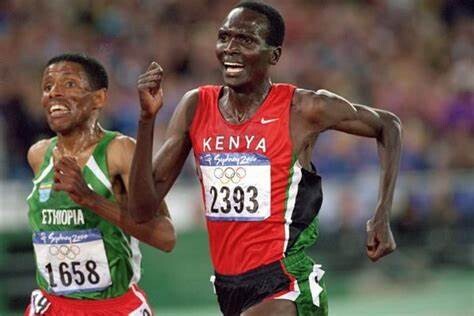
The absence marked the second consecutive time the Commonwealth Games 10,000m bronze medallist missed out on the global showpiece.
Kandie is now poised for a make or break race as he gets back on the road for the first time since his injury.
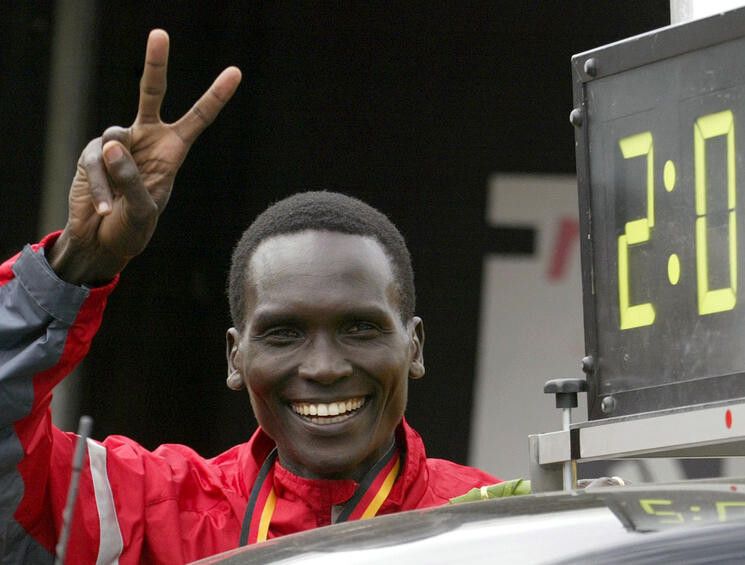
The former world half marathon record holder has revealed he is in good shape, having kept to his training routine with the competition in mind.
“I carried on training knowing that one day there would finally be a race. I stayed in good shape," he told World Athletics.
Kandie is drawing inspiration from his hero and former long distance runner Paul Tergat ahead of his return.
“When I was young, I used to hear everyone saying, Paul Tergat, world records. This has stayed in my mind,” he revealed.
“He became a kind of role model and I used to think when I grow up I would like to be like him, I would like to run like him, I would like to do the things he has done. He still inspires me, he’s still a role model for me. The work that I am doing is because of him. I feel I can’t let him down.”
The Kenyan is one of only seven men to ever complete a half marathon in under 58 minutes, with his personal best of 57:32. He won the Valencia half marathon three times, including when he set the world record in 2020.
by Stephen Awino
Login to leave a comment
BMW Berlin Marathon
The story of the BERLIN-MARATHON is a story of the development of road running. When the first BERLIN-MARATHON was started on 13th October 1974 on a minor road next to the stadium of the organisers‘ club SC Charlottenburg Berlin 286 athletes had entered. The first winners were runners from Berlin: Günter Hallas (2:44:53), who still runs the BERLIN-MARATHON today, and...
more...Ketema and Takele head entries for 50th Berlin Marathon
Ethiopia’s Tigist Ketema and Tadese Takele start as the fastest in the fields and will be hoping to lead the way when they line up for the BMW Berlin Marathon, a World Athletics Platinum Label road race, on Sunday (29).
Ketema, previously better known as an 800m and 1500m specialist, made her mark in the marathon in Dubai in January as she ran 2:16:07, a time that places her ninth on the women’s world marathon all-time list. She then ran 2:23:21 to place seventh in London in April and Berlin will be her first race since then.
“I have prepared for a personal best and plan to run the first half on Sunday in around 68 minutes,” she said. “I hope it won't be too cold because I prefer to run in slightly warmer weather.”
Ketema is one of three women with sub-2:20 PBs on the entry list, as her competition includes her compatriots Genzebe Dibaba and Yebrugal Melese, who have respective PBs of 2:18:05 and 2:19:36.
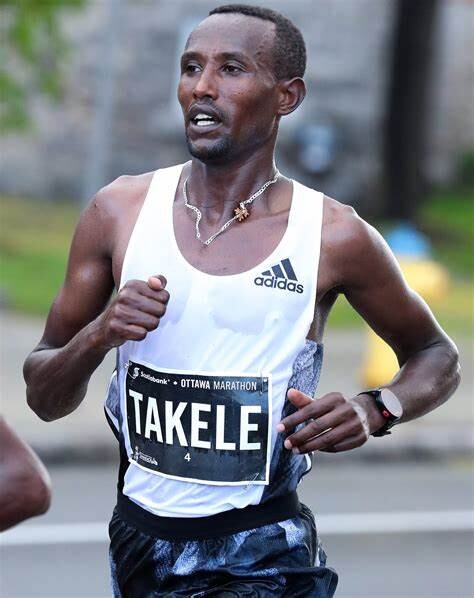
Dibaba ran that PB on her debut in Amsterdam in 2022 and she clocked 2:21:47 in Chicago a year later. “I saw Haile Gebrselassie run two world records in Berlin on TV and since then I've always wanted to run in Berlin,” she said. “Now the time has come. It would be a success for me if I ran a personal best.”
Another eight women on the entry list have dipped under 2:22 for the marathon in their careers so far, including Mestawot Fikir (2:20:45), Azmera Gebru (2:20:48), Sisay Gola (2:20:50), Fikrte Wereta (2:21:32) and Aberu Ayana (2:21:54), as well as Japan’s Mizuki Matsuda (2:20:52) and Ai Hosoda (2:21:42).
Germany’s Melat Kejeta is also part of that group, having clocked 2:21:47 in Dubai in January. She placed sixth at the Tokyo Olympics but was unable to finish the Olympic marathon in Paris due to stomach problems.
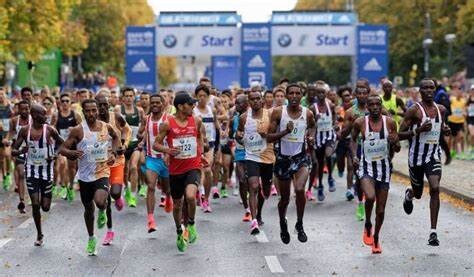
A total of 13 world records have so far been set in the Berlin Marathon, the most recent being the 2:11:53 by Tigist Assefa – a training partner of Ketema – in last year’s women’s race.
The men’s title on that occasion was won by Eliud Kipchoge, as he claimed a record fifth victory.
Kipchoge does not return this year but Takele does, following his third-place finish in last year’s race in a PB of 2:03:24. That was his most recent race due to injury, but he says he is now fit and ready to run. “I’ve trained very well,” he said, “and expect to run a strong race.”
Another four men to have dipped under 2:05 feature on the entry list, including Kenya’s Cybrian Kotut, who ran his PB of 2:04:34 when finishing second in Amsterdam last year, and Ethiopia’s Hailemaryam Kiros and Bazezew Asmare, who respectively clocked 2:04:41 in Paris in 2021 and 2:04:57 in Amsterdam in 2022.
Kenya’s former world half marathon record-holder Kibiwott Kandie races the marathon for the third time and will be looking to build on the PB of 2:04:48 he set in Valencia last year as he hunts for a first win over the distance.
They will be joined by athletes including Kenya’s Samwel Mailu, the world half marathon bronze medallist who set a course record of 2:05:08 to win the Vienna City Marathon last year and continues his comeback after injury, and Ethiopia’s Milkesa Mengesha, who finished sixth at the World Championships last year and has a best of 2:05:29.
Elite fields
Women
Tigist Ketema (ETH) 2:16:07
Genzebe Dibaba (ETH) 2:18:05
Yebrugal Melese (ETH) 2:19:36
Mestawot Fikir (ETH) 2:20:45
Azmera Gebru (ETH) 2:20:48
Sisay Gola (ETH) 2:20:50
Mizuki Matsuda (JPN) 2:20:52
Fikrte Wereta (ETH) 2:21:32
Ai Hosoda (JPN) 2:21:42
Melat Kejeta (GER) 2:21:47
Aberu Ayana (ETH) 2:21:54
Calli Hauger-Thackery (GBR) 2:22:17
Bekelech Gudeta (ETH) 2:22:54
Lisa Weightman (AUS) 2:23:15
Betelihem Afenigus (ETH) 2:23:20
Veronica Maina (KEN) 2:24:46
Bosena Mulatie (ETH) 2:26:59
Alisa Vainio (FIN) 2:27:26
Sonia Samuels (GBR) 2:28:04
Nora Szabo (HUN) 2:28:25
Philippa Bowden (USA) 2:29:14
Pauline Esikon (KEN) debut
Men
Tadese Takele (ETH) 2:03:24
Cybrian Kotut (KEN) 2:04:34
Hailemaryam Kiros (ETH) 2:04:41
Kibiwott Kandie (KEN) 2:04:48
Bazezew Asmare (ETH) 2:04:57
Samwel Mailu (KEN) 2:05:08
Milkesa Mengesha (ETH) 2:05:29
Haymanot Alew (ETH) 2:05:30
Philimon Kipchumba (KEN) 2:05:35
Josphat Boit (KEN) 2:05:42
Dejene Megersa (ETH) 2:05:42
Enock Onchari (KEN) 2:05:47
Oqbe Ruesom (ERI) 2:05:51
Justus Kangogo (KEN) 2:05:57
Haimro Alame (ISR) 2:06:04
Ashenafi Moges (ETH) 2:06:12
Asbel Rutto (KEN) 2:07:04
Samuel Tsegay (SWE) 2:06:53
Yohei Ikeda (JPN) 2:06:53
Stephen Kiprop (KEN) 2:07:04
Hendrik Pfeiffer (GER) 2:07:14
Kento Kikutani (JPN) 2:07:26
Melaku Belachew (ETH) 2:07:28
Godadaw Belachew (ISR) 2:07:45Y
uhei Urano (JPN) 2:07:52
Guojian Dong (CHN) 2:08:12
Filimon Abraham (GER) 2:08:22
Haftom Welday (GER) 2:08:24
Sebastian Hendel (GER) 2:08:51
Olonbayar Jamsran (MGL) 2:08:58
Haftamu Gebresilase (ETH) debut
by World athletics
Login to leave a comment
BMW Berlin Marathon
The story of the BERLIN-MARATHON is a story of the development of road running. When the first BERLIN-MARATHON was started on 13th October 1974 on a minor road next to the stadium of the organisers‘ club SC Charlottenburg Berlin 286 athletes had entered. The first winners were runners from Berlin: Günter Hallas (2:44:53), who still runs the BERLIN-MARATHON today, and...
more...50th BMW Berlin-Marathon Sunday: Deep fields promise fast and exciting races in Berlin’s jubilee marathon
The 50th edition of the BMW Berlin Marathon promises fast and exciting elite races. Deep fields will be assembled with 14 men who have already run sub 2:06:00. While there is no strong favourite among them it is different with the women: Ethiopia’s Tigist Ketema heads the list with her stunning 2:16:07 debut time, which makes her the ninth-fastest marathon runner ever.
Ten more women have personal bests of sub 2:22:00. Thirteen world records were broken in the history of the BMW Berlin Marathon, many more than in any other marathon. The jubilee edition of Germany’s most spectacular road race will have a record number of around 50,000 participants.
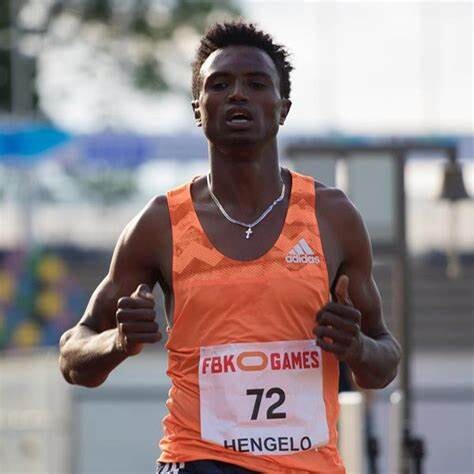
Men’s field
Without Kenya’s superstar Eliud Kipchoge, the winner of the past two editions, the fastest on paper is Tadese Takele. The Ethiopian was third in Berlin a year ago when he improved to 2:03:24. Since another fast race is expected Takele will probably have to run quicker to be in contention for the prestigious marathon victory at the Brandenburg Gate.
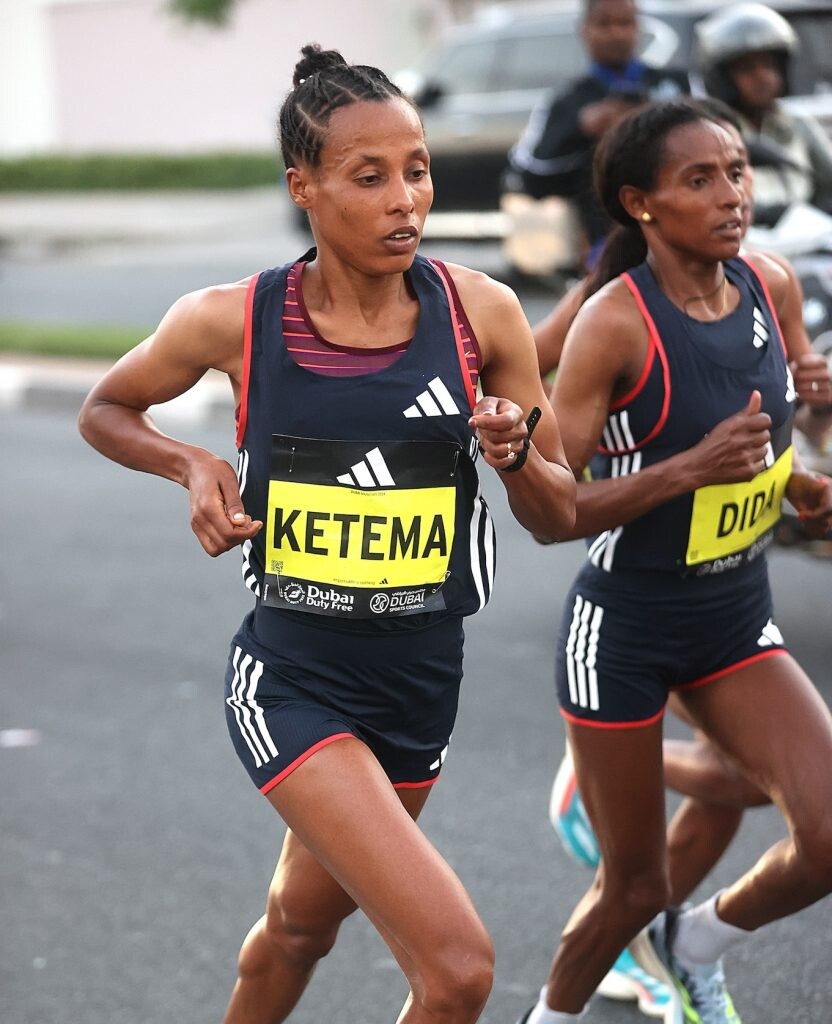
Fellow Kenyan Kibiwott Kandie could well challenge for his first triumph over the classic distance. The Kenyan is the former world half marathon record holder (57:32) with great potential. Germany’s Hendrik Pfeiffer leads a group of strong domestic runners. He improved to 2:07:14 early this year in Houston.
Women’s field
Tigist Ketema stormed to a sensational victory in Dubai at the beginning of the year, clocking an unofficial world debut record of 2:16:07. Coming to another very fast course now the training partner of Tigst Assefa, who smashed the world record here with 2:11:53 a year ago, might look to improve her personal best.
The women’s field includes a former world record holder as well, but at a much shorter distance: Genzebe Dibaba ran 3:50.07 in the 1,500m in 2015. When she switched to the marathon she ran a fast debut with 2:18:05 in Amsterdam two years ago.
Unfortunately, Kenya’s Rosemary Wanjiru had to cancel her start due to injury. But Germany’s Melat Kejeta is a late addition to the field. She dropped out of the Olympic Marathon early because of stomach problems and now hopes to bounce back in Berlin with a personal best. Kejeta might well try to become the second German woman after Irina Mikitenko (2:19:19 in Berlin in 2008) to break 2:20:00.
MEN
Tadese Takele ETH 2:03:24
Cybrian Kotut KEN 2:04:34
Hailemaryam Kiros ETH 2:04:41
Kibiwott Kandie KEN 2:04:48
Bazezew Asmare ETH 2:04:57
Samwel Mailu KEN 2:05:08
Milkesa Mengesha ETH 2:05:29
Haymanot Alew ETH 2:05:30
Philimon Kipchumba KEN 2:05:35
Josphat Boit KEN 2:05:42
Dejene Megersa ETH 2:05:42
Enock Onchari KEN 2:05:47
Oqbe Ruesom ERI 2:05:51
Justus Kangogo KEN 2:05:57
Haimro Alame ISR 2:06:04
Ashenafi Moges ETH 2:06:12
Asbel Rutto KEN 2:07:04
Samuel Tsegay SWE 2:06:53
Yohei Ikeda JPN 2:06:53
Stephen Kiprop KEN 2:07:04
Hendrik Pfeiffer GER 2:07:14
Kento Kikutani JPN 2:07:26
Melaku Belachew ETH 2:07:28
Godadaw Belachew ISR 2:07:45
Yuhei Urano JPN 2:07:52
Guojian Dong CHN 2:08:12
Filimon Abraham GER 2:08:22
Haftom Welday GER 2:08:24
Sebastian Hendel GER 2:08:51
Olonbayar Jamsran MGL 2:08:58
Haftamu Gebresilase ETH Debut
WOMEN
Tigist Ketema ETH 2:16:07
Genzebe Dibaba ETH 2:18:05
Yebrugal Melese ETH 2:19:36
Mestawot Fikir ETH 2:20:45
Azmera Gebru ETH 2:20:48
Sisay Gola ETH 2:20:50
Mizuki Matsuda JPN 2:20:52
Fikrte Wereta ETH 2:21:32
Ai Hosoda JPN 2:21:42
Melat Kejeta GER 2:21:47
Aberu Ayana ETH 2:21:54
Calli Hauger-Thackery GBR 2:22:17
Bekelech Gudeta ETH 2:22:54
Lisa Weightman AUS 2:23:15
Betelihem Afenigus ETH 2:23:20
Veronica Maina KEN 2:24:46
Bosena Mulatie ETH 2:26:59
Alisa Vainio FIN 2:27:26
Sonia Samuels GBR 2:28:04
Nora Szabo HUN 2:28:25
Philippa Bowden USA 2:29:14
Pauline Esikon KEN Debut
by Christopher Kelsall
Login to leave a comment
BMW Berlin Marathon
The story of the BERLIN-MARATHON is a story of the development of road running. When the first BERLIN-MARATHON was started on 13th October 1974 on a minor road next to the stadium of the organisers‘ club SC Charlottenburg Berlin 286 athletes had entered. The first winners were runners from Berlin: Günter Hallas (2:44:53), who still runs the BERLIN-MARATHON today, and...
more...Melat Kejeta and Hendrik Pfeiffer will lead a group of strong top runners at Berlin Marathon
On Thursday, the organizers announced the signing of the best German marathon runner of recent years, Melat Kejeta, for the anniversary edition of the 50th BMW Berlin Marathon. In the men's race, Hendrik Pfeiffer will lead a group of strong German top runners.
Melat Kejeta will start at the BMW Berlin Marathon on September 29. It will be the first appearance for the then 32-year-old at the biggest German marathon spectacle since her impressive debut race in 2019. At that time, Melat Kejeta had surprised in Berlin in sixth place with 2:23:57 hours and made the fastest marathon debut of a German woman.
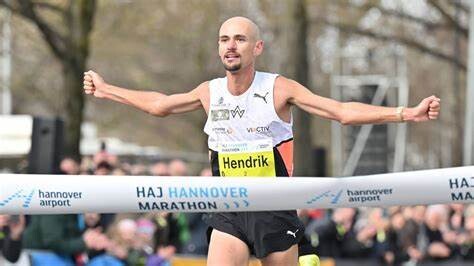
She then ran an excellent race in her second marathon at the 2021 Olympic Games. In Sapporo (Japan) she reached sixth place. In January 2024, Melat Kejeta improved to 2:21:47 in Dubai and finished in an excellent fourth place. However, she was unlucky at the Olympics in Paris in August. Due to stomach problems, she had to give up the race early. In Berlin, Melat Kejeta now wants to rehabilitate himself.
Hendrik Pfeiffer leads German top runners
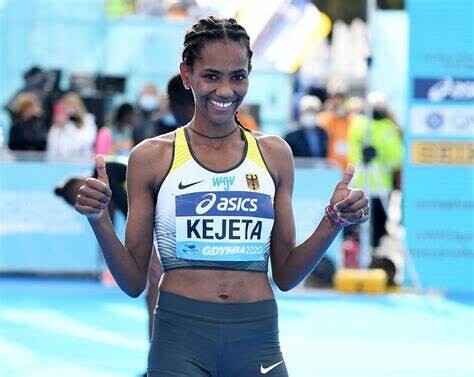
Hendrik Pfeiffer (TK zu Hannover) had improved to 2:07:14 hours in a brilliant race in Houston (USA) in January in third place and thus became the fourth fastest German marathon runner in history. After he had set the pace almost entirely on his own, he was ten seconds short in the end to secure the third German Olympic starting place. In April, Hendrik Pfeiffer surprised with a seventh place at the marathon classic in London (Great Britain).
After he was unable to run a marathon for about one and a half years due to injury, Filimon Abraham (LG Telis Finanz Regensburg; PB: 2:08:22 h) in Berlin. Haftom Welday (TB Hamburg Eilbeck), who improved to 2:08:24 hours last year in Valencia (Spain), is in an identical performance range. While Sebastian Hendel (LG Braunschweig; 2:08:51 h) ran under 2:10 hours for the first time in Hamburg in April, Johannes Motschmann (Marathon Team Berlin) now wants to beat this mark for the first time in Berlin. He had surprised at the London Marathon in April with ninth place and improved to 2:10:39 hours.
Tom Gröschel (TC Fiko Rostock; 2:11:03 h), who finished eleventh as the best German marathon runner at the European Championships in Berlin in 2018, will be competing in what may be his last race as an elite athlete.
by Jörg Wenig
Login to leave a comment
BMW Berlin Marathon
The story of the BERLIN-MARATHON is a story of the development of road running. When the first BERLIN-MARATHON was started on 13th October 1974 on a minor road next to the stadium of the organisers‘ club SC Charlottenburg Berlin 286 athletes had entered. The first winners were runners from Berlin: Günter Hallas (2:44:53), who still runs the BERLIN-MARATHON today, and...
more...Kandie spearheads star-studded field to Berlin Marathon
Former World Half Marathon record holder Kibiwott Kandie spearheads a stellar lineup at the Berlin Marathon on September 29.
The organisers anticipate a record-breaking turnout of over 50,000 participants, surpassing last year’s 48,000.
“The organisers of the BMW Berlin Marathon are expecting a record number of more than 50,000 runners on September 29, when Germany's most high-class and spectacular road race will take place for the 50th time,” the organisers said in a statement.
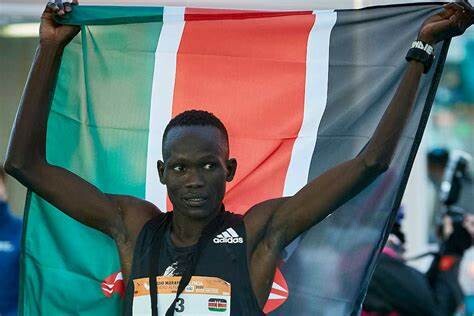
“However, two names are missing from the start list this time. Kenya's superstar Eliud Kipchoge and Ethiopia's running legend Kenenisa Bekele. For the first time since 2014, neither of them will be taking part in Berlin.”
Kipchoge is the all-time Berlin Marathon champion having won a record five times. Last year, Kipchoge cut the tape in 2:02:42 followed by Vincent Kipkemoi (2:03:13) and Tadese Tekele of Ethiopia (2:03:24).
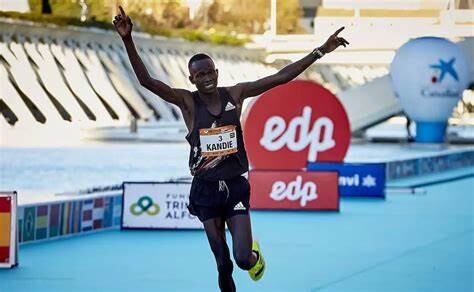
Kandie is a three-time Valencia Half Marathon champion from 2020 (57:32), 2022 (58:10) and 2023 (57:40).
He boasts titles from the 2020 Prague Half Marathon (58:38), the 2022 Adizero Road to Records 10km race (26:50) and the 2020 Ras Al Khaimah Half Marathon (58:58).
He has a silver at the 2020 World Half Marathon Championships (58:54) and a bronze in the 10,000m at the 2022 Commonwealth Games (27:20.34).
He will team up with 2022 Castellon Marathon winner Ronald Korir, Amsterdam Marathon runner-up Cyprian Kotut, 2023 World Road Running bronze medallist Samwel Mailu and Shanghai Marathon champion Philemon Kiptoo.
Ethiopia’s Takele, last year’s silver medallist, is expected to pose a serious challenge for the Kenyans, alongside compatriot Hailemaryam Kiros, the 2023 Osaka Marathon champion.
Tokyo Marathon runner-up Rosemary Wanjiru leads the charge in the women’s elite race.
The 29-year-old’s accolades include victories at the 2023 Tokyo Marathon (2:16:28) and the Hokuren Distance Challenge in the 10,000m (30:38.18) in Japan.
She is also a runner-up at the 2020 Valencia 10km Road race (29:50) and the 2022 Berlin Marathon (2:18:00).
She faces a rich Ethiopian contingent led by Dubai Marathon champion Tigist Ketema, 2018 Shanghai Marathon champion Yebrgual Melese, Paris Marathon champion Mestawut Fikir and 2023 Osaka Marathon runner-up Sisay Meseret.
Also in the mix is three-time Osaka Marathon champion Mizuki Matsuda of Japan.
by Teddy Mulei
Login to leave a comment
BMW Berlin Marathon
The story of the BERLIN-MARATHON is a story of the development of road running. When the first BERLIN-MARATHON was started on 13th October 1974 on a minor road next to the stadium of the organisers‘ club SC Charlottenburg Berlin 286 athletes had entered. The first winners were runners from Berlin: Günter Hallas (2:44:53), who still runs the BERLIN-MARATHON today, and...
more...Wanjiru and Takele return for 50th Berlin Marathon
Four women with sub-2:20 PBs and six men to have dipped under 2:05 feature on the entry lists for the BMW Berlin Marathon, a World Athletics Platinum Label road race, on September 29.
Ethiopia’s Tigist Ketema and Kenya’s Rosemary Wanjiru top the women’s entry list with PBs that put them in the top 10 on the world marathon all-time list.
Ketema, who had been better known as an 800m and 1500m specialist, stormed into the marathon spotlight in Dubai in January as she ran 2:16:07, a time that makes her the ninth-fastest women’s marathon runner in history. She followed that with 2:23:21 for seventh place in London in April and Berlin will be her first race since then.
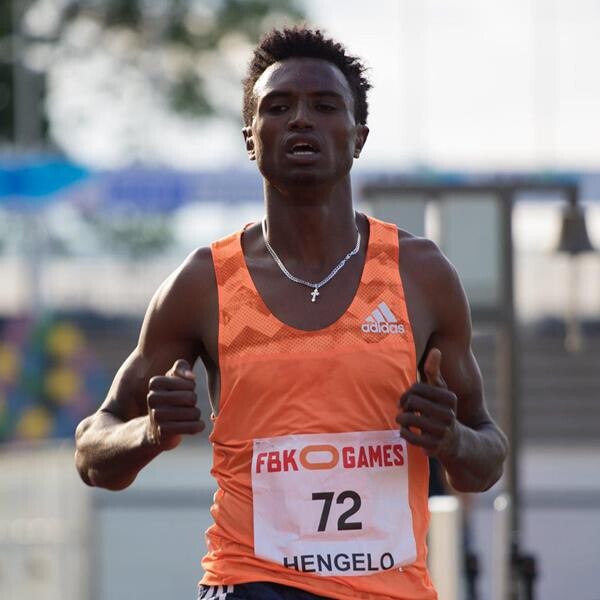
Just one place behind Ketema on the all-time list is Wanjiru, who clocked 2:16:14 to finish second in Tokyo in March. That followed her sixth place in the World Championships marathon in Budapest and victory in the Tokyo Marathon last year. Wanjiru also finished second in Berlin in 2022, running 2:18:00 on her debut.
Joining them on the start line are Ethiopia’s Genzebe Dibaba and Yebrugal Melese, who have respective PBs of 2:18:05 and 2:19:36, plus their compatriots Mestawot Fikir (2:20:45), Azmera Gebru (2:20:48), Sisay Gola (2:20:50), Ababel Yeshaneh (2:20:51) and Fikrte Wereta (2:21:32), as well as Japan’s Mizuki Matsuda (2:20:52).
A total of 13 world records have so far been set in the Berlin Marathon, the most recent being the 2:11:53 by Tigist Assefa in last year’s women’s race.
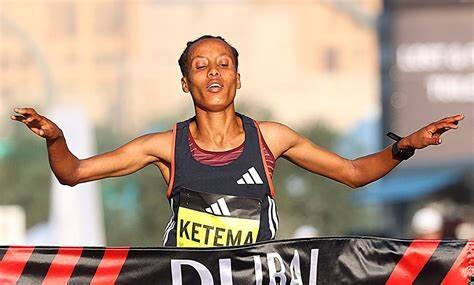
The men’s title on that occasion was won by Eliud Kipchoge, as he claimed a record fifth victory.
This year, for the first time since 2014, the men’s race will not feature Kipchoge or Kenenisa Bekele – who between them have won the race seven times, with two of Kipchoge’s wins having been claimed in world records – but fast times will still be the target.
Among those who will be returning to Berlin are Ethiopia’s Tadese Takele and Ronald Korir of Kenya, who placed third and fourth last year in respective PBs of 2:03:24 and 2:04:22.
Kenya’s Cybrian Kotut ran his PB of 2:04:34 when finishing second in Amsterdam last year and makes his Berlin Marathon debut, while Ethiopia’s Hailemaryam Kiros and Bazezew Asmare have also broken 2:05 in their careers so far, respectively running 2:04:41 in Paris in 2021 and 2:04:57 in Amsterdam in 2022.
Kenya’s Kibiwott Kandie races the marathon for the third time. The former world half marathon record-holder, who clocked 57:32 for 13.1 miles in 2020, will be looking to build on the PB of 2:04:48 he set in Valencia last year.
Also seeking a spot on the podium will be Kenya’s Samwel Mailu, the world half marathon bronze medallist who set a course record of 2:05:08 to win the Vienna City Marathon last year and continues his comeback after injury.
by World Athletics
Login to leave a comment
BMW Berlin Marathon
The story of the BERLIN-MARATHON is a story of the development of road running. When the first BERLIN-MARATHON was started on 13th October 1974 on a minor road next to the stadium of the organisers‘ club SC Charlottenburg Berlin 286 athletes had entered. The first winners were runners from Berlin: Günter Hallas (2:44:53), who still runs the BERLIN-MARATHON today, and...
more...50th BMW BERLIN-MARATHON ON 29 SEPTEMBER: ELITE FIELD
The men’s elite field for the 50th edition of the BMW BERLIN-MARATHON race comes with a change that reflects the recent development at the very top of elite marathon racing.
It will be the first time since 2014 that you will not find the name of either Eliud Kipchoge or Kenenisa Bekele on the start list of the BMW BERLIN-MARATHON. However the Elite Race Director of the marathon where most world records (13) were broken, Mark Milde, can be confident that not so much will change regarding the outcome. Although world-records will not be the target on 29th September, the jubilee race could well deliver extraordinary fast times yet again.
A record number of more than 50,000 runners are expected to run the 50th BMW BERLIN-MARATHON on 29th September. The race, that saw its first edition back in 1974 with 244 finishers, never had over 50,000 runners before.
From those on the men’s start list at least one has the potential to become Kenya’s next marathon superstar: Kibiwott Kandie is a former world half marathon record holder with a personal best of 57:32. This time suggests that he could become one of the fastest marathon runners of all time if he can transform his talent to the classic distance. The 28 year-old, who has a current PB of 2:04:48 and was inspired by former Berlin world record breaker Paul Tergat, is one of half a dozen runners who feature very strong personal bests of sub 2:05:00.
Returning to the BMW BERLIN-MARATHON will be Ethiopia’s Tadese Takele and Ronald Korir of Kenya, who placed third and fourth last year. Both ran their personal bests of 2:03:24 and 2:04:22 here. Kenya’s Cybrian Kotut, a younger brother of former Abbott World Marathon Majors Champion Martin Lel, will run his first BMW BERLIN-MARATHON. Kotut features a PB of 2:04:34. Ethiopians Hailemaryam Kiros (2:04:41) and Bazezew Asmare (2:04:57) are the other two runners with sub 2:05 PBs. Another runner who could challenge for a place on the podium is Samwel Mailu. The Kenyan smashed the course record of the Vienna City Marathon last year with 2:05:08. Due to an injury the bronze medallist from the 2023 World Half Marathon Championships was unable to compete this spring.
The women’s race could see a battle between Ethiopia’s newcomer Tigist Ketema and Kenya’s Rosemary Wanjiru. With their personal bests they are among the top ten on the marathon all-time list. Tigist Ketema took the Dubai Marathon this year with an unofficial world debut record of 2:16:07.
She is a training partner of Tigst Assefa, who smashed the world record at the BMW BERLIN-MARATHON a year ago. Rosemary Wanjiru ran her marathon debut in Berlin two years ago and finished second with a brilliant 2:18:00. This year she improved to 2:16:14 when she was runner-up in Tokyo.
Former 1,500m world record holder Genzebe Dibaba, who is the younger sister of Ethiopian running legend Tirunesh Dibaba, will hope to achieve a fast time on the flat Berlin course. She ran a 2:18:05 debut in Amsterdam two years ago, but was not yet able to improve this time. Genzebe Dibaba was the 2014 Laureus World Sportswoman of the Year. Fellow-Ethiopian Yebrgual Melese is the fourth woman on the start list who has a sub 2:20 PB with 2:19:36.
Elite Runners for the 50th BMW BERLIN-MARATHON:
MEN
Tadese Takele ETH 2:03:24
Ronald Korir KEN 2:04:22
Cybrian Kotut KEN 2:04:34
Hailemaryam Kiros ETH 2:04:41
Kibiwott Kandie KEN 2:04:48
Bazezew Asmare ETH 2:04:57
Samwel Mailu KEN 2:05:08
Milkesa Mengesha ETH 2:05:29
Haymanot Alew ETH 2:05:30
Philimon Kipchumba KEN 2:05:35
Stephen Kiprop KEN 2:07:04
WOMEN
Tigist Ketema ETH 2:16:07
Rosemary Wanjiru KEN 2:16:14
Genzebe Dibaba ETH 2:18:05
Yebrugal Melese ETH 2:19:36
Mestawot Fikir ETH 2:20:45
Azmera Gebru ETH 2:20:48
Sisay Gola ETH 2:20:50
Ababel Yeshaneh ETH 2:20:51
Mizuki Matsuda JPN 2:20:52
Fikrte Wereta ETH 2:21:32
Login to leave a comment
BMW Berlin Marathon
The story of the BERLIN-MARATHON is a story of the development of road running. When the first BERLIN-MARATHON was started on 13th October 1974 on a minor road next to the stadium of the organisers‘ club SC Charlottenburg Berlin 286 athletes had entered. The first winners were runners from Berlin: Günter Hallas (2:44:53), who still runs the BERLIN-MARATHON today, and...
more...Faith Kipyegon looks to add marathon record to her collection in future
Double World and Olympic champion, Faith Kipyegon has expressed her desire to smash the World Marathon record in the coming years.
The 29-year-old mother of one reaffirmed her ambition to enter the fierce road racing competition when she is finished with the track.
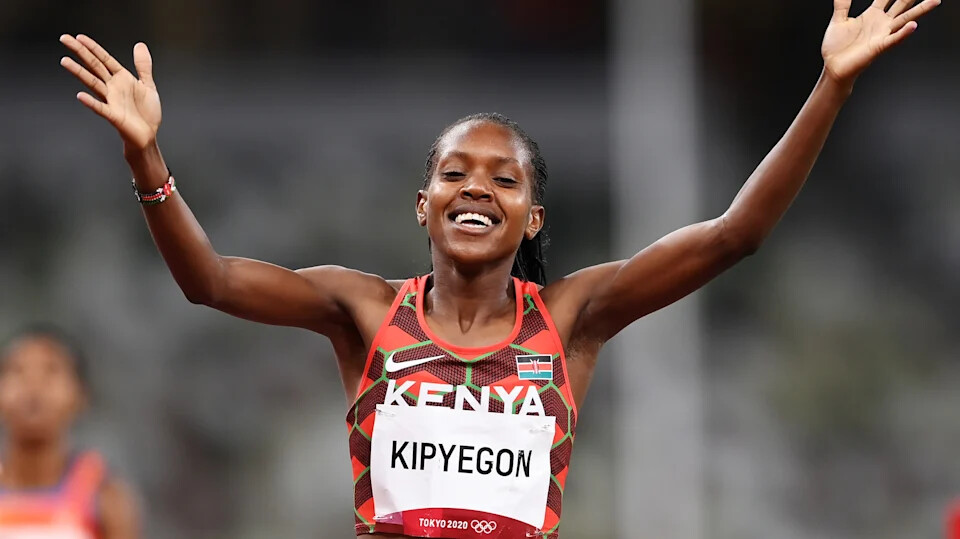
Speaking on Citizen TV, Kipyegon revealed that her masterclass act in Monaco on July 22, where she smashed the world record in the one-mile race was her initial step towards venturing into the roads.
"The mile was my first road race as I look to take up a career in the marathon. Expect to see me in the next Berlin Marathon race. I will run the marathon one day," Kipyegon said.
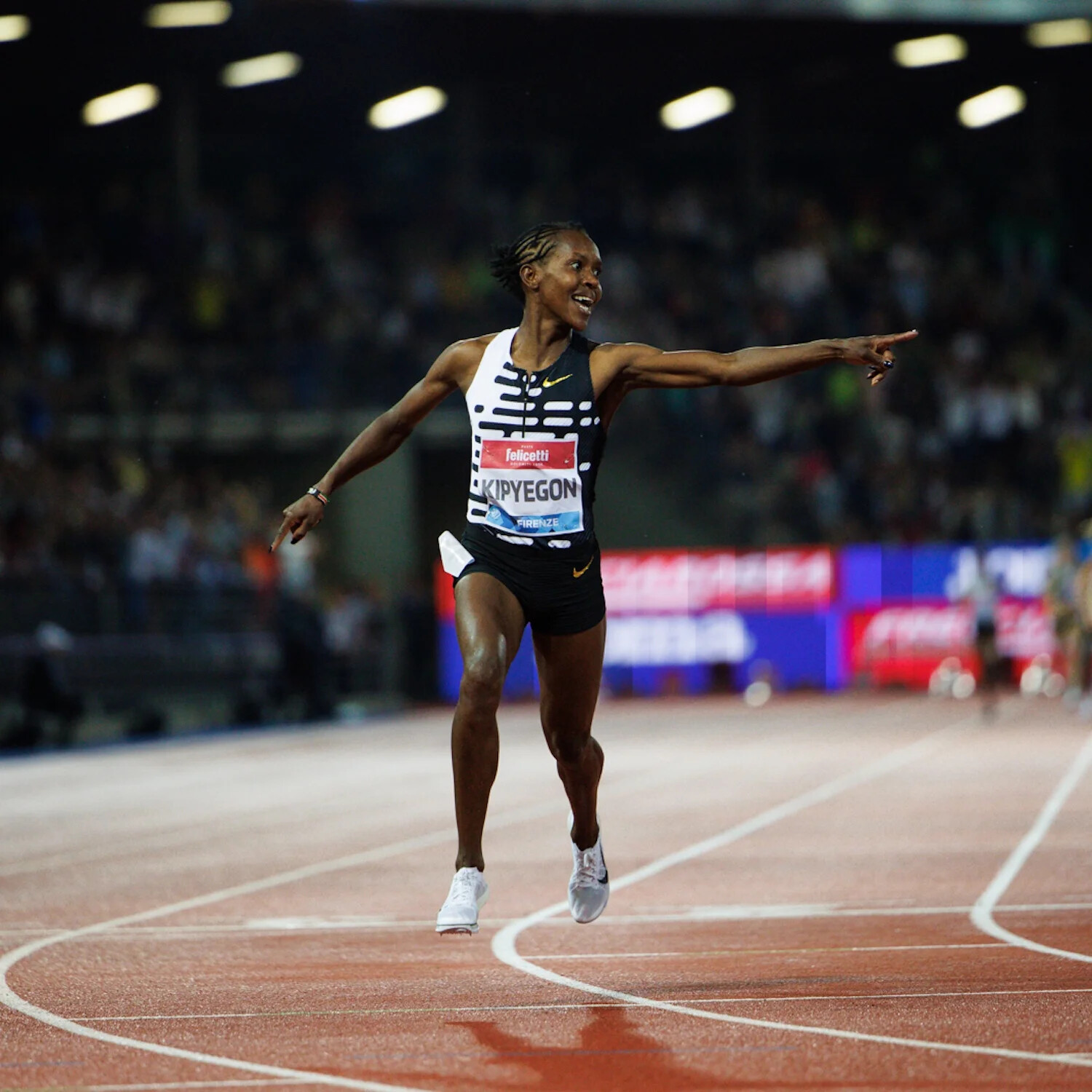
"I intend to run every major marathon in the Abbott series including the BerIin, London, and Amsterdam," she added.
Kipyegon lavished praise on marathon icon Eliud Kipchoge for inspiring her to take a stab at the blistering 42km race.
"I train in Kaptagat with Eliud Kipchoge and Geoffrey Kamwaror in a global training camp and they have done quite a lot to inspire me to take an interest in the 42km race," Kipyegon stated.
"On Mondays, we do easy runs, and on Tuesdays, we are on track. We allow the men to start ahead of us and we try as much as we can to catch up. We cannot compete with them because their training is more intense. So we only work alongside them in easy runs.
"If you love something and have a passion for it, then going for training doesn't become a burden," she quipped.
Kipyegon added that she hopes to reclaim the women's 5000m world record at the 2024 Paris Olympics after surrendering it to Ethiopia's Gudaf Tsegay in Eugene, Oregon on September 17.
"Winning three gold medals back-to-back in the Olympics will be incredible. It will motivate the coming generations and motivate me as well. I will have left a legacy.
"I have already won four Diamond Leagues and I intend to go all out for my fifth title next year.
Kipyegon spoke even as news streamed in that she had been nominated for the World Athletics Female Athlete of the Year award.
She will vie for the accolade alongside 11 other nominees unveiled by the world governing body on Wednesday. The winner will be announced on December 13.
The Kenyan track sensation made the list of nominees following a splendid season, where she smashed three world records at the Diamond League before running away with the 1500m and 5000m world titles at the World Athletics championships in Budapest, Hungary.
by Tony Mballa
Login to leave a comment
BMW Berlin Marathon
The story of the BERLIN-MARATHON is a story of the development of road running. When the first BERLIN-MARATHON was started on 13th October 1974 on a minor road next to the stadium of the organisers‘ club SC Charlottenburg Berlin 286 athletes had entered. The first winners were runners from Berlin: Günter Hallas (2:44:53), who still runs the BERLIN-MARATHON today, and...
more...Sheila Chepkirui hungry for more success after Berlin Marathon exploits
Chepkirui finished second behind record holder Tigist Assefa and she is now eyeing more success.
Berlin Marathon runner-up Sheila Chepkirui is definitely the lady going to watch when it comes to the full marathon.
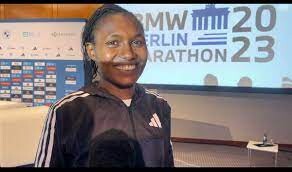
Chepkirui defied all odds to finish second behind newly-crowned world record holder Tigist Assefa of Ethiopia. She has now set her sights on winning one of the major races since she believes she has all it takes to achieve her dream.
She has now competed in two World Marathon Majors, the London Marathon where she finished fourth, and now the Berlin Marathon where she has finished second.
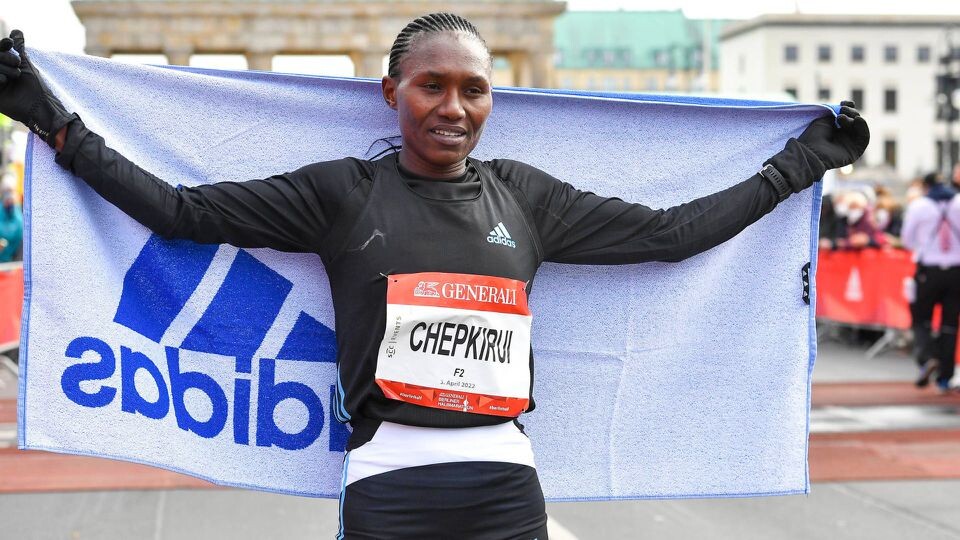
Speaking to Capital Sport, she said: “I’m happy to finish in the podium bracket in one of the Major Marathons.
I pray that one day I win one of the major races. I don’t know where I will run next…right now I shall be taking a break to just rest.”
She made her debut at the Valencia Marathon last year where she finished third and so far, her progress has been smooth.
She extended her hand of gratitude to the fans who showed up and cheered her on as she went ahead to finish second.
“I thank them for praying for me and supporting me…that was motivation enough for me to execute a good run,” she said.
by Abigael Wuafula
Login to leave a comment
BMW Berlin Marathon
The story of the BERLIN-MARATHON is a story of the development of road running. When the first BERLIN-MARATHON was started on 13th October 1974 on a minor road next to the stadium of the organisers‘ club SC Charlottenburg Berlin 286 athletes had entered. The first winners were runners from Berlin: Günter Hallas (2:44:53), who still runs the BERLIN-MARATHON today, and...
more...Assefa smashes world marathon record in Berlin with 2:11:53, Kipchoge achieves record fifth win
Ethiopia’s Tigst Assefa successfully defended her BMW Berlin Marathon title in style, smashing the world record with 2:11:53* while distance running legend Eliud Kipchoge notched up a record fifth victory at the World Athletics Platinum Label road race in the German capital on Sunday (24).
Assefa took more than two minutes off the women’s world record of 2:14:04, which had been set by Kenya’s Brigid Kosgei at the 2019 Chicago Marathon. Kipchoge, meanwhile, won by 31 seconds in 2:02:42, the fifth-fastest time of his illustrious career.
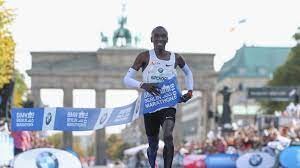
The men’s and women’s races unfolded in contrasting style.
A large pack of the leading contenders ran together through the early stages of the women’s race, passing through 5km in 15:58. 13 women were still in contact with the lead as they passed through 10km in 31:45.
By the time 15km was reached in 47:26, Assefa and compatriot Workenesh Edesa had managed to open up a slight gap on Kenya’s Sheila Chepkirui and Ethiopia’s 2015 world 5000m silver medallist Senbere Teferi and Zeineba Yimer. The first 12 women were strung out, but still within 15 seconds of one another – and all were running inside world record pace.
Sensing that most of her rivals were already starting to fade, Assefa took greater command of the race by throwing in a 2:59 split for the 16th kilometre. By the time she reached 17km, Assefa had dropped Edesa, the last of her opponents, and had just a few male pacemakers for company.
Assefa seemed to grow in confidence – and pace – once she knew she was alone at the front of the pack, and she went on to reach the half-way point in 1:06:20, putting her on track to smash the world record by more than a minute.
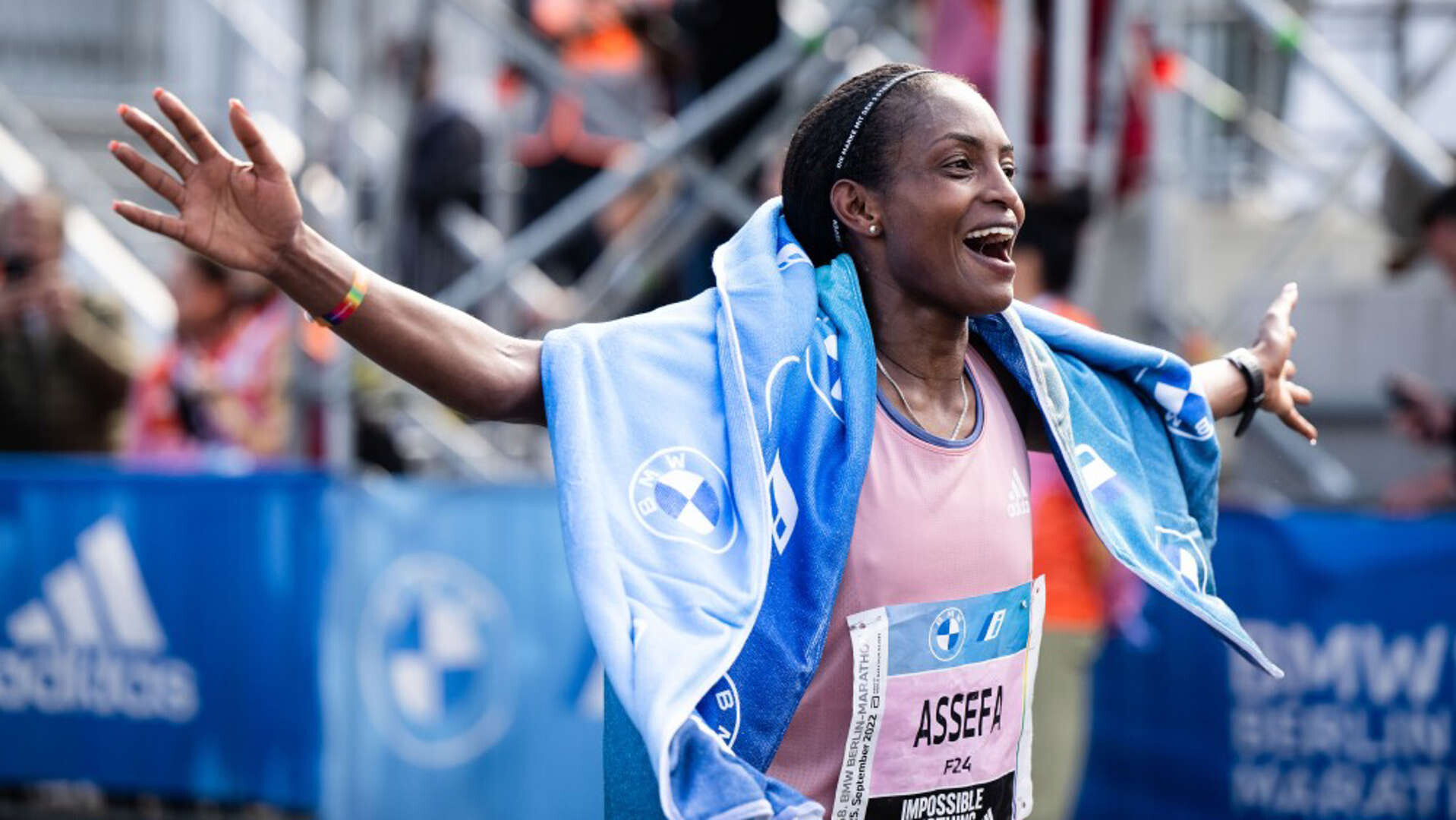
And then she sped up. The next kilometre was covered in 2:48, the fastest of the race up to that point, extending her advantage over Edesa and Chepkirui. Assefa’s 25km split of 1:18:40 was still well inside world record schedule; Chepkirui and Edesa, now almost a minute behind the leader, had dropped off the pace, but were still on course for huge PBs.
Assefa, still looking incredibly relaxed and composed, covered the next 10km segments in a remarkable 31:02, bringing her to 35km in 1:49:41. Her 30km split was 1:34:12, the second-fastest mark in history for that checkpoint (behind Ruth Chepngetich’s 1:34:01 from the 2022 Chicago Marathon).
But while Chepngetich faded badly in that race last year, Assefa went from strength to strength in the closing stages in Berlin.
She got to 40km in 2:05:13, following another 15:32 5km split, putting her on course for a finishing time in the 2:12 range. Spurred on by the knowledge that the world record was in the bag, Assefa picked up her pace in the closing kilometres and charged through the finish line in 2:11:53.
Chepkirui held on to second place in 2:17:49, while Tanzania’s Magdalena Shauri made a remarkable breakthrough to take third place in 2:18:41, a huge national record.
A record eight women finished inside 2:20.
Berlin victory no.5 for Kipchoge
Kipchoge may not have improved on his own world record, but he added to his legacy on the streets of Berlin by achieving a record fifth win, clocking 2:02:42.
The two-time Olympic champion eventually won by 31 seconds, but for most of the race he had company in the surprising form of Ethiopia's Derseh Kindie.
The duo made an early break from the rest of the field, reaching 5km in 14:12 with a 15-second margin over the rest of the elite men. By 10km, reached in 28:27, they were operating at exactly 2:00:00 marathon pace and more than half a minute ahead of the seven-man chase pack.
Kipchoge and Kindie continued to run together at world record schedule through the half-way point, reached in 1:00:22, but the pace started to drop soon after. By the time they got to 25km (1:11:48), they were no longer on schedule to break Kipchoge's record of 2:01:09 set last year in Berlin.
But records weren't Kipchoge's main concern; he had company in the form of a relatively unheralded runner up to 30km (1:26:25), so his attention was primarily on securing victory.
At about 31km into the race, Kipchoge increased his tempo and, with a cursary glance over his shoulder to see if Kindie was able to follow, knew it was enough to see off his opponent. The Kenyan great was alone in front at last, while Kindie continued for another minute or so before stepping off the course.
Kipchoge still had more than 10km to go, but his lead was comfortable and his form was controlled and relaxed. He went on to win in 2:02:42, while a fast-finishing Vincent Kipkemoi came through to take second place in 2:03:13. Ethiopia's Tadese Takele was third in 2:03:24.
A record nine men finished inside 2:05 and 15 finished inside 2:06, making it the deepest men's marathon in history. There were national records for Germany's Amanal Petros (ninth in 2:04:58) and Switzerland's Tadesse Abraham (11th in 2:05:10).
Login to leave a comment
Wow! Berlin always delivers. Imagine smashing a world record by this margin! - Bob Anderson 9/24 8:52 am |
BMW Berlin Marathon
The story of the BERLIN-MARATHON is a story of the development of road running. When the first BERLIN-MARATHON was started on 13th October 1974 on a minor road next to the stadium of the organisers‘ club SC Charlottenburg Berlin 286 athletes had entered. The first winners were runners from Berlin: Günter Hallas (2:44:53), who still runs the BERLIN-MARATHON today, and...
more...Berlin Marathon: will the women’s course record fall again?
Ethiopia’s Tigist Assefa will be aiming for the course record once more in Berlin on Sunday, in the deepest elite field in the race’s 49-year history, including seven runners with sub-2:20 personal bests.
In 2022, Assefa astounded fans by improving her best by over 18 minutes, taking more than two and a half minutes off the course record with her time of 2:15:37, and earning the unique status of the only woman to break sub-two minutes for the 800m and sub 2:20 for the marathon.
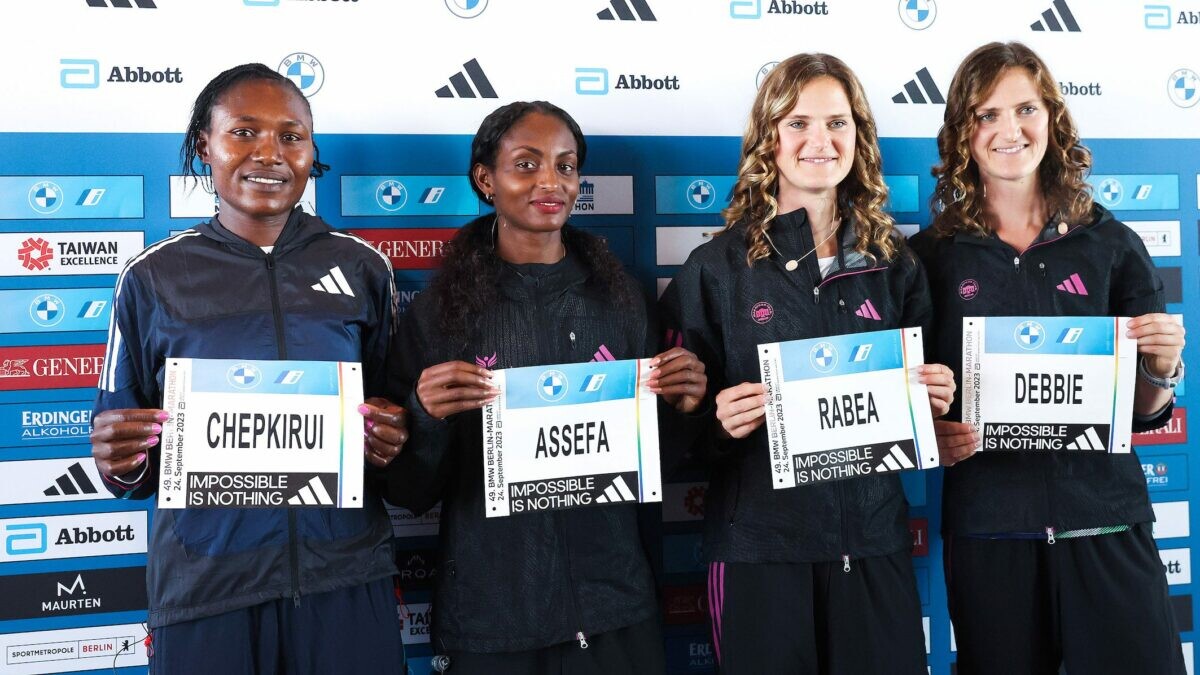
“I’m delighted to be running again in Berlin,” 26-year-old Assefa said at the elite women’s press conference on Thursday. “Last year’s race proved an unexpected success for me. I think I can run even faster on Sunday, a further improvement would be a success,” she said.
Will Assefa be setting her sights on the world record of 2:14:04? She felt that might be too ambitious: “Much can happen so I cannot say at the moment what would be the halfway split,” she said on Thursday. “I want to improve my time but I am not thinking about the world record.”
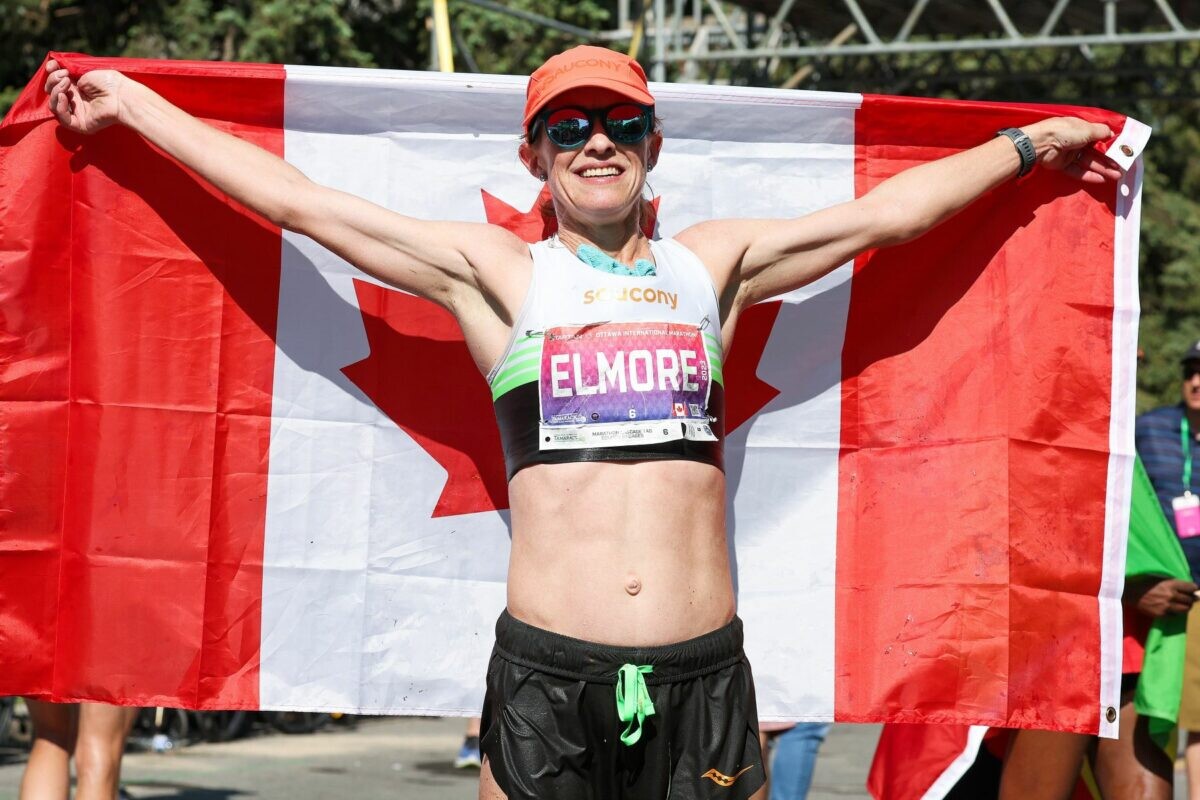
Assefa will face a serious challenge from Kenya’s Sheila Chepkirui, who set a new course record at the 2022 Berlin Half Marathon in a blistering 65:02. She also took third in a speedy Valencia Marathon in 2:17:29, and ran 2:18:51 in London in April for fourth place. “My aim is to break my personal best. I can imagine going through the first half on Sunday in around 68 minutes,” she said.
Challenges could also come from Assefa’s compatriots Tigist Abayechew, third in Berlin in 2022, Hiwot Gebrekidan, second in Berlin in 2021 and Workenesh Edesa, who was fourth last year. “The women’s course record of 2:15:37 is an absolute world-class time,” said the race director Mark Milde. “But, given the strong field, we hope that this can be broken.”
Many of the elite field will simply be hoping to achieve the Olympic standard of 2:26:50.
Canada’s Malindi Elmore will toe the line
Malindi Elmore of Kelowna, B.C. looks to be in fine form to run on the same course where Natasha Wodak broke Elmore’s Canadian marathon record last year. In May, Elmore threw down a gutsy performance at the 2023 Tartan Ottawa International Marathon, where her goal was to get the Olympic standard; she was on pace through 30K and sitting in fourth position. Over the final 12 kilometres, she moved up two spots to finish second, but missed the standard by less than a minute. It seems unlikely she plans to reclaim her Canadian record (which is three minutes faster than the Olympic standard) this weekend, but as all marathon fans know, anything can–and usually does–happen.
A record number of 47,912 runners from 156 nations have entered the 49th edition of the BMW Berlin Marathon. Germany’s most spectacular road race is part of the Abbott World Marathon Majors (AWMM) and is also a Platinum Label Road Race of World Athletics. The men’s press conference will be held on Friday, September 22.
by Keeley Milne
Login to leave a comment
BMW Berlin Marathon
The story of the BERLIN-MARATHON is a story of the development of road running. When the first BERLIN-MARATHON was started on 13th October 1974 on a minor road next to the stadium of the organisers‘ club SC Charlottenburg Berlin 286 athletes had entered. The first winners were runners from Berlin: Günter Hallas (2:44:53), who still runs the BERLIN-MARATHON today, and...
more...Why Eliud Kipchoge has reason to be nervous as Amos Kipruto threatens to end his Berlin marathon dominance
Amos Kipruto's quest for a personal best at the Berlin Marathon raises questions about Eliud Kipchoge's confidence. A thrilling showdown awaits.
Amos Kipruto, the second-fastest man in the field, is on a mission to improve his personal best (PB) as he prepares to tackle the Berlin Marathon.
In a pre-race interview, Kipruto expressed his determination to bounce back after a setback at the London Marathon last April, where he narrowly missed the top spot.
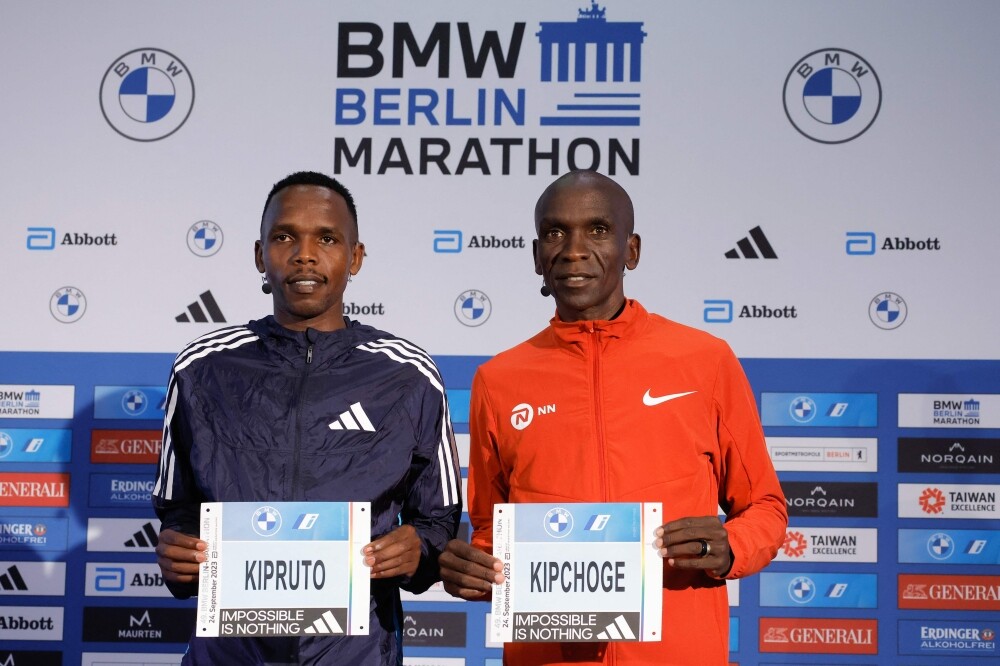
“Losing London it disturbed me, but I never lost hope, and I am here to fight for the best. On Sunday I will be competing for my personal best, I am racing against my time. If I can achieve that, I will be happy,” said Kipruto, who's looking to beat the impressive 2:03.13 he achieved as the runner-up behind the legendary Eliud Kipchoge at last year’s Tokyo Marathon.
Kipruto, 31, is no stranger to the Berlin course. He was the runner-up in 2018, an unforgettable year when Kipchoge first shattered the world record.
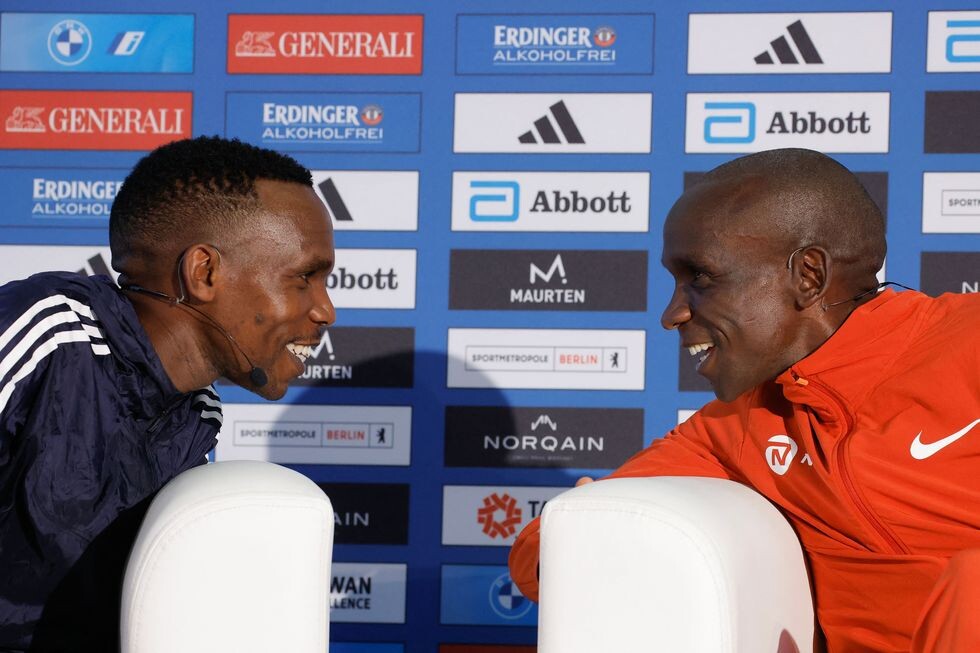
However, it is not just Kipruto who has a point to prove. Eliud Kipchoge, the marathon maestro himself, is eager to remind the world of his enduring dominance.
Following a performance in Boston last April that left some questioning his form, Kipchoge is determined to showcase his prowess on a course he knows all too well.
This race holds particular significance for him as he gears up for Paris 2024, where he seeks an unprecedented third Olympic Marathon gold.
During Friday's press conference, Kipchoge chose to keep his race strategy close to his chest, opting instead to tantalize fans with a promise of "a beautiful race because the weather will be good." Indeed, the race is anticipated to take place under optimal circumstances, with minimal wind and a pleasant 11-degree Celsius temperature (51.8 F).
In 2022, the 38-year-old left the world in awe as he crossed the halfway point in an astonishing 59:51, marking the fastest split in marathon history.
When asked if the 21km split would face a challenge again this year in Berlin, Kipchoge responded with a radiant smile, "Who knows what will happen during the race." He then added, "2023 is a different game altogether. We are approaching it in a different way, but when you are in the race, anything might happen. We follow what's in our hands."
As the Berlin Marathon draws near, the question on everyone's mind is whether Amos Kipruto's determination and thirst for a personal best will make Eliud Kipchoge nervous.
The marathon world is known for its unpredictability, and on race day, anything is possible. For now, the stage is set for an epic showdown between two Kenyan legends, with the world eagerly awaiting the outcome.
In a sport where every step counts, where records are shattered and legacies are forged, both Kipruto and Kipchoge know that only time will reveal who will emerge victorious in this battle of wills and speed.
by Festus Chuma
Login to leave a comment
BMW Berlin Marathon
The story of the BERLIN-MARATHON is a story of the development of road running. When the first BERLIN-MARATHON was started on 13th October 1974 on a minor road next to the stadium of the organisers‘ club SC Charlottenburg Berlin 286 athletes had entered. The first winners were runners from Berlin: Günter Hallas (2:44:53), who still runs the BERLIN-MARATHON today, and...
more...Chepkirui hunting for new PB in Berlin showdown with Ethiopia's Tigest Assefa
Kenyan Sheila Chepkirui and Ethiopian Tigest Assefa gear up for the Berlin Marathon showdown, aiming to break records and secure Olympics
Kenyan marathoner Sheila Chepkirui is preparing to compete in the women's contest at the 2023 Berlin Marathon against a formidable Ethiopian lineup, led by the defending champion, Tigest Assefa.
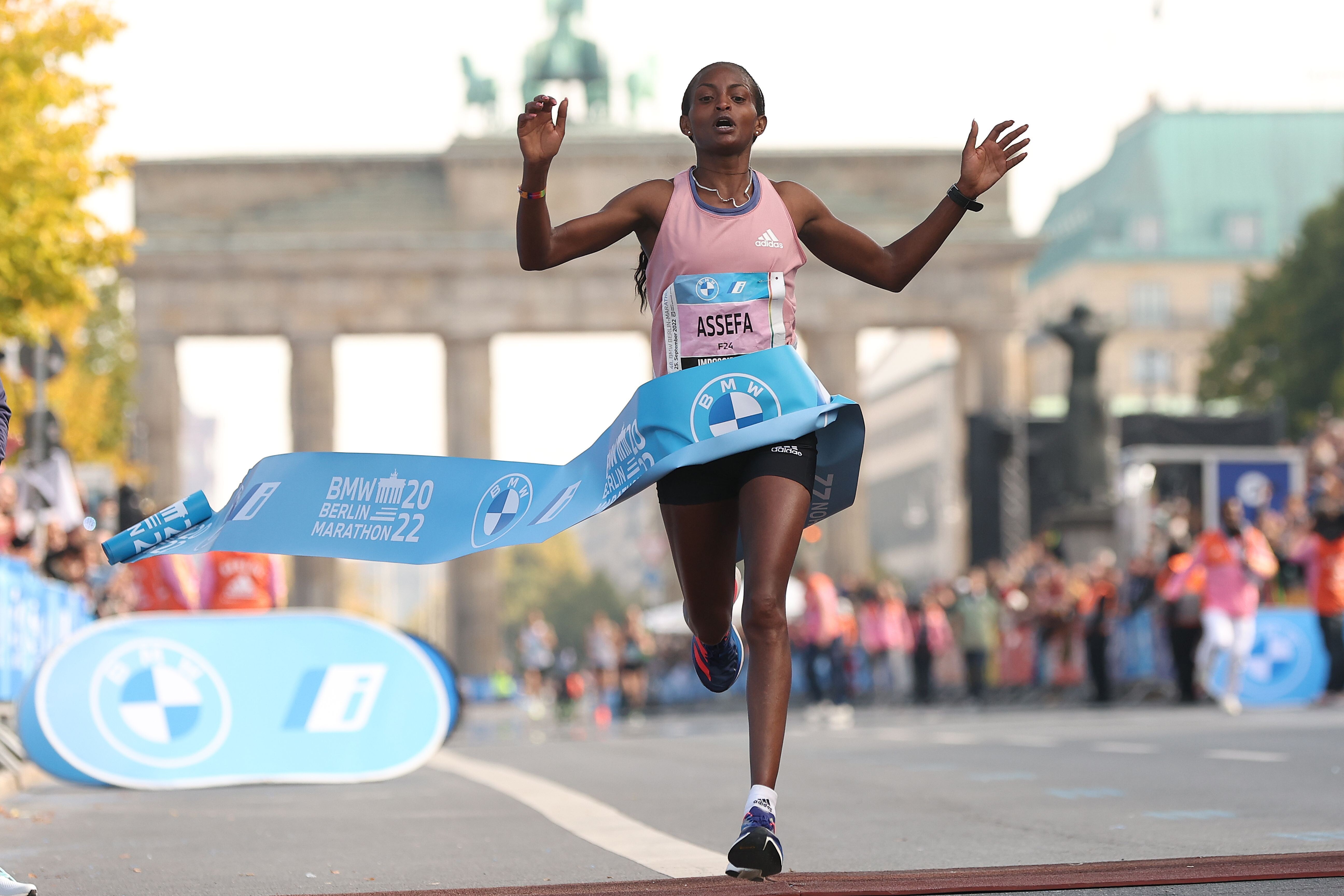
Chepkirui, who finished fourth at the London Marathon last April, carries an impressive personal best of 2:17:29 from the Valencia Marathon last year.
Assefa made headlines last year by posting an incredible time of 2:15:37 at the Berlin Marathon, setting a new course record and establishing herself as one of the fastest marathon runners in history.
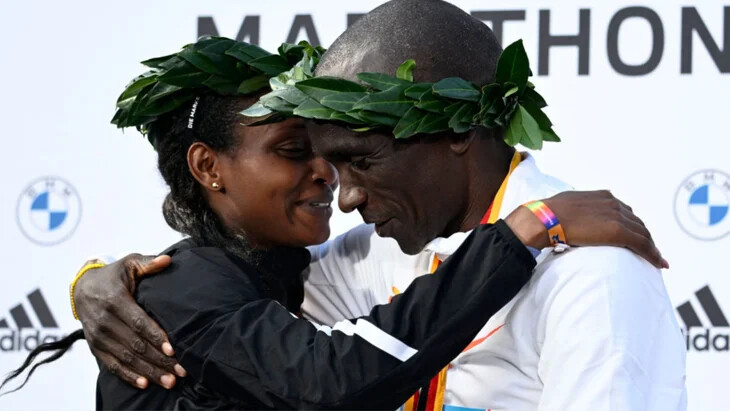
Chepkirui, a Kenya Defence Forces soldier and a former Africa cross country champion, has already proven her mettle on the international stage by clinching the 10,000m bronze medal at the 2022 Commonwealth Games in Birmingham, UK.
Ethiopian runners dominate the list of fastest women's runners at this year's Berlin Marathon, with Tigist Abayechew (2:18:03), Workenesh Edesa (2:18:51), and Hiwot Gebrekidan (2:19:10) all boasting impressive sub-2:20 times. Amane Beriso, the winner of last year's Valencia Marathon, adds further depth to the Ethiopian contingent.
However, all eyes will be on Chepkirui, who hails from Kiptere Secondary School in Kericho and boasts a remarkable half marathon personal best of 64:36. Her determination to excel is evident, as she aims to make up for her absence at the Boston Marathon last April due to visa issues.
Chepkirui, who runs under the Ikaika Sports stable, is the sole Kenyan representative in the Berlin Marathon after Margaret Wangare withdrew due to injury. Her marathon journey began at last year's Valencia Marathon, where she impressed with a third-place finish and a personal best time of 2:17:29. Now, she is focused on breaking her own record.
"My aim is to break my personal best. I can imagine going through the first half on Sunday in around 68 minutes," said the 32-year-old Chepkirui.
Tigst Assefa, the defending champion, is also eager to make her mark once again in Berlin. Reflecting on her remarkable performance last year, where she shattered the course record, Assefa expressed her delight at returning to the event.
"Last year's race proved an unexpected success for me. I think I can run even faster on Sunday, a further improvement would be a success," said Tigst Assefa.
While she remains focused on improving her time, she is cautious about discussing the world record of 2:14:04.
Both Chepkirui and Assefa have an additional goal in the BMW Berlin Marathon: securing Olympic qualifying times. Given the fierce competition in Ethiopia and Kenya, achieving the necessary times for Olympic qualification will require exceptional performances.
Two more Ethiopian athletes, Tigist Abayechew with a personal best of 2:18:03 and Workenesh Edesa with a best time of 2:18:51, are making their return to Berlin. Last year, they, along with Tigst Assefa, achieved an unofficial world team record of 6:52:31.
Mark Milde, the race director, expressed optimism about the potential for records to be broken, saying, "The women's course record of 2:15:37 is an absolute world-class time. But, given the strong field, we hope that this can be broken."
The elite women's field at the Berlin Marathon boasts both breadth and depth. Japan's Hitomi Niiya, with a personal best of 2:19:24, has the potential to challenge her national record set 18 years ago on the same course. Another athlete to watch is Ethiopian Senbere Teferi, a world record holder for 5km on the road with a time of 14:29.
In addition to the international competition, a fierce contest is expected among German women. The German contingent, featuring athletes like the Schöneborn twins, Deborah and Rabea, Domenika Mayer, Kristina Hendel, and Laura Hottenrott, has a strong presence with personal bests ranging from 2:25 to 2:27.
by Festus Chuma
Login to leave a comment
BMW Berlin Marathon
The story of the BERLIN-MARATHON is a story of the development of road running. When the first BERLIN-MARATHON was started on 13th October 1974 on a minor road next to the stadium of the organisers‘ club SC Charlottenburg Berlin 286 athletes had entered. The first winners were runners from Berlin: Günter Hallas (2:44:53), who still runs the BERLIN-MARATHON today, and...
more...Eliud Kipchoge is ready for a fast race in Berlin
Once again the best marathon runner of all time will be on the start line of the BMW BERLIN-MARATHON. The double Olympic champion from Kenya, who brought his own world record down to 2:01:09 a year ago in Berlin, will be almost compelled to go all out for a fast time on Sunday, such is the enormously competitive running scene among his compatriots where only an extremely fast time within the Olympic qualifying mark will secure one of the three places for the Kenyan men’s team in the Olympic Marathon in Paris next year.
Eliud Kipchoge’s ambition in Paris is to become the first runner in history to win three Olympic Marathon titles. The Kenyan is aiming to use the BMW BERLIN-MARATHON almost as a springboard to book his place in Paris. While Eliud Kipchoge could strike up a world record pace at the head of the field, Germany’s marathon star Amanal Petros seeks an unprecedented achievement in the history of the BMW BERLIN-MARATHON by becoming the first to set a men’s national record here, a feat so far never accomplished in the previous 48 editions of the event.
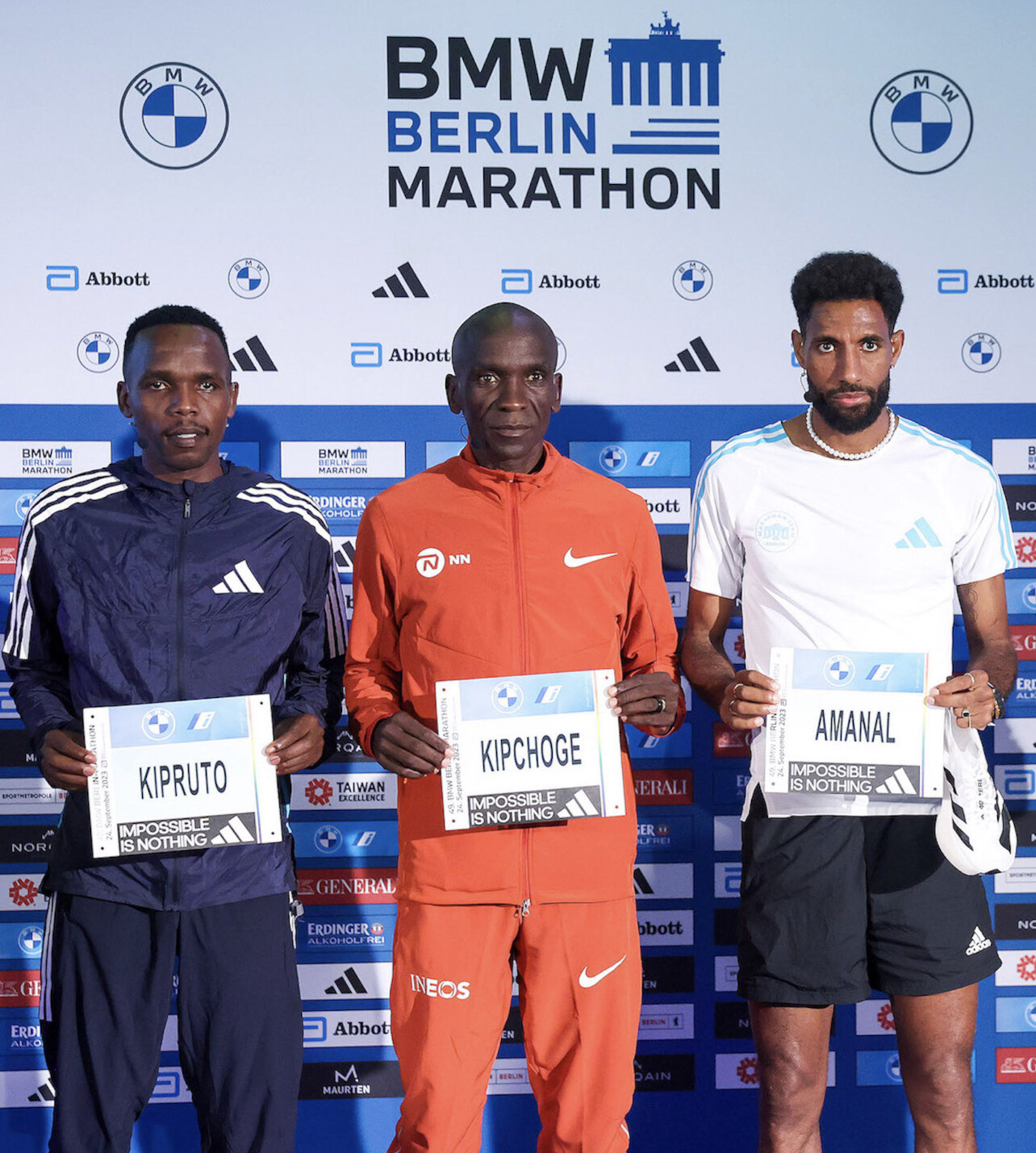
A record number of 47,912 runners from 156 nations have entered the 49th edition of the BMW BERLIN-MARATHON. Germany’s most spectacular road race is part of the Abbott World Marathon Majors (AWMM) and is also a Platinum Label Road Race of World Athletics.
“We feel honoured that the best marathon runner in sporting history, Eliud Kipchoge, has decided to run the BMW BERLIN-MARATHON for a sixth time. This confirms the outstanding status of the event and raises hopes for an exceptional result,” said race director Mark Milde, who has organized Kipchoge’s previous five races in Berlin.
“Berlin for me is like home. Looking at the Olympic Games in Paris next year, I considered which races would be the best preparation for me and Berlin was the best option,” explained Eliud Kipchoge. A year ago his pace for much of the early stages of the race suggested he might even break two hours. “But that was 2022, it’s a different year now and a different race,” said the 38-year-old. Winning in Berlin for the fifth time would give him more titles here than any other champion. He is currently level with the legendary Ethiopian Haile Gebrselassie on four victories.
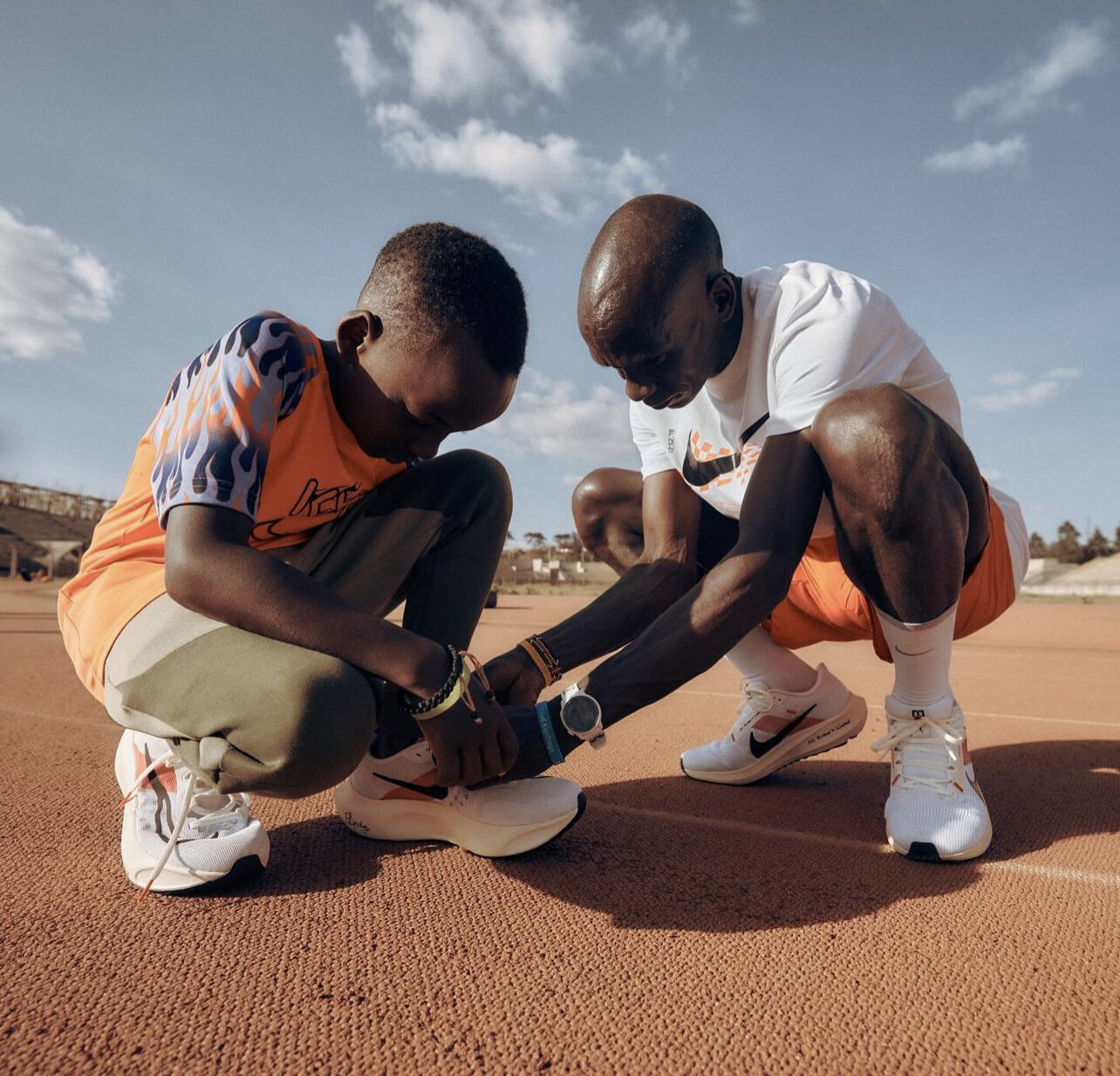
It is not beyond the bounds of possibility that Eliud Kipchoge breaks the world record for the third time in Berlin, although he did not announce any definite goals at the press conference. “I’m nervous, but that shows I’m ready,” said Kipchoge. “I’ll try to run a good time.” Of his 20 marathons, Eliud Kipchoge has emerged victorious in all but three, in itself a unique achievement.
The man with the second fastest time going into the race is also Kenyan, Amos Kipruto. He ran his personal best of 2:03:13 in Tokyo last year, finishing runner-up to Eliud Kipchoge. “My aim on Sunday is to run a personal best,” stated Amos Kipruto, whose career highlight so far is winning the London Marathon last year.
A dozen men on the start list show best times of under 2:06, proof of the strength in depth among the elite in this year’s BMW BERLIN-MARATHON. “It would be fair to say that every elite runners comes to Berlin to run their personal best,” admitted Mark Milde.
Amanal Petros has as his goal in his BMW BERLIN-MARATHON debut that of breaking his own German record of 2:06:07 by a clear margin. “I’ve trained in Kenya for almost four months at altitude of 2,400 metres, concentrating entirely on Berlin. That was very challenging,” said the 28-year-old. “Going through halfway in around 62 minutes is feasible but we can adjust the pace at any time.”
Not only the German but the Swiss national record for the marathon could come under pressure. Tadesse Abraham improved his best to 2:06:38 as a 39-year-old last year in Zurich. Now turned 41, he might even threaten the world masters record of none other than Kenenisa Bekele, who ran 2:05:53 in London last year.
Men’s elite runners with personal bests
Eliud Kipchoge KEN 2:01:09
not record eligible:1:59:40,2
Amos KiprutoKEN2:03:13
Jonathan MaiyoKEN2:04:56
Eliud Kiptanui KEN 2:05:21
Ghirmay Ghebreslassie ERI 2:05:34
Ronald KorirKEN2:05:37
Tadu Abate ETH 2:05:38
Philemon KiplimoKEN2:05:44
Enock Onchari KEN 2:05:47
Mark Korir KEN 2:05:49
Andualem ShiferawETH2:05:52
Haftu TekluETH2:05:53
Amanal PetrosGER2:06:27
Josphat BoitKEN2:06:34
Tadesse Abraham SUI 2:06:38
Okubay Tsegay ERI2:06:46
Abel KipchumbaKEN2:06:49
Yusuke Ogura JPN2:06:51
Denis ChirchirKEN2:07:17
Eyob Faniel ITA 2:07:19
Justus KangogoKEN2:07:40
Titus Kipkosgei KEN2:07:46
Godadaw BelachewISR2:07:54
Dominic Nyairo KEN2:08:13
Derseh Kindie ETH 2:08:23
Guojian Dong CHN2:08:28
Liam Adams AUS 2:08:39
Scott FaubleUSA2:08:52
Hendrik Pfeiffer GER 2:10:18
Samuel Fitwi GER 2:12:14
Konstantin Wedel GER 2:13:02
Login to leave a comment
BMW Berlin Marathon
The story of the BERLIN-MARATHON is a story of the development of road running. When the first BERLIN-MARATHON was started on 13th October 1974 on a minor road next to the stadium of the organisers‘ club SC Charlottenburg Berlin 286 athletes had entered. The first winners were runners from Berlin: Günter Hallas (2:44:53), who still runs the BERLIN-MARATHON today, and...
more...Paul Chelimo planning to spoil Eliud Kipchoge's party in Berlin
Paul Chelio intends to make his marathon debut at Sunday's Berlin Marathon with one goal in mind, to spoil the party.
All roads will lead to the Berlin Marathon on Sunday where Eliud Kipchoge will be planning to lower his time as he races on one of his favourite courses.
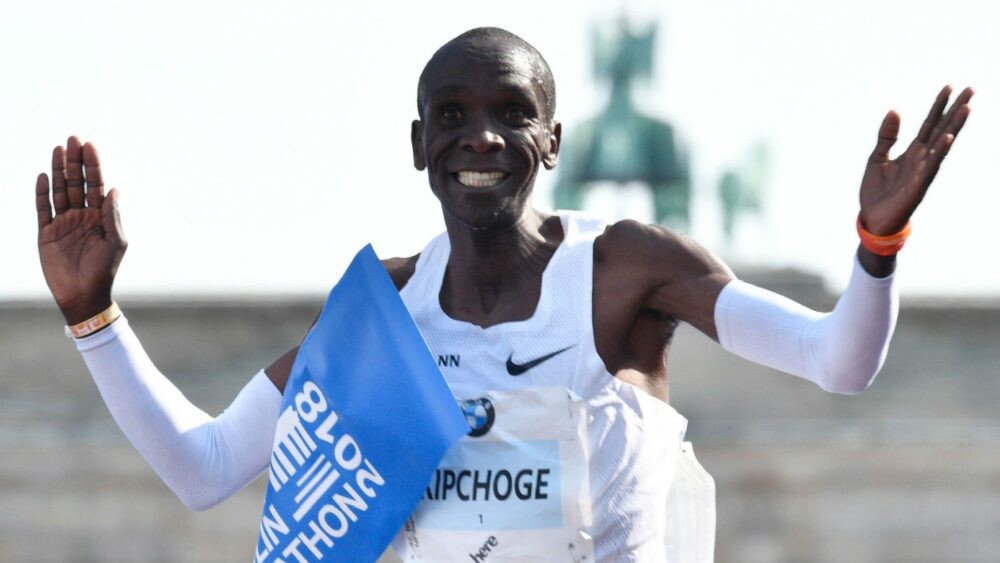
However, many athletes will be hoping to stop him from reigning supreme, and in particular, Kenyan-born American Paul Chelimo will be hoping to stop his dominance.
Chelimo is yet to run a marathon and he has shared his thoughts on making his debut in the German capital with a goal in mind.
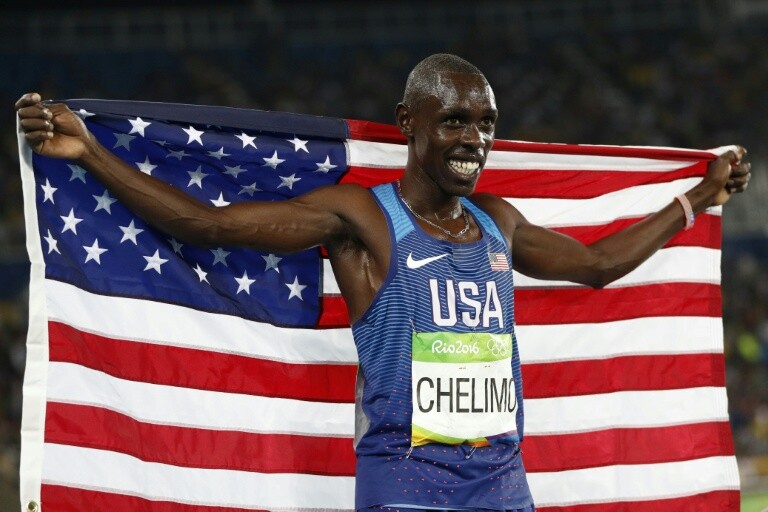
In a post on his Twitter page, he said: “Might show up to Berlin this weekend and spoil the party.”
Chelimo has had a great season on the track so far but has failed to impress in the road races, finishing 14th at the Berlin Half Marathon and 20th at the Valencia 10km race.
On the track, he has managed to bag wins in the men’s 10,000m at the Night of the 10,000m PB’s and also win the 5000m at the Track Night Vienna.
If he makes up his mind to race at the Berlin Marathon, he will definitely have it rough trying to stop the world record holder over the distance.
Kipchoge started off the season on a low note but he has since bounced back and will be looking to impress in the streets of Berlin. He has won there four times and he will be looking to bag his fifth title.
It remains one of his favourite course since he has also set the world record twice on the same streets. It will surely take concerted efforts to bring him down.
by Abigael Wuafula
Login to leave a comment
BMW Berlin Marathon
The story of the BERLIN-MARATHON is a story of the development of road running. When the first BERLIN-MARATHON was started on 13th October 1974 on a minor road next to the stadium of the organisers‘ club SC Charlottenburg Berlin 286 athletes had entered. The first winners were runners from Berlin: Günter Hallas (2:44:53), who still runs the BERLIN-MARATHON today, and...
more...Scott Fauble Is Aiming for the Olympic Standard at Berlin Marathon
Fauble will hope to become first American man to hit 2:08:10 Olympic standard in Sunday’s race
Scott Fauble was not planning on running a fall marathon in 2023. On April 17, he finished 7th at the Boston Marathon to earn top American honors — just as he did in Boston and New York in 2022. His time of 2:09:44 represented the fourth sub-2:10 of his career, making him just the seventh American to accomplish that feat after Ryan Hall, Galen Rupp, Meb Keflezighi, Khalid Khannouchi, Alberto Salazar, and Mbarak Hussein. In previous years, a top-10 finish at a World Marathon Major counted as an automatic qualifying standard for the Olympic marathon; Fauble, with three straight top-10 finishes on his resume, figured he was in good position for Paris and could shift his focus to the US Olympic Trials in February 2024.
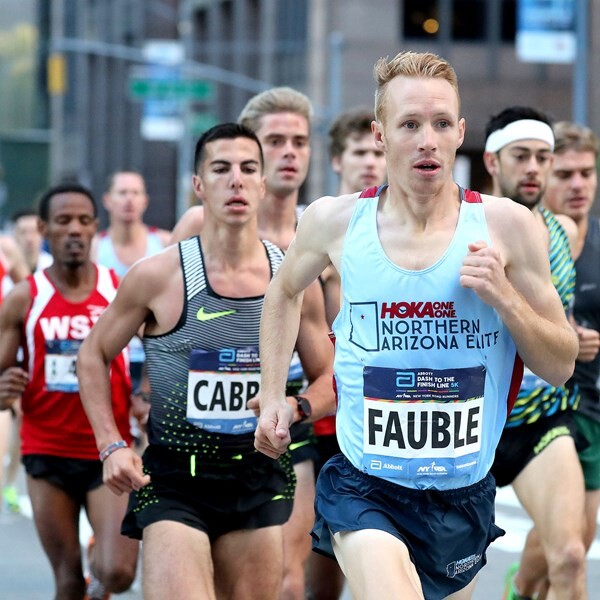
But the Olympic qualifying system for 2024 is far more complicated than in previous years, with ever-shifting world rankings and things like “quota reallocation places” creating confusion among fans and athletes alike. Any athlete ranked in the top 65 of the filtered “Road to Paris” list on January 30, 2024, is considered qualified…except the “Road to Paris” list does not currently exist. After Boston, Fauble, who is currently ranked 122nd* — that’s in the world rankings, which is a different list than “Road to Paris” — tried to take a closer look at where he stood, creating spreadsheets and projecting where he might rank after accounting for time qualifiers, the three-athlete-per-country limit, and potential changes after the 2023 fall marathon season. After a while, his brain began to hurt.
“I felt like the Pepe Silvia meme from It’s Always Sunny in Philadelphia,” Fauble said. “…It was like, this is complicated and stressful and I can just get the standard. This doesn’t need to be an issue.”
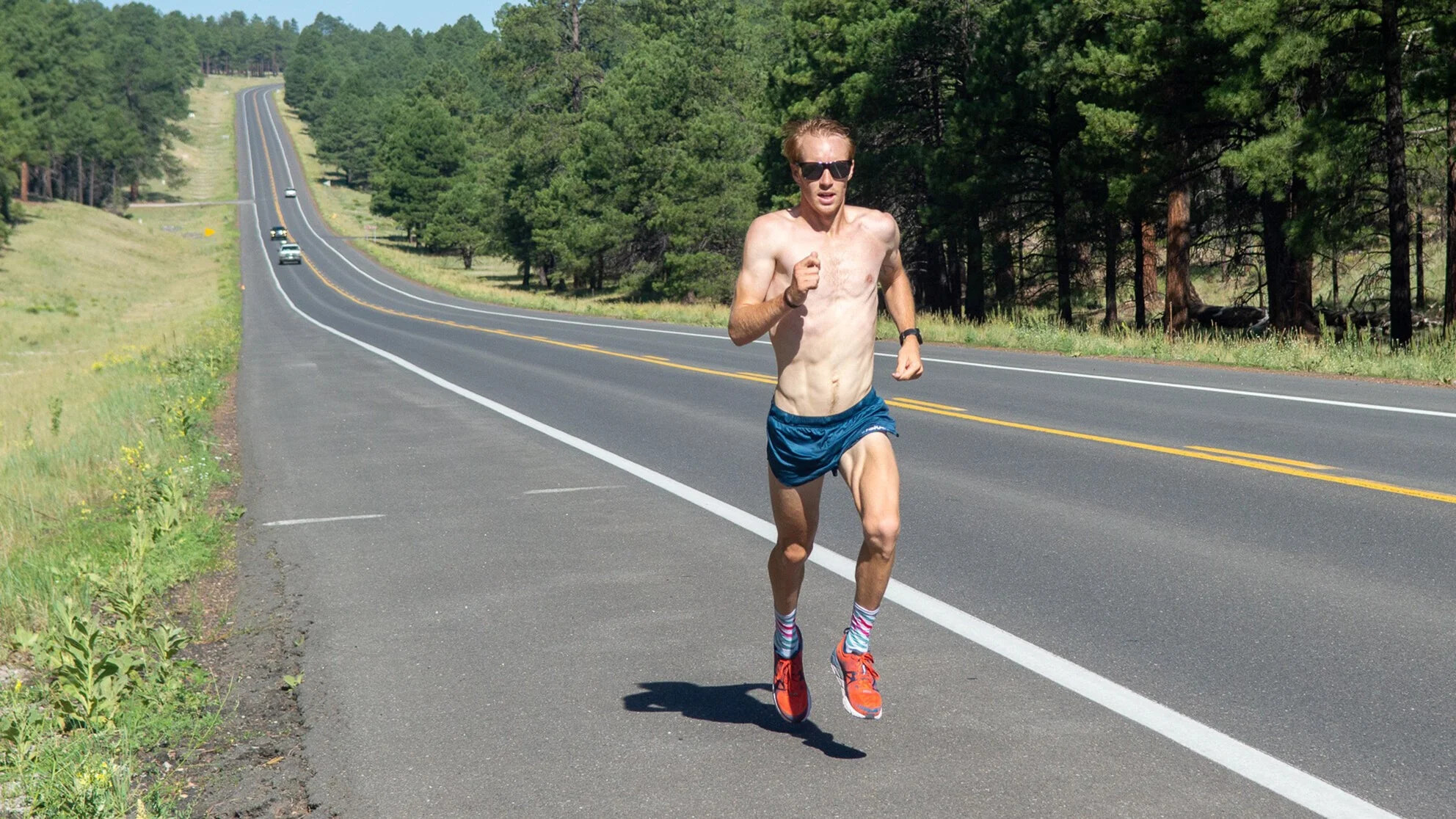
That is why Fauble, begrudgingly, made the decision to run the Berlin Marathon. He was not initially looking forward to the race, but with a strong training block in Boulder behind him and the race just four days away, he has changed his tune.
“I’m very excited,” Fauble said. “I wasn’t planning on doing a fall marathon after Boston and I had to figure out ways to get excited for it and I think that’s one of the things that has fired me up, actually seeing how fast I can go and pushing for a PR as opposed to letting the race play out and seeing what I can do.”
Chasing a time is a dramatically different approach to Fauble’s typical marathon M.O. Of the nine marathons he has run, only two have featured pacemakers: his debut in Frankfurt in 2017, and the Marathon Project in 2020. When Fauble runs Boston and New York, the hilly courses where he has found the greatest success, he does not enter with a goal time in mind. Instead, Fauble will wait until the race begins and assess a number of factors — the weather, how he’s feeling, how fast the other runners are going — before deciding which pace to run. Typically, that has led to Fauble letting the leaders go early and picking off stragglers as they fade over the second half of the race.
Berlin will be different. There are no hills to account for, and while Fauble will still fight for every place, he is not hiding the fact that the primary goal of this race is to hit a time. Specifically, the Olympic standard of 2:08:10. Only five Americans have ever bettered that time in history, but Fauble, who ran his personal best of 2:08:52 in Boston in 2022, believes he is capable of doing it.
“I don’t think that me running in the 2:07s is a huge stretch of the imagination,” said Fauble, who has removed some of the hillier routes from his training under coach Joe Bosshard but has otherwise prepared similarly for Berlin as he would Boston or New York. “I think I’ve been in that kind of shape a bunch of times.”
Every American marathoner will be rooting for Fauble
Currently, no male American marathoner has earned the 2024 Olympic standard — either by hitting the time standard of 2:08:10 or by finishing in the top five of a Platinum Label Marathon (which includes Berlin). It’s pvery likely someone such as Fauble or Conner Mantz will be ranked in the top 65 of the “Road to Paris” list at the end of January, but with the Olympic Trials less than five months away, US marathoners are getting antsy.
American pros rarely run the Berlin Marathon, typically opting for Chicago or New York in the fall — both of which pay much bigger appearance fees to American runners. But this fall, many are bypassing New York because of the date (just 13 weeks before the Trials) and the course (too slow for a shot at the Olympic standard). A sizeable crew, led by Mantz and Galen Rupp, will be in Chicago, while a far larger number than usual have opted for Berlin.
Berlin’s course is just as fast as Chicago’s, if not faster. It’s also two weeks before Chicago — an extra two weeks to prepare for the Trials — and the weather is typically a little better in Berlin than Chicago. That’s why Keira D’Amato opted for Berlin over Chicago for her American record attempt last year. It’s also why 60:02 half marathoner Teshome Mekonen — another American targeting the Olympic standard this fall — chose Berlin over Chicago.
In addition to Fauble and Mekonen, the 2023 Berlin field also includes 2016 Olympian Jared Ward, 2021 Olympian Jake Riley, and Tyler Pennel, who has finished 5th and 11th at the last two Olympic Marathon Trials. All of them will be looking to run fast. And every other American marathoner will be hoping they do the same.
That’s because of a new provision in the Olympic qualification system which states that any country with three qualified athletes may choose to send any three athletes it wants to Paris — as long as they have run at least 2:11:30 (men) or 2:29:30 (women) within the qualifying window. That’s why every American will be rooting for Fauble and others to run fast this fall: if the US has three athletes with the standard, then anyone who has run under 2:11:30 has the opportunity to make the team by finishing in the top three at the Trials.
The above provision, which World Athletics is referring to as “quota reallocation” means that someone such as Fauble could run the Olympic standard and open up a spot in Paris for an American athlete who ends up beating him at the Trials — thus taking a spot that would not otherwise be available had Fauble not run the standard. Fauble, obviously, is hoping such a scenario does not come to pass. But he is aware of the possibility and has accepted it as part of his reality.
“I don’t mind it,” Fauble said. “Sports have never really been about identifying the best team or the best athlete. They’re an entertainment product and they overemphasize very specific days on the calendar. Even if I was the only one with the standard and I get beat at the Trials, the 73-9 Warriors didn’t win the NBA title that year. You’ve gotta do it on the big days. That’s what being a professional athlete is about.”
by Jonathan Gault
Login to leave a comment
BMW Berlin Marathon
The story of the BERLIN-MARATHON is a story of the development of road running. When the first BERLIN-MARATHON was started on 13th October 1974 on a minor road next to the stadium of the organisers‘ club SC Charlottenburg Berlin 286 athletes had entered. The first winners were runners from Berlin: Günter Hallas (2:44:53), who still runs the BERLIN-MARATHON today, and...
more...Eliud Kipchoge lands in Germany in style ahead of the Berlin Marathon
The Berlin course remains one of his favorite since he has set two world records there.
Four-time Berlin Marathon champion Eliud Kipchoge has landed in Germany in style for the Berlin Marathon on Sunday, September 24.
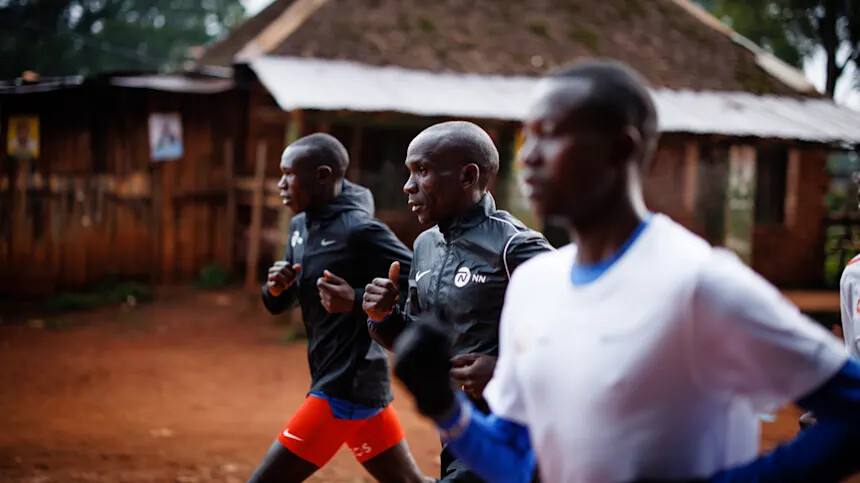
Kipchoge has been preparing for the marathon since his unsatisfactory exit from the Boston Marathon.
The four-time London Marathon champion finished sixth at the Boston Marathon due to a problem with his left leg but has since addressed that and will be raring to go in the streets of Berlin.
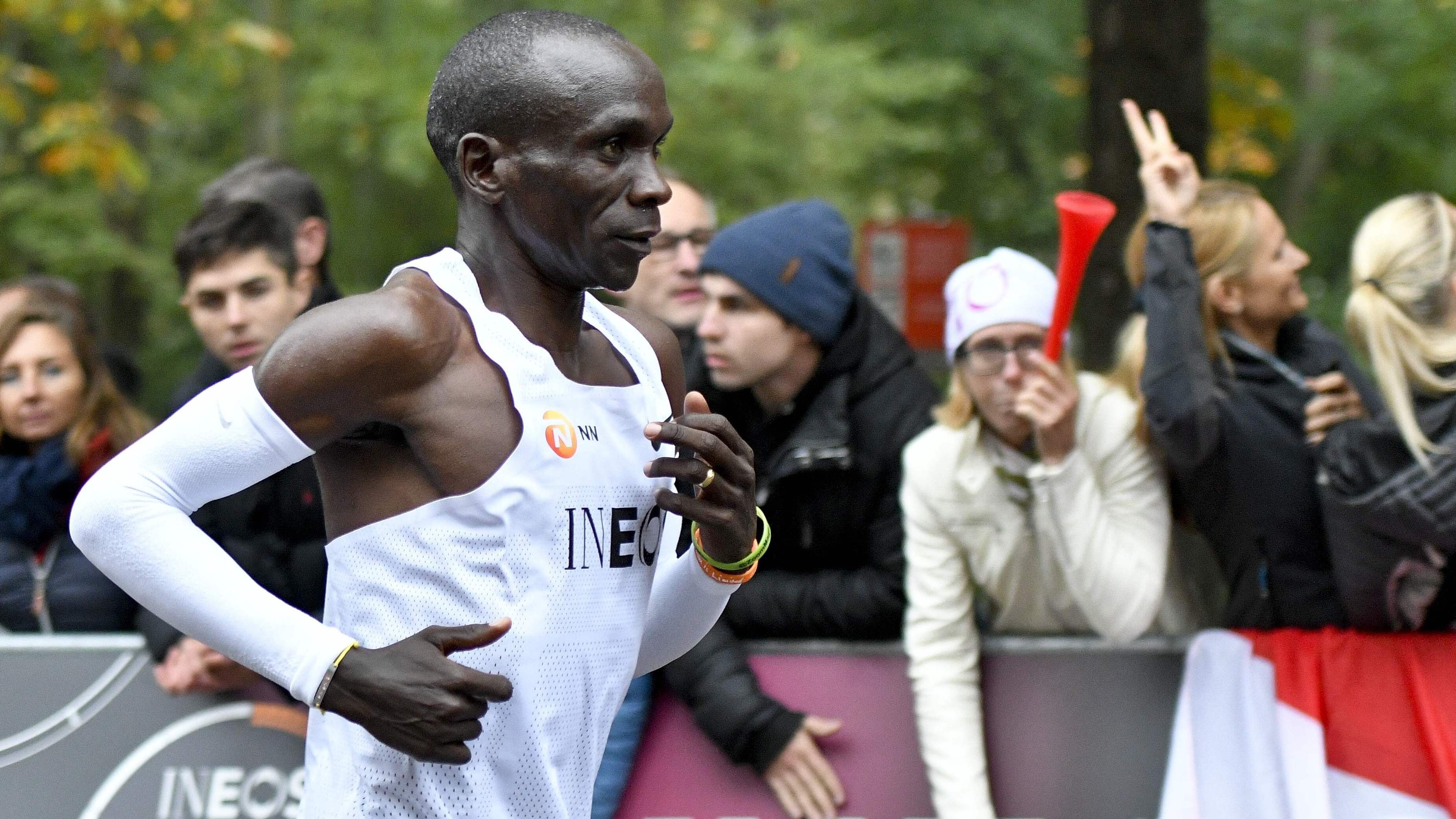
The Berlin course remains one of his favorite since he has set two world records there. He set the first world record during the 2018 edition where he clocked 2:01:39 to win the race.
He then lowered his time during the 2022 edition, clocking 2:01:09 to cross the finish line. Another record might be in the offing as he seeks to bounce back from the Boston Marathon disappointment.
The 38-year-old also disclosed that he loves racing in the streets of Berlin because of the real fans who motivate him to always do better.
In Berlin, he will enjoy the company of the 2022 London Marathon champion Amos Kipruto who finished second behind him during the 2022 Tokyo Marathon.
Jonathan Maiyo, Eliud Kiptanui, Ronald Korir, and Philemon Kiplimo have also confirmed participation. Enock Onchari, Mark Korir, and Josphat Boit will also be in action.
Login to leave a comment
BMW Berlin Marathon
The story of the BERLIN-MARATHON is a story of the development of road running. When the first BERLIN-MARATHON was started on 13th October 1974 on a minor road next to the stadium of the organisers‘ club SC Charlottenburg Berlin 286 athletes had entered. The first winners were runners from Berlin: Günter Hallas (2:44:53), who still runs the BERLIN-MARATHON today, and...
more...Malindi Elmore to run Berlin Marathon
Malindi Elmore will toe the start line at this year’s Berlin Marathon–the same course where Natasha Wodak broke Elmore’s Canadian marathon record last year.
Elmore is among a blazingly fast women’s field the Berlin Marathon has confirmed for the Sept. 24 race. Other runners announced so far include Kenya’s Sheila Chepkirui (who finished fourth at this year’s London Marathon) and a strong Ethiopian contingent led by 2022 Berlin champion and course record holder Tigst Assefa, Tigist Abayechew and Workenesh Edesa.
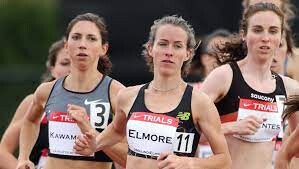
The famously flat and fast Berlin course could lay the groundwork for Elmore to reclaim the mantle as the fastest Canadian female marathoner. Her former Canadian marathon record of 2:24:50, which she set at the Houston Marathon in 2020, was bested by Wodak by more than 90 seconds in the German capital last September (2:23:12). Wodak, who is currently in Budapest for the World Athletics Championships, is not expected to compete in Berlin.
Elmore looks to be in a good position to reclaim the Canadian crown following a string of strong performances. The Kelowna, B.C., native took the women’s title in 2:25:14 at the Canadian Marathon Championship at the TCS Toronto Waterfront Marathon last October. In April, Elmore ran a massive PB at the Gifu Half Marathon in Japan, posting a final time of 1:10:11 and finishing fourth overall.
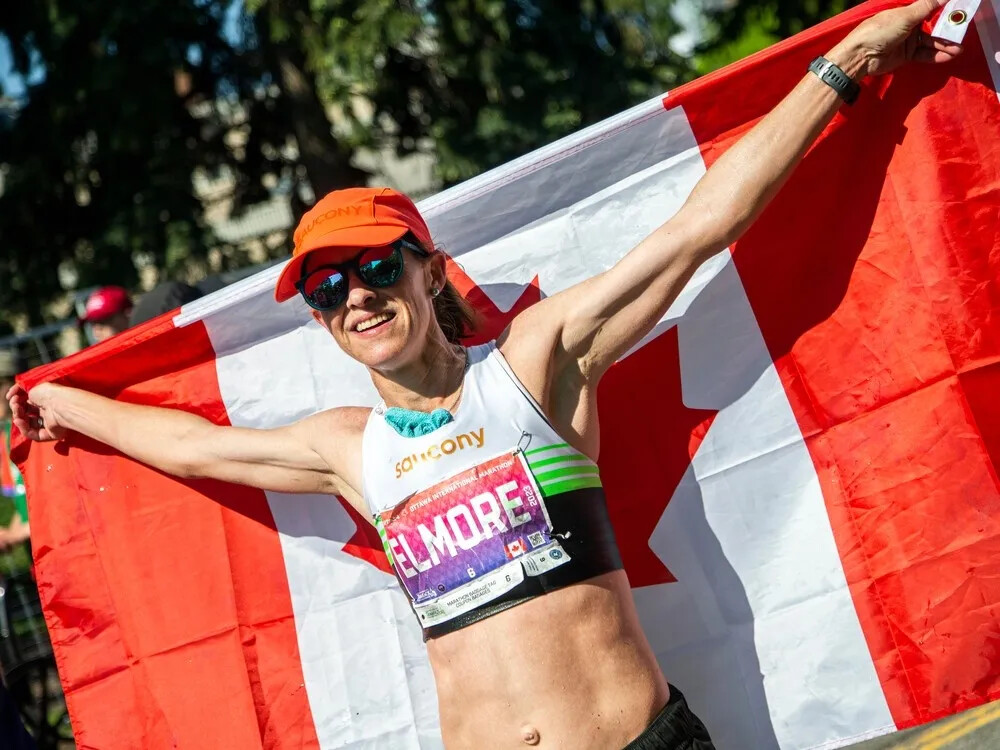
The following month, she threw down a gutsy performance at the 2023 Tartan Ottawa International Marathon. Going into the race with the goal of the 2024 Olympic standard of 2:26:50, she was on pace for 2:26 through 30K and sat in fourth position. As the temperature climbed to 24 C, she gave everything she had over the final 12 kilometres, moving up two spots to finish second to Ethiopia’s Waganesh Mekasha in 2:27:45.
Elmore has also been making bold statements at shorter distances. Last September she bested her own course record in the tenth Under Armour Eastside 10K in Vancouver, running a blistering 32:37.
by Running Magazine
Login to leave a comment
BMW Berlin Marathon
The story of the BERLIN-MARATHON is a story of the development of road running. When the first BERLIN-MARATHON was started on 13th October 1974 on a minor road next to the stadium of the organisers‘ club SC Charlottenburg Berlin 286 athletes had entered. The first winners were runners from Berlin: Günter Hallas (2:44:53), who still runs the BERLIN-MARATHON today, and...
more...National top athletes will also participate in the BMW BERLIN-MARATHON 2023
This year's BMW BERLIN-MARATHON will take place on September 24 - the sports event is one of the most prestigious marathons in the world. SCC EVENTS, the organizer of the event, is expecting more than 45,000 runners from about 150 nations. In addition to the huge field of amateur athletes, the top international as well as national athletes will be competing.
As already announced in the press release sent out by SCC EVENTS on July 13, 2023, the world record holder Eliud Kipchoge (KEN) and the winner of the TCS London Marathon 2022, Amos Kipruto (KEN), will be at the start in the German capital. With Tigst Assefa (ETH) as course record holder and winner of the BMW BERLIN-MARATHON 2022 and Sheila Chepkirui, winner of the GENERALI BERLIN HALF MARATHON 2022, the women's field is just as elite.
The German record holder will be competing
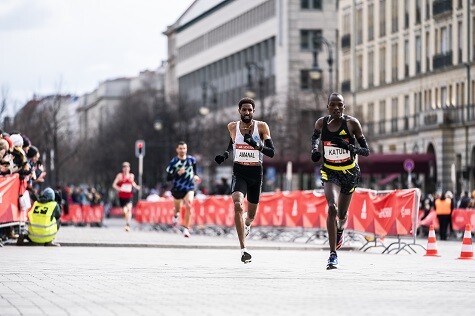
From the ranks of the German starters, Amanal Petros should be the first to be mentioned. The winner of this year's Hannover Marathon holds the German records for both the marathon and half-marathon distances. The MARATHON TEAM BERLIN runner is certainly hoping to achieve a German best time at his race on September 24. At the 2022 European Athletics Championships, Petros won the silver medal in the marathon team classification.
Top German men in Berlin
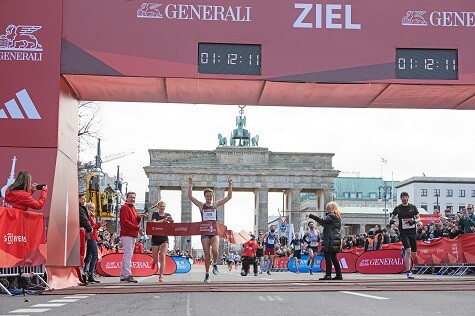
Amanal Petros stood beside teammates Simon Boch, Konstantin Wedel as well as Hendrik Pfeiffer on the podium in the aforementioned European Championship silver-medal team. All four will be competing at the BMW BERLIN-MARATHON. Simon Boch (LG Telis Finanz Regensburg) was German runner-up in the half marathon in the spring and secured the German team title for his team with this performance. Hendrik Pfeiffer, who competes for TK Hannover, won the Hannover Marathon last year. And just like his competition, the 30-year-old is hoping to use the race in Berlin to qualify for the Olympic Games in Paris.
European marathon champions at the start
The German women's marathon team was even more successful than the men at the 2022 European Athletics Championships. With the line-up of Miriam Dattke, Domenika Mayer (both LG Telis Finanz Regensburg), Deborah and Rabea Schöneborn (both MARATHON TEAM BERLIN) and Kristina Hendel (LG Braunschweig), they won the gold medal. The mentioned European champions will run at the BMW BERLIN-MARATHON. For the women, too, the race in Berlin is considered to be an important milestone to make it to the 2024 Olympic Games.
Partnerships with great added value
For the BMW BERLIN-MARATHON 2023, SCC EVENTS announced NORQAIN as its new timing partner. NORQAIN is familiar as a high-quality, family-owned watch manufacturer. The company is based in Nidau, the heart of the Swiss chronograph industry. Christian Jost, Managing Director of SCC EVENTS, is delighted about the commitment of the traditional Swiss watch manufacturer: "Reliability is one of our core values in the mission statement of SCC EVENTS. With NORQAIN, the BMW BERLIN-MARATHON gains a partner whose recipe for success is based on reliability and quality. This partnership has a great added value for us as organiser and for all the participants, who always expect a spirit of innovation and a reliably high standard from the BMW BERLIN-MARATHON."
"As a brand deeply rooted in the world of adventure and exploration, we are thrilled to embark on this multi-year partnership with the BMW BERLIN-MARATHON", said Ben Küffer, Founder & CEO of NORQAIN. "We are honoured to be the Official Timekeeper of the BMW BERLIN-MARATHON, an iconic event that embodies the values of perseverance, determination, and the pursuit of excellence, which are at the core of NORQAIN's DNA.”
The cashless online payment system PayPal has also been one of the partners of the BMW BERLIN-MARATHON for some time. "Anyone competing at the BMW BERLIN-MARATHON is expecting a high-quality sports experience. A fast, simple and secure payment system makes it easier for runners be able to focus on the essential aspects of the event," says Christian Jost.
"We are very happy about the renewed cooperation with SCC EVENTS. Whether at registration, beverage stands or after the race: For easy and convenient payments during the event, runners can pay with the PayPal app using a QR code Athletes can leave cash or cards at home," explains Jörg Kablitz, Managing Director of PayPal Germany, Austria and Switzerland.
Options to secure race entries possibilities and media accreditation
Although registration to participate in the race entry lottery for the 49th BMW BERLIN-MARATHON is now closed, there are still opportunities to secure a race entry for the BMW BERLIN-MARATHON 2023: through our charity partners and our official travel agents. Registration is still open for inline skaters. To apply for accreditation for the BMW BERLIN-MARATHON 2023, you must send a request via the press portal on our website, which is now possible.
Login to leave a comment
BMW Berlin Marathon
The story of the BERLIN-MARATHON is a story of the development of road running. When the first BERLIN-MARATHON was started on 13th October 1974 on a minor road next to the stadium of the organisers‘ club SC Charlottenburg Berlin 286 athletes had entered. The first winners were runners from Berlin: Günter Hallas (2:44:53), who still runs the BERLIN-MARATHON today, and...
more...Eliud Kipchoge says he’s not worried about Kelvin Kiptum in potential Berlin Marathon clash
Less than a week ago, marathon world record holder Eliud Kipchoge announced he will return to the Berlin Marathon on Sept. 24 for a bid at his fifth Berlin title on the famously flat and fast course. Many fans expected Kipchoge to choose to run the New York City Marathon in November in preparation for the extremely hilly course at the 2024 Paris Olympics. Now, he will potentially clash against the second-fastest man in history, Kelvin Kiptum.
On June 15, he conducted a virtual press conference with the media to explain his decision behind Berlin, hinting at his future plans and chatting about the potential clash between him and the 2023 London Marathon champion, Kiptum. Kipchoge said: “Kiptum has all power to do what he wants. I have done enough. I trust that what I have done in the (sport) world will be respected. In any case, I wish him well. […] If Kiptum runs under 2:00, he will always be the second [to do so]. I’ll be the first one. So I have no worries at all.”
In his two marathon starts, the 23-year-old Kiptum won on both occasions. He ran a 2:01:53 debut to win the 2022 Valencia Marathon and followed it up with a 2:01:25 to break Kipchoge’s course record at the 2023 London Marathon five months later.
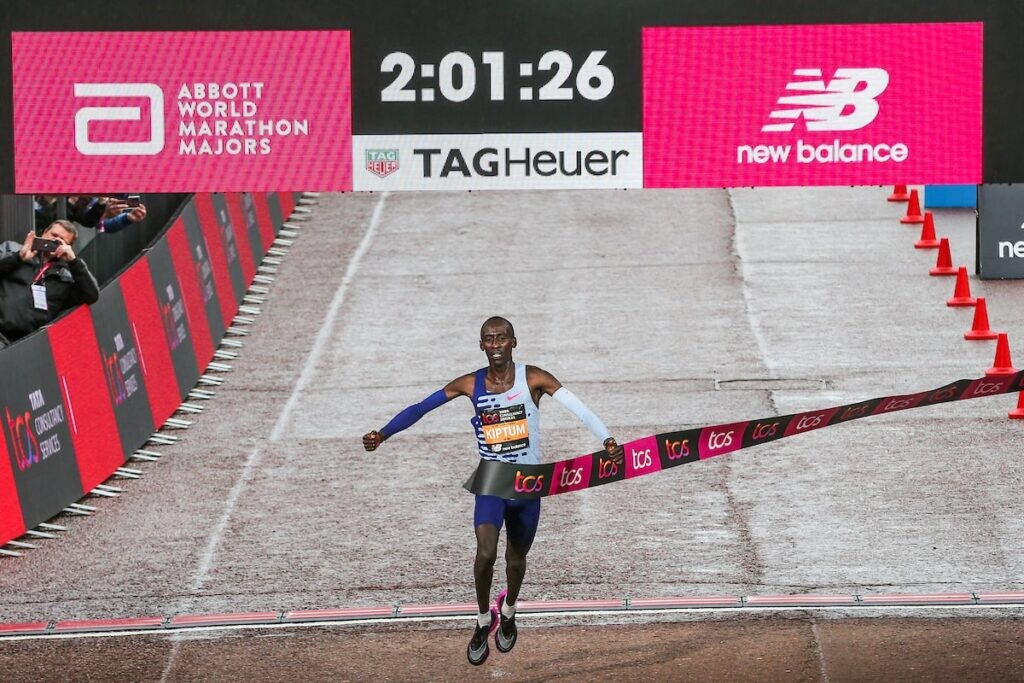
Only three men in history have run under 2:02, and Kiptum is the only marathoner to do it under the age of 35. Although Kiptum has not been announced for the 2023 Berlin Marathon, there has been a lot of speculation about him entering this year’s elite field. After his win at the 2023 London Marathon, he expressed interest in seeing what he could do on the Berlin course, which is known to be fast and flat. Berlin has been the race where the last eight men’s marathon world records were set, dating back to Paul Tergat’s record of 2:04:55 in 2003.
At the 2023 Boston Marathon, Kipchoge had a tough day on the prestigious course, struggling with a leg issue that ultimately brought him his second marathon loss in the last nine years (he finished sixth). “I have no control over what happened in April in Boston,” Kipchoge told reporters. “There’s no point in brooding. I can (only) control things happening now and get ready for Berlin.”
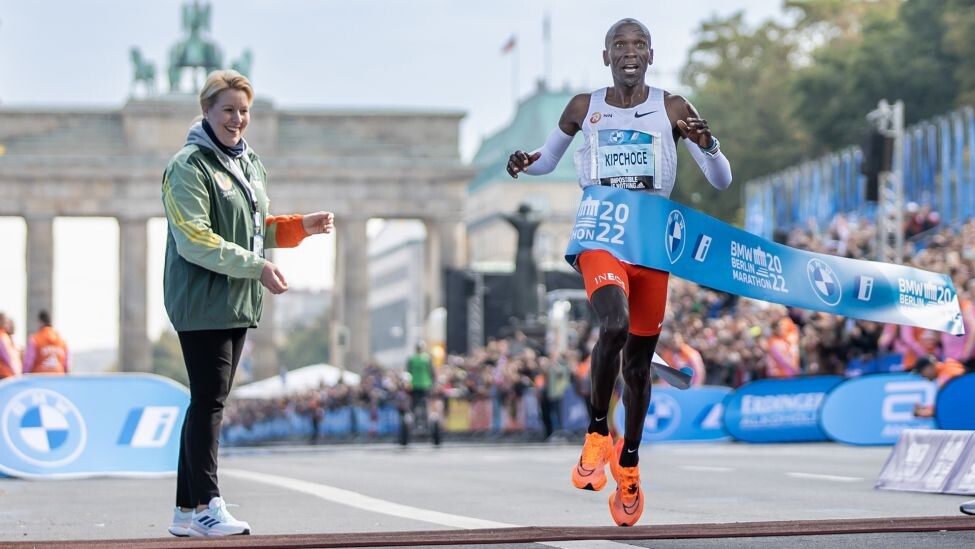
The goals remain the same for the 38-year-old Kenyan, who is looking for his third consecutive Olympic gold in the marathon at the 2024 Paris Olympics. “I want to be the first man to win back-to-back-to-back,” Kipchoge said. “I am really looking for that. That would be real, real history.” Kipchoge believes that Berlin gives him the best opportunity to prepare himself for gold in Paris, giving him nearly 10 months to train in the lead-up to the Games.
Earlier this month, Kiptum also withdrew his name from a nomination to the Kenyan marathon team at the 2023 World Athletics Championships in Budapest, which hints that a fall marathon will indeed be on his calendar.
by Marley Dickinson
Login to leave a comment
BMW Berlin Marathon
The story of the BERLIN-MARATHON is a story of the development of road running. When the first BERLIN-MARATHON was started on 13th October 1974 on a minor road next to the stadium of the organisers‘ club SC Charlottenburg Berlin 286 athletes had entered. The first winners were runners from Berlin: Günter Hallas (2:44:53), who still runs the BERLIN-MARATHON today, and...
more...Back to Berlin, Eliud Kipchoge confirms where his next race will be as he seeks to banish Boston disappointment
The world marathon champion will return to the German capital to defend his title and attempt to become the first man run an official sun 2:01 marathon
World marathon record holder Eliud Kipchoge will return to Berlin for a sixth time as he attempts to defend his title while winning win the race for a fifth time on September 25.
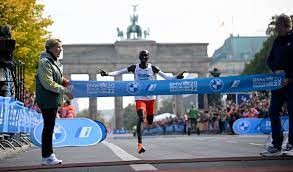
Kipchoge suffered an upset in his first marathon of the year when he finished sixth at the Boston Marathon in April and has chosen a tack that he is too familiar with for his next race in a bid to put the disappointment behind.
Berlin is where the Olympic champion made his major marathon debut in 2013, finishing second behind compatriot Wilson Kipsanga set a world record, but he has been unbeaten in the German capital since.
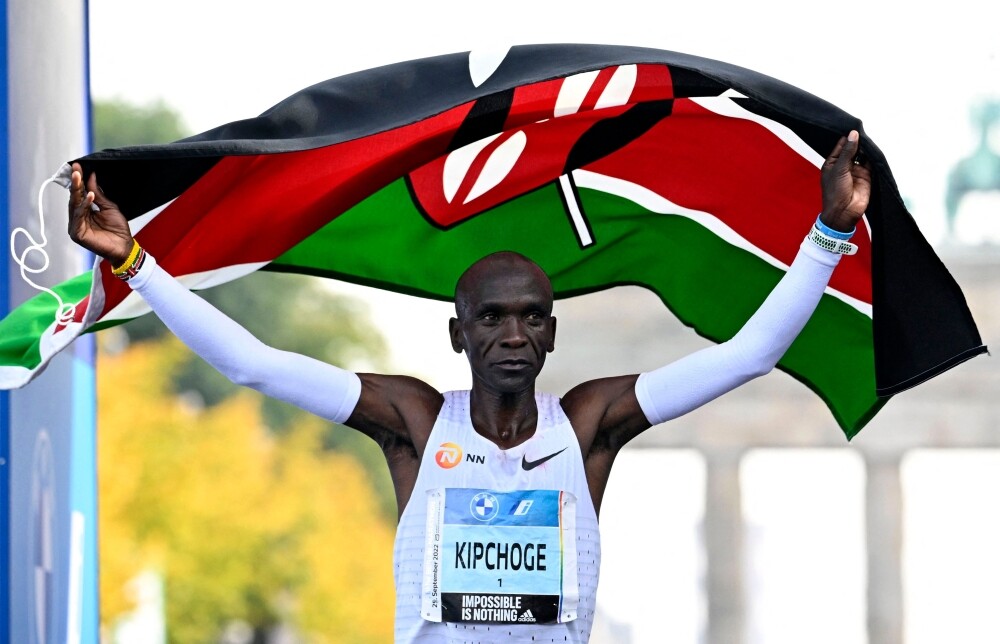
Kipchoge returned to Berlin in 2015 and 2017 and won before setting his first world marathon record the following year after clocking 2:01:39, the first athlete to run a sub-2:02 marathon.
He lowered the time even further last year, when he timed 2:01:09, and he is favourite to defend his title. There is even optimism that Kipchoge could run a sub-2:01 marathon in Berlin given the incredible limits he has pushed himself in recent years added to his well understanding of the course.
“My run has taken me across the world, along the way when you look around, there are ups and down but the path is beautiful. And right now, I run towards Paris 2024 but to achieve what inspires me in Paris, I must return to my special place. Back to Berlin,” Kipchoge said via a clip posted online by his management NN Running on Thursday.
Kipchoge is bidding to become the first marathon runner to claim a hat-trick of Olympics titles and is using the major marathons as part of his preparations for the 2024 Games set to take place in Paris, France.
London Marathon 2022 winner Amos Kipruto is among the elite Kenyan athletes who will give Kipchoge a run for his money in the German capital.
by Joel Omotto
Login to leave a comment
BMW Berlin Marathon
The story of the BERLIN-MARATHON is a story of the development of road running. When the first BERLIN-MARATHON was started on 13th October 1974 on a minor road next to the stadium of the organisers‘ club SC Charlottenburg Berlin 286 athletes had entered. The first winners were runners from Berlin: Günter Hallas (2:44:53), who still runs the BERLIN-MARATHON today, and...
more...Jackline Chelal sets sight on big city marathons
Fresh from winning the Sevilla Marathon on Sunday, Jackline Chelal has set her sights on the big city marathons later in the year.
Chelal clocked 2:20:29 to win the Spainish event and has now targeted to test herself against the marathon runners in the world.
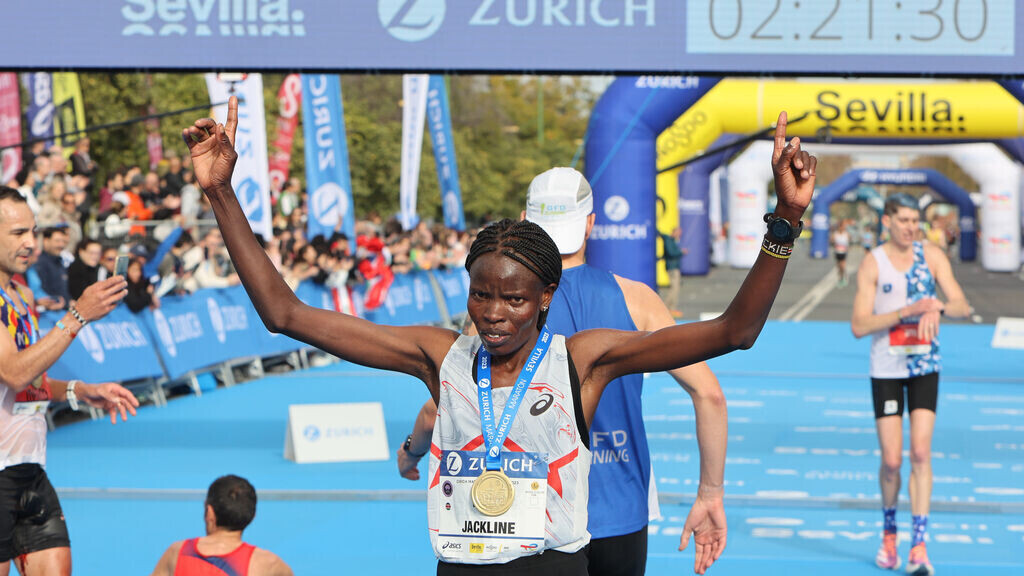
"I want to test myself against the best in the world and I hope I will get invites to marathons like Berlin, Chicago or New York later in the year,” said Chelal.
This being her second marathon after finishing second at the Rock and Roll Madrid Marathon in 2021, Chelal said she is getting better and better.
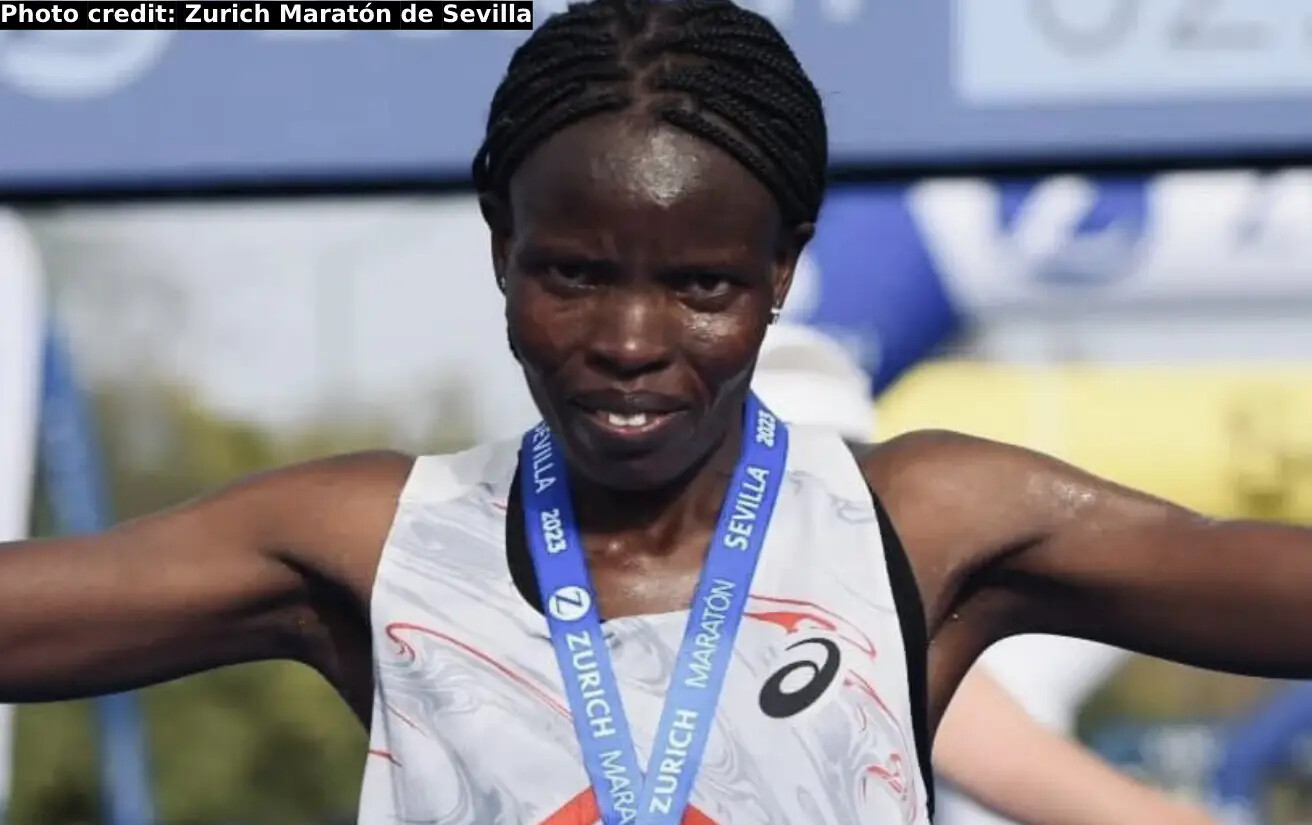
“I'm getting better in an event that takes a lot of endurance but the more I compete, the better I become,” she said.
Chelal termed the course as challenging coupled with windy conditions.
“It was a tough course but I paced myself well. I was able to increase my tempo in the last seven kilometres," added Chelal.
She intends to take a break before resuming training next month.
by William Njuguna
Login to leave a comment
BMW Berlin Marathon
The story of the BERLIN-MARATHON is a story of the development of road running. When the first BERLIN-MARATHON was started on 13th October 1974 on a minor road next to the stadium of the organisers‘ club SC Charlottenburg Berlin 286 athletes had entered. The first winners were runners from Berlin: Günter Hallas (2:44:53), who still runs the BERLIN-MARATHON today, and...
more...Natasha Wodak smashed Canadian marathon record in Berlin
The 40-year-old from North Vancouver, B.C., who grew to love training for the marathon, shattered the Canadian record in that distance in Berlin on Sunday.
Wodak finished 12th at the Berlin Marathon in two hours 23 minutes 12 seconds, lowering Malindi Elmore's record of 2:24.50 set in 2020.
Wodak, who was 13th in the marathon at the 2020 Tokyo Olympics, was a 10,000-metre specialist on the track for the better part of a decade, and said she didn't enjoy her first marathon experience in 2013.
"I was kind of like 'I don't know how much I want to do this,'" Wodak said.
"But as I've gotten older, and become a more disciplined runner, and I'm in a better place in my life, I really enjoy the training. And I've had a lot of fun with every marathon build, and challenging myself. Because it's new, right? The move to the marathon was a lot of fun, doing new training and challenging myself, and I really enjoyed it. And I think that's a huge part of why I've been successful, is because I really liked the training."
Ethiopia's Tigist Assefa won Sunday's race in 2:15.37. Two-time Olympic champion Eliud Kipchoge of Kenya broke his own men's marathon world record to win the men's race in 2:01.09.
Wodak, who is coached by Trent Stellingwerff, said her recent training indicated she could run 2:24.
On Sunday, she ramped up the pace over the 42.195-kilometre course. Her second half was more than a minute faster than her first.
"I knew at 35K, because we had significantly dropped the pace through the last 5K, that we were well under Canadian record pace," Wodak said, moments before sitting down to a celebratory drink with her family.
"I had a pacer, and he just was like, ‘Let's go, let's go.’ And I just kept on him. I was tired over the last 5K, I was working really, really hard. But I knew that was just because we were running fast.
"I didn't think that I could do 24.12 . . . when I saw that time at the finish line, I was like, 'oh, wow, what?'"
Wodak's record comes amid a surge in Canadian women's distance running.
The Canadian record has dropped five minutes in the past nine years, although Wodak noted the huge improvements in shoe technology have seen distance running times plummet across the board in recent years.
Still, Elmore was ninth in the Tokyo Olympics, and the battle between the Canadian women to make that team was fierce.
"It's really exciting to be a part of women's distance running right now," said Wodak. "We just sort of are feeding off of each other. If Malindi hadn't run 2:24.50, I don't know if I would have set my goal to run 2:24 flat.
"So now Malindi is going to go run Toronto (Waterfront Marathon on Oct. 16), and she's gonna be like, 'OK, I want to run sub-2:23.' We just keep lowering the bar and it’s great when we all build each other up. She wished me good luck (Saturday) and said, 'I hope you have an amazing race.' That's a really cool run community to be a part of when we all support each other."
Elmore tweeted on Sunday, "Congrats Natasha! Huge impressive run today!"
Wodak planned to vacation in Germany with her family. She doesn't plan to race for awhile, and is considering competing in the Canadian cross-country championship Nov. 26 in Ottawa.
Login to leave a comment
BMW Berlin Marathon
The story of the BERLIN-MARATHON is a story of the development of road running. When the first BERLIN-MARATHON was started on 13th October 1974 on a minor road next to the stadium of the organisers‘ club SC Charlottenburg Berlin 286 athletes had entered. The first winners were runners from Berlin: Günter Hallas (2:44:53), who still runs the BERLIN-MARATHON today, and...
more...Deena Kastor completed all sixth World Major Marathons
On Sunday, former American women’s marathon record holder, Denna Kastor, 49, finished the 2022 Berlin Marathon in 2:45:12 to place 48th overall in the women’s field. Kastor earned her sixth star with her results in Berlin, for having finished all six World Major Marathons. She is only the fourth woman to achieve all six world majors, in addition to the Olympic and World Athletics Championships marathons.
Kastor had hopes of hitting the U.S. Olympic Trials standard of 2:37:00in Berlin, but came up short. She finished second in the women’s 45-49 age group.
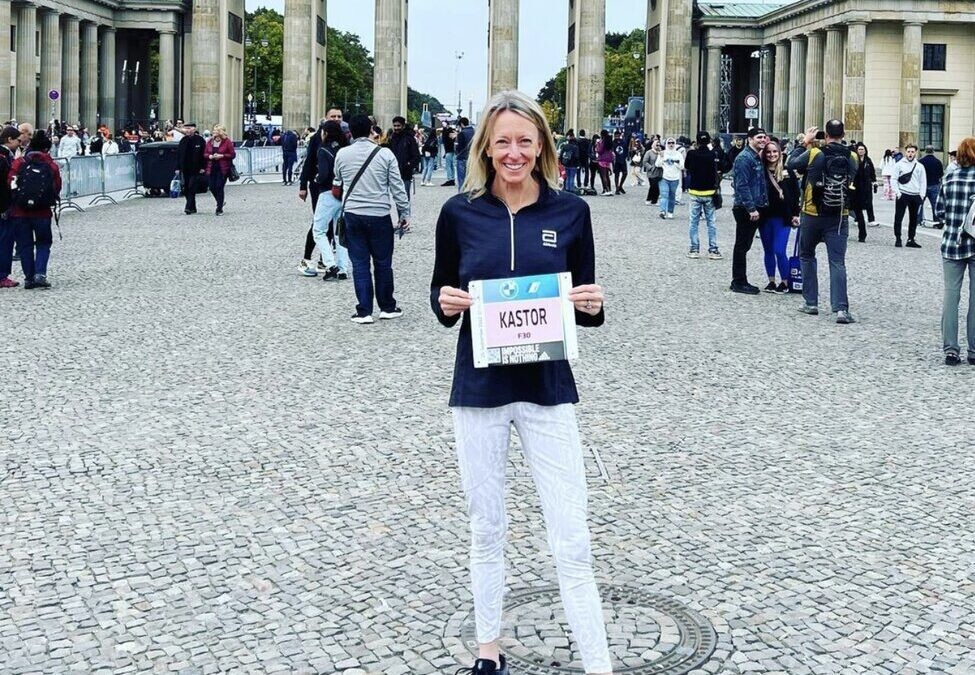
Kastor has raced the other five majors (Boston, London, Tokyo, Chicago and New York City), and although she was set to race Berlin in 2019, an ankle injury dashed those plans. Kastor is one of the top marathoners in American history, and up until this year, she held the national record at 2:19:36, set at the 2006 London Marathon, which she won. (She won the Chicago Marathon in 2005.)
Keira D’Amato broke Kastor’s record at the Houston Marathon in January 2022, when she ran 2:19:12; some predicted she would run even faster in Berlin on Sunday, but a mere nine weeks after her eighth-place finish at the World Athletics Championships, she was two minutes off the record in Berlin, with a sixth-place finish in 2:21:28.
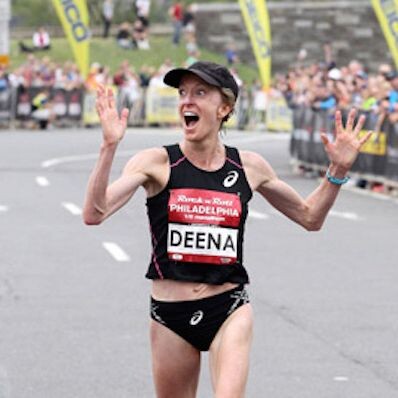
Kastor also held the American half-marathon record of 1:07:34 until 2018, when Molly Huddle ran 1:07:25. She also won a bronze medal in the marathon at the 2004 Athens Olympics. She ran the Tokyo Marathon in 2019.
Kastor’s goal of completing all six World Majors is a goal held by many marathoners (both amateur and pro) around the world, including the great Eliud Kipchoge, who bested his world record time in the Berlin marathon with a time of 2:01:09.
by Keeley Milne
Login to leave a comment
BMW Berlin Marathon
The story of the BERLIN-MARATHON is a story of the development of road running. When the first BERLIN-MARATHON was started on 13th October 1974 on a minor road next to the stadium of the organisers‘ club SC Charlottenburg Berlin 286 athletes had entered. The first winners were runners from Berlin: Günter Hallas (2:44:53), who still runs the BERLIN-MARATHON today, and...
more...Eliud Kipchoge sets new world marathon record in Berlin clocking 2:01:09
Eliud Kipchoge sliced half a minute from his own world record to win the BMW Berlin Marathon, clocking a sensational 2:01:09 at the World Athletics Elite Platinum Label road race on Sunday (25).
There was also a stunning breakthrough for Ethiopia’s Tigist Assefa in the women’s race as she smashed the course record by more than two minutes with 2:15:37, becoming the third-fastest woman in history.
Just when it seemed Kipchoge had achieved everything he possibly could over the classic distance, the legendary pushed the world record further out of reach for the rest of the distance-running world.
Unlike his last world record run, the double Olympic champion went out hard on this occasion, passing through 5km in 14:14 and 10km in 28:22 – not just comfortably inside world record pace, but also well inside a projected two-hour finish.
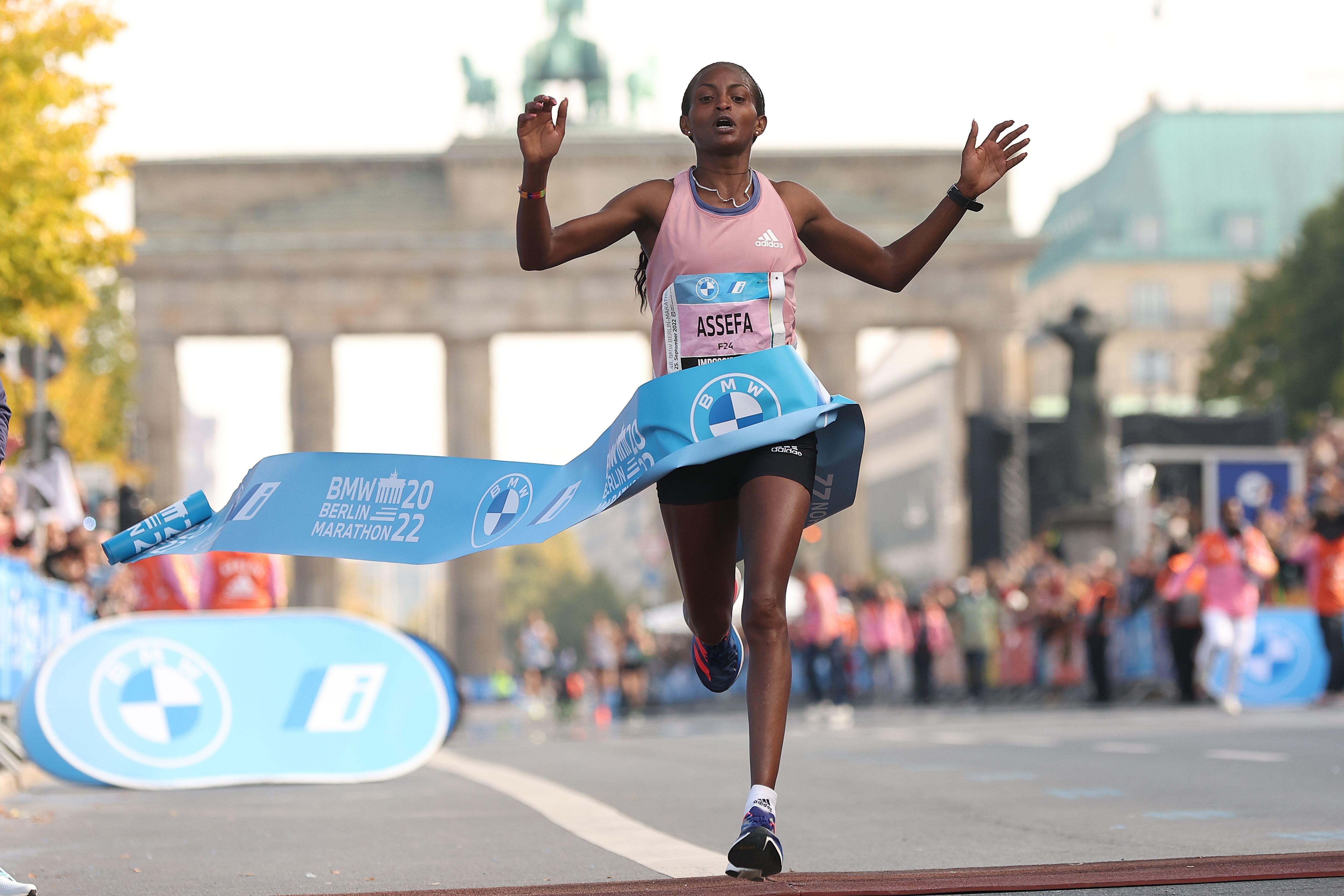
Kipchoge maintained that pace through half way, which was reached in 59:50, but his pace started to drop slightly from then on, and by 25km (1:11:08) his projected finish had slipped to just outside two hours – still more than a minute inside world record pace, though.
Ethiopia’s Andamlak Belihu was just about staying level with Kipchoge up until this point, but the Kenyan superstar then gradually pulled clear and was out on his own.
He passed through 30km in 1:25:40, then reached 35km in 1:40:10. By the time he passed through 40km in 1:54:53, his lead had grown to move than four minutes with Mark Korir having moved into second place.
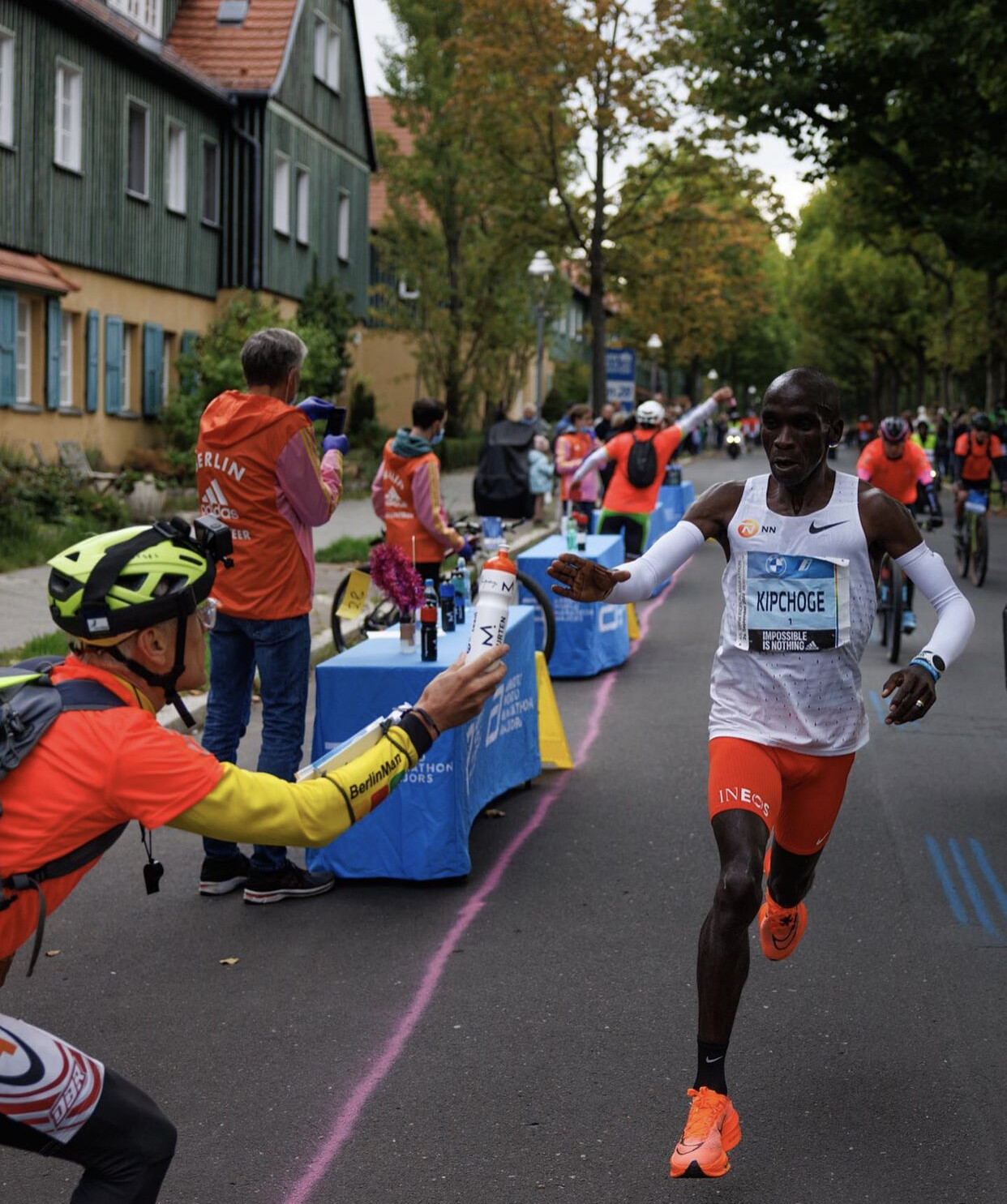
His victory – and world record – nor a formality, Kipchoge went on to cross the line in 2:01:09, taking 30 seconds off the world record he set in the German capital four years ago. Korir held on to second place in 2:05:58 and Ethiopia’s Tadu Abate came through to finish third in 2:06:28.
"I am overjoyed to have broken the world record in Berlin," said Kipchoge. "I wanted to run the first half so fast. No limitations.
"After 38km I knew I would be capable of breaking the world record. The circumstances were great, and so was the organisation of the event. I’m really happy with today and impressed by the fans and their support."
By contrast, several runners were in contention for most of the women’s race. A group of six women passed through half way in 1:08 - well inside course record pace – but by 30km, reached in 1:36:41, just three women remained at the front: Assefa, along with Ethiopian compatriots Tigist Abayechew and Meseret Gola.
Despite running significantly quicker than she ever had done before, Assefa – a former 800m specialist – maintained her relentless pace and opened up a gap of about 20 seconds by 35km.
She continued to pull away from the rest of the field and crossed the line in an Ethiopian record of 2:15:37 – a time that has only ever been beaten by world record-holders Brigid Kosgei (2:14:04) and Paula Radcliffe (2:15:25).
Kenya’s marathon debutante Rosemary Wanjiru came through to take second place in 2:18:00, finishing just three seconds ahead of Abayechew.
Leading results
Women
1. Tigist Assefa (ETH) 2:15:37 2. Rosemary Wanjiru (KEN) 2:18:00 3. Tigist Abayechew (ETH) 2:18:03 4. Workenesh Edesa (ETH) 2:18:51 5. Meseret Gola (ETH) 2:20:58 6. Keira D'Amato (USA) 2:21:48 7. Rika Kaseda (JPN) 2:21:55 8. Ayuko Suzuki (JPN) 2:22:02 9. Sayaka Sato (JPN) 2:22:13 10. Vibian Chepkirui (KEN) 2:22:21
Men
1. Eliud Kipchoge (KEN) 2:01:09 2. Mark Korir (KEN) 2:05:58 3. Tady Abate (ETH) 2:06:28 4. Andamlak Belihu (ETH) 2:06:40 5. Abel Kipchumba (KEN) 2:06:49 6. Limenih Getachew (ETH) 2:07:07 7. Kenya Sonota (JPN) 2:07:14 8. Tatsuya Maruyama (JPN) 2:07:50 9. Kento Kikutani (JPN) 2:07:56 10. Zablon Chumba (KEN) 2:08:01
by World Athletics
Login to leave a comment
BMW Berlin Marathon
The story of the BERLIN-MARATHON is a story of the development of road running. When the first BERLIN-MARATHON was started on 13th October 1974 on a minor road next to the stadium of the organisers‘ club SC Charlottenburg Berlin 286 athletes had entered. The first winners were runners from Berlin: Günter Hallas (2:44:53), who still runs the BERLIN-MARATHON today, and...
more...Are records going to be broken at the Berlin Marathon this weekend?
The fall marathon season kicks off this Sunday, Sept. 25, in Germany for the 48th annual Berlin Marathon, which is the first of four Abbott World Marathon Majors over the next six weeks. The biggest name is distance running Eliud Kipchoge returns to the course he set the world record on four years ago, but the question everyone is asking is whether he can run 2:01:39 again?
He also looks to become the second man to win four Berlin Marathon titles, joining the great Haile Gebrselassie, who won four consecutive between 2006 and 2009.
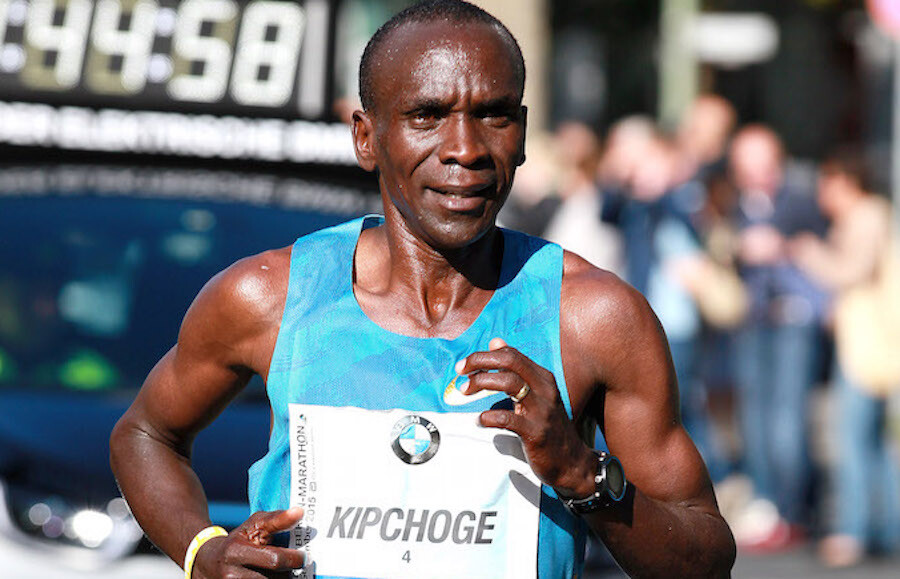
Kipchoge isn’t the only athlete chasing a record in Berlin. U.S. marathon record holder Keira D’Amato has made a quick turnaround from her eighth place finish at World Championships and has her eyes on the American record of 2:19:12, which she ran in Houston earlier this year.
Vancouver’s Natasha Wodak is the lone Canadian in the elite field, and she is looking to take advantage of the fast Berlin course. In 2020, Wodak ran the second fastest marathon time by a Canadian woman, 2:26:19, at The Marathon Project in Arizona. She followed up that performance with an impressive 13th place finish in the marathon at the 2020 Olympics Games.
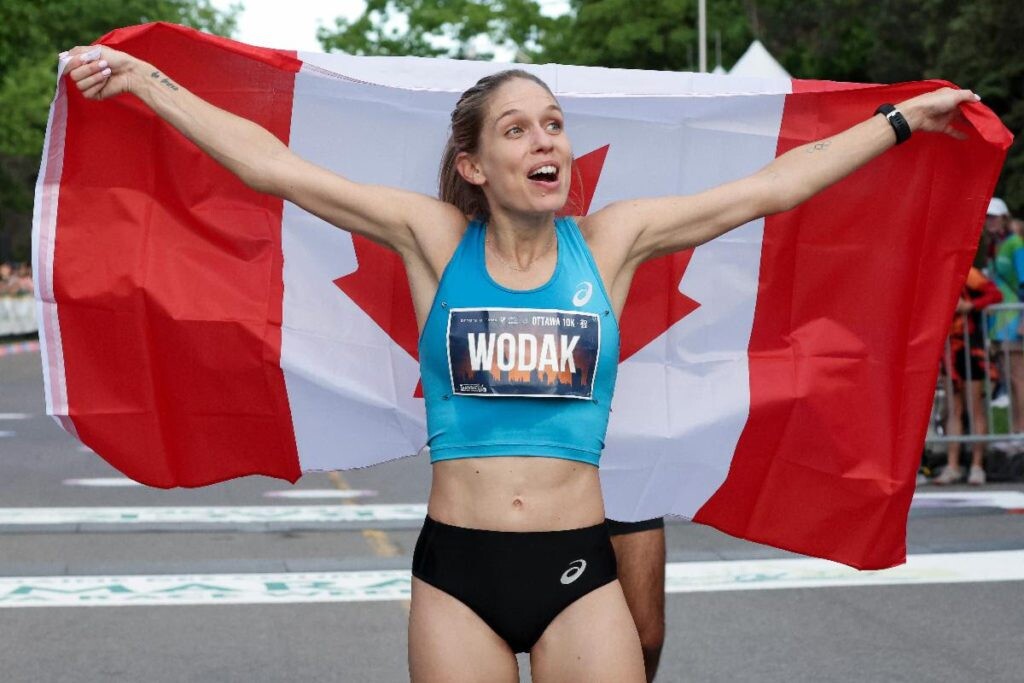
Wodak hopes to shake 90 seconds off her marathon PB Sunday to challenge Malindi Elmore’s Canadian record of 2:24:50 from 2019.
The weather
The race starts at 9:15 a.m. local time on Sunday (which is 3:15 a.m. E.T. in Canada). The temperature looks to be perfect for marathoning — between 10 C and 14 C, with next to no wind.
Men who hope to finish near Kipchoge
It is well-known that Kipchoge is the favorite, but who are the guys most likely to finish second or stick with him until 30K?
Ethiopia’s Guye Adola, who was second to Kipchoge in 2017, won Berlin last fall in 2:05:45. The win marked his first major victory after struggling with injury earlier in his career. Like Kipchoge, Adola is fast and knows what it takes to win on this course. In 2017, he ran the fastest marathon debut in history on this course but since has not run near 2:03.
Adola is the only other sub-2:05 runner, which Kipchoge is bound to finish under. If anyone else wins this race, it would take a miracle, or mean both Kipchoge and Adola have blown up.
Ghirmay Ghebreslassie of Eritrea won the 2015 World Championships in Beijing and the New York Marathon in 2016 after missing the podium at the Rio Olympics. Although Ghebreslassie has the experience, in a sub-2:05 race, he may not have the speed to keep up with Adola and Kipchoge.
Marley’s Pick: Eliud Kipchoge (KEN) – 2:02:29
Can Keira D’Amato become the first American winner?
D’Amato has the fastest time out of the 24 runners in the women’s elite field with a time of 2:19:12, but she has only had nine weeks to prepare for Berlin after her 2:23:34 at the World Championships in Eugene. She was only selected for the U.S. team after Molly Seidel dropped out a few weeks before the championships.
To run 2:23 at worlds off not much training is impressive and should be a confidence booster for D’Amato on a faster Berlin course.
Many of the top Kenyan and Ethiopian runners will be competing later this fall, but there are other sub-2:22 runners in Berlin. Kenya’s Nancy Jelagat Meto (2:19:31 – Valencia) and Vibian Chepkirui, the winner of the Vienna City Marathon in 2:20:59 in April, have the experience and speed to deny D’Amato the title.
Rosemary Wanjiru of Kenya, a 65:34 half marathoner, is making her marathon debut here in Berlin. Although this is her first marathon, she will likely be in contention most of the race.
Marley’s Pick: Rosemary Wanjiru (KEN) – 2:18:39.
by Marley Dickinson
Login to leave a comment
BMW Berlin Marathon
The story of the BERLIN-MARATHON is a story of the development of road running. When the first BERLIN-MARATHON was started on 13th October 1974 on a minor road next to the stadium of the organisers‘ club SC Charlottenburg Berlin 286 athletes had entered. The first winners were runners from Berlin: Günter Hallas (2:44:53), who still runs the BERLIN-MARATHON today, and...
more...Eliud Kipchoge ready for fast times in Berlin
Eliud Kipchoge is ready for a very fast race in the BMW BERLIN-MARATHON on Sunday which may well lead him to break the world record here for the second time.
The double Olympic champion, who set the current world record of 2:01:39 in Berlin four years ago and also broke the two-hour barrier when he ran 1:59:40.2 in a race in Vienna in 2019 which did not conform to regulations, will start as the clear favourite.
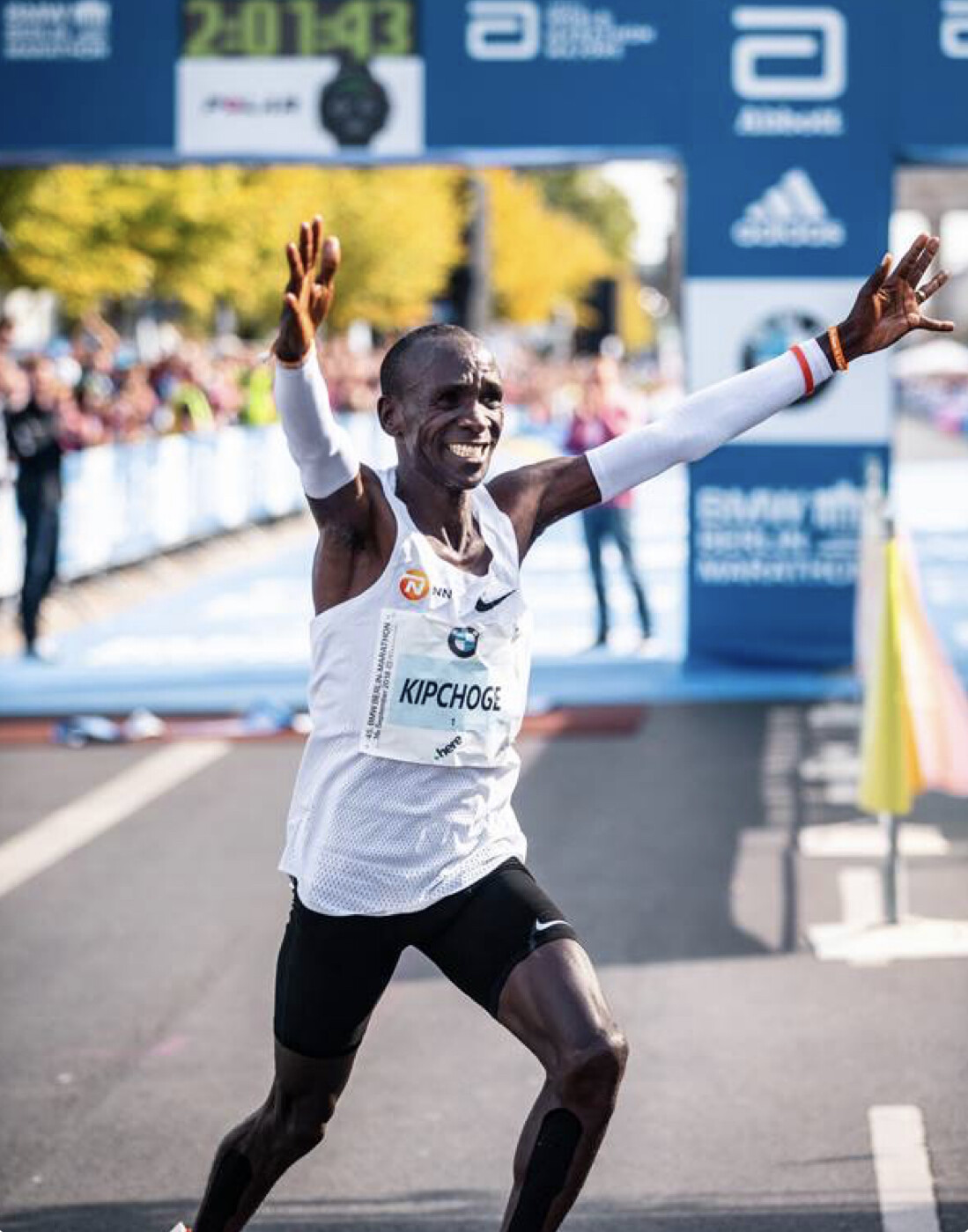
Organisers of the BMW BERLIN-MARATHON have registered 45,527 runners from 157 nations for the 48th edition of the event. Germany’s most spectacular road race is part of the Abbott World Marathon Majors (AWMM) and is also a Platinum Label Road Race of the international athletics federation, World Athletics.
The 37-year-old Kenyan held back from making any hard and fast promises when he spoke two days before the BMW BERLIN-MARATHON. “I’d like to thank the organisers for letting me race again in Berlin after four years and expect a very good race. I’ve trained well as usual – every training day is a challenge.”In response to the question at the press conference, what would be “a very good race” for him, Eliud Kipchoge answered: “A very good race is a good race.”
That got the audience on his side before he added: “I want to inspire people and if a course record comes out of this at the end, I will appreciate it,” added this outstanding athlete. It should be noted that the course record is, of course, the world record, but Eliud Kipchoge was careful not to utter these words.
The world record holder, whose career so far has brought him victory in all but two of his 18 marathons, could well achieve his fourth win in Berlin after taking the title in 2015, 2017 and 2018. That would bring him equal with the Ethiopian legend Haile Gebrselassie as the two men with most wins in Berlin. If the world athlete of the year for 2018 and 2019 is in world record form, Eliud Kipchoge should prove unbeatable on Sunday.
On the other hand, the elite field has plenty of strength in depth. Heading the list of challengers is last year’s champion Guye Adola from Ethiopia, winning the title in unseasonably warm conditions in 2:05:45 and beating the Ethiopian superstar Kenenisa Bekele into the bargain.
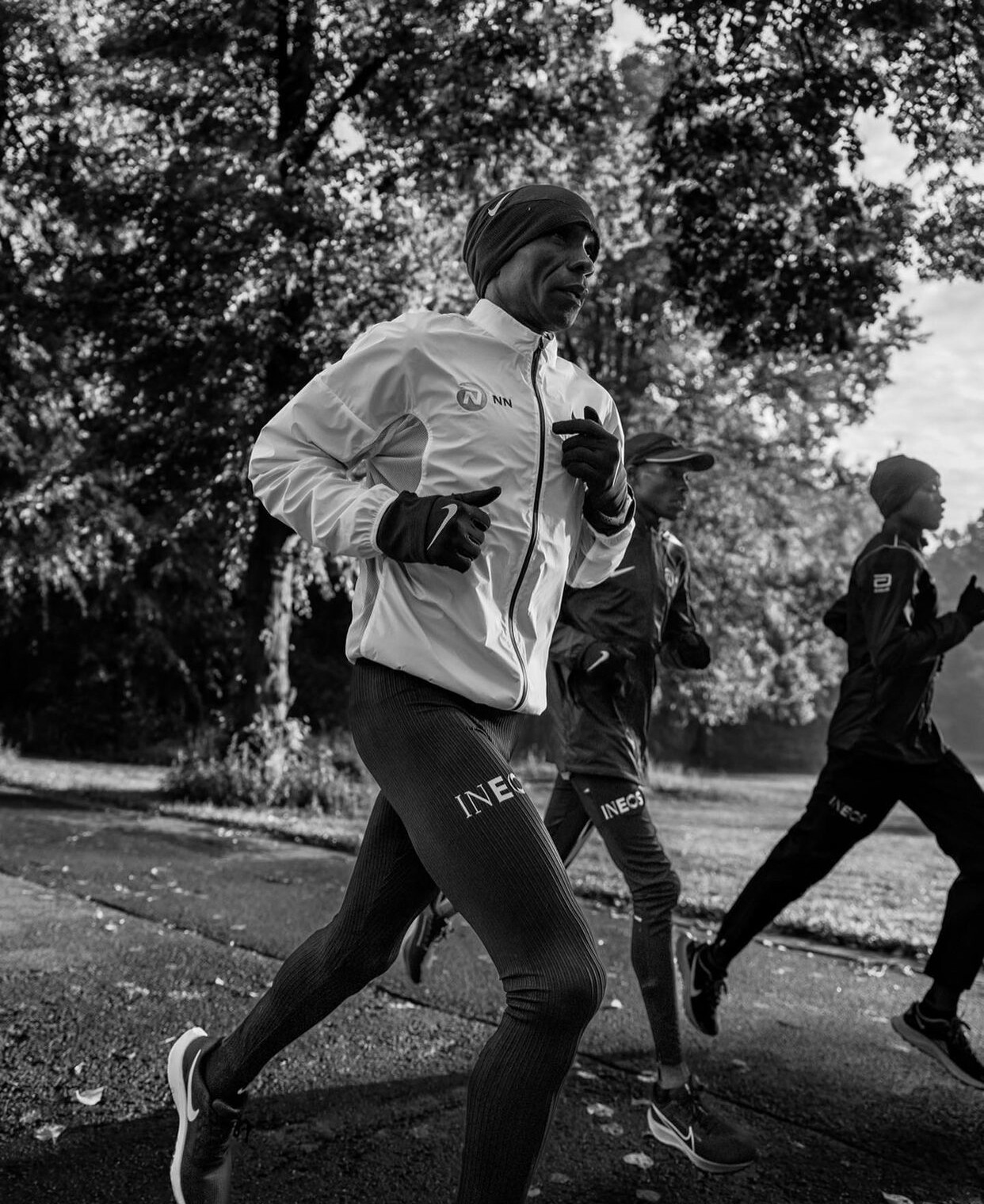
It was in Berlin in 2017 that Guye Adola ran what remains his personal best of 2:03:46 and on his debut at the distance. Only Eliud Kipchoge finished ahead of him though from time to time Adola took the lead. “I have prepared well and look forward to the race,” said the 31-year-old, who described Kipchoge as “a hero.”
The BMW BERLIN-MARATHON has greater strength in depth among the men’s elite field than ever before. As many as 18 runners have personal bests under 2:08. Among them is Ghirmay Ghebreslassie who caused a surprise when winning the world title in 2015 and also won in New York the following year. The Eritrean athlete has a best of 2:05:34 which he set in finishing third in Seville in February.
“It’s a big challenge to run in such a field and against Eliud Kipchoge. I’ll do my best and my aim is a place on the podium,” said Ghirmay Ghebreslassie.
An unusually large number of Japanese runners will be among the elite starters, the reason being that they are trying to qualify for the 2024 Olympics. There will be 13 of them with personal bests of under 2:10 in the BMW BERLIN-MARATHON. The fastest of them is Ryu Takaku with a best of 2:06:45.
The leading German in the field is Johannes Motschmann, who was a member of the German team at the European Championships which won the silver medal in Munich. Despite a short recovery time of six weeks since that competition, the 28-year-old wants to improve his personal best of 2:12:18 in the direction of 2:10.
The race in Berlin is the biggest of my career so far. Since I’m a hometown boy here, I’d even rate it above the European Championship marathon,” said Motschmann, who runs for the Marathon Team Berlin.
The Austrian record holder, Peter Herzog, will also be aiming to take advantage of conditions at the BMW BERLIN-MARATHON and run faster than ever before. His current best is 2:10:06 and his ambition is to become the first Austrian.
While a double world athlete of the Year in Eliud Kipchoge will take centre stage, a former star of world sport will be running some way behind him: the Brazilian football legend Kaká, a member of the team which won the World Cup in 2002, and also a Champions League winner and Footballer of the Year.
“I definitely wanted to run a major marathon and asked friends who recommended Berlin to me. That’s why I’m here. On Sunday I want to run 3:40. The marathon is something very special in that we, as mass runners, run together with the elite. I’m very excited,” admitted Kaká at the press conference.
Elite runners with personal bests
Eliud Kipchoge KEN 2:01:39
Guye Adola ETH 2:03:46
Ghirmay Ghebreslassie ERI 2:05:34
Dejene Debela ETH 2:05:46
Mark Korir KEN 2:05:49
Ashenafi Moges ETH 2:06:12
Tadu Abate ETH 2:06:13
Bethwel Yegon KEN 2:06:14
Awet HabteERI2:06:25
Ryu TakakuJPN2:06:45
Limenih Getachew ETH2:06:47
Hiroto InoueJPN2:06:47
Zablon Chumba KEN 2:07:18
Kenya Sonota JPN 2:07:23
Kento Kikutani JPN 2:07:26
Kazuki Muramoto JPN 2:07:36
Tadashi Isshiki JPN2:07:39
Atsumi Ashiwa JPN 2:07:54
Daisuke DoiJPN2:08:13
Rintaro TakedaJPN2:08:48
Yuki Matsumura JPN 2:09:01
Peter Herzog AUT 2:10:06
Johannes Motschmann GER 2:12:18
Third photo: Kipchoge's first run in Berlin
Login to leave a comment
BMW Berlin Marathon
The story of the BERLIN-MARATHON is a story of the development of road running. When the first BERLIN-MARATHON was started on 13th October 1974 on a minor road next to the stadium of the organisers‘ club SC Charlottenburg Berlin 286 athletes had entered. The first winners were runners from Berlin: Günter Hallas (2:44:53), who still runs the BERLIN-MARATHON today, and...
more...Two-time Vienna champion Vibian Chepkurui now targets Berlin glory
Two-time Vienna Marathon champion Vibian Chepkurui has set her sights firmly on successfully graduating to the World Marathon Majors and claiming the Berlin title this Sunday.
Chepkurui, who trains in Iten, Elgeyo Marakwet County, has been preparing for the Berlin Marathon for the last three months and is confident of a good outing on the streets of Germany’s political capital.
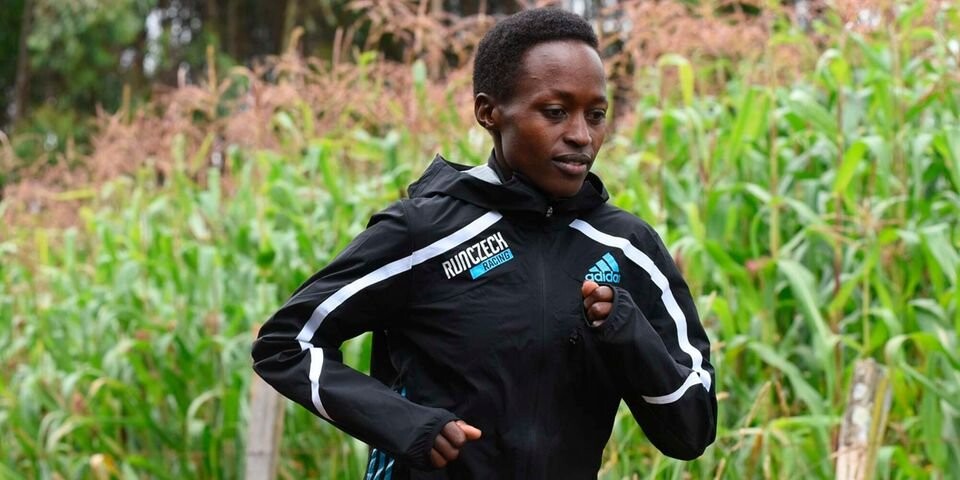
Kenya will be seeking to recapture the title that Ethiopia bagged in the last two editions with Gotytom Gebreslase having won last year while Ashete Bekere bagged victory in 2019.
The last Kenyan athlete to win the race was Gladys Cherono who ran a course record two hours, 18 minutes and 11 seconds in 2018. Cherono has since retired from elite running.
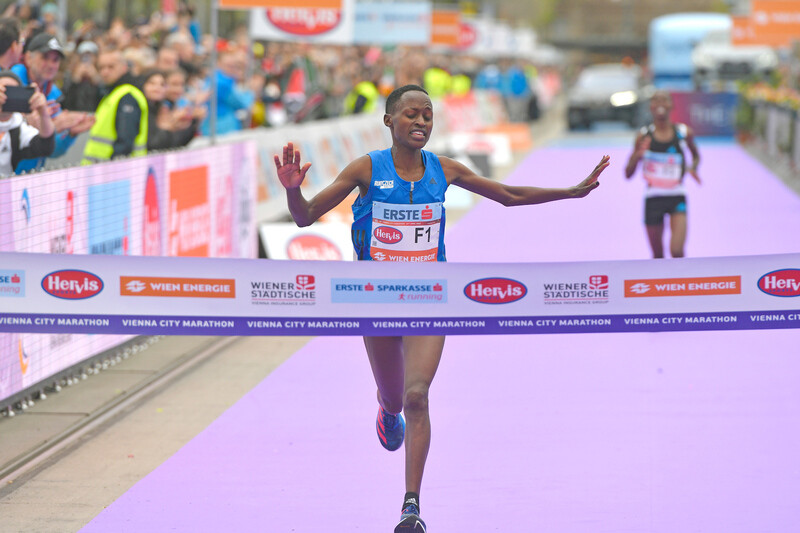
“My target in Berlin is to run my personal best from 2:20:59 to 2:18 and I believe if the weather conditions will allow, I will be able to hit the target,” Chepkurui, who is managed by Ikaika Sports Management, told Nation Sport at her home.
She said that after running well in this year’s Vienna Marathon in April where she clocked a course record, she is confident of an “impressive race” in her first major marathon.
by Bernard Rotich
Login to leave a comment
BMW Berlin Marathon
The story of the BERLIN-MARATHON is a story of the development of road running. When the first BERLIN-MARATHON was started on 13th October 1974 on a minor road next to the stadium of the organisers‘ club SC Charlottenburg Berlin 286 athletes had entered. The first winners were runners from Berlin: Günter Hallas (2:44:53), who still runs the BERLIN-MARATHON today, and...
more...Kipchoge underlines Paris 2024 ambition, says world record could be broken in Berlin
Marathon world record-holder Eliud Kipchoge has hinted he might break that mark when he runs his sixth Berlin Marathon next Sunday (September 25) - and has also renewed his vow to seek a record third Olympic title at Paris 2024.
Speaking by videolink from his Kenyan training base, the 37-year-old - who set the world record of 2 hours 1min 39sec the last time he ran in Berlin four years ago - was reluctant to be specific, but insisted with one of his enigmatic smiles: "I'm thinking of running a very good race."
"And if it is my personal best, I will accept it," Kipchoge continued.
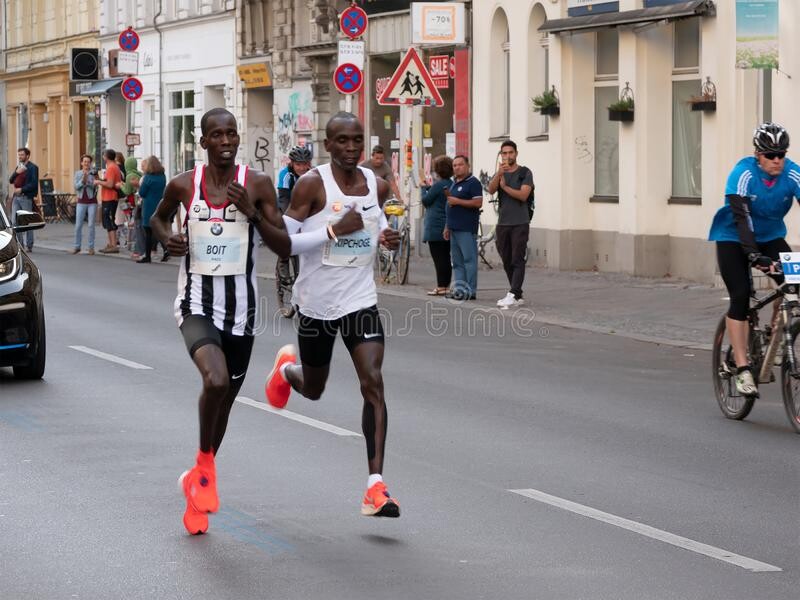
"But I don't want to commit to a time.
"I will try to push myself.
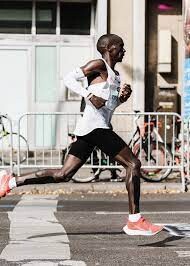
"I always say, if you want to push yourself, come to Berlin."
Each of the last seven lowerings of the men's world record have occurred at the Berlin Marathon.
In the more distant future, Kipchoge plans to add the Paris 2024 Olympic title to the ones he has already secured in Rio de Janeiro and Tokyo.
"That’s a very important thing to me," Kipchoge said.
"Because I am running to make history.
"I am running to tell young people that consistency is what we need, for performing at a high level.
"It's what the world needs.
"I trust I will be lining up in Paris 2024 and having a lot of energy to run to the gold medal."
Nobody has ever won three Olympic marathon gold medals.
In 2019, Kipchoge became the first person to run a marathon in less than two hours as he clocked 1:59:40.2 in Vienna in a specially-constructed event, although this did not count as a world record because standard competition rules regarding pacing and the provision of fluids did not apply and it was not an open race.
Kipchoge refuted the idea that it was not "a real race" today.
"What was in Vienna was a real race," Kipchoge insisted.
"If you run the marathon in sub-two hours it is a real race!
"In Vienna I was making history, and in Berlin, when I ran 2:01.39, I was making a world record.
"I trust that I have showed the way to many athletes of the next generation that one day a human being will run under two hours in a normal course, like Berlin or somewhere."
Turning his attention back to his next race, he added: "I don’t say I am going to run under two hours but I am going to run a very good race.
"I don’t like to commit myself.
"Let us call it a good race.
"And what I trust is, one of these fine days I might even run under two hours…"
by Mike Rowbottom
Login to leave a comment
BMW Berlin Marathon
The story of the BERLIN-MARATHON is a story of the development of road running. When the first BERLIN-MARATHON was started on 13th October 1974 on a minor road next to the stadium of the organisers‘ club SC Charlottenburg Berlin 286 athletes had entered. The first winners were runners from Berlin: Günter Hallas (2:44:53), who still runs the BERLIN-MARATHON today, and...
more...The former American marathon record holder Deena Kastor is ready to run the only World Major Marathon missing from her resume
Former American marathon record holder Deena Kastor has hinted that she’s planning to race this year’s Berlin Marathon, which would officially complete her six-star World Major Marathon campaign.
She has raced the other five majors (Boston, London, Tokyo, Chicago and New York City), and although she was set to race Berlin in 2019, an ankle injury dashed those plans. She’s back, and ready to tackle the race now, and she will be on the start line in Germany on Sept. 25.

Kastor is one of the top marathoners in American history, and up until this year, she held the national record at 2:19:36, set at the 2006 London Marathon, which she won. (Keira D’Amato broke Kastor’s record at the Houston Marathon in January 2022, when she ran 2:19:12.) Kastor also owned the American half-marathon record of 1:07:34 until 2018, when Molly Huddle ran 1:07:25.
In addition to her name in the record books, she won many races in her career, including several World Majors. (In addition to London in 2006, she won Chicago in 2005.) She also won a bronze medal in the marathon at the 2004 Athens Olympics. Her most recent World Major Marathon appearance came in 2019, at the Tokyo Marathon.
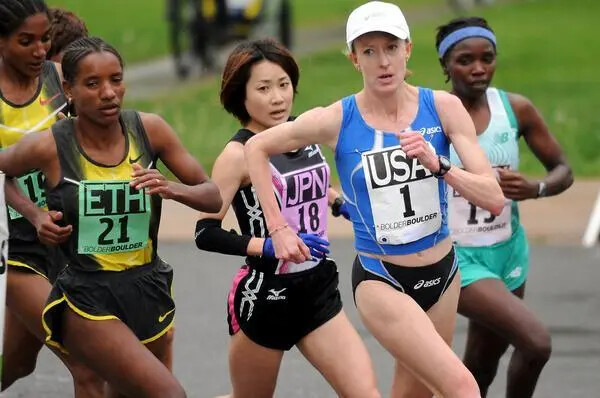
Kastor won’t be going for the win in Berlin, but she’s had her fair share of time on podiums. Instead, she will be shooting for the final part of her six-star medal, a bucket-list goal shared by many marathoners (both amateur and pro) around the world.
by Ben Snider-McGrath
Login to leave a comment
BMW Berlin Marathon
The story of the BERLIN-MARATHON is a story of the development of road running. When the first BERLIN-MARATHON was started on 13th October 1974 on a minor road next to the stadium of the organisers‘ club SC Charlottenburg Berlin 286 athletes had entered. The first winners were runners from Berlin: Günter Hallas (2:44:53), who still runs the BERLIN-MARATHON today, and...
more...US record holder Keira d’Amato and Kenyan Nancy Jelagat Meto head Women’s Field At BMW Berlin Marathon Sept 25
The American record holder Keira d’Amato and Kenya’s Nancy Jelagat Meto lead a high quality women’s field for the 48th edition of the BMW BERLIN-MARATHON on Sunday, September 25. Keira d’Amato improved the US record to 2:19:12 which also gives her the accolade of the fastest in the women’s field, announced by the organisers today. Eight women will be on the start line with personal bests of under 2:21.
The return of Kenya’s double Olympic champion and world record holder Eliud Kipchoge had already been announced some weeks ago as well as the participation of the current BMW BERLIN-MARATHON champion Guye Adola of Ethiopia. Six men on the start lists have personal bests of under 2:06while the organisers SCC EVENTS expect more than 45,000 runners from around 150 countries for Germany’s top road race. The BMW BERLIN-MARATHON is an Abbott World Marathon Majors race and a Platinum Label Road Race, awarded by World Athletics, the international governing body of the sport.
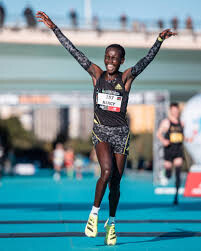
“After securing the presence of Eliud Kipchoge and Guye Adola, we are delighted also to have a very strong women’s field on the start line. With the right weather conditions there is certainly a good chance of very fast times,” said race director Mark Milde.
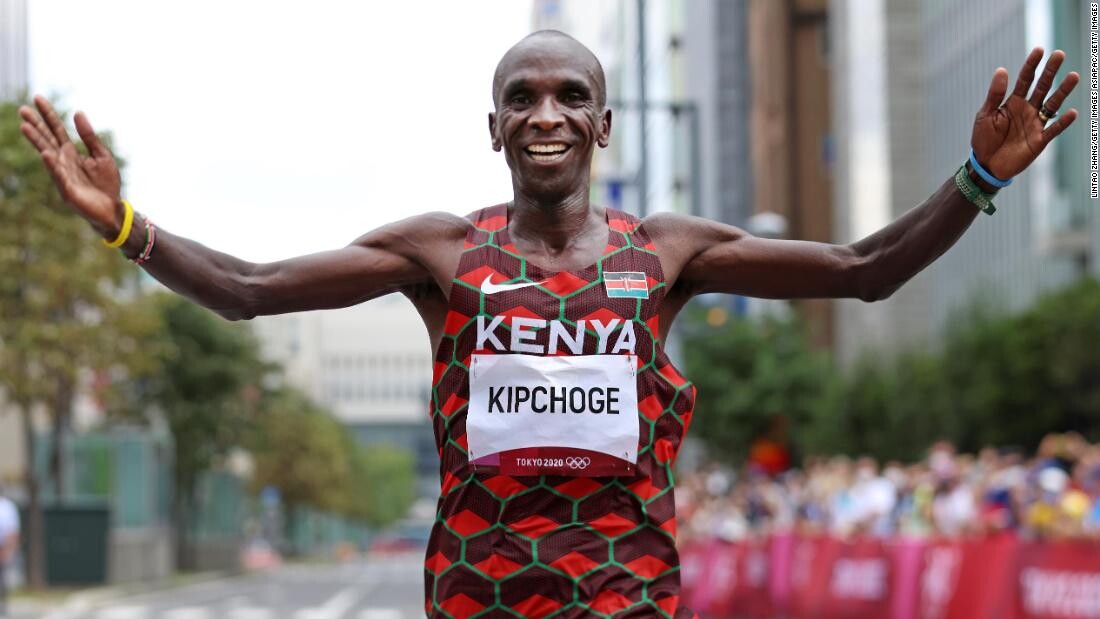
The presence of Keira d’Amato and Nancy Jelagat Meto brings to the event two women who have already run sub-2:20. At the age of 37, Keira d’Amato sprang a major surprise to break the American record with 2:19:12 in winning the Houston Marathon. That led to her late nomination for the World Championships in Eugene where she ran impressively to finish eighth. Sara Hall, who plans to run Berlin and then New York as well, went even better, finishing fifth.
Hall’s best time is 2:20:32. Nancy Jelagat Meto showed fine form in the past year, winning the prestigious Valencia title with a major improvement of 2:19:31. Four months previously she made a strong showing with second place in 65:21 at the GENERALI BERLIN HALF MARATHON.
Quite a few women runners will hope to put Berlin’s fast course, where Eliud Kipchoge set the current men’s world record of 2:01:39 in 2018, to good use in their bid to break 2:20: Gutemi Shone Imana has a best of 2:20:11 while Workenesh Edesa has run 2:20:24 and a third Ethiopian, Sisay Gola, has clocked 2:20:50. The Kenyans also have their contenders to break this landmark time in Maurine Chepkemoi, currently with a best of 2:20:18 and Vibian Chepkirui, who won the Vienna City Marathon in 2:20:59 in April.
Nor should marathon debutants be overlooked in the search for potential women winners, given that the Ethiopian Gotytom Gebreslase did just that to win last year’s BMW BERLIN-MARATHON title. Two possible contenders are Rosemary Wanjiru of Kenya and Ethiopia’s Nigisti Haftu. Both have strong performances at half marathon to their credit which could make them realistic challengers.
Login to leave a comment
BMW Berlin Marathon
The story of the BERLIN-MARATHON is a story of the development of road running. When the first BERLIN-MARATHON was started on 13th October 1974 on a minor road next to the stadium of the organisers‘ club SC Charlottenburg Berlin 286 athletes had entered. The first winners were runners from Berlin: Günter Hallas (2:44:53), who still runs the BERLIN-MARATHON today, and...
more...Keira D’Amato Will Attempt to Lower Her American Record at Berlin Marathon
After winning the Falmouth Road Race on Sunday morning, Keira D’Amato confirmed that she will be running the Berlin Marathon on September 25 in an attempt to lower her own American record.
D’Amato set the current record of 2:19:12 in Houston in January, eclipsing Deena Kastor‘s 16-year-old American record of 2:19:36.
“I think I can run faster than I did in Houston, and I’m going to go to try to prove it in Berlin,” D’Amato told Citius Mag after Falmouth, confirming what many insiders expected as she wasn’t listed in the NY or Chicago elite fields and former NY elite athlete coordinator David Monti had previously tweeted out (but then deleted) that D’Amato was headed to Berlin.
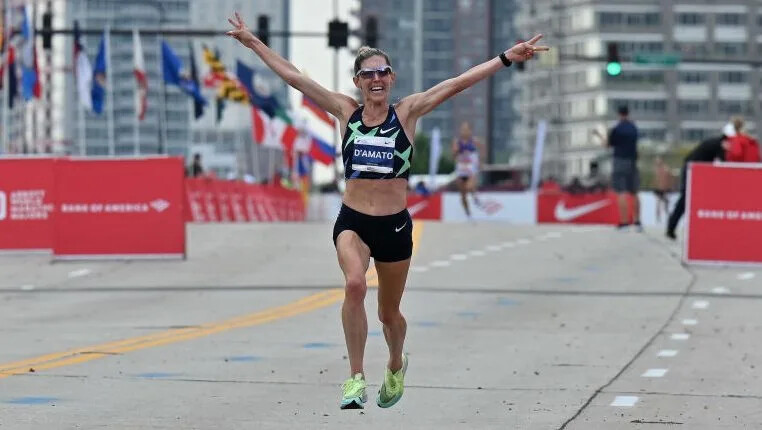
This will be D’Amato’s second Berlin Marathon. In 2019, she finished 17th in 2:34:55 in what was then a PR of more than six minutes. This time around, she will be looking to run more than 35 seconds per mile faster.
As the American record holder, D’Amato would have attracted a hefty appearance fee from either of the two American major marathons this fall, Chicago and New York. She also would have had more time to recover from her last marathon, an eighth-place finish at the World Championships on July 18 (there are 10 weeks between Worlds and Berlin; there are 12 weeks between Worlds and Chicago and 16 between Worlds and NYC).
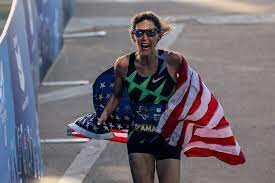
But D’Amato typically bounces back quickly between races — she won Falmouth less than five weeks after Worlds — and did not log a full buildup for Worlds as she was named as a late injury replacement for Molly Seidel barely two weeks before the championships. Additionally, American records result in big endorsement bonuses from shoe sponsors.
Berlin has become the go-to course for world record attempts in recent years, as it has hosted the last seven men’s world records and was also the venue of choice for Shalane Flanagan‘s American record attempt in 2014 (Flanagan fell short of the AR but still ran her lifetime best of 2:21:14). But three of the last four women’s world records have fallen in Chicago, including the current mark of 2:14:04 set by Brigid Kosgei in 2019. Either would have been fine options for an American record attempt; the better option may come down to weather on race day.
by Jonathan Gault
Login to leave a comment
BMW Berlin Marathon
The story of the BERLIN-MARATHON is a story of the development of road running. When the first BERLIN-MARATHON was started on 13th October 1974 on a minor road next to the stadium of the organisers‘ club SC Charlottenburg Berlin 286 athletes had entered. The first winners were runners from Berlin: Günter Hallas (2:44:53), who still runs the BERLIN-MARATHON today, and...
more...Eliud Kipchoge picks his next marathon he will be racing the Berlin Marathon for a fifth time on Sept. 25
Eliud Kipchoge will race the Berlin Marathon for a fifth time on Sept. 25, returning to the German capital event for the first time since he broke the world record there in 2018.
“Berlin is the fastest course, it’s where a human being can showcase its potential to push the limits,” he said in a press release.
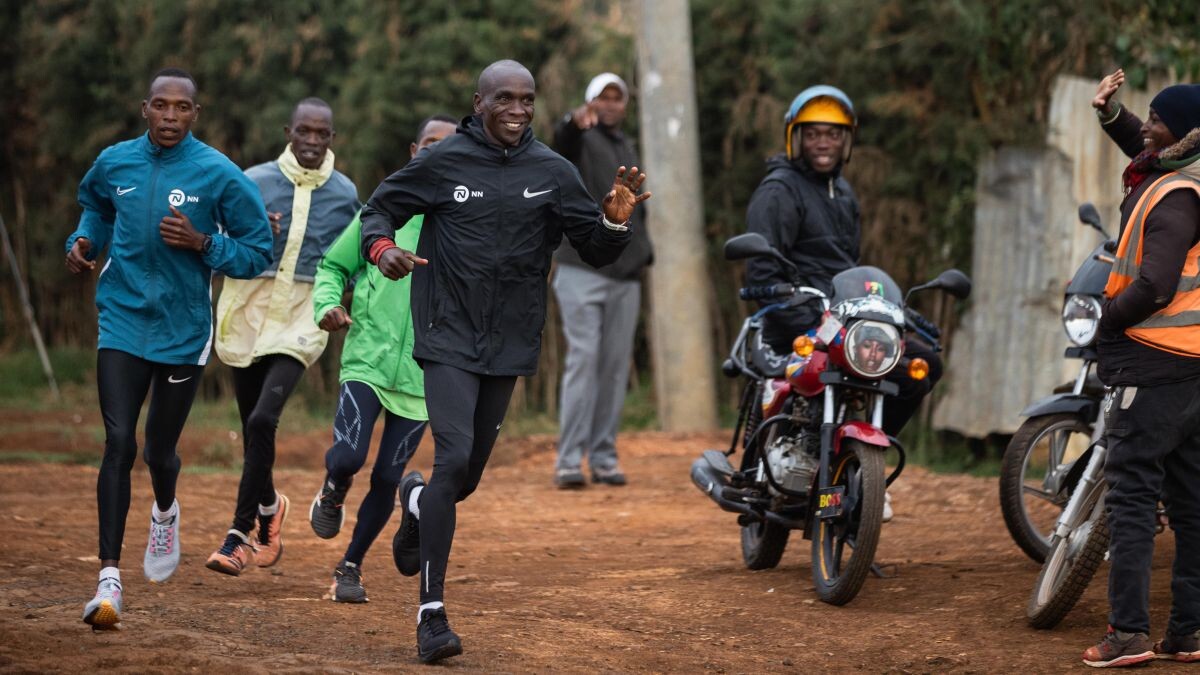
Kipchoge has the greatest marathon record of any man, winning 14 of his 16 starts and becoming the first and so far only person to run 26.2 miles in under two hours (doing so in a non-record-eligible event).
Kipchoge, 37, chose Berlin over London, his other usual marathon, and the other fall major marathons, Chicago (which he raced once in 2014) and New York City (which he has never raced).
London, usually in April, will be held in the fall for a third consecutive year due to the pandemic before returning to its spring date in 2023.
Kipchoge called it a “really hard” decision to go with Berlin over the others, speaking in a virtual press conference from training in Kaptagat in his native Kenya.
Kipchoge has said that he hopes to run all of the World Marathon Majors, which would require making his debuts in Boston, which is contested every April, and New York City, which is in November.
So far, Kipchoge has primarily run London every April and Berlin every September, never doing more than two marathons in a year.
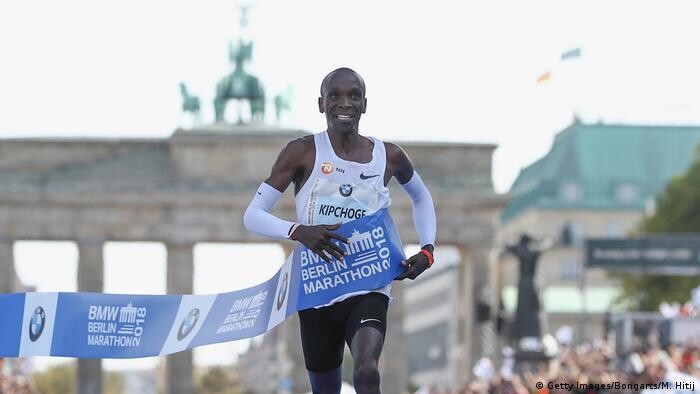
He said Friday that Boston and New York City remain targets, and when asked specifically about Boston, said it was on his bucket list.
Kipchoge is expected to race the 2024 Paris Olympics, where he could become the first marathoner to win three gold medals (or three medals of any color).
He has never raced a fall marathon in an Olympic year, so if he doesn’t race New York City in 2023, he may not do so until, at the earliest, 2025, when he will be three days she of turning 41 years old.
Kipchoge said Friday he may continue racing after the 2024 Olympics and into his 40s. He plans to focus on major city marathons rather than specialty races, such as his 2017 and 2019 attempts to break two hours for a marathon in non-record-eligible events.
He ran 2:00:25 on a Formula One track in Italy in 2017 and 1:59:40 in Vienna in 2019.
In Berlin, he has three victories and a runner-up. In 2018, he broke countryman Dennis Kimetto‘s world record, lowering it from 2:02:57 to 2:01.39. The next year, Ethiopian legend Kenenisa Bekele won Berlin in 2:01:41 with Kipchoge not in the field.
Kipchoge and Bekele, 40, have not gone head-to-head since then. Bekele, who hasn’t broken 2:06 since Berlin 2019, signed up for London on Oct. 2.
The other headliner in Berlin is defending champion Guye Adola of Ethiopia.
In 2017 in Berlin, an unknown Adola came out of nowhere to finish 14 seconds behind Kipchoge in the then-fastest-ever marathon debut on a record-eligible course, sticking with Kipchoge until the last mile. Adola didn’t know he was running until four days before the race and wasn’t meant to start with the elite group.
Adola said he hopes to break 2:03 this year.
by OlympicTalk
Login to leave a comment
BMW Berlin Marathon
The story of the BERLIN-MARATHON is a story of the development of road running. When the first BERLIN-MARATHON was started on 13th October 1974 on a minor road next to the stadium of the organisers‘ club SC Charlottenburg Berlin 286 athletes had entered. The first winners were runners from Berlin: Günter Hallas (2:44:53), who still runs the BERLIN-MARATHON today, and...
more...Debutante Gebreslase and Adola triumph in Berlin
It may have been her marathon debut, but Gotytom Gebreslase looked anything but inexperienced on her way to winning the BMW Berlin Marathon, crossing the finish line of the World Athletics Elite Platinum Label road race in 2:20:09 on Sunday (26).
Just moments earlier, fellow Ethiopian Guye Adola won an enthralling tactical men’s race in 2:05:45, seeing off a late-race challenge from Kenya’s Bethwel Yegon after dropping Ethiopian legend Kenenisa Bekele a few kilometres prior.
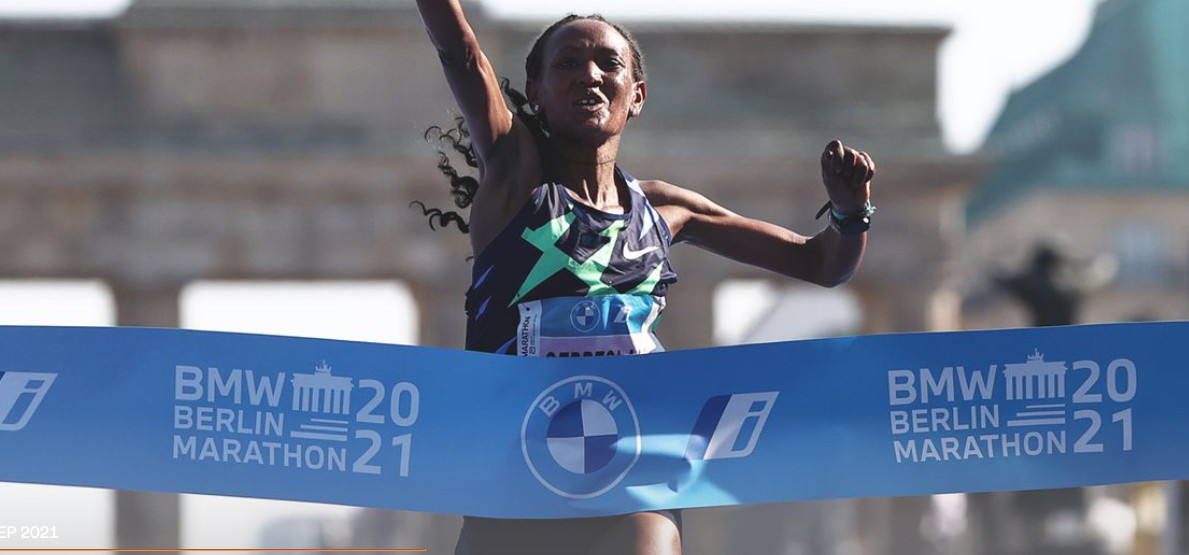
The 47th edition of the race, which is part of the Abbott World Marathon Majors Series, took place under strict hygiene regulations. With 24,796 runners from 139 nations, the race was the biggest marathon in the world since the start of the coronavirus pandemic.
The men had been operating at world record pace for the first half, while the leading women were close to course record pace. With temperatures above 20C during the final part of the race, the pace dropped in the closing stages of both contests, but Gebreslase and Adola both had just enough in reserve to hold on to victory.
Gebreslase was part of a large lead pack that went through 5km in 16:30 and 10km in 33:03. Six women were in the group, including Ethiopia’s Hiwot Gebrekidan who was looking to improve on her world-leading 2:19:35 run from Milan earlier in the year.
By the time the pack reached half way in 1:09:19, just four women remained in contention: Gebrekidan, Gebreslase, fellow Ethiopian Helen Tola and Kenya’s Fancy Chemutai. Their split suggested a finishing time inside 2:19, but the conditions soon started to get tougher.
Within the space of a few kilometres, Chemutai and Tola had been dropped, reducing the race to a two-woman Ethiopian battle between Gebrekidan and Gebreslase. The latter, feeling surprisingly good on her debut marathon, started to test the water and edged ahead of her compatriot over the next few kilometres, opening up a 13-second gap by 35km, reached in 1:54:54.
Her split at that point still pointed towards a sub-2:19 finish, but Gebreslase’s pace dropped significantly over the next five kilometres, which she covered in 17:40. Lucky for her, Gebrekidan was struggling even more, widening the gap between the pair. And Tola was now more than two minutes adrift of Gebrekidan in third.
Gebreslase continued to pull away in the final few kilometres, winning comfortably in 2:20:09, the eighth fastest winning time recorded in Berlin. Gebrekidan held on to second place in 2:21:23 and Tola completed the Ethiopian podium sweep in 2:23:05.
The men’s race may not have resulted in a world record as had been hyped in the days leading up to the event, but it eventually became an enthralling three-way contest between Bekele, Adola and Yegon.
The opening pace was swift as the six-man lead pack breezed through 5km in 14:22 and 10km in 28:47. Bekele and Adola formed one third of that group, while Yegon bided his time further down the field, passing through 10km in 29:40 as part of the larger chase pack.
Shortly after passing through 15km in 43:12 – still well inside world record pace – Bekele started to lose contact with the rest of the lead group, who went on to reach the half-way point in 1:00:48. Bekele, meanwhile, covered the first half in 1:01:00, which was the pre-determined target for the pacemakers.
Over the course of the next five kilometres, though, Bekele worked his way back to the front. The 30km split of 1:27:48 (2:03:30 pace) essentially confirmed that the world record would live to see another day, but the race was shaping up to be a three-way battle between Bekele, Adola and Kenya’s Philemon Kacheran.
Kacheran didn’t last too much longer in that trio, however, and Bekele started to struggle again as Adola was gritting his teeth out in front. Further behind, however, Yegon continued to make his way through the field. Having been seventh at 20km and sixth at 25km, the Kenyan moved into fourth place at 35km, just 17 seconds behind Adola.
One mile later, Yegon passed Bekele to move into second place. Another kilometre after, he joined Adola at the front. But with the temperature now above 20C, Yegon was unable to maintain that momentum. A final surge from Adola at 40km was enough to see off Yegon’s challenge, allowing the Ethiopian to open up a decisive gap.
Adola, the runner-up in 2017, went on to win in 2:05:45 with Yegon following 29 seconds later to take the runner-up spot in a PB of 2:06:14. Bekele was third in 2:06:47.
“I thought before the race that I could beat Kenenisa,” said Adola, who finished second in Eliud Kipchoge in the German capital four years ago. “It was so hot, my feet were burning.”
Bekele, meanwhile, appeared slightly disappointed but confirmed there’s still more to come from the three-time Olympic gold medallist. “The big problem for me was the lack of training because of the pandemic,” he said. “I just couldn't do as well as I hoped. That does not mean my career is over.”
Login to leave a comment
BMW Berlin Marathon
The story of the BERLIN-MARATHON is a story of the development of road running. When the first BERLIN-MARATHON was started on 13th October 1974 on a minor road next to the stadium of the organisers‘ club SC Charlottenburg Berlin 286 athletes had entered. The first winners were runners from Berlin: Günter Hallas (2:44:53), who still runs the BERLIN-MARATHON today, and...
more...The women’s race at the BMW Berlin Marathon on Sunday is looking increasingly like an attack on the course record
The best time to date was set three years ago when the Kenyan Gladys Cherono ran 2:18:11. Half-a-dozen women will be on the start line who have run under 2:25 and among them is the Ethiopian Hiwot Gebrekidan, the fastest women in the world this year thanks to her personal best of 2:19:35 in winning the Milan title in April.
In the light of the continung Corona pandemic the number of starters for this year has been considerably reduced. Around 25,000 runners are expected to compete on Sunday. The BMW Berlin Marathon will take place under strict hygiene rules.
Any participant on the start line must have been vaccinated, or recovered from the virus or be able to produce a negative PCR test. Over 90% of runners entered have been vaccinated. Spectators on the course will also be requested to maintain social distance and wear a mask covering nose and mouth.
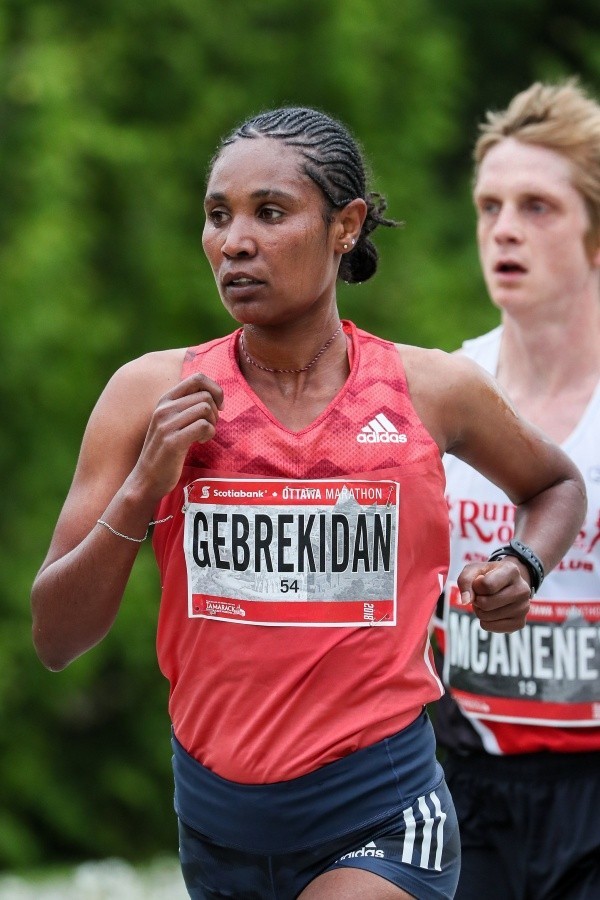
“I’ve been preparing for the BMW Berlin Marathon for a long time and want to run my personal best on Sunday,” said Hiwot Gebrekidan at Thursday’s press conference in Berlin. When pressed as to what pace she would like, the 26-year-old answered: “I’d actually like to hold back in the first half. But I nevertheless plan to go through halfway in just under 69 minutes.” Such a split at halfway would put Hiwot Gebrekidan not only in contention for the course record but also the Ethiopian national record, currently held by Worknesh Degefa with her time of 2:17:41 in Dubai in 2019.
Her fellow Ethiopian Shure Demise also has a personal best in her sights. She is a highly experienced marathon runner, having run a dozen of them. “I’ve spoken with other women runners and know what a fast course is Berlin. I have high expectations for myself and want to break my personal record,” said Shure Demise, whose best currently stands at 2:20:59 and could well go under 2:20 for the first time.
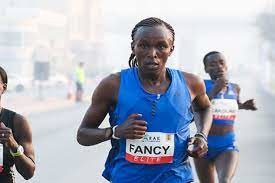
“2:20 remains a breakthrough target for women in the marathon,” said the race director Mark Milde, adding in response to Hiwot Gebrekidan’s announcement of going for a super-fast time at halfway: “We’ll have to wait and see what times are actually run. But a pace like that would certainly suit us. And a course record would be great.”
A woman who has been a late addition to the elite field in Berlin but is capable of a surprise is Fancy Chemutai. The Kenyan has a best of 2:24:27 and will be running only her second marathon. If she were able to convert her enormous potential to good effect in the classic distance she may well be in contention for the win. Her half marathon best of 64:52 makes her the seventh fastest woman at the distance of all time. No other woman on the Berlin start list has such a fast half marathon performance.
Rabea Schöneborn from the local club LG Nord Berlin will be running a marathon for the first time in her home town. The 27-year-old improved her best to 2:27:03 in April in her second race at the distance, missing selection for the Olympics by just nine seconds. This inadvertently created the opportunity of turning that preparation to potentially good effect at the BMW Berlin Marathon. “Berlin is definitely a highlight, I’m really looking forward to Sunday. Up to now I’ve only had the experience of elite marathons but now I can see and feel what’s it like to be part of a big city marathon. Having spectators will definitely give me a lift,” said Rabea Schöneborn.
The Berlin athlete hopes to take advantage of the fast course and what looks likely to be excellent weather conditions to improve her best time. “I always try to hold back a little so I can run the second half faster. That’s also the plan on Sunday,” explained Rabea Schöneborn. Nevertheless, she is still looking at a fast halfway split: “Something between 73:10 and 73:20 is the plan.”
by AIMS
Login to leave a comment
BMW Berlin Marathon
The story of the BERLIN-MARATHON is a story of the development of road running. When the first BERLIN-MARATHON was started on 13th October 1974 on a minor road next to the stadium of the organisers‘ club SC Charlottenburg Berlin 286 athletes had entered. The first winners were runners from Berlin: Günter Hallas (2:44:53), who still runs the BERLIN-MARATHON today, and...
more...Kenenisa Bekele will lead the entries for Sunday’s BMW Berlin Marathon
When Kenenisa Bekele lines up for the BMW Berlin Marathon this weekend (Sept 26) it marks the beginning of an unprecedented period of marathon racing. Due to Covid-related postponements, five of the six Marathon Majors will be staged within a 42-day period. If you’re a fan of the classic 26.2-mile distance, you are in for a feast.
Bekele is clearly excited by the prospect as he is racing in not just one but two of these races. After Berlin on Sunday he will attempt to recover and re-boot before tackling the New York City Marathon in early November.
Here is how the autumn marathon period plays out…
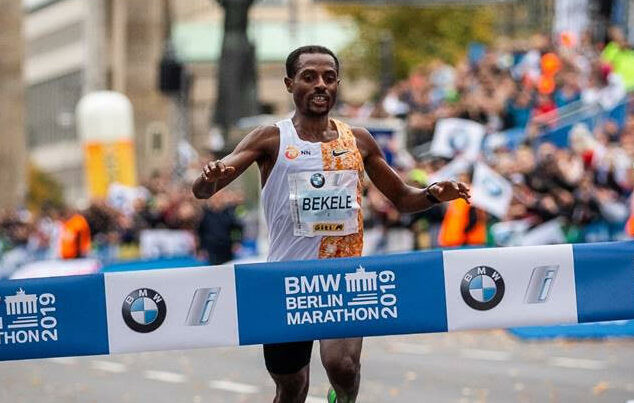
Sept 26 – BerlinOct 3 – LondonOct 10 – ChicagoOct 11 – BostonNov 7 – New York
Tokyo Marathon, which is also one of the Marathon Majors, was due to take place on October 17 too, but has been called off due to the pandemic. However the TCS Amsterdam Marathon is still on October 17 – and this Dutch race often sees fast times.
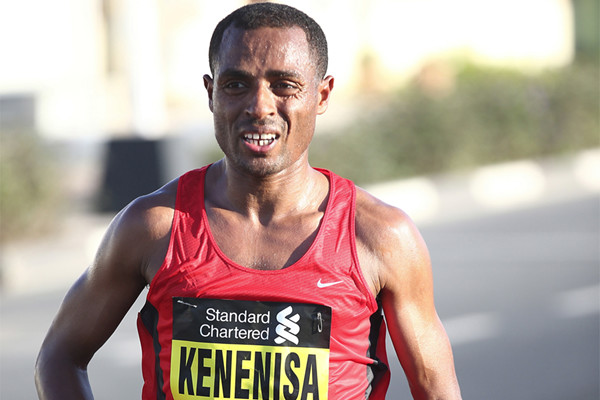
First comes Berlin, though. Bekele has not raced since March last year and during this time he has seen his world 5000m and 10,000m records fall to Joshua Cheptegei. Last October he was due to race in London but withdrew on the eve of the race with a calf injury. He is now aged 39 but don’t write him off. People thought he was a spent force in 2019 but he came within two seconds of the world record with 2:01:41 in Berlin.
“I will come back with good energy and motivation,” says Bekele. “The last race in Berlin motivated me a lot, so I hope I will fulfil my plan this year.”
Bekele will be among around 25,000 runners in Berlin as mass participation road running emerges from the pandemic. His opposition on Sunday includes Guye Adola, an Ethiopian who ran the world’s fastest ever debut marathon of 2:03:46 in Berlin four years ago but has struggled to improve since.
There is also Eliud Kiptanui of Kenya, who has run 2:05:21, plus a further eight men who have run inside 2:07 such as Philemon Kacheran and Festus Talam of Kenya, Olika Adugna and Tadu Abate of Ethiopia, plus Hidekazu Hijikata of Japan.
Adugna won his debut marathon in Dubai in 2:06:15 while Hijikata took the Lake Biwa Marathon victory earlier this year.
The women’s race, meanwhile, includes Hiwot Gebrekidan, who won the Milan Marathon this year in 2:19:35, plus fellow Ethiopian Shure Demise, together with Kenyans Fancy Chemutai and Purity Rionoripo.
Just seven days after Berlin, the Virgin Money London Marathon takes place with the fields led by women’s world record-holder Brigid Kosgei together with fellow Kenyan Joyciline Jepkosgei and Ethiopians Roza Dereje and Birhane Dibaba.
The men’s race in London features Ethiopians Shura Kitata, Mosinet Geremew and Birhanu Legese plus Kenyans Titus Ekiru and Evans Chebet, whereas Brits like Charlotte Purdue and Jonny Mellor will create plenty of home interest.
Chicago includes world champion Ruth Chepngetich of Kenya in the women’s race alongside American hope Sarah Hall, while another home nation hope, Galen Rupp, takes on Ethiopians Getaneh Molla and Seifu Tura in the men’s race.
by Athletics Weekly
Login to leave a comment
BMW Berlin Marathon
The story of the BERLIN-MARATHON is a story of the development of road running. When the first BERLIN-MARATHON was started on 13th October 1974 on a minor road next to the stadium of the organisers‘ club SC Charlottenburg Berlin 286 athletes had entered. The first winners were runners from Berlin: Günter Hallas (2:44:53), who still runs the BERLIN-MARATHON today, and...
more...2021 Berlin marathon to atract 25,000 runners
Berlin Marathon organizers expect around 25,000 runners to take part on Sunday, making it the biggest marathon since the start of the coronavirus pandemic.
The event was cancelled last year because of the global health crisis but returns on the streets of the German capital.
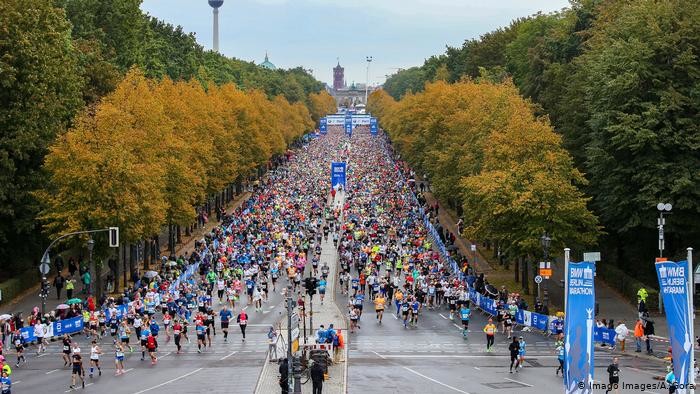
"The time is ripe for us to send a signal to the outside world that we are still a sports metropolis," Juergen Lock, managing director of organiser SCC Events, said.
He expects more than 90 per cent of participants to be either fully vaccinated or to have recovered from a coronavirus infection.
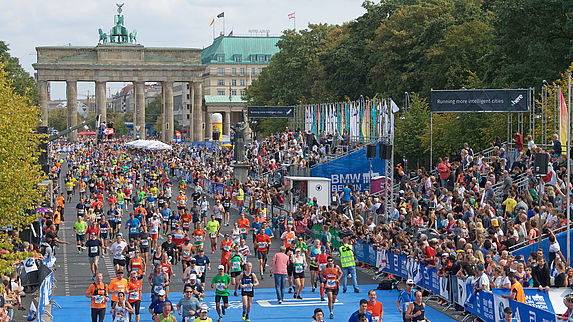
All others must undergo a PCR test no earlier than 48 hours before the start.
Wearing masks in the start and finish areas is mandatory for runners, as well as for all spectators along the 42.195km course.
"All runners can run liberated," Lock said.
With two smaller events in recent weeks including a half marathon, the organizers have gained experience for the big event, which will be held on the same day as the German general election.
The most prominent runner is Ethiopian Kenenisa Bekele.
The 39-year-old missed the world record of Olympic marathon champion Eliud Kipchoge of Kenya by only two seconds in his victory in 2019 in two hours one minute 41 seconds.
Kipchoge set the mark in Berlin in 2018.
The women's field is led by Hiwot Gebrekidan, the Ethiopian who ran a year's best 2:19:35 in Milan.
Login to leave a comment
BMW Berlin Marathon
The story of the BERLIN-MARATHON is a story of the development of road running. When the first BERLIN-MARATHON was started on 13th October 1974 on a minor road next to the stadium of the organisers‘ club SC Charlottenburg Berlin 286 athletes had entered. The first winners were runners from Berlin: Günter Hallas (2:44:53), who still runs the BERLIN-MARATHON today, and...
more...Hiwot Gebrekidan and Kenenisa Bekele will lead powerful Ethiopian Challenge in Berlin
The BMW BERLIN-MARATHON will get underway on Sunday, September 26 with high quality elite fields headed by the Ethiopian superstar Kenenisa Bekele on his fourth appearance in Germany’s biggest and most spectacular marathon, while his compatriot Hiwot Gebrekidan will run in Berlin’s women’s field for the first time. Gebrekidan is currently the fastest female marathon runner in the world this year. The BMW BERLIN-MARATHON is part of the Abbott World Marathon Majors and a Platinum Label Road Race, awarded by World Athletics, the international governing body of athletics.
Kenenisa Bekele is 39 now and will be running the BMW BERLIN-MARATHON for the fourth time. He won the race in 2016 but dropped out the next year and returned in 2019 to triumph once again. In both victories the Ethiopian missed the then world record by a matter of seconds.
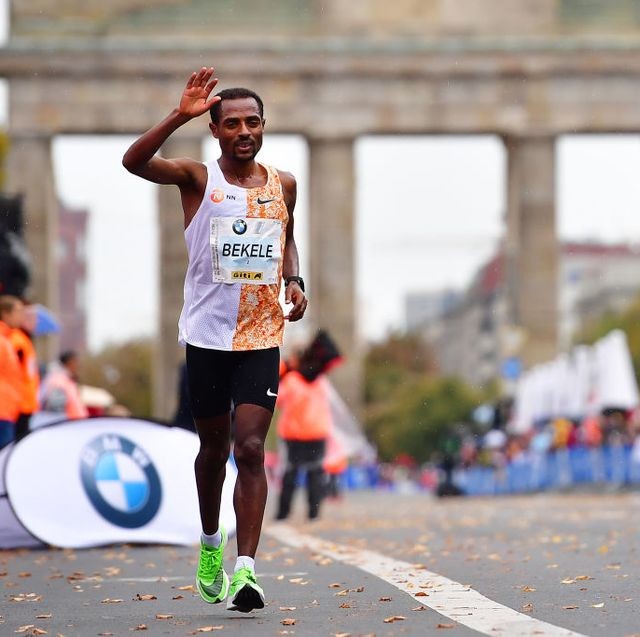
In terms of his achievements on the track and cross country, Kenenisa Bekele is the greatest long distance runner of all time. The multiple world record holder won the 5,000m at the 2008 Olympic Games as well as at the 2009 World Championships, took the 10,000m title at the Olympics in 2004 and 2008 as well as at the World Championships in 2003, 2005, 2007 and 2009. In addition, he has won eleven gold medals at the World Cross Country Championships.
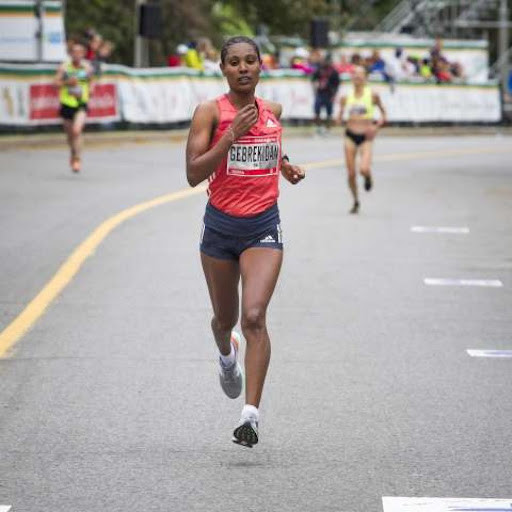
At the same time, Kenenisa Bekele’s marathon career has been by no means a smooth one. He has failed to finish three of his six races at the classic distance, including an attempt on the world record in Dubai in 2017 and Berlin later in the same year.
Yet on two occasions Kenenisa Bekele was able to convert his enormous potential to the marathon though there was still an element of disappointment attached, since he missed breaking the world record by a handful of seconds each time. In 2016 in Berlin he went within six seconds of the then global best, improving his own best to 2:03:03. Two years ago Bekele won again, this time running 2:01:41, two seconds outside the world record which his Kenyan rival Eliud Kipchoge had improved to 2:01:39 in the meantime. This achievement in 2019 means the Ethiopian is the second fastest marathon runner in history. It may well be that the BMW BERLIN-MARATHON on September 26 is his last chance to break the world record at the distance. “I’m looking forward to the race in the BMW BERLIN-MARATHON and all my training has been with this in mind. It’s gone well. I am doing everything to make sure my preparation is perfect,” said Kenenisa Bekele.
Ethiopia’s superstar will face two strong compatriots among his rivals. Guye Adola made an outstanding marathon debut in 2017 beside the River Spree with second place in 2:03:46. His time was record for a marathon debutant and Adola even put the eventual winner, Eliud Kipchoge, under pressure, leading the great Kenyan until shortly before 40 kilometres. Another Ethiopian who surprised many on his marathon debut is Olika Adugna. He will be running in Berlin on September 26 with a best of 2:06:15 from winning debut in Dubai in 2020.
The women’s field includes the fastest marathoner in the world this year, Ethiopia’s Hiwot Gebrekidan, who won the Milan Marathon in a personal best of 2:19:35 in April. Purity Rionoripo of Kenya (pb 2:20:39) and the Ethiopian Shure Demise (pb 2:20:59) should also be relied upon to offer strong challenges.
More information is available online at: Berlin-Marathon.com.
Login to leave a comment
BMW Berlin Marathon
The story of the BERLIN-MARATHON is a story of the development of road running. When the first BERLIN-MARATHON was started on 13th October 1974 on a minor road next to the stadium of the organisers‘ club SC Charlottenburg Berlin 286 athletes had entered. The first winners were runners from Berlin: Günter Hallas (2:44:53), who still runs the BERLIN-MARATHON today, and...
more...Kenenisa Bekele is set to run the Berlin Marathon
On September 26, all eyes will be on the BMW BERLIN-MARATHON. After a bitter period of deprivation, a large field of runners will be allowed to celebrate on the streets of the German capital. Due to the current pandemic situation, this year there is a reduction in participants and a detailed hygiene concept, which makes it possible for an event of this magnitude to be realized at all.
Not only are the recreational athletes appreciative of the endless efforts by the organiser SCC EVENTS, which are making it possible to finally compete together again at the BMW BERLIN-MARATHON. A look at the list of favourites shows quite clearly how much the world’s elite is also waiting for top notch races. None other than running legend Kenenisa Bekele will aim for victory on September 26.
At the 2019 BMW BERLIN-MARATHON, he clearly demonstrated with his time of 2:01:41 hours that he is always a force to be reckoned with. Whether he can shine again this year with one of the fastest marathon times ever remains to be seen. Anything is possible for the Ethiopian jack-of-all-trades. The #berlinlegend Bekele appears to do particularly well in the Berlin air. This is underlined not only by his victories at the BMW BERLIN-MARATHON in 2016 and 2019, but also by his captivating performances at the 2009 World Athletics Championships in the capital city on the Spree River.
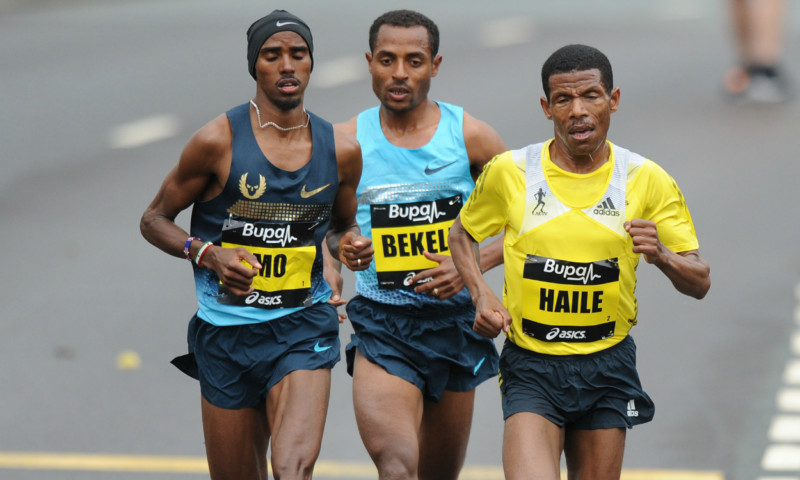
Login to leave a comment
BMW Berlin Marathon
The story of the BERLIN-MARATHON is a story of the development of road running. When the first BERLIN-MARATHON was started on 13th October 1974 on a minor road next to the stadium of the organisers‘ club SC Charlottenburg Berlin 286 athletes had entered. The first winners were runners from Berlin: Günter Hallas (2:44:53), who still runs the BERLIN-MARATHON today, and...
more...Organizers hope up to 35,000 can run this September 2021, Berlin Marathon
Organizers hope that up to 35,000 runners can take part in the Berlin marathon this September as part of a pilot project as Germany eases Covid-19 restrictions.
In a joint press conference Monday, Berlin's senate and marathon organizers outlined plans to first hold two test events, a 10km race in July and a half marathon in August.
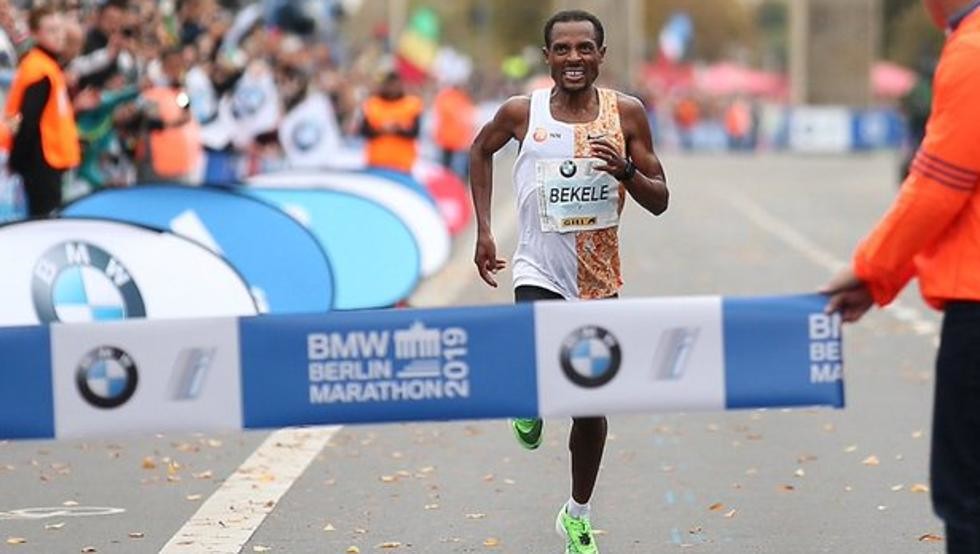
Providing all goes well and the rate of infection remains low, the Berlin marathon would take place on September 26.
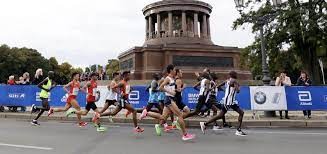
Runners would either have to prove they are fully innoculated or undergo a PCR test as part of a hygiene programme still to be approved by Berlin's health authority.
"There is no certainty that the Berlin Marathon can take place, but the probability is there," said Berlin senator Andreas Geise.
"If the incidence rates continue to fall, approval of the pilot project is conceivable."
A maximum field of 35,000 would be 10,000 down on the 45,000 who took part in the 2019 Berlin marathon, the last one before the 2020 race was cancelled due to the pandemic.
The official world record for the men's marathon was set in Berlin in 2018 when Kenya's Eliud Kipchoge ran the 42.195kms (26.2mi) in two hours, 1:39 minutes.
The top three fastest race times for the men's marathon have all been run in Berlin.
by France 24
Login to leave a comment
BMW Berlin Marathon
The story of the BERLIN-MARATHON is a story of the development of road running. When the first BERLIN-MARATHON was started on 13th October 1974 on a minor road next to the stadium of the organisers‘ club SC Charlottenburg Berlin 286 athletes had entered. The first winners were runners from Berlin: Günter Hallas (2:44:53), who still runs the BERLIN-MARATHON today, and...
more...Be part of the 2:01:39 Challenge – BMW BERLIN-MARATHON on September 26-27, 2020
Are you ready for the 2:01:39 Challenge on September 26 and 27, 2020? How many kilometers can you cover in 2:01:39 hours, the world record time set by Eliud Kipchoge in the BMW BERLIN-MARATHON 2018? No matter where in the world you may find yourself, be a part of the #berlin42united community and run your personal record. #20139
But you can become part of the 2:01:39 Challenge from September 26 to 27, 2020. How many kilometers can you cover in 2:01:39 hours, the world record time set by Eliud Kipchoge in the 2018 BMW BERLIN-MARATHON 2018. No matter where in the world you may find yourself, be a part of the #berlin42united community, achieve your personal record and immortalize yourself in a ranking.
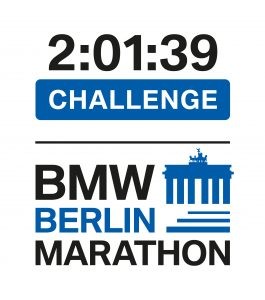
The only cost to participate is your sweat and muscle power. The 2:01:39 Challenge App provides the needed support. Starting in mid-September, the free app will be available for download for iOS and Android devices.
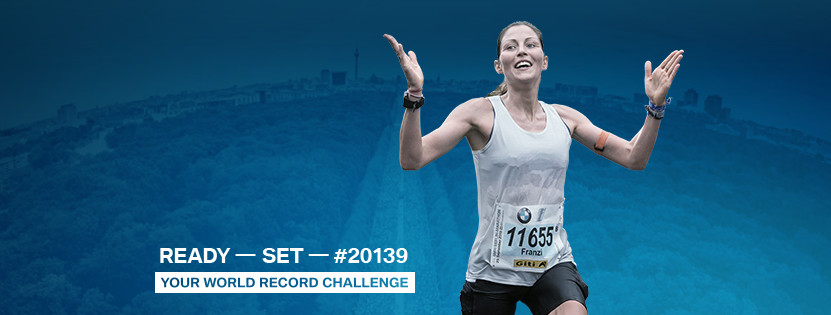
In addition, on September 27, 2020, a team of German top runners in the form of a relay is trying to break the time of 2:01:39 hours over the marathon distance around the Berlin Victory Column (Siegessäule). Due to the current situation, viewers can only follow this action, which takes place in compliance with the current hygiene regulations, on the screen.
The motto of September 27 is “Berlin bewegt sich” and will be broadcast live on rbb television from 9 am to 11.30 am.
In the next few weeks we will present more detailed information.Until then we wish you continued success in training for your 2:01:39 Challenge.
Stay tuned! #20139
Login to leave a comment
There will be no rescheduled event to replace the cancelled BMW Berlin-Marathon in 2020
Events with 5,000 participants or more are prohibited by the responsible authorities in Germany until October 24, 2020. Hopes were raised earlier this week that a replacement race after that date might be possible, if satisfactory hygiene measures could be put in place, but the race’s organisers today drew a line under these considerations.
SCC Events, the race organisers, said in a statement: “We worked hard on the development of a hygiene concept and held countless discussions with our experts, the responsible authorities and service providers, among others. A comprehensive feasibility analysis showed that an event such as the BMW Berlin-Marathon could not be held under the current specifications – also not after October 24, 2020, especially not with the high expectations we all have for this event. Naturally, we support the containment measures, as the health of everyone is of utmost importance to us.
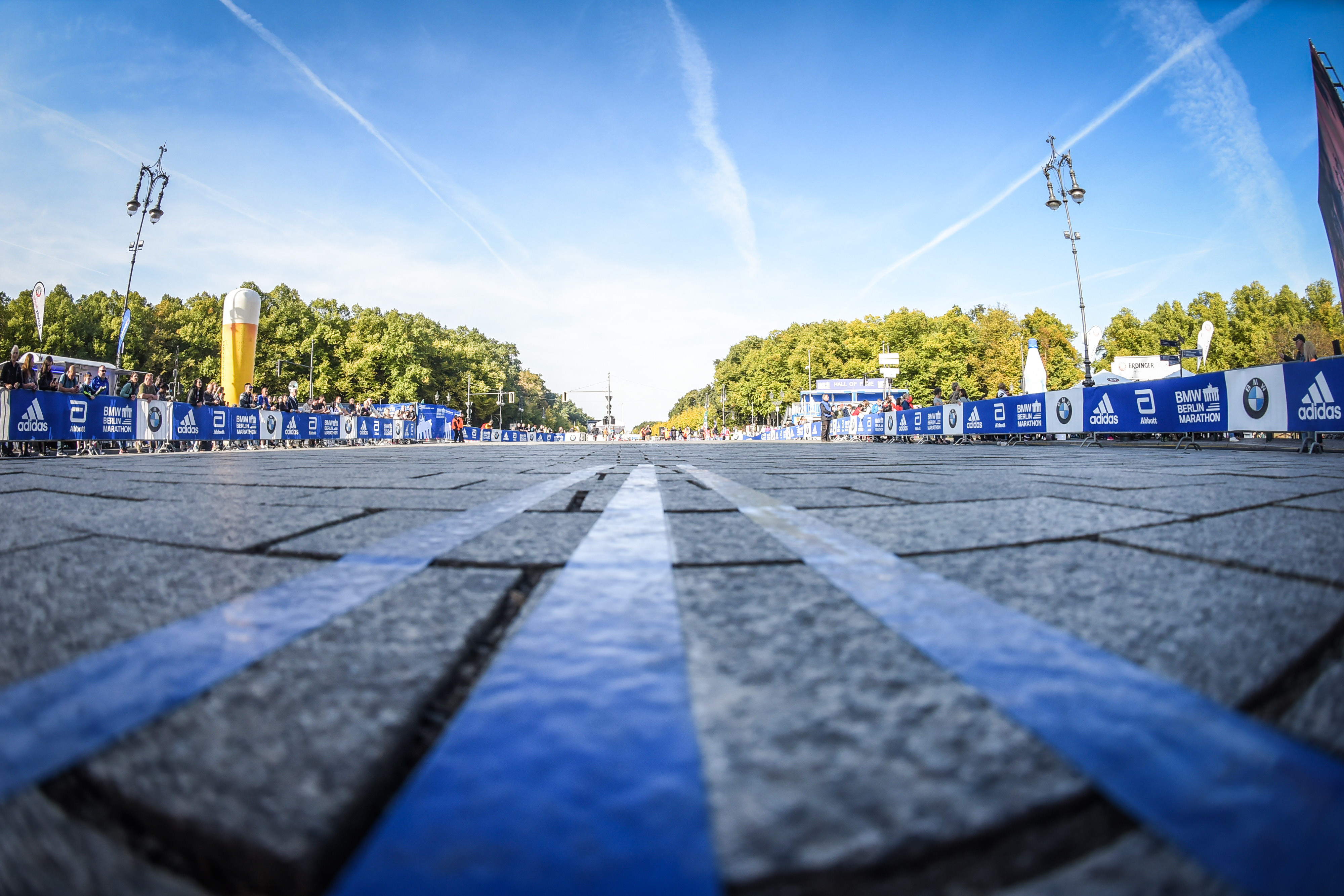
“The BMW Berlin-Marathon will therefore not take place on September 26-27, 2020 due to force majeure, and it is also not possible to hold the event at a later date this year.”
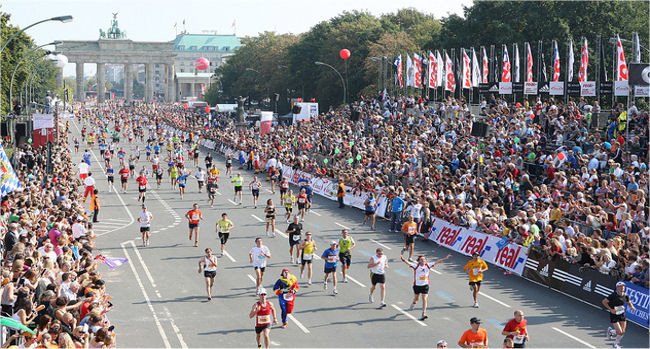
Jürgen Lock, Managing Director of SCC Events, added: “Due to the weather conditions alone and the ever shorter days, it would be very difficult to hold the BMW Berlin-Marathon with its various competitions and event formats this year.
Then there is the uncertainty about which regulations will apply at a later date. The question of whether athletes will be able to travel internationally again by then can also not yet be answered.”
Registered participants will be contacted this week and offered the opportunity of a full refund or a transfer to next year’s event on September 25–26 2021.
Login to leave a comment
BMW Berlin Marathon
The story of the BERLIN-MARATHON is a story of the development of road running. When the first BERLIN-MARATHON was started on 13th October 1974 on a minor road next to the stadium of the organisers‘ club SC Charlottenburg Berlin 286 athletes had entered. The first winners were runners from Berlin: Günter Hallas (2:44:53), who still runs the BERLIN-MARATHON today, and...
more...Berlin Marathon´s organizers have said they need more time to examine their options as discussions continue on whether the race will take place in 2020
SCC Events had previously announced that the World Marathon Major would not take place on its original September 27 date, leading to many publications reporting the race as cancelled.
This was due to restrictions put in place by the local Government, which placed a ban on gatherings of more than 5,000 people until October 24.
A decision is still to be made by SCC Events on this year's race, however, with further information to be released by the end of June at the latest.
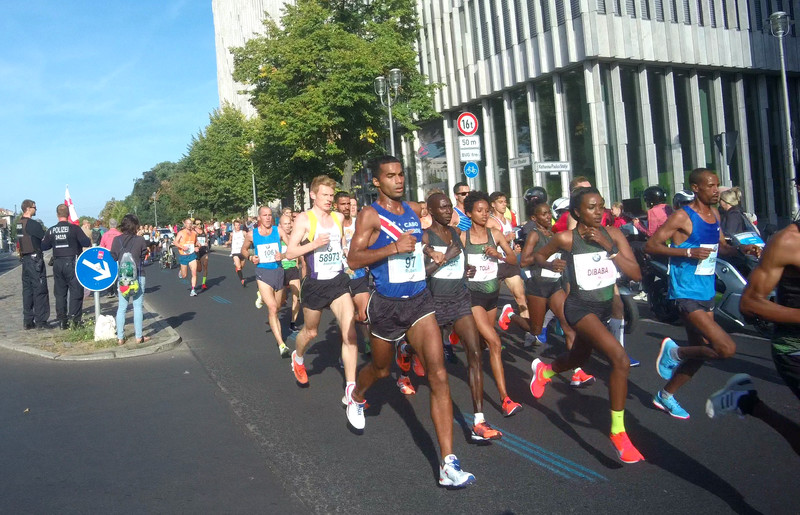
Many major marathons around the world have faced a similar fate with the races in Boston and London, which are also part of the World Marathon Majors, postponed to September and October respectively.
"Due to the size of the event and the large number of people involved, we need a little more time to examine different options for this implementation of the further procedure," SCC said.
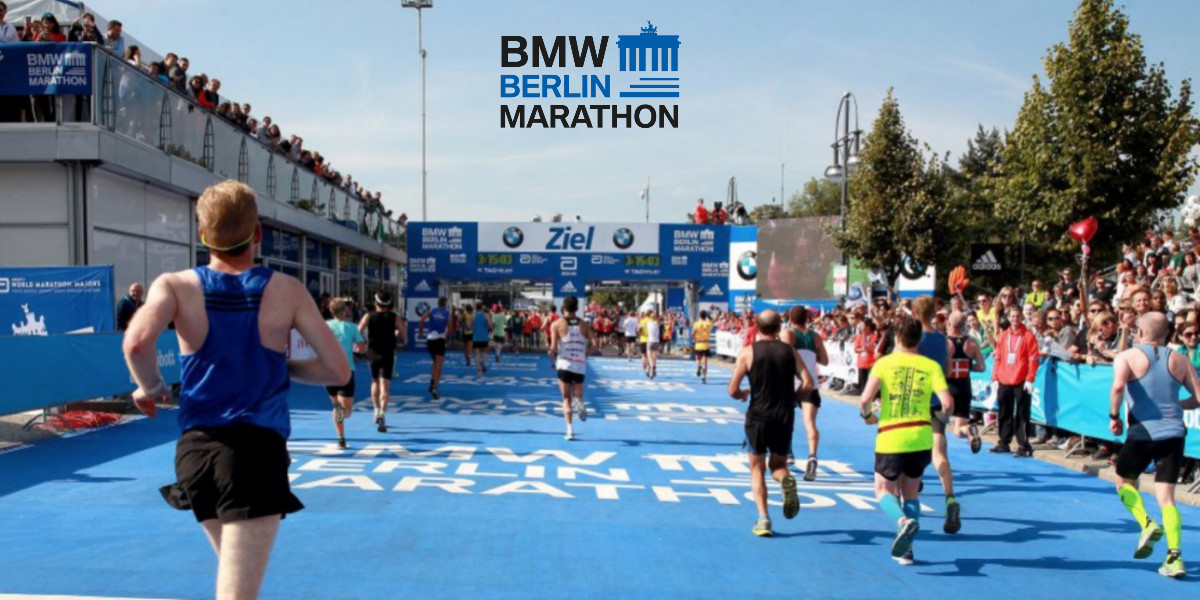
"In addition, at the moment we cannot work on the upcoming tasks in full team strength; like many others, the SCC Events team is currently on short-time work.
"Nevertheless, as usual, we put all the available energy into this process and will contact you by the end of June at the latest with details on the further procedure relating to the BMW Berlin Marathon.
"If we have new information beforehand, we will of course let you know immediately."
In Germany, there are more than 172,000 confirmed cases of COVID-19 nationwide, resulting in the deaths of more than 7,600 people.
The 2018 edition of the race saw Kenya's Eliud Kipchoge smash the men's marathon world record in a time of 2 hours 1min 39sec.
This was nearly bettered by Ethiopia's Kenenisa Bekele last year, who was two seconds short on his way to victory.
by Michael Houston
Login to leave a comment
BMW Berlin Marathon
The story of the BERLIN-MARATHON is a story of the development of road running. When the first BERLIN-MARATHON was started on 13th October 1974 on a minor road next to the stadium of the organisers‘ club SC Charlottenburg Berlin 286 athletes had entered. The first winners were runners from Berlin: Günter Hallas (2:44:53), who still runs the BERLIN-MARATHON today, and...
more...More about the 2020 Berlin Marathon Cancelation
The decision was made after the Germany government banned group gatherings of more than 5,000 people until after October 24.
On April 21, the Berlin Marathon announced that the race will not happen as planned on September 27, due to coronavirus restrictions on group sizes in Berlin.
The announcement did not mention whether the race is canceled outright or will be postponed for a later date.
As the COVID-19 pandemic continues to impact a huge number of lives across the globe, large races set for the fall have begun to seem less and less likely to happen. And on April 21, the unfortunate news came: the Berlin Marathon, scheduled for September 27, has been canceled due to coronavirus restrictions.
According to an announcement on the race’s event page, the marathon can’t be run as scheduled because of an ordinance set in place by the German government prohibiting all events with more than 5,000 people from now until October 24.
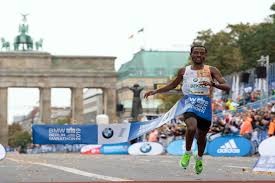
The announcement did not mention whether the race is canceled outright or will be postponed for a later date. It also didn’t mention whether or not registered runners will be able to receive a refund for their race bib or roll over their registration to 2021.
The announcement did not mention whether the race is canceled outright or will be postponed for a later date. It also didn’t mention whether or not registered runners will be able to receive a refund for their race bib or roll over their registration to 2021.
“We will now deal with the consequences, coordinate the further steps, and inform you as soon as we can. Let us remain strong together,” said the Berlin Marathon event team in an Instagram post.
Eliminating the Berlin Marathon from the fall race schedule is especially sad news for the running community, as the fast course has hosted spectacular performances over the years, including Eliud Kipchoge’s current marathon world record of 2:01:39.
The cancellation also puts into question the likelihood of whether the other World Major Marathons—Boston, London, Chicago, and New York City—will happen as planned later this year.
The Chicago Marathon, still scheduled to run on October 11, recently announced a cancellation option for runners registered for the 2020 race. Meanwhile, Boston and London—which were originally planned for this month but postponed until September 14 and October 4, respectively—as well as New York City, scheduled for November 1, have not yet made announcements about coronavirus-related schedule changes.
Login to leave a comment
BMW Berlin Marathon
The story of the BERLIN-MARATHON is a story of the development of road running. When the first BERLIN-MARATHON was started on 13th October 1974 on a minor road next to the stadium of the organisers‘ club SC Charlottenburg Berlin 286 athletes had entered. The first winners were runners from Berlin: Günter Hallas (2:44:53), who still runs the BERLIN-MARATHON today, and...
more...

